

3 Day Best of Kruger Safari
4 day best of kruger safari, 4 day kruger and panorama safari, 5 day kruger and panorama safari, morning safaris, afternoon safaris, full day safari, sabi sand big 5 game reserve sunset safari, 2 night self-drive umbhaba eco lodge safari, 3 night self-drive umbhaba eco lodge safari, private vehicle morning safaris, private vehicle full day safaris, private vehicle afternoon safaris, 3 day best of kruger private safari, 4 day private kruger and panorama safari, 5 day private kruger and panorama safari.

3-4-5 Day Kruger Safari Packages
Rated on TripAdvisor as leading Kruger Safari packages with 1806 – 5 Star Reviews / Departing Johannesburg every Monday – Wednesday – Saturdays

Kruger Park Day Safaris

Kruger Park Self Drive Safaris

Kruger Park Budget Safaris
Private kruger safari packages.

Private Kruger Day Safaris

Trip Advisor Reviews
Explore our range of specialized tours.
Choose a private safari for a personalized and exclusive wildlife experience with your own guide and vehicle, offering flexibility and intimacy in exploring Africa’s incredible wildlife.
Choose from our range of private Safari packages that including options for couples, family safaris, and fly-in safaris.
Customize your adventure to match your preferences, whether you’re seeking a romantic getaway, an exciting family experience, or a luxurious fly-in safari.
Experience a variety of safari options, complete with all the expected comforts and inclusive of conservation fees, making our Kruger Park safaris a cost-effective choice for your thrilling adventure.
SATSA Accredited
Being a SATSA accredited company means we are committed to adhering to and governed by the regulations established by the South African Tourism Services Association.
Professional
From booking your accommodation to planning your day trips into the Kruger National Park in the company of one of our tour guides, Kurt Safari will do it all for you.
In order to guarantee the finest possible African experience during your stay, we make it a priority to offer our guests round-the-clock support.
We cherish the African wilderness we call home, and our entire team, including guides and consultants, are local residents living near Kruger National Park.
With more than 20 years of experience
With over two decades of experience guiding guests through the magnificent Kruger National Park, Kurt Safari stands out as South Africa’s premier Kruger National Park safaris tour operato r . Our range of Kruger National Park safari travel packages caters to clients seeking an authentic African safari experience, where rustic adventure meets modern comfort. Every aspect of our Kruger Park safaris and tours is meticulously tailored to accommodate various budgets, preferences, and tastes.
Our Kruger Park safaris offer options for both budget-conscious travelers and those looking for a touch of luxury. Guests not only have the opportunity to explore the best of Kruger National Park along its most wildlife-rich routes but also to discover some of the region’s most fascinating and beautiful attractions.
Guided by trained and passionate guides, guests can enjoy up to 9 hours of safari time in the Kruger National Park on our Full Day Safaris, a longer duration compared to most other companies. We use comfortable open-air safari vehicles, providing guests with a remarkable bird’s-eye view of the wildlife encounters.
The majority of our private Kruger Park safaris and tours take place in the wildlife-rich Southern Kruger region, home to the renowned Big 5 – Lion, Elephant, Buffalo, Leopard, and Rhino, as well as herds of zebra, wildebeest, and a plethora of bird species, with over 148 mammal species residing in the Kruger National Park.
Kurt Safari offers a range of Kruger National Park safari packages, including 3, 4, 5, and 8-day options, including Photographic and Birding safaris led by experienced guides.
Booking any of our Kruger Park safaris is easy through our website. You can choose the package that best suits your needs, book directly online, and make secure payments. Alternatively, feel free to reach out to us to speak with one of our knowledgeable consultants.
Our base is in Hazyview, just a short 15-minute drive from the Kruger National Park. Our consultants, guides, and management team are primarily locals with a deep understanding of the Kruger National Park and its wildlife. They can provide you with valuable insights that you won’t find online, ensuring a memorable holiday.
For clients on overnight Kruger Park Packages, we arrange stays at quality private lodges, a short 10-15 minute drive from the Kruger National Park. These lodges offer top-notch quality, including Wi-Fi, breakfasts, and dinners, combined with air-conditioned accommodations, enhancing your safari experience.
Kurt, the Director of Kurt Safari, has guided Kruger Park safaris for nearly 12 years before founding our company. We are now rated as the leading safari operator on TripAdvisor. Our packages have been personally designed after years of trial and error, with a focus on quality guiding and safety, complemented by amenities such as quality accommodation, fantastic meals, and an affordable and memorable experience.
We look forward to welcoming you to Kruger and hope you enjoy your Kruger Park safari with us.
Welcome to Krugersafaris.com, where you can explore a range of affordably priced safaris in Kruger Park, along with valuable travel information.
Embark on your adventure with us.
Krugersafari.com stands as one of Kruger’s premier tour operators, with over two decades dedicated to welcoming guests from around the globe to partake in the ultimate Kruger Park safari experience.
We offer a diverse range of exceptional Kruger safaris for our clients to select from. Each safari is conducted in an open safari vehicle and led by one of our experienced guides, each with years of expertise in guiding tours through the Kruger. Our safari packages are meticulously crafted to ensure you have an unforgettable time in our beautiful country. Recognizing that for many of our guests, a visit to the park is a once-in-a-lifetime adventure, we strive to make our Kruger Park safaris as enchanting, captivating, and memorable as possible. Whether you’re seeking a single-day excursion or a 3-day, 4-day, or even 5-day adventure in the Kruger, we have the perfect tour for you. Our offerings include shared safaris, private Kruger Park safaris, and packages for those interested in exploring the Panorama Route and the Kruger National Park.
Enhancing your Kruger Park experience is the newly introduced Umbhaba Eco Lodge, offering world-class service and quality, complete with en-suite air conditioning. In cases where Umbhaba Eco Lodge is fully booked, we utilize the Sanibonani Lodge in Hazyview.
The Krugersafari.com Experience
A journey to the park with us promises a relaxed experience, and our well-organized itineraries and inclusions in each tour ensure you are well taken care of and in excellent company.
Our guided tours are competitively priced and efficiently arranged, with accommodation included in each overnight package, the style of which varies based on the Kruger tour you choose.
We specialize in small guided group Kruger Park safaris, and with daily departures from Johannesburg to Hazyview, you can arrive in the city in the morning and be enjoying the Kruger in the afternoon! Our Kruger safaris are perfect for both local and international visitors.
Each safari vehicle is open, providing excellent visibility to easily spot animals amidst the wild vegetation. This exceptional visibility makes our safaris ideal for both aspiring and seasoned photographers looking to capture unique shots. For those seeking a more photography-focused safari, explore our custom photographic safaris.
The Kruger National Park unquestionably ranks as the best place in South Africa to encounter the Big 5: Lion, Leopard, Elephant, Rhino, and Cape Buffalo. A day trip to the park is sufficient to spot these iconic animals and more. Keep in mind that when exploring the Kruger, you never know what awaits around the next bend in the road! The Kruger boasts an incredibly diverse array of wildlife species, along with hundreds of bird and reptile species.
While we offer a wide array of Kruger Park safaris and thrilling game drives for our guests to choose from, we are also more than willing to customize a package to fulfill all your wildest safari dreams! We always go the extra mile for our guests, understanding the profound impact a real African safari can have. Our accreditation with SATSA ensures that the safari you book will meet all your expectations, providing a safe, reasonably priced, and one-of-a-kind experience. Each of our safaris promises to deliver the African adventure you desire.
You can find pricing details for our best-selling Kruger Park safaris on our website.
If you have any questions about our tours, please feel free to reach out to our helpful team based in Hazyview. You can also visit TripAdvisor to peruse our latest reviews.
We eagerly await the opportunity to welcome you to the African continent. You can book your safari through our website or contact us via email.
Essential information for kruger park safaris.
The magnificent Kruger National Park stands as one of South Africa’s most beloved and iconic landmarks. Every year, this conservation reserve warmly welcomes numerous visitors from around the globe. Many of these guests embark on various Kruger Park trips or opt for a self-driven adventure through the park, all seeking the serene solitude that can only be found in the wild. However, it’s not just the tranquility that draws visitors to the park; it’s the captivating wildlife.
Credit goes to Paul Kruger, the former president of the now-defunct Transvaal Republic, who dedicated himself to setting aside a portion of Transvaal for the preservation of animals. Without his tireless efforts, the park’s inhabitants would have long vanished from the landscape. In 1898, when the park was initially established, hunting was rampant, and trophies of big game like lions and elephants were highly coveted by foreign visitors. To safeguard the local wildlife from complete extinction, the park was designated as a no-hunting zone, and it remains one of the world’s oldest and largest conserved areas to this day.
Today, we enjoy the fruits of the wisdom and foresight of those who came before us. A Kruger Park safari is an unforgettable experience, and it’s more affordable than you might imagine. Initially, tourists didn’t enter the park; however, around 1927, the first paying visitors were permitted to explore it. In those early days, there were no accommodations inside the park, so visitors had to exit before sunset.
As time passed and transportation methods evolved, more tourists began arriving, and accommodations were developed to allow them to stay overnight. Entry fees were never excessively high, earning the park a reputation as the “People’s Park,” a place where anyone could experience the wonders of conservation. Today, even a 7-day safari is quite budget-friendly, and there’s always the option of a self-driven adventure through the park.
Booking a Kruger Park safari or a Kruger Day Tour has never been easier. A quick online search will yield a plethora of options, many of which are offered by reputable safari companies like ours. Why choose to book a safari instead of going for a self-drive? Well, in reality, it requires less planning and can save you a few bucks (pun intended).
The Establishment of an Iconic Conservation Park
Although the Kruger National Park was officially declared in 1898, it wasn’t until 1927 that it was officially named the Kruger National Park and opened its gates to tourists. Those early years were quite intriguing, as tourists would traverse the park on a train, providing limited visibility of the wildlife. The route was fixed and unchangeable, but it was considered the safest way for early visitors to experience the park. These were the days before the advent of the automobile, so it’s easy to imagine how the park’s accessibility changed after cars became commonplace.
By 1928, a board of directors was overseeing the Kruger Park, and it was determined that in order to make the park more accessible to visitors, overnight accommodations were needed. The park’s first rondavels, round-hut-style accommodations that have since become synonymous with the park, were constructed at Skukuza, Pretoriuskop, and Satara. As more and more guests flocked to the park, additional accommodations were added for their convenience, while the former ranger lodgings were also converted into unique guest accommodations.
For those who have researched South Africa and the Kruger Park in particular, it’s well-known that the summers in the region can be exceptionally hot and humid. One can sympathize with the park’s earliest overnight guests who grappled with the challenge of staying cool. In fact, staying overnight in one of the rondavels was not a popular choice in those days. While it was a novelty, the heat was often unbearable, and mosquitoes were a constant nuisance that couldn’t be kept out. These days, rondavels are equipped with fans, and some even have air conditioning. Additionally, in those early days, the accommodations did not provide complete isolation from the wilderness. As the park expanded and construction progressed, guests gained more protection from the wildlife and access to ablution blocks where they could bathe or shower.

The Flora and Fauna of Kruger National Park
While the park’s wildlife is the primary attraction for visitors, the plant life in the area is equally as captivating as the animals. The flora within the park is incredibly diverse, and the park is divided into four distinct regions, each characterized by its unique plant species.
- Thorn Trees and Red Bush-Willow Veld Located in the western and central parts of the park, just south of the Olifants River, this region is dominated by red bush-willow and acacia (thorn) trees. Marula trees are also abundant in this area, while acacia trees line the rivers and streams. The Nwatimhiri Bush and areas along the Sabie River are particularly dense with vegetation.
- Knob Thorn and Marula Veld South of the Olifants River and to the eastern part of the park, you’ll find the knob thorn and marula veld. This region offers ample grazing grounds and is characterized by red grass, buffalo grass, knob thorn trees, and marula trees, making it an essential part of the park’s ecosystem.
- Red Bush-Willow and Mopane Veld In the northern part of the park, west of the Olifants River, the predominant vegetation consists of red bush-willow and mopane trees.
- Shrub Mopane Veld The northeastern part of the park is predominantly covered by mopane trees.
It’s important to note that these regions host a wider variety of plants and trees than those mentioned above. The abundance of these trees and bushes contributes to the naming of the areas, and each region plays a crucial role in supporting the park’s diverse wildlife.
Notable Wildlife and Conservation Efforts
Kruger National Park is renowned for being home to the Big 5, which includes lions, leopards, elephants, rhinos, and buffalos. While these iconic animals are a major draw for Kruger visitors, the park also houses a broader array of species than any other park on the African continent, totaling 147 species of animals. In addition to numerous predators and large animals like elephants, the park is home to a variety of antelope species such as kudu, impala, nyala, and eland. Furthermore, the park serves as a sanctuary for endangered and rare species, such as the wild dog, underscoring its importance in wildlife conservation.
Anti-Poaching Measures
Due to the presence of numerous endangered species within the park, extensive efforts have been in place for many years to combat poaching. Anti-poaching units are equipped with cutting-edge prevention tools, including night vision technology and advanced telescopes. Game rangers, law enforcement officers, and military personnel have all actively participated in the campaign to curtail poaching activities. While there has been a reduction in poaching incidents, animals, particularly rhinos, remain under constant threat.
While elephants are sporadically targeted by poachers, it is the rhinoceros that often makes headlines. Poachers enter the Kruger National Park during full moon nights, targeting both black and white rhinos for their valuable horns. These horns can fetch approximately $66,000 per kilogram on the black market. Despite bans on horn trade in most countries, these restrictions have had limited impact on deterring illegal activities.

Exploring the 12 Principal Camps of Kruger National Park
Kruger National Park offers a multitude of reasons to visit, and among them is the rich history and warm hospitality found in each camp. The park is a laid-back haven, where even the bustling main camps exist in their own tranquil bubble, far removed from the modern world. Before delving into discussions about the park’s historical significance, its incredible wildlife, or the safari experiences it offers today, let’s take a closer look at each of the 12 main camps.

Located in a mountainous area, Berg-n-Dal is a unique camp that has preserved its natural environment and habitat. Dry riverbeds run along its southern and northern borders, and the camp boasts large trees. Wildlife enthusiasts can spot creatures like wild dogs, klipspringers, and leopards near the camp. Berg-n-Dal is one of the newer camps in the park, offering a range of facilities and comfortable accommodations.
Crocodile Bridge
As one of the smaller camps in Kruger National Park, Crocodile Bridge takes its name from the nearby Crocodile River. It’s an excellent spot for game viewing, especially along the Southern Circle, where lions are frequently sighted. Other animals in the area include kudu, giraffes, spotted hyenas, and cheetahs. This camp has garnered multiple nominations as the best camp in the park.
Letaba is ideally situated at the park’s midpoint, acting as a bridge between the north and south. Its name means “River of Sand,” and it’s renowned for its elephant sightings. The area around Letaba is lush and green, bursting with nighttime activity, including bats, owls, nightjars, frogs, and cicadas. It’s a prime spot for observing elephants and bushbucks.
Lower Sabie
Lower Sabie sits on the banks of the Sabie River, offering a serene and laid-back atmosphere. The camp is well-known for its majestic trees, making it an ideal location for leopard sightings. Other animals that frequent the area include hippos, lions, and various antelope species. Lower Sabie provides excellent accommodations.
Mopani camp is surrounded by Mopani trees and features a massive baobab tree at its center. The camp’s vegetation is left in its natural state, and wildlife enthusiasts can spot hippos, waterbucks, and tsessebes. The camp borders Pioneer Dam, attracting animals for afternoon and morning water breaks.
Olifants is renowned for its breathtaking views, perched high on a hill above the Olifants River. The camp is surrounded by viewing platforms that offer an excellent vantage point for observing wildlife near the water below. Animals like crocodiles, lions, elephants, and hippos can be spotted here. The camp also offers great accommodation options and a picturesque picnic area.
Orpen, along with its satellite camps Maroela and Tamboti, enjoys a strategic location. The camp is named after Eileen Orpen, the land’s owner who donated it to the park. This grassy area is ideal for observing grazing animals, and the surrounding open plains are home to numerous lion prides. The night air resonates with the roars of lions, creating an unforgettable experience. Orpen offers diverse wildlife sightings, including the Big 5, wildebeests, and jackals.
Pretoriuskop
Nestled among ancient granite rocks, Pretoriuskop is home to fascinating granite boulders. As one of the park’s oldest camps, it retains a historical charm in its layout and style. The camp is known for sightings of Sable antelopes, Lichtenstein’s Hartebeests, wild dogs, and kudus. Its proximity to one of the park’s entry points makes it a popular choice for visitors.
Punda Maria
Punda Maria, located in the park’s northernmost region, experiences scorching temperatures even during winter. It boasts a unique sandveld habitat with diverse plant life, earning it the nickname “botanical gardens of the park.” Wildlife enthusiasts may encounter nyala, wild dogs, and zebra herds. Punda Maria is an ideal destination for those seeking tranquility.
Satara was one of the first camps to build rondavels, offering overnight stays to interested guests. Today, it’s a bustling camp renowned for excellent game viewing opportunities. Nestled in a wooded area, Satara is considered rustic and a haven for birdwatchers. Visitors can spot lions, giraffes, wildebeests, and the elusive honey badger.
Shingwedzi, another camp in the park’s northern region, is celebrated for wildlife sightings, including nyala, waterbucks, and elephants. The scenic route along the Shingwedzi River provides access to the camp. With its rustic charm and limited modern conveniences, Shingwedzi offers a true break from the ordinary. The camp’s sparser vegetation makes wildlife spotting easier.
Skukuza is often saved for last on our list, serving as the capital of Kruger National Park. It’s the central hub where day visitors typically stop for lunch. Situated along the Sabie River’s southern banks, Skukuza boasts multiple lookout points and a tranquil atmosphere. Visitors can encounter animals such as spotted hyenas, bush babies, and warthogs. The camp also offers a range of accommodations and modern conveniences.
Each of these main camps provides a unique experience and a glimpse into the rich tapestry of Kruger National Park.
Additionally, the park features satellite camps, bushveld camps, overnight hides, bush lodges, luxury lodges, and campsites to cater to various preferences and interests.
Exploring Kruger National Park from the comfort of an open safari vehicle remains a highly popular way to experience the park. It allows guests to get up close to nature while ensuring their safety. With the wind in your hair and the captivating sounds of Africa all around, a safari in an open vehicle will create lasting memories. Additionally, it provides excellent opportunities to capture stunning photographs.
At Kurt Safari, we provide some of the most competitively priced Kruger National Park safari experiences. We offer private Kruger National Park tours and day tours, giving guests various options to consider when planning their visit to the park. Don’t hesitate to book your tour with us today.
Commonly asked questions about kruger national park, is a kruger national park safari the finest african safari experience.
The Kruger National Park stands as a renowned and captivating tourist destination in South Africa. This wildlife sanctuary is globally acclaimed for its rich assortment of animals, diverse biomes, and plant life. Its establishment dates back to May 1926, thanks to the dedicated efforts of game warden James Stevenson-Hamilton and the late President Paul Kruger. The Kruger National Park came into existence through the merger of various lands and the Sabi Sand Game Reserve, forming the expansive park we know today. Its primary purpose has always been the conservation of Lowveld animals.
Within the Kruger National Park resides an astonishing array of animal, plant, and bird species. It boasts some of the world’s largest and swiftest creatures, such as the African Elephant, Cape Buffalo, White and Black Rhinos, and lions, all of which draw visitors from around the globe. The park’s location in the Lowveld region offers a surprising diversity of biomes. Each of these biomes features remarkable variations in terms of animals and plant life. Travelers can traverse sandy and arid areas with resilient plants, sparser landscapes, and animals adapted to the hot and unique environment. Further exploration leads to lush savannah bush with abundant water, trees, and plant species.
Due to its vastness and diversity, every visit to the Kruger National Park promises a unique experience. Some days, guests may witness the Big 5 within a few hours, while on other days, they might encounter zebras and impalas. This unpredictability is what makes the Kruger Park a beloved and frequently visited destination, offering spontaneous and thrilling adventures.
Embarking on safaris within the Kruger National Park is an excellent way to immerse oneself in its wonder and beauty. Knowledgeable guides can lead guests to various exceptional areas, share informative and fascinating insights, and enhance their understanding of the park. These guides are well-trained and deeply passionate, which reflects in the exceptional treatment guests receive during safaris.
Kurt Safari proudly holds the title of the No.1 Rated Kruger National Park Safari Company. We offer high-quality and affordable 3-4-5 Day packages and day safaris led by experienced guides. The park’s vast expanse, coupled with its breathtaking landscapes and an astounding variety of animal species, is incredibly inviting. The Kruger National Park is steeped in captivating history and compelling stories that captivate and entertain individuals of all ages and interests. Safaris in the Kruger create indelible memories, often leaving guests with lasting impressions of adventure in one of South Africa’s wildest and most diverse places.
With numerous ways to explore and experience the Kruger National Park, the ease of booking a safari, and the friendly and helpful nature of the guides, embarking on a Kruger Park Safari is a decision you’ll never regret.
Is Kruger National Park a Hazardous Destination?
Kruger National Park enjoys global acclaim for its incredible wildlife, picturesque landscapes, and rich history. Every day, thousands of people visit the park, eager to explore its offerings. The Kruger Park boasts numerous captivating sights, including scenic hilltop camps with river views, lookout points near rivers or watering holes, and picturesque clearings by the roadside. Visitors have the opportunity to encounter animals throughout the park, which also means the possibility of interactions and potential risks, both with wildlife and fellow humans.
Among the notable dangers:
African Elephants: While these gentle giants are usually passive, they can become agitated and defensive when their calf is present. Elephants have a strong maternal instinct and will protect their offspring at all costs. Agitated elephants may provide warnings before attacking, but danger arises when separating the calf from its mother or when there is limited space to move. Fortunately, elephant attacks are not common occurrences.
Buffaloes: Buffalo herds pose a greater threat than elephant herds. When provoked, buffaloes can attack without warning. They are social animals that often defend themselves in groups. When a vehicle threatens the herd, they may charge or stampede, causing chaos and a serious danger to all involved. Buffaloes have been known to damage vehicles and harm people.
Hidden dangers include:
On-Foot Dangers: Guests walking in the Kruger, whether on a bushwalk or within rest camps, may encounter hidden dangers such as snakes and spiders. The park is home to 152 spider species, including potentially dangerous ones like the Button Spider, Sac Spider, and Violin Spider. When on foot, guests should also be cautious of snakes, which can seek shelter in various places and strike without warning when threatened.
Curious Vervet Monkeys: Some park residents, like Vervet Monkeys, are curious and may come into close proximity to humans. These clever animals travel in large troops and are commonly found near rest camps where they can access trash cans and fresh food. Vervets may enter people’s accommodations and can become aggressive when cornered or injured. A troop of Vervet Monkeys can pose a danger to both visitors and themselves.
In summary, while the Kruger National Park offers incredible wildlife encounters, visitors should be aware of potential dangers and exercise caution. It’s crucial to respect the park’s wildlife and follow safety guidelines to ensure a safe and enjoyable experience.
What is the price of a Kruger National Park safari?
Kruger National Park stands as the top tourist destination in South Africa. Its immense size, abundant wildlife and plant species, along with exceptional photography opportunities, make it a must-visit when traveling to South Africa. Many international visitors may not be fully aware of what to expect and the associated costs during their stay at Kruger National Park.
The overall cost of your safari experience in Kruger largely depends on your preferences and activities. Entrance fees to the park can vary based on your nationality. South African citizens pay R200 per adult and R50 per child, while international guests are charged R400 per adult and R200 per child. In addition, all visitors, regardless of nationality, must pay daily conservation fees of R400 per adult and R200 per child.
Visitors have the option of embarking on a self-drive safari, where they take charge of their entire adventure, from driving around the park to creating their own schedule. Self-drive safaris are popular among those who wish to explore Kruger National Park at their own pace, spend quality time with family and friends, and avoid strict schedules. The costs associated with a self-drive safari typically include entrance and conservation fees paid at the gate, fuel expenses, funds for food and snacks during the day, and money for souvenirs. Accommodation, if needed, is a separate cost and can sometimes be relatively expensive.
Alternatively, there are numerous safari companies that offer guided tours, providing a wide range of experiences at varying costs. Many of these companies offer 3/4/5-day safari packages, catering to different budgets. These packages can range from budget-friendly options to more luxurious tours that include meals. It’s essential to research different safari companies to find one that aligns with your preferences and budget. For guests opting for a 3/4/5-day safari, accommodation costs are usually included in the tour package, allowing them to focus on the experience rather than worrying about where to stay.
Safari experiences with a tour company offer the advantage of exploring more of Kruger National Park while being guided by experienced tour guides who provide valuable insights about the park and its wildlife. Guides keep track of animal sightings, ensuring reliable and exciting tours. On the other hand, self-drive safaris provide a relaxed and cost-effective alternative, allowing guests to spend the entire day making memories with family and friends at their own pace. Newcomers to Kruger Park are encouraged to consider guided tours, especially if they are not familiar with the park’s landscape and surroundings.
Which Kruger National Park Camps are considered the finest?
The Kruger National Park is enveloped by an incredibly diverse landscape, featuring a wide range of biomes that house distinct plant life, climates, and wildlife. Given its extensive size, the park offers numerous opportunities for visitors to take a break, enjoy meals, cool off, and find accommodation after a day of exploration. Throughout the Kruger Park, there are a variety of unique rest camps, tent camps, and lodges designed to accommodate and meet the expectations of any traveler.
Indulgent Retreats: Within the Kruger National Park, there are numerous exceptional rest camps, each offering unique features that set them apart. If you seek central access to the park, luxurious accommodation options, breathtaking scenery, and a wealth of amenities like a cinema, library, and restaurants, Skukuza is an ideal destination. Satara, located right in the heart of lion territory, is renowned for its prime location. Guests are virtually guaranteed to encounter numerous lion prides while visiting this area and staying at the camp. Satara Camp has a rustic charm and is not as bustling as Skukuza, providing the luxury of a modern camp combined with the tranquility of a smaller rest camp.
Elephant Haven: Elephants are a major attraction in the Kruger Park, making an area known for spectacular elephant sightings immensely popular. Olifants Camp is situated atop a hill, offering unparalleled views. The camp is celebrated for its breathtaking vistas and is often considered one of the finest camps in the Kruger. Its peaceful ambiance and reputation as an elephant hotspot make it a unique and highly regarded choice for accommodation.
Secluded and Serene: For those who prefer a lighter, more minimalist experience, there are plenty of rest camps that offer excellent camping opportunities. Berg en Dal is one of the larger camps in the Kruger, but its location in a hilly area surrounded by dry riverbeds creates one of the most serene and relaxed places to spend the night. Some of the best camping spots are situated near the camp’s fences, providing unobstructed views of the Kruger’s natural beauty, free from the interference of buildings and trees. Balule, located close to the center of the Kruger Park, is the second smallest camp in the park. Despite its proximity to Satara, Balule is a preferred choice for those seeking peace and solitude. Balule is a satellite camp without electricity, where the kitchen operates on gas, and it boasts spacious areas that offer less shade but more opportunities for stargazing. The camp is frequently visited by hyenas and elephants that patrol the low fence, allowing guests to feel truly immersed in nature during their stay at Balule Satellite Camp.
What wildlife can be observed in Kruger National Park?
Kruger National Park is home to a diverse array of mammal, bird, and plant species. Its establishment dates back to May 1926, but even before that, the Sabi Sand Reserve was dedicated to conserving Lowveld wildlife. When Kruger National Park was founded, it was declared a sanctuary where no animals were to be hunted.
The Lowveld region is renowned for its unique mammal species, many of which are exclusive to this area. Among the notable mammals in the park, Lions take the spotlight as the second-largest cat species globally and the largest in South Africa, second only to the Tiger. Lions are highly social creatures, often found in large prides comprising a dominant male, juvenile males, numerous lionesses, and their cubs. Another sought-after cat species in the park is the elusive Leopard, known for its solitary and secretive hunting behavior, blending seamlessly into the savannah vegetation. The Cheetah, the world’s fastest land animal, surprises many safari-goers with its appearance, resembling a Leopard but with a more slender build and smaller spots. Other lesser-known and rarer cat species in the park include the Rooikat, Wild Cat, Serval, and Caracal, which are solitary and often nocturnal hunters.
Antelopes are a predominant presence in Kruger National Park and are usually among the first animals encountered upon entering the park. The common Impala is a highly social species found in large herds, often mingling with Zebra and Buffalo herds. Known as the “McDonald’s of the Kruger” due to their abundance, Impalas are easy prey for many predators. Other notable antelope species in the park include the Kudu, which serves as a symbol of Kruger National Park, and the Eland, the world’s largest antelope species. These magnificent antelopes are highly prized in hunting reserves but are protected within the park.
Among the park’s largest animals are the African Elephant, renowned for its majestic herds and strong maternal instincts. It is the largest and heaviest land animal globally. The Black and White Rhinos, while popular, face severe threats from poaching, and their populations have significantly declined. Other notable giants in Kruger include the Cape Buffalo and the Blue Wildebeest, commonly found near water sources and interacting with Zebra and Impala herds. While mostly passive, they can be dangerous if provoked.
The variety of animals in Kruger National Park is astonishing. Zebras are a delight to observe as they socialize with Impalas and engage in unique interactions. Wild Dogs, although rare, are highly sought-after animals often on the wish list of safari-goers. Hyenas are more active in the afternoon and can be recognized by their distinctive calls. Giraffes are a fun encounter, though sometimes challenging to spot amid the trees. They travel in small herds, making a memorable sighting nearly guaranteed during your adventure in Kruger Park.
What bird species can be observed in Kruger National Park?
While Kruger National Park is renowned for its diverse mammal and reptile species, the rich variety of bird species within the park often goes unnoticed. Yet, the park offers exceptional opportunities for birdwatching, attracting enthusiasts with thrilling sightings.
One of the most iconic and sought-after birds in Kruger National Park is the Bateleur Eagle. This striking bird is frequently spotted perching in trees near sandy areas of the park, delighting birdwatchers on Kruger Park Safaris. Another common sight at rest camps is the Greater Blue Eared Starling, a beautiful blue bird often seen flying close to people in search of food scraps. The park is also home to a variety of eagle and hawk species, including the Bat Hawk, Hawk Eagle, and Crested Eagle, among others.
A well-known avian resident of the Lowveld is the African Fish Eagle. Its distinctive call often precedes its appearance as it soars through the skies. This majestic raptor is frequently seen near bodies of water capable of sustaining it. Their sizable nests, averaging 2 meters in diameter and a meter deep, are often found in trees near watering holes. African Fish Eagles may have multiple nests that they visit when food is scarce in a particular area. Another bird closely associated with Kruger National Park is the humble Helmeted or Spotted Guinea Fowl. These small birds are commonly observed in small flocks in rest camps, picnic areas, and along roadsides, particularly in the mornings. Local lore suggests that Guinea Fowls should only be eaten during months without an ‘R’ in their names, such as May, June, July, and August.
A group of birds, known as the “Big 6” of birds, mirrors the concept of the Big 5 mammals. This group includes the Kori Bustard, recognized as the world’s heaviest flying bird; the Martial Eagle, strong enough to knock an adult off their feet; the Leppetfaced Vulture, Africa’s largest vulture; the Pel’s Fishing Owl, often referred to as the leopard of the group due to its rarity; the Saddle-billed Stork, known for its vibrant plumage; and the Southern Ground Hornbill.
Kruger Park also hosts numerous common bird species commonly found in the Lowveld region. Birds like the Hadida, Hammerhead, Hoephoep, Kingfishers, Woodpeckers, and the Piet-my-Vrou are frequently seen throughout the park, providing a sense of familiarity and comfort to many visitors.
Discover Southern Africa?
Southern Africa offers a diverse and stunning landscape, from shifting red desert sand dunes to lush green forests teeming with life. Travelers to this region have the opportunity to embark on an unforgettable journey to some of its most coveted destinations, including Cape Town, the Garden Route, and Namibia. These tours are conducted in groups and led by experienced guides who are well-acquainted with the routes, top attractions, and hidden off-the-beaten-path adventures.
Whether you opt for a Namibia tour, a Cape Town exploration, or a Garden Route adventure, each journey is infused with a blend of history, discovery, and enjoyment. Don’t forget to pack your hiking boots and a quality camera to capture the memories of this remarkable trip.
The featured tours encompass essential elements like accommodation, entry fees to various attractions listed in the itinerary, comfortable transportation throughout the tour, and a few added surprises. To gain a more precise understanding of what each tour entails, we recommend thoroughly reviewing the details of each offer.
With a wide array of Southern Africa tours available, you can easily find and book the one that suits your preferences through our website. If you encounter any challenges in selecting the right tour for your needs, feel free to reach out to us directly for a conversation with one of our consultants.

Your Specialists in Kruger Park Safaris
- Morning Safaris
Full Day Safari
- Afternoon Safaris
- Sabi Sand Big 5 Game Reserve Sunset Safari
3 Day Best of Kruger Safari
4 day best of kruger safari.
- 4 Day Kruger & Panorama Safaris
- 5 Day Kruger & Panorama Safaris
- 2 Night Self-Drive Umbhaba Eco Lodge Safari
- 3 Night Self-Drive Umbhaba Eco Lodge Safari
3 Day Best of Kruger Budget Safari
4 day best of kruger budget safari.
- 4 Day Kruger and Panorama Budget Safari
- 5 Day Kruger and Panorama Budget Safari
3 Day Best of Kruger Private Safari
- Kruger and Panorama – 4 Day Private Safari Tour
- Kruger and Panorama – 5 Day Private Safari Tour
- Private Vehicle Morning Safaris
- Private Vehicle Afternoon Safaris
- Private Vehicle Full Day Safaris
- Cape Town and Johannesburg Day Tours
- Namibia Tours
- Photography and Birding Safaris
Garden Route Tours
- Victoria Falls Tours
- Earth Lodge
- Little Bush Camp
- Selati Camp
- Accommodation Kruger Park
- Umbhaba Accommodation
- Image Gallery
- Video Gallery
- Our Open Vehicle
- Kruger National Park News
- Kruger Park Bird Guide
- Kruger Park Mammal Guide
- Kruger Park Reptile Guide
- History of the Kruger Park
- Enquire Now

Kurt Safari, the top-rated Kruger National Park
Safari company on tripadvisor.

Every Monday-Wednesday & Saturdays.
Guaranteed departures.

with "1882" 5 star Reviews.
Rated #1 tripadvisor safari operator, book the best 3, 4 or 5 day kruger park safaris and tours.
“Kurt Safari is the # 1 Rated Kruger National Park Safari Company on Tripadvisor. We specialise in 3, 4 and 5 Day Kruger Park Safari Packages , as well as Day Safaris and Tailor-Made Kruger Safari Tours.

KRUGER NATIONAL PARK All Inclusive – Adventure Filled – 4 Star Accommodation – Classic Safaris
Safaris depart johannesburg every monday – wednesday – saturday, book now & receive 10% discount on all 3-4-5 day packages, 4 day kruger & panorama safari, 5 day kruger & panorama safari, kruger national park private day safaris, private safaris depart daily, private full day safari, private morning safari, private afternoon safari, kruger national park budget safaris, 4 day kruger & panorama budget safari, 5 day kruger & panorama budget safari, kruger national park umbhaba eco lodge – private safaris, 4 day kruger & panorama private safari, 5 day kruger & panorama private safari, kruger national park couples, family’s and groups, tailor made guided safaris, kruger national park day safaris, morning safari, afternoon safari, kruger national park umbhaba eco lodge – self drive, 2 nights umbhaba eco lodge self-drive safari, 3 nights umbhaba eco lodge self-drive safari, kruger national park & cape town, namibia tours & safaris, cape town / johannesburg day tours, trip advisor reviews, for the last 20 years, kurt safari’s experienced kruger guides have been driving both local and international travellers through some of the most exquisite and wildlife-filled areas of the world-famous kruger national park..
Kurt Safari Pty Ltd is a highly ranked and recommended Kruger Park safari operator . We are rated #1 on TripAdvisor and we partner with some of the world’s leading travel companies, to provide clients from all over the world with the best Kruger Park safari experience. Over the last 20 years, we have designed and perfected 3, 4 and 5-day all-inclusive Kruger safari packages and tours that promise to give you a wildlife encounter that is nothing less than extraordinary.
The Kruger National Park Experience
Relatively untouched by the outside world, the Kruger National Park is the destination of choice for those who want to experience Africa and explore a place that is home to free-roaming wildlife, indigenous plants, and a huge population of birds.
Our Kruger Park safaris depart from Johannesburg every Monday, Wednesday and Saturday; we offer guaranteed departures with a minimum of 2 clients.
Fully Inclusive Packages
We offer fully inclusive packages that include all transfers, entry fees, night safaris, day safaris, morning safaris, Panorama Route tours, breakfasts and dinners, as well as quality accommodation at the best nearby lodges. All of our Kruger Park safaris are guided by professional guides and we have made sure that each safari allows you to spend as much time in the Kruger and the surrounding Lowveld as possible.
In the company of a trained and passionate guide, our guests spend up to 10 hours a day in the Kruger National Park. This means our guests have the best chance of seeing the Big 5 and more. We make use of the most comfortable, open-air safari vehicles, giving guests a real bird’s eye view of the wildlife we encounter.

Best Safari Packages
We have a selection of the very best Kruger National Park safari packages, each of which has been created for clients who are looking for that real African safari experience, with all the first-world comforts.
Quality Over Price
One cannot put a price on quality, and while we do not offer the lowest rates or cheapest packages, we are renowned for providing our guests with the highest quality safaris; we only use the best vehicles, lodges, and guides, and we have a leading management team. Even our budget Kruger Park packages come with air-conditioned rooms, WiFi, and delicious meals.
Abundant Wildlife in the South Western Kruger
We operate in the South Western region of the Kruger Park, where wildlife populations are abundant. This part of the park is famous for being home to the Big 5 (Lion, Elephant, Buffalo, Leopard, and Rhino). The Kruger National Park has over 148 mammal species, most of which can be seen in the Southern regions of the park.
Variety of Safari Packages
Kurt Safari offers one of the widest varieties of Kruger National Park Safari Packages, from exciting 3, 4, and 5-day packages to an epic 8-day photographic and birding safari.
To book any of our Kruger Park safaris, you can browse through our website and find the one most suitable for your needs, your expectations, and your budget. You can then book directly via our website, pay online and start preparing for your trip. Alternatively, you can contact us and have a chat with one of our knowledgeable consultants.

Local Expertise
We are based in the Lowveld town of Hazyview, which is a 15-minute drive away from the Kruger’s Phabeni Gate. Our consultants, guides, and management team are all locals who’ve spent a lifetime living in the area. They all have tremendous knowledge about the Kruger National Park and its wild inhabitants and can give you the kind of advice that you won’t find online.
Accommodation
Guests who choose an overnight holiday with Kurt Safari stay at some of Hazyview’s best private lodges. Just a 15-minute drive from the park, the lodges we use are chosen for their comfort and their high standard of excellence and friendly hospitality.
Leadership and Experience
Kurt Schultz, the Director of Kurt Safari, personally guided Kruger Park safaris for almost 12 years before creating his safari company in 2008. Today, the company is rated as one of the leading Kruger Park Safari operators.
Our focus is on providing our clients with a full safari experience. While most private lodges in private reserves are limited to concessions, safaris in the Kruger are not limited to areas and boundaries, making this a truly special place to visit.

Preserving a Legacy
James Stevenson Hamilton, the first warden of the Kruger National Park, wished to keep the Park simple and wild, a place where lions, elephants, giraffes, and other wildlife wander freely and safely. We don’t compromise on our standards or our commitment to safety, we are guided by passion before profits, and we believe in playing a role in keeping the wishes of James Stevenson Hamilton alive, through our reputable Kruger safari practices.
We look forward to welcoming you to the Kruger National Park and the Mpumalanga Lowveld.
Read our Complete Guide to the Kruger National Park here
Welcome to kurt safari. here you will find a selection of well-priced kruger park safaris as well as travel information., your adventure begins here.
Kurt Safari Co is one of the Kruger’s leading tour operators, with over 20 years spent welcoming guests from all over the world to experience the ultimate Kruger Park safari.
We have a diverse selection of fantastic Kruger safaris for our clients to choose from. Each safari is carried out in an open safari vehicle and in the company of one of our professional guides, each of whom has years of experience guiding tours through the Kruger. Our safari packages are designed in such a way that you are guaranteed to have a truly unforgettable time in our beautiful country. We know that for many of our guests, a visit to the park is a once in a lifetime adventure and so we try to ensure that our Kruger Park safaris are as entrancing, captivating and as memorable as possible. Our tailor-made safaris as well as our standard safari packages, offer something for everyone. Whether you are looking to spend a single day, 3 days, 4 days or even 5 days in the Kruger, we have the tour for you. We also have shared safaris and private Kruger Park safaris, as well as packages for guests wanting to see the Panorama Route and the Kruger National Park.
Our guests stay in the exclusive Umbhaba Eco Lodge, where they can look forward to a world class experience in their air conditioned en-suite room. Should there be no availability at Umbhaba Eco Lodge during their trip, guests will stay at the equally stunning Sanibonani Lodge in Hazyview.
The Kurt Safari Kruger Experience
A Kurt safari is a laidback experience and our itineraries, as well as all that is included in each tour, will ensure that you are well taken care of and in the best company.
Our guided tours are well priced and well organised and accommodation is included with each overnight package.
We specialise in small guided group Kruger Park safaris and with our daily departures from Johannesburg to Hazyview, you can arrive in the city in the morning and be enjoying the Kruger in the afternoon! Our Kruger safaris are ideal for both locals and international visitors.
Each safari vehicle is open, giving you ample visibility, allowing you to easily spot animals through the wild vegetation. This visibility makes each safari perfect for budding and experienced photographers looking to capture those one of a kind snaps. If you are in search of a more photographic focused safari, please have a look at our custom photographic safaris.
The Kruger National Park is without a doubt the best place in South Africa to spot the Big 5. The Kruger is home to the Lion, Leopard, Elephant, Rhino, and Cape Buffalo and a day trip to the park can offer enough time to spot these animals and many more. Keep in mind that when visiting the Kruger, you never know what is waiting around the next twist and turn in the road! The Kruger boasts a massively diverse number of wildlife and bird species.
Although we have a wide range of Kruger Park safaris and exciting game drives for our guests to choose from, we are also more than happy to customise a package to fulfil all of your wildest safari daydreams! We always go the extra mile for our guests as we know how truly amazing and memorable a real African safari should be. We are SATSA accredited, which is our guarantee to you that the safari you are paying for will live up to all of your expectations. You can look forward to a safe, well-priced, one of a kind safari. Each of our safaris will meet your expectations for that African experience you seek.
You can view the pricing of our bestselling Kruger Park safaris on our website.
Should you have any questions about our tours kindly get in touch with our helpful Hazyview based team. You can also check out TripAdvisor to see all of our latest reviews.
We look forward to welcoming you to the African continent. You can make your safari booking via our website or by getting in touch with us via email.
Kruger park safaris: must know info.
The majestic Kruger National Park is one of South Africa’s best loved iconic landmarks. Each year the conservation reserve welcomes thousands of guests from all over the world. Embarking on one of the many Kruger Park trips available, or taking a self-drive through the park , is the way that most guests are introduced to the quiet solitude that you will only find when out in the wild. But it is not the quietness that brings guests to the park. It’s the animals.
Booking a Kruger Park safari or a Kruger Day Tour has also never been so easy. A quick look online will present you with a huge number of options, most of which are from top-notch safari companies, such as ours. Why book a safari instead of doing a self-drive?
We reap the benefits of the wisdom and foresight of those who came before us. The Kruger Park safari is an experience to be remembered and it’s one that is not as costly as you might think.
The Founding of a Legendary Conservation Park
Paul Kruger , the onetime president of the now-defunct Transvaal Republic, made it his mission to have an area of the Transvaal set aside for the conservation of animals. Without his efforts, the animals that we now see roaming the park would have long been erased from the land. Back in 1898, when the park was first founded, hunting was rife and trophies of big game, such as lions and elephants were much sought after by overseas visitors.
To prevent the local animal life from becoming completely eradicated, the park became a no-hunting zone and to this day remains one of the oldest and biggest areas of conserved land in the world.
The Kruger National Park might have been proclaimed in 1898 , but it was only in 1927 that it was named the Kruger National Park and opened to tourists. Those early days were interesting, to say the least, with tourists literally flying through the park on a train. Not a lot could be easily seen, and the route was one that could not be changed. But this was the safest way for the earliest visitors to see the park. These were the days before the can.
By 1928, the Kruger Park was being steadily run by a board of directors and it was decided that in order to make the park more accessible, overnight accommodation needed to be built. The park’s first rondavels, a round hut style of accommodation that is as synonymous with the park as the Big 5, were built at Skukuza, Pretoriuskop and Satara. As more guests visited the park, more accommodation was added for their benefit while the former accommodation used for rangers was also converted into unique accommodation for guests.
Fees were never exorbitant and so the park became known as the People’s Park; a place where anyone could experience all that the conservation effort had to offer.
If you have done your research about South Africa, and the Kruger Park in particular, you will know that the summers are exceptionally hot and humid. So you can sympathise with the park’s earliest overnight guests and their struggle to stay cool.
In fact, staying over in the park, in one of the rondavels, was not a popular choice. Sure it was a novelty, but the heat was as unbearable as the mosquitoes, which could not be kept out. These days, rondavels have fans and some even have air-conditioning.
Kruger Park Flora and Fauna
While animals are what draws people to the park, the flora of the area is just as captivating as the fauna. The plants and trees of the Kruger are really diverse, and different flora can be seen in different areas of the park. The Kruger is divided into 4 distinct areas, each distinguishable based on the flora of the area.
Thorn trees and red bushwillow veld
In the west and more or less centre of the park, just south of the Olifants River, lies the red bushwillow trees as well as acacia (thorn) trees. The area also boasts plenty of marula trees. The acacia trees line the rivers and streams. Along with the Nwatimhiri Bush, the areas along the Sabie River are very dense with vegetation.
Knob thorn and marula veld
In the area south of the Olifants River, and to the east of the park, lies knob thorn and marula veld. This region provides plenty of grazing ground. Red grass and buffalo grass, as well as the knob thorn and marula trees, make this an important region of the park.
Red bushwillow and mopane veld
North of the Olifants River and to the west of the park, the red bushwillow trees and mopane trees mostly make up the vegetation.
Shrub mopane veld
Almost the entire northeastern area of the park is covered with mopane trees.
While these areas have more plants and trees than mentioned above, it is the abundance of these trees and bushes that contribute to the naming of the areas. Each region is exceptionally important for the survival of fauna.
Famous Fauna and the Effort to Conserve
The park is famously home to the Big 5, which consists of the lion, leopard, elephant, rhino and buffalo.
These iconic animals are part of the allure of visiting the Kruger, but they are not the only incredible animals to have a home here.
In fact, there are more species in the Kruger than in any other park on the African continent!
Overall, there are 147 species of animals in the park. Along with numerous predators and large species such as elephants, the park also has a host of antelope such as kudu, impala, nyala, and eland. The Kruger National Park is also home to various endangered as well as rare species, such as the wild dog.
Anti-Poaching Efforts
As the park has many endangered species, efforts to prevent poaching have been underway for many years. Anti-poaching units are equipped with the latest in prevention equipment such as night vision technology and advanced telescopes. Game rangers, the police and the army have been actively involved in the effort to stop poaching and while instances have been reduced, animals are under constant threat.
While elephants are occasionally hunted, it is the savage slaying of our precious rhinos that makes the headlines. Poachers sneak into the Kruger, often when the moon is full, and hunt rhinos for their horns. The horn is worth around $ 66 000 per kilogram and although there is a ban on the trade of the horn in most countries, the ban sadly has little effect.
Those who go on a Kruger Park safari drive are incredibly lucky to see a rhino.
Must Know Kruger National Park Rules
In the beginning, the rules for guests visiting the park were very relaxed and not widely enforced.
But as time has gone by, more rules have been added to the sheet given to guests upon entry. All of the rules are simple to understand and very easy to follow. If this is your first time going to the park, here’s what you need to know:
- Guests are only allowed to drive in the park from sunrise to sunset. Before the evening comes, guests need to be out of the park or they need to be at the rest camp they are booked into. An exception is made when guests embark on a Kruger Park night drive but guests are not allowed to self-drive after dark, so you’ll need to make arrangements and bookings for such an experience.
- Another important rule and one that applies greatly if you are going to be doing a self-drive through the Kruger is the speed limit. There is a strict speed limit in the park ; 50 km on tar roads and 40 km on gravel (dirt) roads.
- It goes without saying, but indeed sometimes needs to be said, that guests are not allowed to leave the safety of their vehicles . There are also those rare cases of guests wanting to touch the animals, which is also forbidden. One of the major park rules is that people must remain in their vehicles.
- Feeding or disturbing the animals is also very much against the rules . Littering goes in this category and it is also forbidden. Because all of the animals are wild, feeding them can do more harm than good. Animals also often mistake litter for feed and end up eating the litter and becoming ill or dying.
- If you will be doing more than a Kruger Park day tour, then there are other rules that you will have to adhere to. Being booked into your camp before 14:00 pm and leaving by 10:00 am the following day is a must.
- Another thing to take into consideration is the noise rule . Camps are generally quiet places. What keeps them quiet is the rule that states that guests must limit noise between the hours of 21:30 pm and 6:30 am. Cell phones are permitted in the camps, but minimal use is encouraged.
- Only safari vehicles and private vehicles are granted access to the parks . Motorbikes are not allowed and roller-skates and skateboards are not permitted.
- All of the rules and regulations are enforced by legislation (the National Environmental Management: Protected Areas Act of 2003). This means you can be charged or fined for breaking the rules. The rules and regulations are there for the safety of the guests while they can also make the trip more relaxed and enjoyable.
Reputable safari companies always adhere to the rules of the park.
The kruger’s 12 main camps.
There is a laundry list of reasons why you should visit the Kruger National Park.
And one of those reasons is the history and the hospitality you will find in every camp. If anything, the park is one really laid-back place to be. Even the busy main camps, of which there are 12, are in their own bubble, away from the modern world.
Berg-n-Dal is one of the few camps in the park set in a mountainous area and the natural environment and habitat have been well preserved within the camp. The camp has dry riverbeds on the southern and northern borders, along with very large trees. Some of the animals to see near the camp include the wild dog, the klipspringer, and the leopard. If you are staying over in the park, then you’ll be happy to know that there are a number of facilities available along with great accommodation.
Berg-en-Dal is one of the Kruger’s newest camps. The beautiful rocky region in which it has been built often makes it the perfect place to see cats while the camp also has an indigenous rock garden that guests can explore. The camp was originally built in 1984 but just before the camp was opened, it just about completely burned to the ground. Officials scrambled to get the facilities rebuilt, and somehow managed to get everything done in time for the opening.
The camp has been built on top of a prehistoric settlement and the area around the camp is filled with all kinds of examples of ancient life and it has a Bushman Trail which allows guests to view San Bushmen rock art. The bush walk is about 20 minutes and guests will see various ecological and geological sites when viewing the paintings.
There are a few archaeological sites close to the camp and pot shards and bone fragments have been unearthed here. Some of the latest evidence shows that those who lived in the area were from the Iron Age.
The camp is in the southern Kruger, a region of the park that is well-known for its abundant wildlife. The camp has all kinds of accommodation including camping, cottages, guesthouses and bungalows. It also has a big swimming pool, an internet cafe, a conference centre, and picnic areas for day tourists. Not many guided Kruger Park safaris stop here, but those that do enjoy a quieter setting than compared to Skukuza. The Kruger National Park accommodation at Berg-en-Dal is rustic but comfortable and affordable.
Crocodile Bridge
One of the smaller camps in the Kruger National Park, Crocodile Bridge gets its name from the Crocodile River, which flows close to the camp. Game viewing is excellent when you drive the Southern Circle which is near to the camp. In this area, lions are often spotted. Other animals known to prowl the area include kudus, giraffes, spotted hyenas and cheetahs. This camp has been time and again nominated as the best camp in the park.
Situated at the halfway point of the park, a perfect fit between north and south, is Letaba. The name means River of Sand and it is one of the best-known places to spot elephant. While a lot of areas in this sector of the park are already turning into grassland, Letaba is green and lush. And the night erupts with life. When you stay at Letaba, bats, owls, nightjars, frogs and cicadas keep the night alive. But there is more than the nightlife to keep you entertained. The areas surrounding Letaba are known for sightings of elephants and bushbuck.
Lower Sabie
Lower Sabie is situated along the banks of the Sabie River. The camp’s location gives it a laid back, calm atmosphere that guests can really unwind in. The camp is well known for having numerous, massive trees which makes it the ideal place to see leopards. Other animals you can see in the area includes hippo and lion, along with all of the usual antelope. A large number of other animals also visit the river to have a drink of water. At Lower Sabie, you will also have access to fantastic accommodation.
This is one of the camps in the park that is home to plenty of Mopani trees. But the most significant feature of the camp is the massive baobab tree that sits in the centre of the camp. Most of the camp’s vegetation is left to grow naturally. Some of the animals that you can spot in the area include hippo, waterbuck and tsessebe. The camp is on the border of the Pioneer Dam, so seeing animals late in the afternoon and early morning coming for a drink of water is the norm.
Olifants is well-known for the amazing views that it has on offer. The camp is situated high up on a hill, above the Olifants River. The camp is surrounded by viewing platforms, which offer a great way to spot the wildlife roaming near the water below. Some of the animals you can see here include crocodile, lion, elephant and hippo. Along with great accommodation, there is also a great picnic spot for day visitors.
With two satellite camps, Maroela and Tamboti, Orpen is well situated. The camp got its name from the Eileen Orpen who was owner of the land which was donated to the park and became the place where Orpen now is. This grassy area is a great place to spot grazing animals, while the wide open surrounding plans are home to many prides of lions. By night, the air is filled with the sounds of roaring lions, something that you will never forget. Orpen is well known for having a diverse array of wildlife, and some of the animals you will come across include rhino, buffalo, elephant, leopard and lion which make up the Big 5. Other animals include wildebeest and jackals.
Pretoriuskop
Pretoriuskop is a camp nestled between millions of years old outcrops of granite rocks. There are a number of interesting granite boulders in this south-western based camp. But the real attraction here is, of course, wildlife. Pretoriuskop is one of the park’s oldest camps and evidence of its age can be seen in the layout and style of the camp. The animals that are often spotted here include the Sable antelope, Lichtenstein’s Hartebeest, wild dog and kudu. Many people like to stay at this camp because it is quite close to one of the entry points to the park.
Punda Maria
Only those willing to brave the heat are brave enough to stay at Punda Maria during the intense summer months. And even in the midst of winter, this camp can get hot. Punda Maria is found in the north-most part of the park and because of the sandveld habitat, it is home to a number of interesting plants. Punda Maria is often called the botanical garden of the park. When travelling in this region you might come across nyala, wild dog and plenty of zebra herds. The drive is a long one when you are heading north. Often only those who will be spending more than a few days in the park will attempt a stay here.
Some of the first rondavels were built at Satara after more and more guests became interested in spending a night in the park. Today, Satara is a very busy camp and one known for its excellent game viewing opportunities. Satara is in a wooded area and the camp itself is considered to be rustic. If you are an avid bird watcher, this is definitely the place to go. And along with the birds you can see here, there is also a variety of animals such as lion, giraffe, wildebeest and the honey badger.
Another camp located in the northern region of the park, Shingwedzi is known for its wildlife sightings, such as nyala, waterbuck and elephant. To get to the camp, you will need to take the scenic route along the Shingwedzi River. This camp is also one that is considered to still be rustic, with a lot of the conveniences of modern living not found here, a factor that makes staying here a real break away. If it is tranquillity that you are seeking, you’ll find it here. Along with tranquillity, you will also find some interesting birds such as the Giant Eagle Owl and the Green Pigeon.
Of the plants that you can see here, there is Natal Mahogany, mopane scrub, brack thorn, sausage trees, and mustard trees. There is also a lot of bird life in the area.
As a northern camp, Shingwedzi is worlds away from the wet and humid sub-tropical southern areas of the park. Here the vegetation is sparser, which makes seeing wildlife a little easier. The further north you travel, the terrain changes from mountains and hills, to wide open plains and you can imagine cheetahs darting over the grassland. Shingwedzi is not on the day Kruger Park safari destination list because it is further away than most camps, but it is the ideal place to spend a holiday if you are looking for tranquillity.
Shingwedzi is famous for being home to some of the biggest elephants the park has ever seen. The Magnificent Seven once roamed the areas around the camp, and they became famous for having the biggest tusks ever recorded for elephants in the Kruger. An artist who learned of the elephants searched the area to find them and immortalise them in his artwork. Once the art became public, and more people learned about the elephants, guests from all over the world came to see them. The great tuskers lived in the area during the 1070s and 1980s, when the last of the tuskers died. The park has not seen the likes of these elephants again, and today, their tusks can be seen in various camps. The Shingwedzi River runs close to the camp, and it is one of the best places in the area to spot all kinds of wildlife. When the river comes down in flood, even more animals can be seen. Beyond the river lies an old alluvial plain which has a few trees and little vegetation.
Shingwedzi camp is a modern one with a touch of that rustic appeal that the Kruger has become so well known for. The camp has a restaurant and café, a swimming pool, a shop, a petrol station and a picnic area. For those who want to stay over in the camp, they are really spoiled for choice when it comes to their accommodation options. Shingwedzi has camping spots, huts, bungalows, and more luxury accommodation such as guest cottages and houses. The fixed Kruger National Park accommodation is kitted out beautifully and has fans and/or air conditioning for those intense northern Kruger summers. The camp is laid out perfectly for those wanting privacy while staying in the park and during the day, their Kruger National Park safaris offer unforgettable sightseeing.
Leaving the best for last, we have Skukuza. This camp is the capital of the park and when you are on a Kruger Park safari, this is the camp where you are sure to be stopping off for lunch. The camp is situated along the southern banks of the Sabie River and there are plenty of lookout points here. Guests stopping off for lunch can do so outside in a seating area as well as on benches that look out on the river. The camp is nice and shady, the perfect place to catch your breath, cool off and eat a snack. A few of the animals often spotted in the area include spotted hyena, bush baby and warthog.
Some wildlife comes into the camp, and day visitors enjoying a Kruger Park safari can get really up close to the wildlife. Monkeys and warthogs can be found roaming the camp in search of left over picnic snacks. Guests should be warned, however, as the monkeys can get very brazen and end up stealing food from your table or even your hand. Skukuza means “He who sweeps clean”, and it is named in honour of one of the camp’s most famous and beloved wardens, James Stevenson-Hamilton. The camp was originally called Sabie Bridge Camp, but upon the 30th anniversary of James Stevenson-Hamilton working in the park, it was renamed.
Serving as the camp’s administrative headquarters while also being the one place where all day visitors converge, Skukuza has a long and important history. As the “Capital City” of the Kruger National Park, all of the day to day administration and management of the park is done here. Well away from the prying eyes of the tourists, the park’s officials work around the clock to ensure that the park is running smoothly. Those who live and work in the park have made their homes in the quiet Skukuza Village, where there is also a school, a few shops and a weather station.
As far as Kruger National Park accommodation goes, there are all kinds of options to choose from. Camping and rondavels remain the most common and the most popular style of accommodation, although the camp does have more luxurious lodgings. There are plenty of things to do in the camp, for both day visitors and those staying over. The most luxury lodgings is the Kruger Shalati Train, which is to be built on the Sabie Bridge in 2019. The camp has a refreshing swimming pool, a golf course, and countless memorials and museums. Be sure to take a look at the dog memorial, which pays homage to the hounds that helped shape the park. You should also see the oldest hut in the Kruger, which is now a museum.
The camp has all kinds of modern conveniences, such as shops, ATMs, a classy restaurant, a café and ablution facilities. Guests staying over can look forward to air conditioned accommodation.
One of the best ways to spend your time in Skukuza, when you are on a day Kruger National Park safari is to set up a picnic while overlooking the Sabie River. You never quite know what you’ll see when you are in the camp.
Most Kruger National Park safaris will end up at Skukuza at some point in the day. We, for instance, enter the camp at around 10 am to give our guests some time to stretch their legs and grab a bite to eat.
In addition to these main camps, there are also a number of satellite camps, bushveld camps, overnight hides, bush lodges, luxury lodges and campsites.
Select your kruger park safari.
The biggest decision you need to make when planning a trip to the Kruger National Park is deciding what type of safari experience you would like to have. A quick online search brings up all sorts of safari packages, but the only way to narrow down the search is to know more or less what you want to get out of your Kruger National Park safari. It doesn’t help to book a Kruger Park day safari when what you really want is 10 days in the park.
Generally, the more time you spend in the park, the more animals you will see. The Kruger is home to hundreds of different animal species, including the Big 5. And the different regions of the park have unique habitats, meaning where you go in the park will be a deciding factor for what you see.
Kurt Safari offers guests a variety of safari packages, including 3, 4, and 5 day tours of the Kruger National Park as well as morning, afternoon and full day game drives and night drives.
Full and Half Day Safaris
To save time, and particularly if you are on a budget, opting for either a Kruger Park day tour or a half day tour is one of the easier ways to get a taste of the Kruger. Generally, we encourage visitors to spend more than a day in the park, in order to see everything. But when you are limited on either time or money, choosing a day or half a day in the park, can be a great introduction to this magnificent place.
We have Kruger Park Full Day Safaris, Afternoon Safaris , Morning Safaris and tours that combine the best of the Kruger, with a trip to the picturesque Panorama Route.
Full day private Kruger Park safaris can offer you the best way to see the park, and you have the added benefit of enjoying the sights on your own or in the company of friends and family. We offer private morning and afternoon Kruger Park safaris as well as full day safaris.
The other option is to have a full day Kruger National Park safari. Again, this private Kruger experience will give you just enough time to spot all sorts of animals. And the more time spent in the park, the more animals you are likely to see. A full day safari is also less likely to leave you feeling rushed. Along with taking you to the best places in the park, there is also the added opportunity that comes with being in the company of an experienced tour guide, who is sure to share a few stories of their time in the park.
Visiting the park during the morning or afternoon is often considered to be the best times, as the heat is not intense and the animals are likely to be grazing. During the peak heat times of the day, animals tend to seek out shade, leaving guests with a disappointing drive.
We depart on our safaris in the early morning and later afternoon, when the heat of the day has either not yet arrived or has cooled off, as these remain the best times of the day to see animals. Each of our Kruger Park Safari prices are affordable, and each will take you into the parts of the park best known for wildlife sightings.
Private 3, 4 and 5 day Kruger Park Budget Safaris
Within our selection of safari packages, we have something for every type of traveller, including those travelling as part of a small group. For these guests, we have created the 3, 4 and 5 day Kruger National Park safaris. Our tours are designed to include sophisticated,comfortable accommodation.
- The 3 day Kruger Park safari
This tour includes 3 days and 2 nights. The days are spent on safari, while in the evening you will return to the beautiful Umbhaba Eco Lodge or an equally upmarket nearby lodge should Umbhaba lack capacity. Breakfast and dinner are included as well as your transfers. Along with days spent on safari, this tour package also includes a Kruger Park night drive. With the 3 day Kruger Park safari , you will certainly have plenty to see, especially as we travel to those areas best known for animal sightings.
- The 4 day Kruger Park safari
Much like the 3-day package, your evenings will be spent at either Umbhaba Eco Lodge or a similar nearby lodge. This package includes 4 days and 3 nights in the wild, with your days being spent on safari. The ideal tour package to give you ample time in the park, you are sure to see numerous animals while you are on this safari.
- The 5 day Kruger Park safari
Finally, the last budget safari that we have available is the 5 day Kruger Park safari. While this package is similar to the 3 and 4-day tours, you will have 5 days in the park . And with this extra time, seeing the Big 5 is very much a possibility. You will be accommodated in either Umbhaba Eco Lodge or another nearby lodge.
The 3, 4 and 5 Kruger Park Classic Safaris
If you are looking to have a truly relaxing safari experience, and you are not so tightly constrained by your budget, the 3, 4 or 5 day classic Kruger Park safaris are a must. Stylish accommodation in a 4 star hotel and just the right amount of time spent in the park, when you sign up for one of our classic safaris, you will be in for a treat.
- The 3 day classic Kruger National Park Safari
Heading out early in the morning and late in the afternoon for a real Kruger experience, the 3 day classic safari is as comfortable as it is exciting. Your guide will be taking you to some of the best areas in the park, spending the day on the dusty Kruger roads looking for the Big 5 and all the other interesting park inhabitants. We offer guests transfers from Johannesburg and for the next 3 days you can sit back while we drive you through the Southern regions of the park. Breakfast and dinner are included.
- The 4 day classic Kruger National Park Safari
With 4 days and 3 nights included as a part of this tour package, you will have plenty of time to relax and enjoy your Kruger trip. The day starts early with an exciting Kruger Park tour, while the afternoons are for relaxing until late afternoon, when guests go on another game drive. This tour package also includes a night drive, something that everyone should experience at least once in their lives.
- The 5 day classic Kruger National Park Safari
The more time you spend in the park, the more opportunity you will have to see the Big 5. The 5 day classic Kruger National Park safari is a must for anyone who wants to take their time and have a truly memorable holiday. You will be accommodated in 4 star lodgings and breakfast and dinners are included. Much of this tour package is similar to the 3 and 4 day classic safaris, although you will have extra time in the park.
The 3, 4 and 5 day Kruger National Park Backpackers Safari
Not at all like the classic safari, and quite different to the budget option, the various Kruger National Park Backpackers safaris are designed for those who enjoy an on the move type of holiday.
Regardless of the number of days you want to spend in the park, your accommodation will remain the same, as guests opting for the Kruger National Park Backpackers safari will be lodged at the Bushpackers Campsite and Accommodation. This accommodation includes meals and will give you that touch of rustic living that you might be after when visiting the Kruger. This is more than a backpacker’s safari, it is also ideal for students looking for an adventure!
- The 3 day backpackers Kruger National Park safari
With 3 days spent enjoying a safari , and accommodation provided by the Bushpackers Campsite and Accommodation, guests embarking on this safari package are in for a real treat! Days will start off and end with a Kruger Park safari.And as always, we take guests to the more exciting areas of the park, where animal sightings are frequent.
- The 4 day backpackers Kruger National Park safari
Regardless of the package you select, always keep in mind that the more time you spend in the park, the more chances you have of seeing the animals you really want to see. Some guests have truly seen all they wanted to see in the 4 days that they have been on safari. We take guests to the Southern areas, as these are the most populated regions of the park.
- The 5 day backpackers Kruger National Park safari
You cannot go wrong with any 5 day safari . Giving you more than enough time to see many of the park’s inhabitants, anyone embarking on a 5-day safari is in for a once in a lifetime trip. And when opting for the backpacker’s safari, you won’t be breaking the bank. This safari also includes a tour of the Panorama Route.
The Guided Group Open Vehicle Safaris
Experiencing the Kruger National Park in the comfort of an open safari vehicle remains one of the most popular ways to see the park. Guests are up close to nature, and even though you are in an open safari vehicle, you will still be kept safe. With fresh air blowing in your hair, and the unmistakable sounds of Africa filling up the vehicle, seeing the Kruger in an open vehicle will leave you with memories to last a lifetime. And they are also the perfect vehicle for capturing some incredible photographs.
At Kurt Safari, we offer some of the best priced Kruger National Park safaris. With private Kruger National Park tours and Kruger National Park day tours, guests have a number of different options to choose from when they are planning a visit to the park.
Book your tour today.
Why book a kruger national park safari with us.

Affordable World-Class Safaris
With a range of safari options, which include all of the comforts you can expect as well as conservation fees, you can save money by booking one of our exciting Kruger Park safaris.

SATSA Accredited
As a SATSA accredited company, we are dedicated to and bound by the rules and regulations as set out by the South African Tourism Services Association.

Professional Services
From booking your accommodation, to planning your day trips into the Kruger National Park in the company of one of our tour guides, Kurt Safari will do it all for you.

Constant Support
To ensure that your stay in Africa is the best possible experience, we strive to provide our guests with 24/7 support.

We are passionate Africans
We love every part of the African wilderness that we are privileged enough to call home. Our guides, consultants and management team are all locals and we live close to the Kruger National Park.
Frequently Asked Questions about the Kruger National Park
Is a kruger safari the best african safari.
The Kruger National Park is a truly wonderful and famous tourist destination in South Africa. The animal conservancy is world known for its diverse range of animals, biomes and plant life. The park was founded all the way back in May 1926, by the hard working game warden James Stevenson-Hamilton and the late President Paul Kruger. The Kruger National Park came to be after areas around it and the Sabi Sand Game Reserve merged together to form the Kruger National Park we know today. The Kruger National Park was built with the conservation of animals in the Lowveld in mind.
The Kruger National Park is home to an unbelievable number of animal, plant and bird species. The Kruger National Park hosts some of the largest and fastest animals known in the world. Animals like the African Elephant, Cape Buffalo, White and Black Rhinos and lions are some of the most popular animals in the Park and attract visitors from around the world. The Kruger Park’s location in the Lowveld provide a surprizing amount of different biomes. Each of these different biomes have stunning diversity when it comes to animals and plant life. Guests can find a sandy and dry area that hosts resilient plants, sparser landscape and lesser animals that are adapted to the hot and unique environment, while traveling a distance onwards and encountering a dense savannah bush with lush trees, lots of water and plants.
Because the Kruger National Park is such a sprawling and diverse place, every experience is different. One day guests will be able to see the Big 5 in a few hours while other days they only see zebras and impala and this is why the Kruger Park is such a well loved and visited place, for the random and exiting adventures that await. Safaris in the Kruger National Park are also great ways to experience the wonder and the beauty of the Park as guides can take guests to a variety of unique areas, provide helpful and interesting information, and they can enlighten and enrich the knowledge of the Guests. The guides are all well trained and they are living their passion, and that passion shines through with how well guests are treated on safaris.
Kurt Safari is the No.1 Rated Kruger National Park Safari Company, we offer quality and affordable 3-4-5 Day packages and day safaris with Leading guides. The sheer size coupled with the breath-taking scenery and unbelievable amount of different animal species is very inviting. The Kruger is filled with amazing history and great stories that will entice and entertain people of any age and inclination. Safaris in the Kruger are so memorable that many guests never forget their first ever time, leaving lasting memories of adventure in one of the wildest and most diverse places in South Africa.
With so many ways to explore and experience the Kruger National Park and the ease of applying for a safari, along with the friendliness and helpful ness of the guides, you can never go wrong with a Kruger Park Safari.
Is the Kruger Park Dangerous?
The Kruger National Park is world famous for its amazing animals, stunning scenery, and great history. Thousands of people visit the Kruger Park on a daily basis and want to experience all that the Park has to offer. There are plenty of great sights in the Kruger, from stunning hilltop camps overlooking the river, lookout points near a river or watering hole and even a beautiful clearing next to the road. Guests can interact with animals almost anywhere in the Kruger National Park which means there is always a risk of an altercation, with both animals and people.
Some of the “Big” dangers
One of the animals that can potentially cause problems and cause for concern when travelling in the Kruger Park is the African Elephant. These gentle giants are passive and don’t generally cause any problems unless a calf is present. Elephants have a strong maternal instinct and will protect its calf at all costs. Agitated Elephants can attack out of nowhere but will luckily provide warning before attacking. The Danger comes when you are separating the calf from the mother or when you are backed into a difficult position with little room to move. Luckily, Elephant attacks are not a common occurrence so guests can rest assured. Buffalo herds are more dangerous than an elephant herd as if you antagonize them, they attack without warning. Buffaloes are very social animals and often attack or defend in groups. When the herd is threatened by a vehicle, they will often charge or stampede to or away from the threat, causing complete chaos and providing a serious danger to all involved. Buffaloes have been known to damage cars and kill people.
The Hidden Dangers
Taking a break from the larger dangers in the Kruger, guests also face dangers when on foot in the Kruger. Some of the more hidden dangers guests can encounter when on foot, be it during a bush walk or walking around in the rest camps, are snakes and spiders. The Kruger Park is home to 152 different species of spider that range from the Crab Spider to the Baboon Spider, but out of all these, guests should avoid the Button Spider, Sac Spider and the Violin Spider as they are the three most dangerous species in the Park. Snakes have a tendency to seek shelter in a variety of places, from holes and bushes, to cracks in a wall and inside containers. Snakes are one of the biggest threats a guest can encounter while in a rest camp or bush walk as they are always well hidden and strike without warning when threatened.
The common treat
Some of the residents of the Kruger Park are extremely curious and will often be in closer interaction to humans, one of these residents is the Vervet Monkey. Vervet Monkeys are very clever animals that travel in large troops and are very common near rest camps where trash cans fresh food can be found. Vervets can enter people’s homes and cause havoc and will sometimes lash out and attack people when cornered or injured. Where there is one, there are plenty and many members of a troop can attack, causing a dangerous situation for both parties.
How much does a Kruger Park safari cost?
The Kruger National Park is the most popular tourist attraction in South Africa. The pure size of the reserve paired with the large amount of animal and plant species as well as stunning photography opportunities makes the Kruger a must visit when visiting South Africa. Many visitors to the Kruger National Park are international and are not as knowledgeable to what they can encounter and what they can expect everything to cost while they are staying here.
Your whole safari experience and the cost of it all depends greatly on what you want to do while in the Kruger. Entrance fees to the Kruger National Park vary, depending on where you are from. Guests with a South African ID will pay R200/adult and R50/child, while guests from outside SA will pay R400/adult and R200/child. Everyone international or not must pay conservation fees per day staying in the Kruger, with R400/adult and R200/child.
Guests can easily take part in a self drive safari, which means that guests are responsible for everything the whole safari, driving from place to place and making their own adventure. Self drive safaris are very popular among guests looking to experience the Kruger National Park at their own pace, spending time with family and friends without being on a tight schedule or rush. The Costs regarding a self drive safari are generally the entrance and conservation fees paid at the gate, fuel money, money for food and snacks for the long day ahead and money for souvenirs. Accommodation, should you wish to stay over are paid separately and can sometimes be pricey.
There are plenty of safari companies that can take guests on amazing safaris. There are a large variety of different tours that guests can take that will provide them with different experiences and that will cost differently. Many companies have a 3/4/5 day safari series that allow guests to experience the Kruger National Park in multiple days. Many of these 3/4/5 day safaris range from cheap budget safaris to expensive tours through the park and surrounding areas with meals included. Every safari company is different and its worth doing your homework. For the Guests that are planning on taking a 3/4/5 day safari will see that their accommodation costs are also included into the tour costs allowing guests to focus their minds on the experience and not where they are going to spend the night(s).
A Kruger Safari with a safari company allows guests to experience more of the Kruger National Park, they are driven around by an experienced tour guide that provides them with very interesting information about the park and the animals they will encounter along the way. Guides stay in the loop with animal sightings providing very reliable and exciting tours. Self drives are relaxing and cheaper alternatives to Guided Tours. Guests have the whole day to get where they need to do and make memories along the way with friends and family and isn’t a rushed affair. Newer guests to the Kruger Park are encouraged to take part in a guided tour as they are not always familiar with the landscape and the suurroundings.
Which Kruger Camps are the best?
The Kruger National Park is surrounded in a truly stunning landscape with a large variety of different biomes that house different plant life, climate and animals. The Kruger National Park is a very large conservation reserve and because of its large size, it needs to provide plenty of opportunity for guests to stretch their legs, enjoy some food, cool off and lay down their heads after a long day. The Kruger Park is littered with a variety of unique rest camps, tent camps and lodges to accommodate and meet any person’s expectations.
Luxury Living
There are so many amazing rest camps in the Kruger National Park, each providing something unique that other camps don’t have. If you are looking for central access to the Kruger National Park, great accommodation options, stunning scenery and plenty of amenities like a cinema, library and restaurants, Skukuza is the perfect place to visit. Satara is famous for its location, smack in the middle of Lion territory. Guests are guaranteed to encounter plenty of lion prides while visiting the area and staying at the camp. The Camp has a rustic appeal and isn’t as busy as Skukuza, meaning you will have the luxury of a Modern camp with the peace of a small rest camp.
Home of the Elephants
Elephants are always a huge attraction in the Kruger Park and is one of the most popular animals, which means an area that is known for their amazing elephant sightings will be an immediate hit. Olifants is built on the top of a hill that provides a view that is almost unrivalled. The camp is known for its stunning views and is also the home of Elephants. Olifants is often considered one of the best camps in the Kruger, because of its views, its peacefulness and because it is a hotspot for elephants, providing a truly unique experience as the accommodation options are also top notch.
Secretive and Relaxing
For those who prefer to live a little lighter, there are plenty of rest camps that provide great camping spots. Berg en Dal is one of the larger camps in the Kruger but its location in a hilly area surrounded by dry riverbeds, provides one of the most relaxing and chilled places to stay the night. Some of the best places to set up your tent is near the fences of the camp as you have a front row seat to the beauty of the Kruger and your views aren’t obstructed by buildings and trees. Located close to center of the Kruger Park, Balule is the second smallest camp in the Park. Though it is located close to Satara, many people who want some peace and quiet often flock to Balule. Balule is a satellite camp that has no electricity, with the kitchen run on gas, and has very spacious areas that mean less shade but more places to do stargazing. The camp is frequented by Hyenas and Elephants that patrol the low fence. Guests can truly feel close to nature while staying at Balule Satellite Camp.
Which animals can you see in the Kruger National Park?
The Kruger National Park is home to a large variety of different species of Mammals, Birds and Plants. Since the inception of the Kruger National Park back in May of 1926. Back then, before the founding of the Kruger, the Sabi Sand Reserve already focussed on the conservation of animals of the Lowveld. When the Kruger National Park was founded, it was declared that no animals are to be hunted as they were found on Conservational Ground. The Lowveld is known for a large variety of unique mammal species, many of which can only be found in the Lowveld. The Kruger Park is home to a surprising number of wild cats, the most common of the Kruger Wild Cats are the Lions. Lions are the 2nd largest species of cat in the world and largest in South Africa, only bested by the Tiger. Lions are very social animals that can live in large prides that consist of a dominant male, a number of juvenile males, many lionesses and their cubs. The most popular or sought-after cat is the Leopard , a solitary and secretive hunter that blends in perfectly into the savannah plant life. The Cheetah is the world’s fastest land animal and a true surprise for anyone on a Kruger Park Safari. The Cheetah has an appearance similar to the Leopard but is much less stocky and has smaller spots. The other cat species in the Kruger National Park are lesser known and much rarer than the Lion and Leopard. The Rooikat, Wild Cat , Serval and Caracal are very solitary animals and are much harder to encounter while on safari as many of them are nocturnal hunters.
Antelope make up a majority of the animals that can be encountered in the Kruger National Park and is probably the first animal you will encounter when entering the Park. The most common antelope in the Kruger is the Impala . These social animals can be found in large herds and are often in the vicinity of Zebra and Buffalo herds. Impala are known as the McDonalds of the Kruger as there are so many of them in the park and they are an easy catch for most predators. Some of the famous antelope in the Kruger Park include the Kudu , which is used as the face of the Kruger National Park, and the Eland , the largest species of antelope in the world. These stunning antelope are prized animals on hunting reserves but are luckily safe in confines of the Kruger National Park.
Though not belonging to the same species, the following animals are some of the largest animals in Africa. The African Elephant is the majestic and gentle giant of the Kruger National Park and is well known for its amazing herds and strong maternal instincts. The African Elephant is the largest and heaviest land animal in the world and one of only a few species of elephant in the world. The Black and White Rhinos are some of the most popular animals in the Kruger National Park, but unfortunately due to poaching their numbers have dropped dramatically and there are very few left in the wild. Some of the more common of these giants are the Cape Buffalo and the Blue Wildebeest . These animals are most commonly found near water sources and socializing with Zebra and Impala herds. These animals are mostly passive but can be very dangerous if provoked.
The variety of animals that can be encountered in the park is staggering. Zebras are always fun to see in the Park as they socialize with Impalas and interact uniquely with them. Wild Dogs , though rare are very popular animals and on many people’s wish list during safaris. Hyenas aren’t very common during the daytime but are quite active during the afternoon. You can often hear Hyenas long before you encounter one. Giraffes are great fun to encounter and can sometimes be tricky to spot amongst the trees. They travel in small herds, but you are almost guaranteed to encounter one on you adventure through the Kruger Park.
Which birds can be spotted in the Kruger National Park?
The Kruger National Park is mostly known for their large variety of mammal and reptile species and not many people give much attention to the large variety of bird species and the amazing bird watching opportunities the Park has to offer. The Kruger Park has a diverse and unique variety of bird species. Birdwatching in the Kruger National Park is a very popular activity that provides plenty of great sights and thrills. One of the most iconic and popular birds in the Kruger National Park is the Bateleur Eagle. This beautiful bird can often be seen perching in trees near more sandy parts of the Kruger. The Bateleur is a very sought-after bird by bird watchers and is a true blast to encounter while on a Kruger Park Safari. One of the most common birds you will likely see when stopping at a rest camp is the Greater Blue Eared Starling, that beautiful blue bird that often flies close to people in search of dropped food. The Kruger National Park is actually home to a number of different eagle and hawk species. Some species like the Bat Hawk , Hawk Eagle , Crested Eagle amongst the many. One of the most iconic birds in the Lowveld is the African Fish Eagle. This majestic raptor can more often than not be heard before you spot them circling in the skies. Its iconic whistle has become synonymous with the lowveld is often spotted near bodies of water that can sustain it. Their rather large nests are often seen near watering holes in the trees, with nest sizes averaging 2m in diameter and a meter deep. These birds often have more than one nest that they travel between when food is scarce in an area. A bird that, by many people, has become synonymous with the Kruger National Park is the humble Helmeted or Spotted Guinea Fowl. These little birds can often be seen in small flocks in rest camps, picnic areas and next to the road in the mornings. A common story that is known in the Lowveld is, Guinea Fowls can be eaten but only during months that do not contain an R in them like May, June, July, and August. There is a grouping of birds that were created to mirror the Big 5 of mammals. The big 6 consists of the Kori Bustard, known as the world’s heaviest flying bird, the Martial Eagle, that is strong enough to knock an adult man off his feet, the Leppetfaced Vulture, Africa’s Largest Vulture, The Pel’s Fishing Owl, known as the leopard of the group because of how rare it is, the Saddle-billed Stork, the most colourful of the group and the Southern Ground Hornbill. The Kruger Park also houses some of the more common birds that can be found around the lowveld. Birds like the Hadida, Hammerhead, Hoephoep, Kingfishers, Woodpeckers, and the Piet-my-Vrou are all common and can be found spread out through the park and provide a sense of familiarity for most people.
Explore Southern Africa
From rolling red desert sand dunes that shift in the afternoon breeze, to vibrant, natural green forests brimming with life, Southern Africa is as diverse as it is beautiful.
Those travelling to Southern Africa can enjoy a truly memorable journey to some of the most desired destinations such as Cape Town , the Garden Route and Namibia . Tours are carried out in groups, and in the company of a guide who knows the roads, the best attractions and those secret off the beaten track adventures.
Namibia tours, tours of Cape Town and Garden Route tours all include a slice of history, a dash of discovery and a whole lot of fun! Bring along your hiking boots and good camera, and prepare yourself for an unforgettable trip.
The featured tours include your accommodation, entry fees for the various attractions on the itinerary, comfortable transportation while on tour, and a few added extras. To get a more accurate idea of what to expect, be sure to read through each tour on offer.
With a wide selection of Southern Africa tours available, you can find and book a tour via our website. If you are having difficulty finding the right tour to meet your needs, you can always contact us directly and have a chat with a consultant.
Proceed Booking
Already a member.
Username or E-mail
Forget Password?
Don't have an account? Create one.
Or continue as guest.

Kruger National Park
QUICK FACTS
- World-famous for it's wildlife
- Kruger Park is state-owned and accommodates budgets on both the low-end with self-catering, and on the high-end with luxury concessions
- Luxury customers usually fly in to nearby airports (KMIA / SZK / HDS) from either Cape Town or Johannesburg
- Self-drive possible but flying more common for luxury itineraries
- Game viewing best during the dry winters months May to Oct
- Wet summer season brings full waterholes, lush bushveld, many newborn wildlife and the summer migrant birds arrive
- 15+ luxury lodges in 9 private concessions (each run by a particular operator) over an area of 1,950,000 hectares. Bare in mind that the majority of this is state-owned and run.
ADDITIONAL READING
- https://www.safari.com/blog/top-5-kruger-national-park-safaris
- https://www.safari.com/blog/top-10-luxury-lodges-in-the-greater-kruger-park
Lodge and package options are shown below, but if it seems daunting, feel free to contact [email protected]

Sub regions inside
Broader region.

Unmatched Wildlife Diversity
Kruger is one of the best places in Africa to see the Big Five (lion, elephant, buffalo, leopard, and rhinoceros) in their natural habitat. The park's vast expanse provides ample opportunities to observe these animals up close.
Beyond the Big Five, Kruger is home to over 500 bird species, 100 reptile species, and numerous other mammals like cheetahs, hippos, giraffes, zebras, and more. The park's biodiversity is truly staggering, making it a paradise for wildlife enthusiasts.
Excellent Year-Round Destination
Kruger can be visited year-round, with each season offering unique experiences. The dry winter months (May to September) are ideal for wildlife viewing as animals gather around water sources, while the wet summer months (October to April) bring lush landscapes, newborn animals, and excellent birdwatching opportunities.
Photography Opportunities
Kruger National Park is a photographer’s dream, offering endless opportunities to capture stunning images of wildlife, landscapes, and the ever-changing African sky. Whether you're a professional or an amateur, the park provides a rich canvas for photography.
Close Proximity to Other Attractions
Kruger is located near other popular attractions, such as the Panorama Route, which features breathtaking views of Blyde River Canyon, waterfalls, and scenic landscapes. Combining a visit to Kruger with these nearby destinations can enhance your South African adventure.
Dry Season (May to September)
The dry winter months are the best time for spotting wildlife in Kruger. The vegetation is sparse, making it easier to see animals, and water sources are limited, so animals congregate around rivers and waterholes.
Days are warm and sunny, while nights and early mornings can be cool, but not too cold. This makes it comfortable for game drives.
The dry season has fewer mosquitoes, reducing the risk of malaria. June to August is the peak season, especially during school holidays. This means more tourists and higher prices, but also the best wildlife viewing conditions.
Wet Season (October to April)
The wet summer season brings rain, transforming the park into a green paradise with lush vegetation. This is the time to see the park at its most beautiful. The wet season is the best time for birdwatching, as migratory birds arrive, and many species are in breeding plumage.
Many animals give birth during the wet season, so you may see plenty of baby animals, which can be a fascinating and heartwarming sight.
The park is less crowded during the wet season, which can make for a more peaceful and personal experience. Afternoon thunderstorms are common but usually brief, and the rain tends to freshen up the air and landscape.
Shoulder Seasons (April to May and September to October)
These transitional periods between the wet and dry seasons offer a mix of advantages.
In April to May, the park is still green from the rains, but animals are starting to become easier to spot as the vegetation begins to thin.
In September to October, the park is dry, but not yet crowded, with good wildlife viewing and warm weather. Shoulder seasons generally see fewer visitors than the peak dry season, allowing for a more relaxed experience.
The Kruger National Park is regarded as the ultimate safari destination and the largest in South Africa . With almost two million hectares of pristine wilderness, the park is split into northern and southern reserves. The northern reserves are often referred to as the Greater Kruger National Park .
Kruger National Park is renowned for being home to the iconic Big Five—lion, leopard, rhino, elephant, and buffalo—and boasts the greatest variety of large mammal species among African reserves. Visitors can enjoy an exceptional safari experience, with a range of accommodation options from luxurious lodges to self-catering facilities.
Most reserves within the park offer activities like morning and evening game drives in open vehicles, as well as guided bush walks. Additionally, some reserves provide unique experiences such as local village tours, hot air balloon rides, elephant encounters, visits to animal rehabilitation centers, treehouse sleep-outs, and photographic safaris.
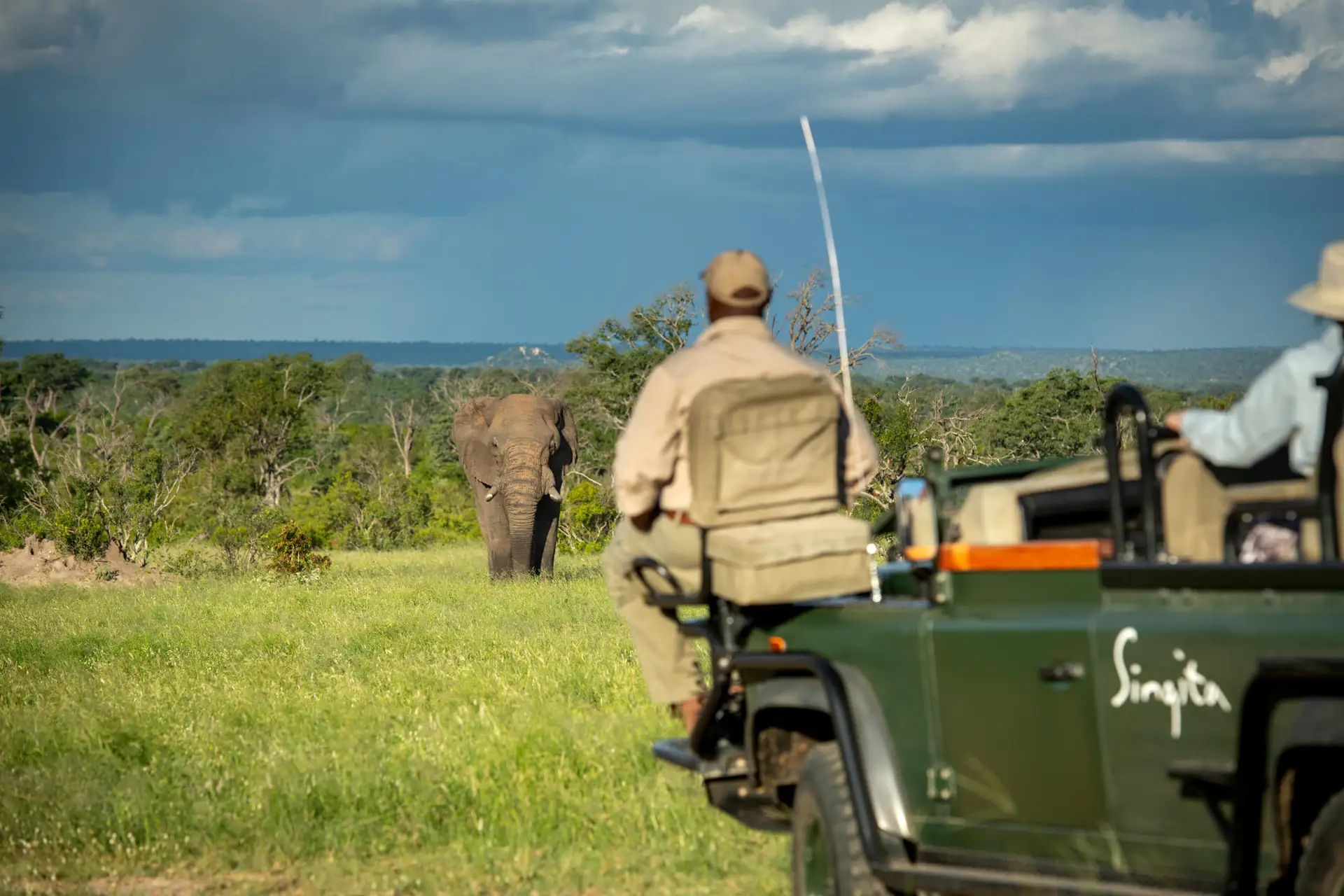
Customer Testimonials

Sep 26, 2024
Mel du Toit has the patience of a saint…
Mel du Toit has the patience of a saint and answered every one of my many questions with detailed information. I felt confident in her expertise and she has assured me that I could count on her being available during every stage of my journey in Uganda. Thanks, Mel!
Sep 25, 2024
patient considerate trust worthy
I want everyone to know Nicole at Safari.com did a great job putting my vacation together. Nicole made sure I had the exact dates I wanted to stay at the lodges of my choice. Nicole answered everyone of my emails quickly. Nicole worked on my vacation plan after office hours from her home. She never once was upset with me if i changed any of my plan. Nicole is very patient .I am very thankful for Nicole. I will always use Safari.com
Anja helped us to craft our dream vacation
The reason why we used Safari.com was because of Anja. We really had no idea of what we wanted so we were not the easiest customers by a long stretch. With Anja’s help and patience we developed about 25 itineraries until we crafted our dream vacation that is taking us across 4 countries. It is an amazing itinerary and this was all possible because of Anja’s dedication to making our seemingly crazy ideas come to fruition in a manner that was realistic and met our budgetary requirements.
Satisfied customers
We always use Dolan for our safari trips. He delivers world class service! All the lodges we’ve visited have been exquisite! Beautiful rooms, private splash pool and gourmet cuisine. The game drives are always spot on with extremely rare sightings. We will gladly recommend Dolan@Safari for all your safari trips.
Sep 24, 2024
I spent hours trying to book my own…
I spent hours trying to book my own reservation online, but Dolan came to the rescue and made the entire process seamless! His expertise and professionalism were a game-changer, and everything was booked without a hitch. As someone who considers themselves a seasoned traveler, Dolan's knowledge and service exceeded my expectations, showing me there’s always more to learn. Thank you so much for your outstanding customer service—it truly made a difference!
Shann was incredibly polite
Shann was incredibly polite, easy to talk to
Sep 23, 2024
Highly Recommend - Thank you Nicole!
I recently booked a safari in South Africa through Safari.com, and I couldn't be more pleased with the experience. Nicole, who assisted me throughout the process, was an absolute delight to work with. She was not only extremely responsive but also highly professional and friendly, which made the entire booking experience smooth and stress-free. Thank you Nicole!
I recently had the pleasure of working with Sara Van Coillie to secure top-notch accommodation in Windhoek, and I cannot speak highly enough of her exceptional service. From the very beginning, Sara demonstrated an unwavering commitment to ensuring that every detail was perfect.
Quick response and good follow-up.

~ Here are a few of our Client favourites ~
You're a step closer to booking your dream Kruger Park Safari. Here are a few guest favourites to get you started.
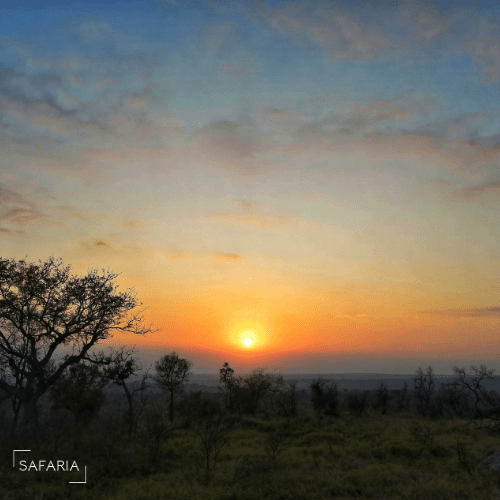
Kruger Park Half Day Sunrise Safari.
For those guests who have only half -a-day available or wish to spend the morning up to lunch on Safari, this is the perfect tour for you. Its an enchanting time of day to listen to the day chorus and watch as the sun rises over the savanna.
Duration: 05h30 - 12h30 Price: From R1,575 per person (Excl KNP fees, based on #no of guests)

Private Vehicle Full Day Safari
For Families and small groups we recommend booking a private Kruger National Park safari with your own Private Guide and Open Safari vehicle over a full day. This is a personalised experience with your own flexible itinerary and is perfect for families with kids, avid birders, naturalists and photographers. Highly recommended!
Duration: 6+ Hours Price: From R5,000 (Half) R6,750 (Full) (Excl KNP fees, vehicle rate, 8 guests )
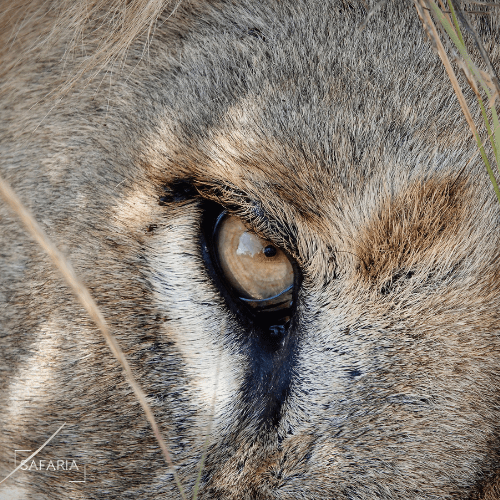
Kruger Park Full Day Safari.
Our Full Day Safari offers guests the best opportunity to see the Kruger National Park, its diverse landscapes and most importantly its wildlife. With a Full Day, your guide has more time to share the wonders of the Kruger and all its characters.
Duration: 05h30 - 15h45 Price: From R1,750 per person (Excl KNP fees, based on #no of guests)
Favorite Overnight Kruger Park Safaris.
Book a 2,3,4,5 or 6 night safari tour inside the Kruger National Park and let us share with you the timeless charm of Kruger as well as the incredible bio-diversity, history and heritage of this pristine wilderness.
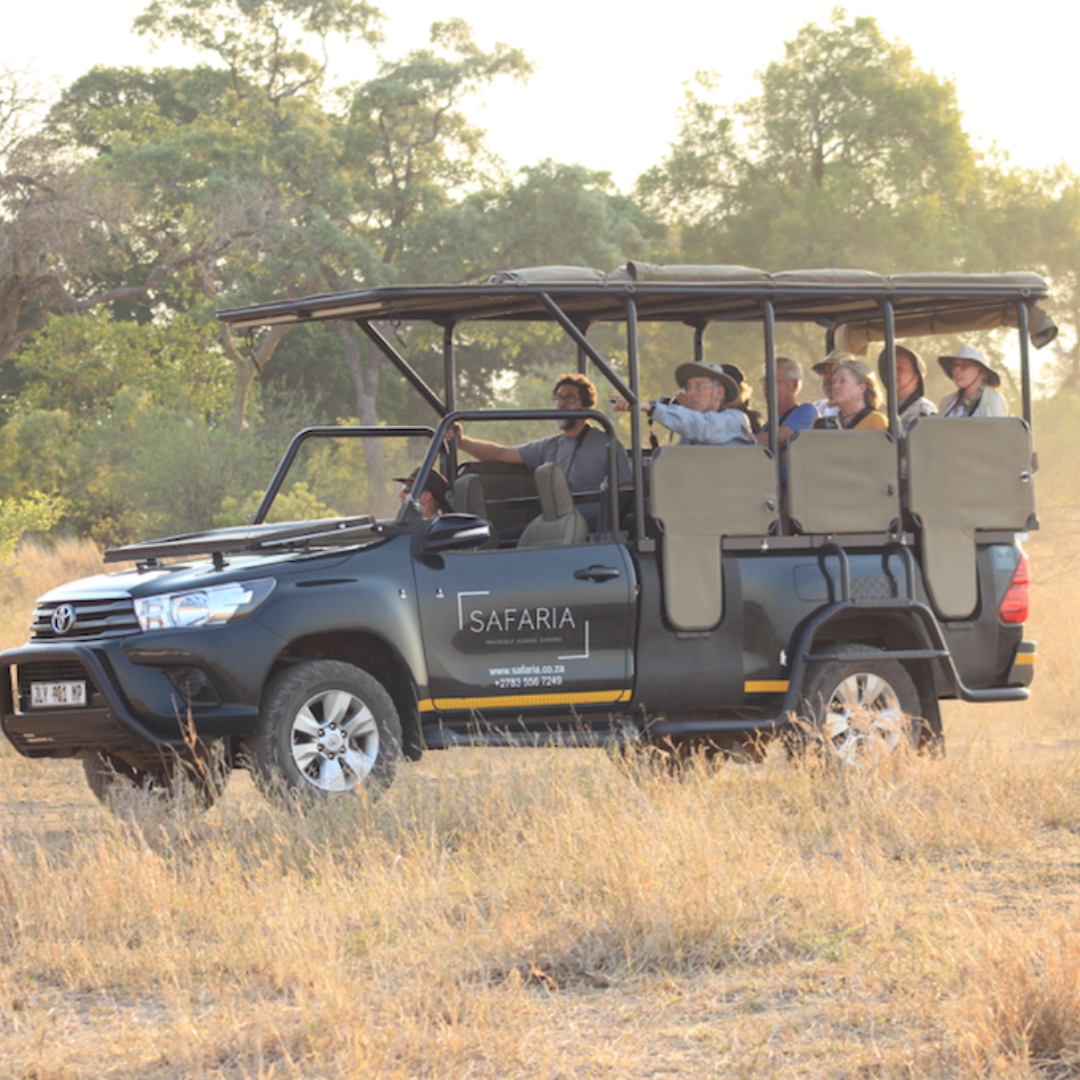
Your Kruger adventure starts here.
Day trips | overnight trips.
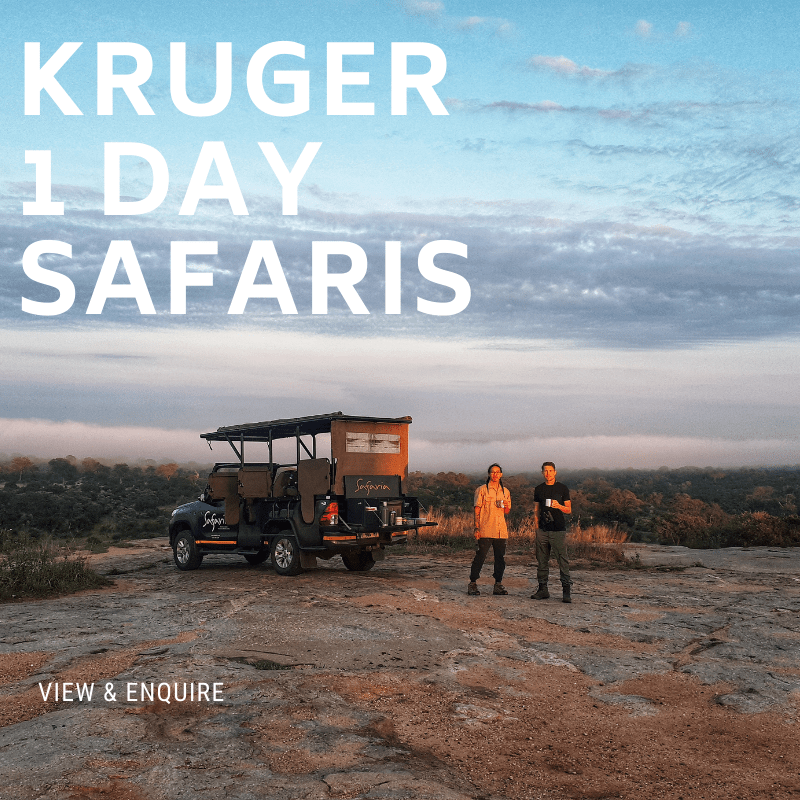
Private Kruger Park Day Safaris
Explore Kruger with your own Private Safari Guide and Open Safari vehicle for either a Half-Day or a Full Day Kruger National Park Safari. Click for more..
Duration: 6 to 10 Hours Price: From R5,000 for 8 guests (Excl KNP fees, max 8 guests)
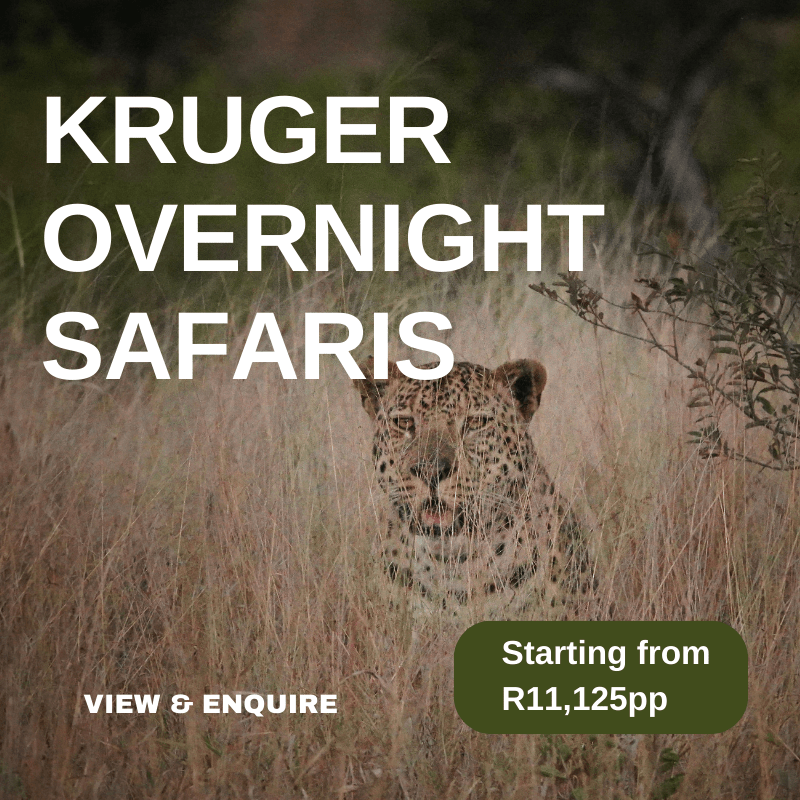
Kruger National Park Safari Tours
Explore the Kruger National Park over, 2, 3, 4, 5 or 6+ nights with your Private Safari Guide and Open Safari Vehicle. Click here for more..
Duration: 2 to 7 Days Price: From R11,125 Incl KNP fees, Accommodation & meals
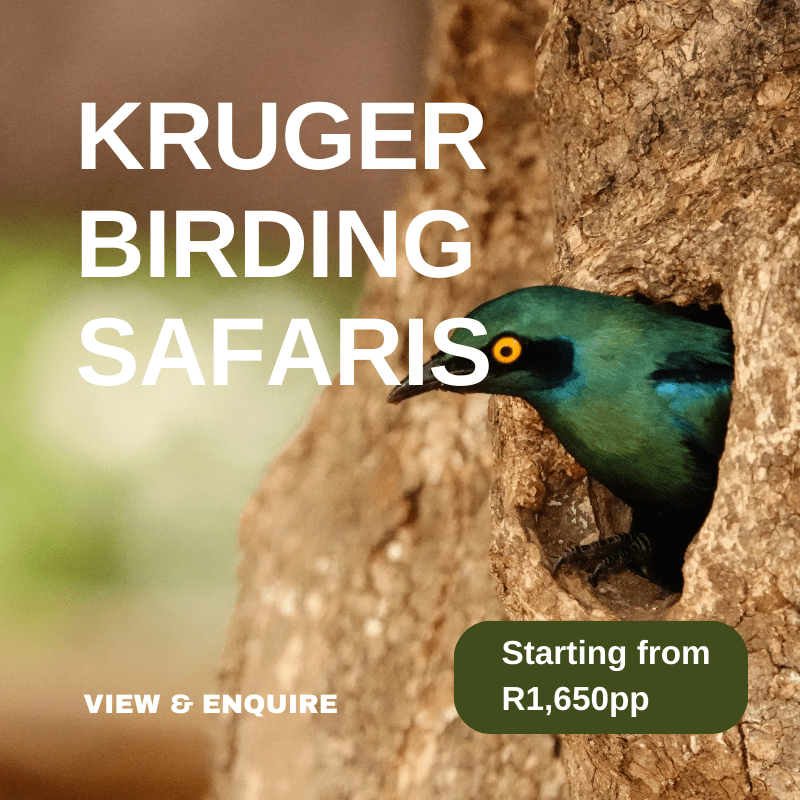
Private Kruger Park Villas
Explore our range of personally selected and affordable 5* Private Villas for families and small groups.
Price: From R1,650pp (2 - 5 Days Personalised Itineraries)
Overnight Kruger Park Safaris
Looking to book that unforgettable Overnight Kruger National Park Safari experience then we have the perfect packages for you. Choose from our personalised itineraries or let us help you create the perfect itinerary.
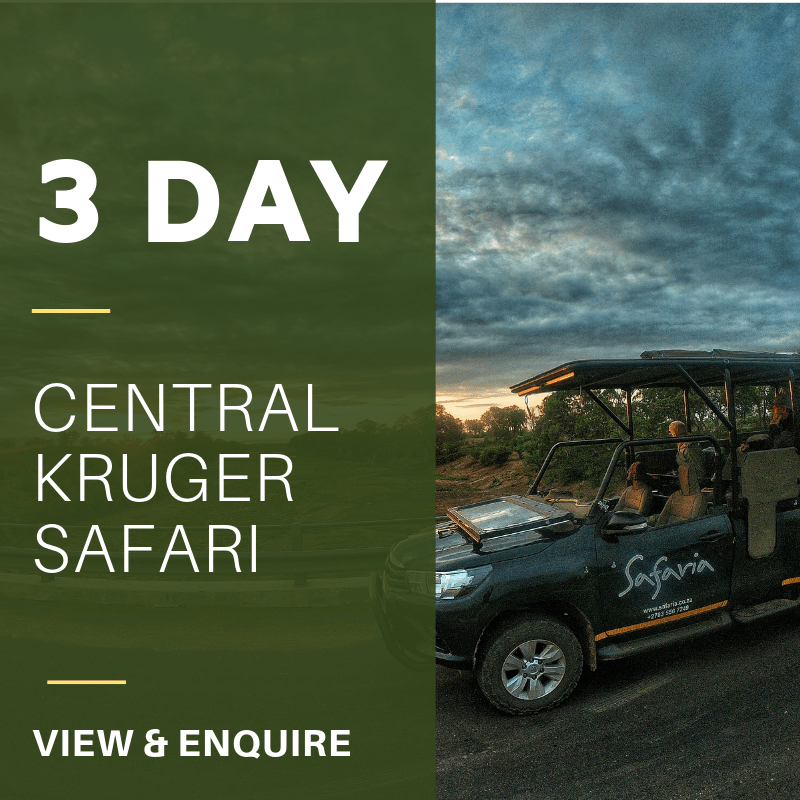
Top TIPS on planning your Kruger Safari ?
Here are some of our suggestions and recommendations when planning your safari...., privately guided safaris, tailored itineraries & luxury destinations.
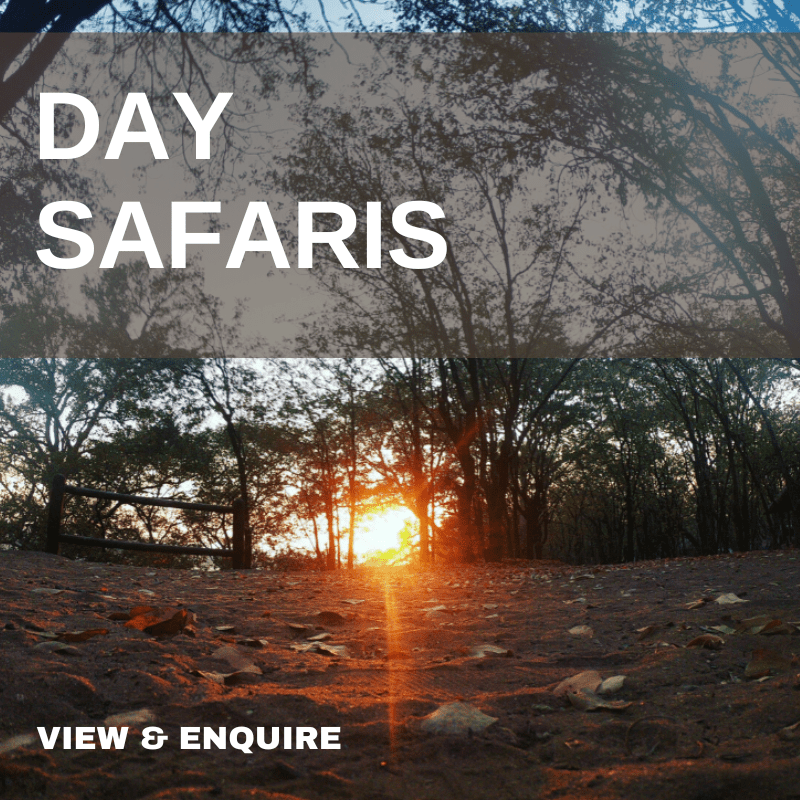
Experience the iconic Kruger National Park with renowned guide Andrew Wagner who will take you on a Half or Full Day Safari journey through the greatest Big 5 destination in South Africa.
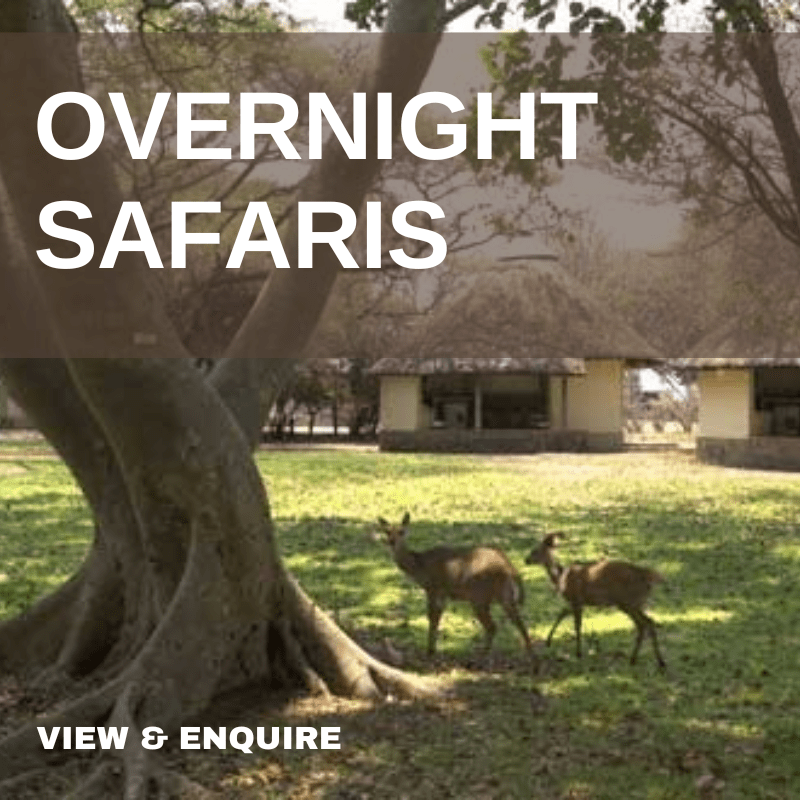
Overnight Safari
Safaria offers guests Overnight Kruger Park Safari packages within the park so guests can truly experience and enjoy the adventure of staying overnight in this iconic destination.
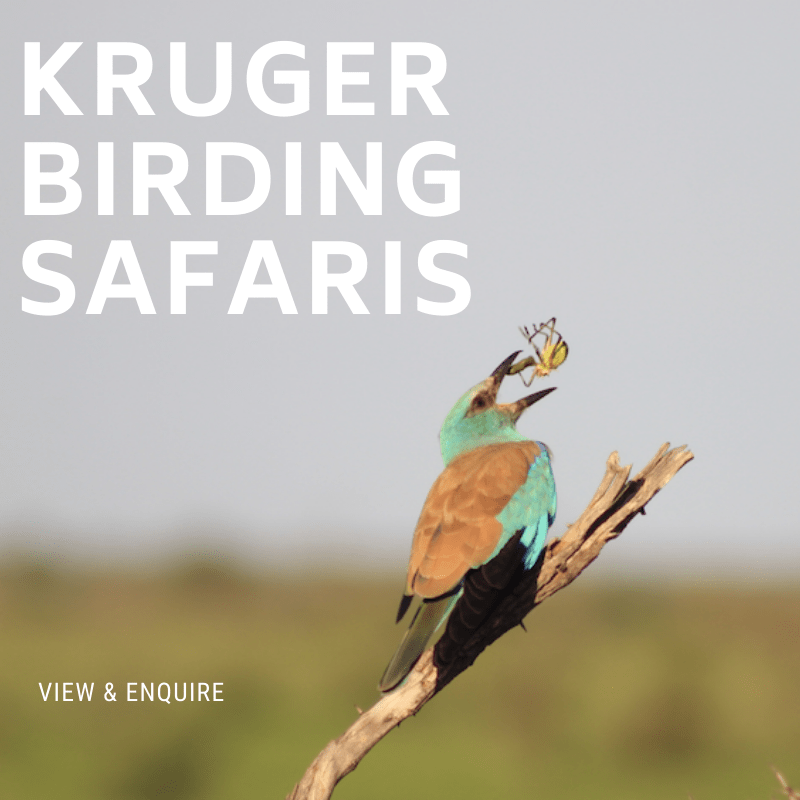
Birding Safaris
If you are looking for a professionally guided Kruger National Park Birding Safari, We have hand crafted these safaris based on experience and the quality birding they provide.
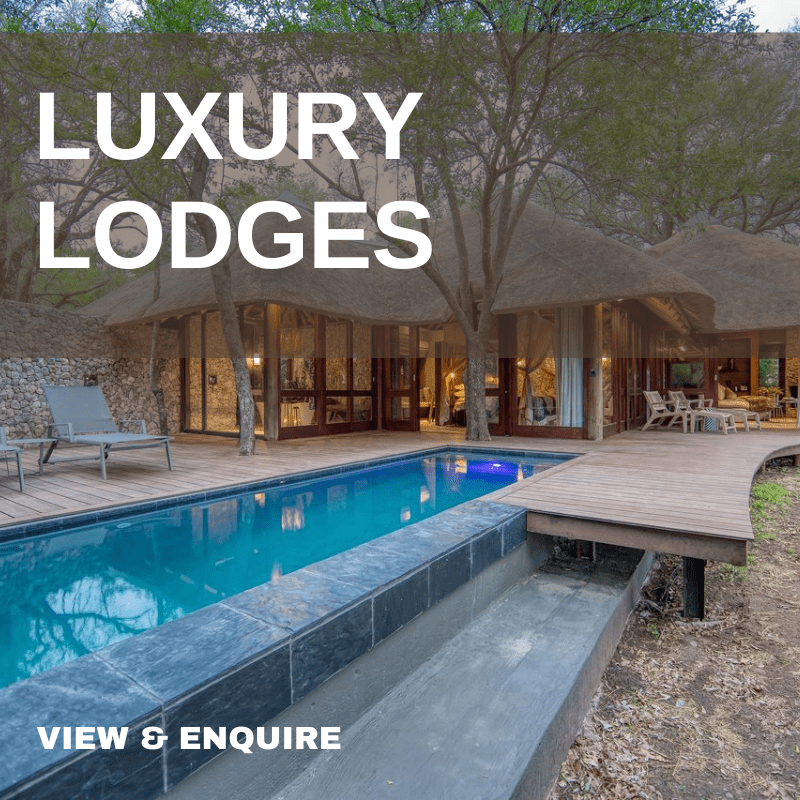
Luxury Lodges
Have a look at our Luxury Safari destination and how we use them to create out of this world experiences. Each Lodge can be stayed at independently or blended together for personalised itineraries offering incredible diversity and experiences
Learn more about Krugers iconic animals.
Lions have long been regarded as the kings of the savanna. learn more about their history in the kruger national park., understanding the different regions of kruger national park.
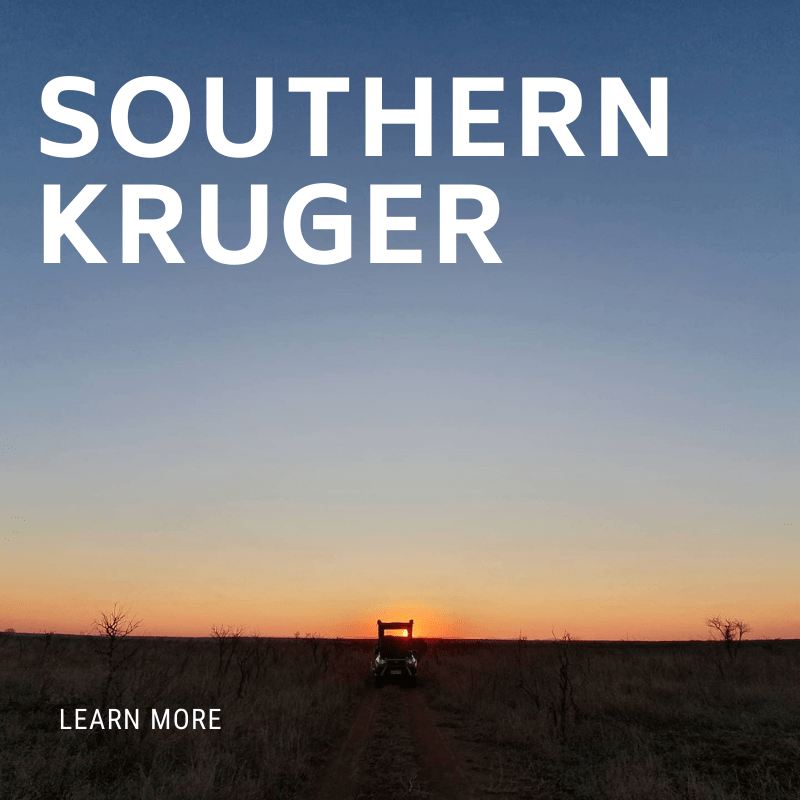
Explore the Kruger on a 1920's luxury train safari
Our privately guided 4 day kruger train safari experience takes you on a wild and historical journey of the kruger national parks first railway route..
Discover more about who we are
We don't just say that we are a Premium, Private Kruger Park Safaris operator because its sounds good. Its what we do, and its what our clients say.
As a Specialist Kruger National Park Safari operator what we are saying to our clients is that we are not just a tour in the Kruger Park but rather a privately owned, privately guided small group operator that has carefully curated a variety of the best experiences in the Kruger National Park to share with you our guests. Our Safari Style is also some what different in that our Kruger Park Day Safaris as well as our Overnight Kruger Park Safari Packages have all been created to offer you a deeper and more manful experience of this iconic wilderness. We love the Big 5 but sadly we wont just chase around after them because the story of the Kruger National Park is far more wonder-filled than just five species. The Kruger National Park has an incredible bio-diversity that is perfectly balanced with an ambience and atmosphere that captures an authentic sense of safari and its the synergy of all these attributes, and the way we tell this story, that makes our Safaria experiences unlike any other in the Kruger.
Why our customers love us*
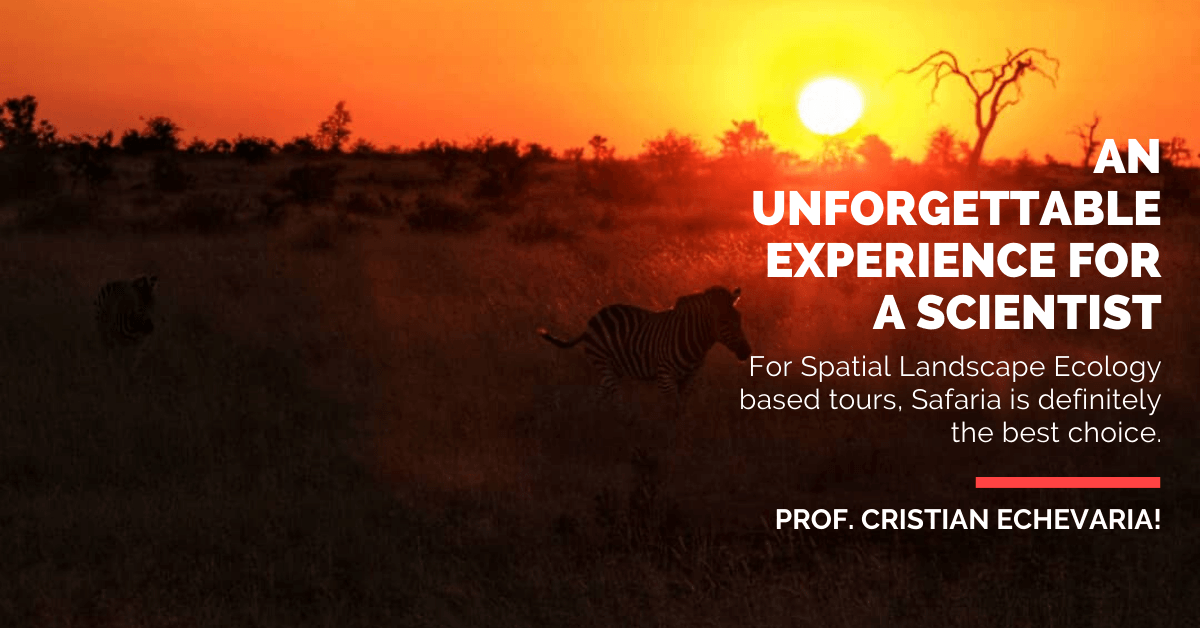
The Kruger Park Experience you'll never forget
Have a look at our kruger park tour reviews to see what our guests have to say., follow our #hashtags on facebook and instagram #krugerpark #krugersafari #safaria #bestkrugersafari #safari #krugerparksafari, contact us on whatsapp, tel: +27 83 556 7249 email: [email protected] white river, 1240, south africa, send us a request & we'll plan your perfect kruger safari.
- Name First Last
- A short message about a specific Safari?
- Sunrise Safari
- Full Day Safari
- Sunset Safari
- Photographic Safari
- Sunrise Walk & Drive
- Child friendly Safari
- 2 Day Southern Kruger
- 3 Day Central Kruger
- 4 Day Explorer Safari
- 4 Day Northern Kruger
- 4 Day Kruger Train Hotel
- 5 Day Northern Kruger
- 6 Day Complete Kruger
- 8 Day Ultimate Kruger Safari
- Privately Guided Safaris
- Full Day Birding
- 3 Day Birding Safari
- 4 Day Birding Safari
- 5 Day Birding Safari
- Birds of Kruger
- 1 Day Photographic Safari
- 4 Day Photographic Safari
- 7 Day Photographic Safari
- 10 Day Photographic Safari
- Langa Langa Camp
- Kruger Park Safari Villas
- Dulini – Sabi Sands
- Savanna – Sabi Sands
- Bateleur – Timbavati
- Shalati Train – Kruger
- Panorama Highlights
- Panorama Waterfalls
- Panorama Views
- Panorama Heritage Trail
- Meet Andrew
- Guiding Team
- Safari Vehicles
- Terms & Conditions
- Guest Reviews
- Safaria Blog
- Kruger Park Map
- Kruger Park History
- Kruger Park Camps
- Kruger’s Wildlife
- Krugers Parks Trees
- Krugers Wild Flowers
- Kruger Park Geology
- Kruger Park – FAQs
- 0 Shopping Cart
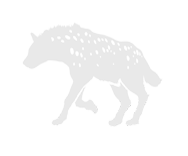
WILD KRUGER PARK SAFARI DRIVES AND BUSH WALKS
Wild Kruger Park Safari Tours and nearby Private Game Reserve Safaris. Stunning scenery on Bush Walk and Game Drive.
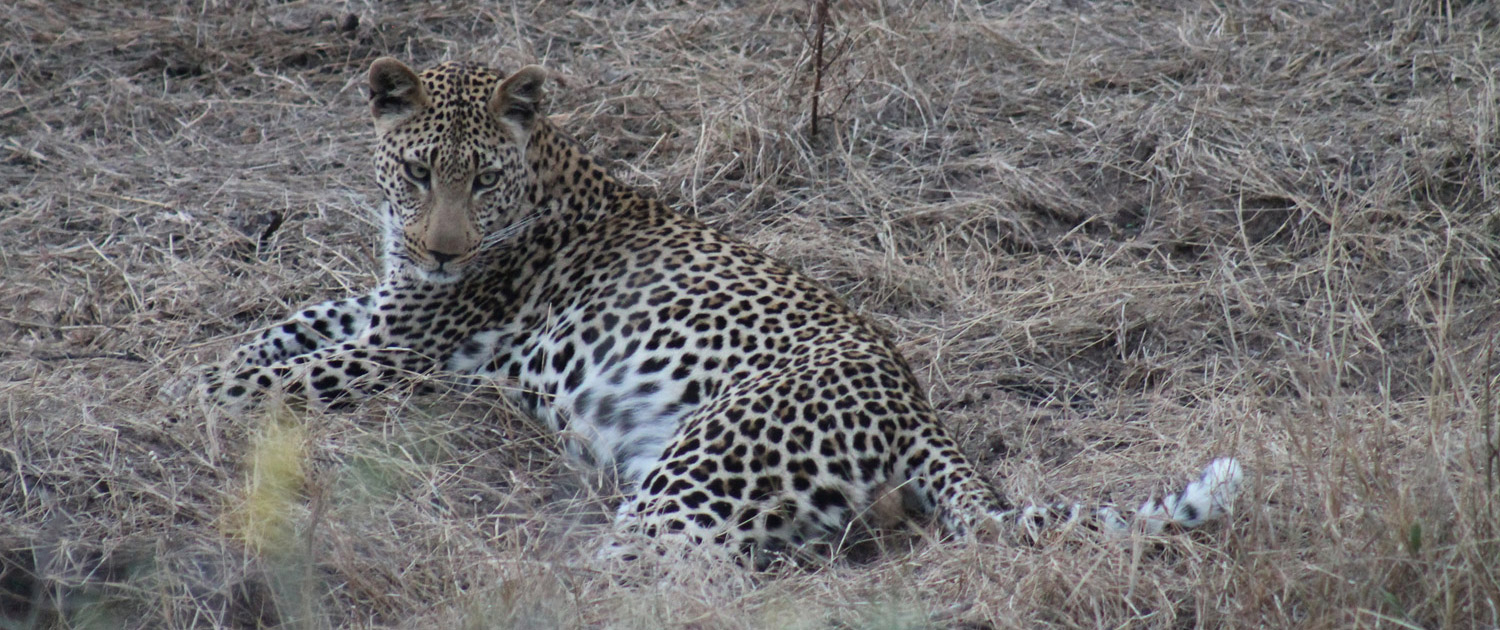
KRUGER PARK SAFARIS WITH FANTASTIC WILDLIFE SIGHTINGS
Enjoy a Wild Kruger Park safari with shuttles, open-sided game drives, meals and accommodation included.
Therefore our wildlife safaris are definitely the top in Africa!
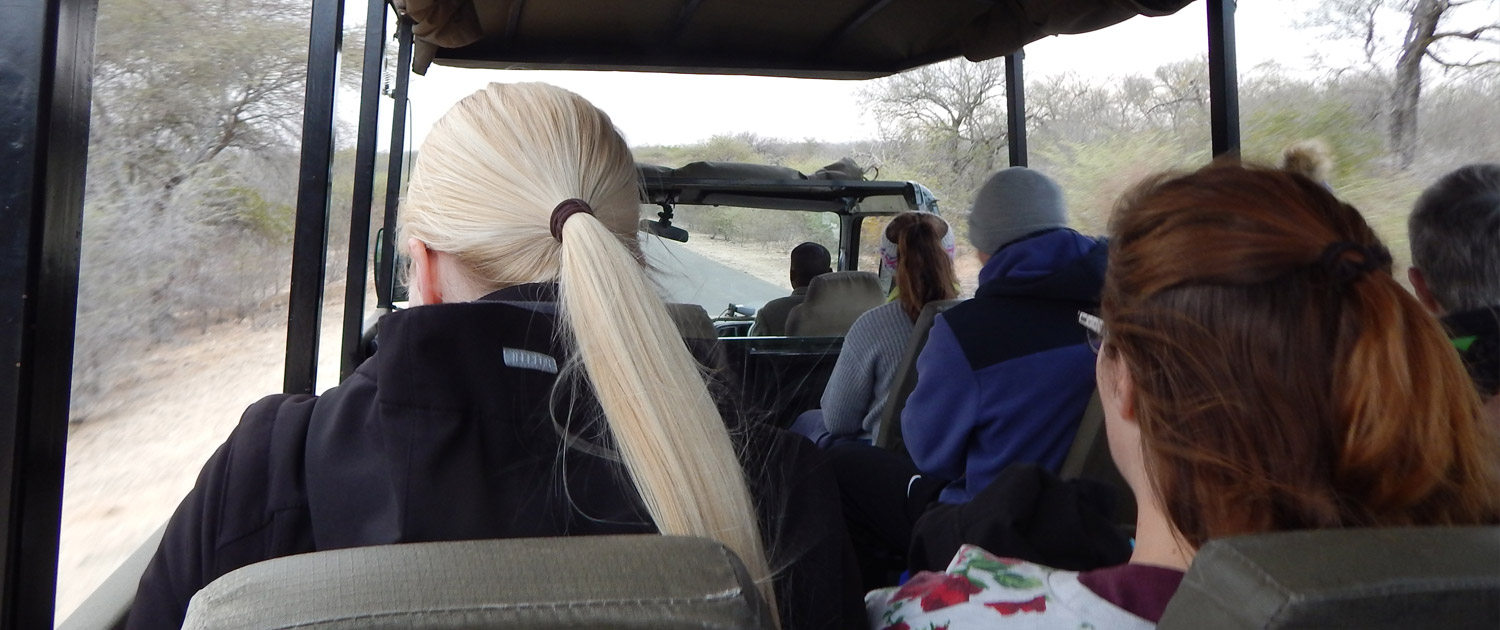
KRUGER NATIONAL PARK SAFARI AND SABI SAND LODGE
Our Kruger National Park safari and Sabi Sands luxury Lodge safaris are fantastic! Safaris include guided bush walks and game drives after dark.
Kruger Park safari combined with a Sabi Sand Luxury Lodge. Click to open the information.
Kruger and Sabi Sand Safari
Discover African wildlife inside Kruger Park and Sabi Sand. Experienced game rangers will take you on thrilling game drives and armed bush walks to explore the untamed wilderness on this Kruger Park safari with Sabi Sand.
Visiting Sabi Sand and Kruger National Park promises the best wildlife sightings you could ever imagine. Sabi Sand has the highest concentration of leopards in the world.
Sabi Sand Luxury Lodge Safari. Click to open the information.
Sabi Sand Safari
See amazing African wildlife inside Sabi Sand private game reserve. Experienced game rangers will take you on thrilling open-air game drives and armed bush walks to explore the untamed wilderness on this Sabi Sand Safari.
Visiting Sabi Sand promises the best wildlife sightings you could ever imagine. Sabi Sand has the highest concentration of leopards in the world.
Click to see more information on a Kruger Park safari accommodated in an en-suite hut.
Kruger Park safari in an en-suite bungalow
Dream of doing a Kruger National Park safari inside Kruger Park. So this Kruger Park safari has a veranda, fridge, air-conditioner, en-suite bathroom and clean towels.
Brunch as well as dinners with beverages of are included. Furthermore an experienced ranger/guide will share the best hiding spots of African wildlife on an open-sided game-viewing vehicle.
See our Lodge-Treehouse Kruger Park Safari Options
Lodge-Treehouse Kruger Park safari
Elevated wooden cabins are used for the Lodge-Treehouse Kruger Park Safari. Qualified game rangers will share their wisdom of African wildlife with you on Kruger safari drives as well as guided bushwalking.
Therefore, make your stay memorable with a variety of activities such as sunset drives, bush walks, Kruger game drives, animal rehabilitation centre visits and much more!
Click to find out more about a Luxury Tented Lodge Kruger Park Safari.
Luxury Tented Lodge Kruger Park safari
Enjoy a Luxury Tented Game Lodge (Katekani). Experienced game rangers will share their wisdom of African wildlife with you on Kruger safari drives as well as guided bushwalking.
Thus, you will be delighted with tasty meals South Africans regularly enjoy and luxurious suites.
Lodge-Tent Kruger Park Safari Option Information
Lodge-Tent Kruger Park safari
First Night in an Affordable Game Lodge. Bedded tents are used for the Budget Lodge-Tent Kruger Park Safari. Experienced game rangers will share their wisdom of African wildlife with you on game drives as well as bush walks.
Private game reserve activities. Also, touch a cheetah at an animal rehabilitation centre!
Read More About an Affordable Game Lodge
Affordable Game Lodge Safari
This safari is for the budget conscious traveler who likes to socialise. Dreamt of staying en-suite in a private game reserve? Enjoy a variety of activities such as a Traditional Braai, Game Drives, Bush Walks, Animal Rehabilitation Centre visits and viewing the Blyde Canyon.
Learn more about Kruger Park safari drive activities.
Kruger Game drive
Special Kruger Game drive experience with an trained game ranger, not only offers a bucket-list experience in the vast open spaces of Africa. However, get up close and personal with the Big 5 to take the most fantastic pictures!
Spend hours in Kruger National Park and see more African wildlife than you can imagine. The beautiful sight of Kruger Parks’ elephants, leopards, lions, hyenas, buffalo and antelope will be awesome.
Learn more about Panorama route tours.
Blyde River Canyon Panorama Route Tours
Take a full day to visit viewpoints such as Gods Window, Lisbon Falls, Three Rondavels and Bourkes luck.
Kruger Park safari, luxury lodge safaris and other African safaris are available with Wild Kruger.
Wild Kruger offers you Kruger National Park safari packages on your budget inside the Park and at Private Reserves.
Therefore a Kruger Park safari from Johannesburg can be replaced by taking flights to the closest airport to join other Kruger Park tours. You can also take a Kruger Safari from Johannesburg. Build your own itinerary today!
We provide luxury lodge Kruger National Park safari packages, Kruger and Sabi Sands safaris and other South African safari options. Garden Route safaris, Kruger, Swaziland and Kwazulu-Natal safaris as well as any safari you can think of is available.
Safari Packages:
Overnight Kruger safari options include activities such as guided bush walks, safari drives in open-sided safari game drives, meals and drinks.
Combine tour elements and build an itinerary based on affordability.
Furthermore, different price options offer a budget Kruger National Park safari experience.
As mentioned, you can also choose to visit other African wildlife hot spots like taking a Victoria Falls safari. Wild Kruger Park tours is the provider of choice when it comes to your top-notch African safari. Furthermore, Wild Kruger makes use of experienced game rangers for your personal safety and guarantee brilliant service on your Kruger Park safari or African safari. Also, we have many Corporate Social Investment initiatives.
Experience the magic of African wildlife on a unique budget Wild Kruger Park safari.
Thus, with affordable rates and delicious South African safari cuisine, you cannot go wrong!
Guest Feedback About Their Wild Kruger Park Safari:
Please share this web page by clicking on a social share icon.
- Share on Facebook
- Share on Twitter
- Share on WhatsApp
- Share on Pinterest
- Share on LinkedIn
- Share on Tumblr
- Share on Vk
- Share on Reddit
- Share by Mail
Wild Kruger Park Safari Reviews
Get a quotation, click to email us, click to call us, click to whatsapp us, follow kruger park safari sightings on social media.

A 7-Day Ultimate Kruger Safari Itinerary | South Africa’s Best Trip
The Kruger National Park is a picturesque location that captivates true African beauty. With boundless landscapes and spectacular wildlife sightings, it’s an adventurer’s dream destination. We’ve put together this 7-day ultimate Kruger itinerary for your next trip.
It is the perfect spot for those looking for a safari in South Africa. However, you will need a well-planned program because this world-renowned wildlife sanctuary comprises nearly two million hectares of land.
To help you plan your next adventure, we’ve created the ultimate 7-day African safari that’s perfect for exploring everything the park has to offer. It includes must-see experiences in the Kruger, fit for every budget.
Note: For more pricing information, check out the Kruger National Park safari prices .
Kruger National Park South Africa: What to Expect
The Kruger Park in South Africa is a top destination for safari-goers and one of the largest game reserves in Africa. It is located in northeastern South Africa across the Limpopo and Mpumalanga provinces.
The Kruger was established in 1926. The combination of Sabi Game Reserve, Shingwedzi Game Reserve, and local farms created the first national park in South Africa. During your Kruger National Park tour, you’ll find remarkable ancient rock paintings with a history dating back far beyond its official opening as a park.
It boasts a spectacular diversity of wildlife with high densities of the admirable Big 5 (lion, leopard, buffalo, elephant, and rhino). You’ll come across an abundance of animal species during this 7-day safari in South Africa – more than any other African wildlife sanctuary.
Kruger National Park Animals
The Kruger National Park is home to a breathtaking diversity of wildlife. From easy-to-spot elephant herds to rare black rhino sightings, it supports an abundance of species found in southern Africa. The biodiversity found in the Kruger includes:
- 148 mammal species – Big Five animals, zebras, cheetah, spotted hyena, common warthog, greater kudu, mongoose, hippopotamus, and crocodiles
- 35 amphibians – bushveld rain frog, striped stream frog, shovel-footed squeaker, and common platanna
- 118 reptile species – black lined plated lizard, flap neck chameleon, rainbow skink, and southern tree agama
- 53 fish species – tigerfish, catfish, African mottled eel, rainbow killifish, and squeaker species
- 505 species of birds – hawk-eagle, bat hawk, sanderling, grey plover, grey-headed gull, and cape wagtail
One of the biggest attractions is the park’s large Big Five population. It supports the largest concentration of both leopards and critically endangered rhinos. Another endangered Kruger animal that you’ll find is the African-painted dog.
Tip: For the best sighting opportunities, check out our guide on Kruger National Park animals .
Kruger Park Size
How big is the Kruger National Park? It is the largest game reserve in South Africa, covering an area of 19,623 square kilometers. The National Park offers exceptional wildlife sighting opportunities and interactive experiences with unfenced infrastructure allowing animals to roam freely.
The Kruger’s network of game reserves includes:
- Sabi Sand Game Reserve – the oldest privately owned reserve in the country
- Timbavati Private Nature Reserve – you’ll find exceptional photographic opportunities
- Klaserie Private Nature Reserve
- Thornybush Private Game Reserve
- Mala Mala Game Reserve – an internationally renowned location situated in Sabi Sand Game Reserve
Kruger National Park Camps
Whether you’re looking for rustic bush accommodation or a 5-star luxury lodge, there is a Kruger camp well-suited for any trip to the Kruger National Park. To help you plan your South African safari, we’ve listed the best accommodation and main camp options below:
- Bushveld Camps – Bataeleur, Shimuwini, Sirheni, Talamati, and Biyamiti
- Overnight Hides – Sable and Shipandani
- Luxury Lodges – Sabi Sabi Earth Lodge, Lion Sands Ivory Lodge, Singita Boulders, and Rattray’s on MalaMala
- Satellite Camps – Balule, Tsendze, Moroela, and Tamboti
- Bush Lodges – Pafuri Border, Boulders, and Roodewal
- Main Rest Camps – Berg-en-Dal, Crocodile Bridge, Satara, Letaba, Lower Sabie, Olifants, Skukuza, Shingwedzi, and Orphen
7-Day Kruger National Park Itinerary – Safari Experiences & Excursions
Get ready to tick off items on your safari bucket list with an unforgettable adventure in the Kruger. This 7-day South African itinerary includes phenomenal experiences that attract adventurers from all around the world.
7-Day Kruger Park Itinerary – Daily Game Drives, Excursions & Tours
Get ready for the ultimate South African safari. Here’s the best way to cover the entire park in just seven days.
Day 1: Arrive in Kruger & Night Game Drive
The National Park is home to Kruger Mpumalanga International Airport. It is a 50-minute drive (42.6 km) from southern Kruger’s Numbi Gate.
Most visitors travel from O.R. Tambo International Airport (Johannesburg) or Cape Town International Airport with connecting flights to one of the following locations:
- Kruger Mpumalanga International Airport (southern section)
- Hoedspruit Eastgate Airport (central and northern parts)
- Phalaborwa (northern area)
After you’ve arrived at your chosen accommodation, it’s time to unwind and take in the fresh African air. Get comfortable, grab a bite, and relax after a long day of traveling.
Once you’re well-rested, head on either an afternoon game drive or a night game drive and explore the spectacular surroundings and wildlife in the park. An excellent opportunity to view the park’s popular nocturnal animals – keep an eye out for a hunting predator.
Day 2: Kruger Tablets & Wildlife Sightings
On your second day, head to the southern section of Kruger Park, where you’ll find the largest lion population in the entire park. With around 1,600 lions in the Kruger, you’re likely to spot them in several locations. For the best sightings, visit the Kruger Tablets situated in the Nkayeni Region.
The Kruger Tablets commemorate the park’s founder, President Paul Kruger. It is a lion haven, perfect for viewing these big cats as they laze around on rock formations.
Visiting the tablets is a free activity. However, facilities such as restaurants, picnic tables, and restrooms are not available. If you’ve built up a lion’s appetite on the drive back, why not enjoy a delicious bush braai (South Africa’s famous barbeque).
Day 3-4: Explore the Kruger Park
It’s time to get your boots dirty for the next two days. Get ready for an early morning wake-up and explore the park’s breathtaking beauty on foot. A sunrise wilderness walk or tackling an early morning hiking trail is a splendid way to start your day.
Kruger National Park safari tours include guided walking safaris that are ideal for exploring the fascinating fauna and flora. Don’t worry; you won’t have to spend all day on your feet. Book a few 4×4 game drives on open safari vehicles for an exhilarating adventure with Kruger Park’s experienced guides.
Tip: Book a full-day private safari from Hazyview (if you’re not staying in the park) to get the most out of what the Kruger National Park offers.
Game viewing opportunities may vary with sunrise, sunset, and night drives. So, signing up for several game drives is beneficial. Wildlife sightings that are common on Kruger Park tours and game drives include impala, zebras, giraffes, elephants, buffalo, and lions.
Day 5: Visit The Moholoholo Wildlife Rehabilitation Center
On day five of this African safari itinerary, make your way to the Moholoholo Wildlife Rehabilitation Center in Hoedspruit. It is situated at the base of the Drakensberg mountains – an estimated 47-minute drive.
The rehabilitation center cares for injured and abandoned animals in southern Africa. They focus on creating awareness of endangered animal species around the world.
When visiting, you can engage in educational programs and guided tours in a relaxed environment. You’ll find various birdlife and mammals such as wild dogs, leopards, and lions. After an eventful day as part of your South African safari itinerary, spend time stargazing and relaxing before calling it at night.
Day 6: Take a Trip To The Hippo Pool
The last full day of your Kruger park vacation calls for a visit to the Hippo Pool. Head over to the Crocodile bridge gate in the park’s Marula region. You’ll find the Hippo Pool just 8 kilometers away.
As its name suggests, you’ll find hundreds of grunting, sloshing hippos with a spectacular view of the Crocodile River on this bush walk. Although there are crocodiles around the river, they’re usually harder to spot.
Keep an eye out for other animals roaming the river, including mighty elephants and buffalo.
After returning to your accommodation or lodge facilities, spend a few hours relaxing and tuck into a mouth-watering meal.
Enjoy a guided river or bush walk to appreciate the striking scenery in your last hours. Don’t forget to grab your camera to capture those memorable moments.
Day 7: Departure From The Kruger National Park
As you prepare to leave one of the best South African safari parks, take a minute to enjoy the splendid views of the Kruger Park around you for one last time – until your next safari vacation.
If you have a few hours before departing, book a spa treatment to leave the park feeling revitalized and refreshed.
Then it’s time to pack your bags, put on your shoes, and head to the airport. You’ll then catch your connecting flight and make your way home.
Final Thoughts on a Kruger Safari – The Ultimate South African Itinerary for 7 Days
Whether you’re a nature lover or thrill-seeker, a Kruger South Africa safari ticks all the boxes. From waking up to the melodies of diverse birdlife to viewing a hunting lioness after dark during a game drive, visiting the Kruger National Park will not disappoint.
Ready for a week of spectacular wilderness and wildlife viewing in Africa? Book the tickets and pack your bags – your African adventure awaits.
If a safari vacation seems to cost you a pretty penny at first glance, why not consider an all-inclusive package? Check out our guide on all-inclusive safari vacations in Africa .

Best Camps in Kruger National Park | A North to South Campsite Guide

1 Day Kruger National Park Safari Tour Itinerary
Tags: Safari

Cape Town Safari Glamping | Best Spots for Luxury Camping

Best Game Reserves – Western Cape | Safaris Near Cape Town

Safari Near Johannesburg | 4 Best Game Reserves

Kruger National Park Safari Prices | Best Game Drive Combo Deals

Compare items
- Total ( 0 )
Luxury Safari Company
Travel Company in South Africa
African Safari
Best Kruger National Park Safaris (View Cost, and Package Rates)
- Greater Kruger Luxury Private Game Lodge Safaris
- Kruger National Park and Cape Town Safari
- Private Game Lodge Kruger National Park Safari
- Kruger, Cape Town and Victoria Falls Safari
- Kruger Rest Camp And Private Game Lodge
- Kruger National Park Kruger Fly-In Safari
- Kruger National Park and Victoria Falls Safari
- 3 Day Classic Safaris Kruger National Park
- 4 Day Classic Safaris Kruger National Park
- 5 Day Classic Safaris Kruger National Park
- New Kruger & Victoria Safari 6 Day Kruger Park Victoria Safari
- New Sleepout Hide Safari 5 Day Kruger Park Hide Sleepover
- New Walking Safari 6 Day Kruger Park Walking Experience
- New Private Game Lodge Safari Your Kruger safari experience
- Kruger Guides
- Meet The Team
Award Winning Safaris
Fantastic specials on selected private lodges in the greater kruger national park, kruger park and victoria falls safari.
Combine two of the most iconic tourist destinations in the world into one phenomenal safari package with our 6 Day Kruger Park & Victoria Falls Safari.
Kruger Park and Cape Town Safari
The excitement of the big 5 the charm of the winelands and the most beautifull city in the world in one memorable holiday
Kruger Park, Cape Town and Victoria falls Safari
The ultimate Southern Africa holiday combining three of the most iconic destinations in one brilliant experience to remember for a lifetime
Private Game Lodge Combo Safari
Exclusive Private Lodge Spend between four and seven days on one of our Kruger Rest Camp & Private Game Lodge Safaris and experience the best of both worlds!
Experience the Ultimate Classic Kruger National Park Safari Tailor-made for over 17,500 guests since 1998
3 day classic kruger safari.
- En-suite accommodation, all meals included.
- 4 Kruger game drives, registered field guides
- See Africa’s well-known Big 5
- Entry fees and conservation levies included
4 Day Classic Kruger Safari
- Accommodation is in en-suite chalets
- Entry fees and daily conservation levies
- Daily open vehicle game drives
- Delicious breakfasts and dinners
5 Day Classic Kruger Safari
- Tasty, wholesome breakfasts and dinners
- See Africa’s beloved and ever-popular Big 5
- Guided game drives with registered guides
- Authentic and memorable safari experience
Why choose Kruger Wildlife Safari Proudly African Vista
Authenticity, passion and professionalism are just some of the founding principles on which Kruger Wildlife Safaris was built. We believe in the charm and distinct beauty of the Kruger National Park and we want our guests to be able to experience that too. Specialising in small group Kruger safaris, expect an all-round personalised, tailor-made and truly South African experience when you travel with us.
Kruger National Park A Visitors Guide
The area covered by the present-day Kruger National Park was subject to human occupation for many millennia before it became a designated conservation area. Stone artefacts show people were living in the area during the Early, Middle and Late Stone Ages. San hunter-gatherers made their appearance in the area about 5,000 - 6,000 years ago and occupied most of the present-day Kruger Park area. It is believed they left the area about 500 years ago after the ancestors of the present-day Bantu-speaking people moved into the region.
Paul Kruger, the president of the Zuid Afrikaansche Republic (ZAR) proclaimed the Gouvernement Wildtuin (Government Game Reserve) on 26 March 1898. He was born Stephanus Johannes Paulus Kruger in the small district of Steynsburg in South Africa in 1825. In 1836, his family joined the Great Trek where they eventually settled near the town of Rustenburg.
A slightly eccentric figure who grew up to be a large thick set, bearded man who often wore a black top hat, he became president of the ZAR in 1880 but left Pretoria in 1900 when British forces advanced on the capital, Pretoria. He was exiled in Europe and passed away in Switzerland in 1904. He is buried in Church St cemetery in Pretoria, South Africa.
The boundaries of the Government Game Reserve extended from the Crocodile River in the South, up to Sabie River in the north and from the Nsikazi River in the west to the Mozambique border in the east.
During the Anglo Boer War (1899-1902) the proclamation of the reserve, however, was nullified. After the war ended, the area was re-proclaimed, this time including the land between the Sabie and Olifants Rivers to extend the size of the reserve. It was named Sabie Game Reserve and its first warden was the legendary Major James Stevenson-Hamilton.
James Stevenson-Hamilton was born in Scotland in 1867, the eldest of nine children. His sense of adventure led him to join the British Army and he eventually made his way to South Africa. He felt a sense of belonging in South Africa’s bushveld and a genuine desire to conserve, rather than destroy.
His military experience and love of the bush made him an ideal candidate and at the age of 35, he became the first warden of the Sabie and Shingwedzi Game Reserves. He was known by his staff in the Kruger National Park as Skukuza, a Shangaan name meaning “He who sweeps clean”. In 1936, the main rest camp, Sabie Bridge was changed to Skukuza in his honour. He retired as warden in 1946 and passed away in 1957.
In 1903, the Shingwedzi (Singwitsi) Game Reserve between the Letaba and Limpopo Rivers was proclaimed and also placed under the authority of Stevenson-Hamilton.
In 1916, the Sabie and Shingwedzi Game Reserves were consolidated and placed under control of the Provincial Secretary of the Transvaal Provincial Council, and subsequently referred to as the Transvaal Game Reserve.
Whilst the Shingwedzi Game Reserve consisted exclusively of government-owned land, the Sabie Game Reserve did not, as a large portion of the Sabie Game Reserve consisted of private land. In fact, 152 farms in total were privately owned. As a result of the private ownership, a large portion of the western areas of the Sabie Game Reserve was excised in 1923 to make way for the creation of a National Park. This privately-owned land largely became known as the present day Sabi Sands Game Reserve (due to the presence of both the Sabie and Sand Rivers which flow through the reserve in an easterly direction towards Mozambique), where many of Africa’s famous luxury safari lodges are situated.
On 31 July 1926, the Parliament of the Union of South Africa passed a National Parks Act and the reserve was renamed the Kruger National Park.
In 1923, the South African Railways began a railway journey of the Lowveld and included an overnight stop at Sabi Bridge, present day Skukuza. No overnight facilities were available to the public at that stage and tourists slept on the train. These excursions became so popular that a ranger later accompanied the tourists and even arranged short bush excursions for them.
James Stevenson-Hamilton was impressed with the interest shown by the public and, in 1925, began promoting developments to attract more tourists. At the time however, no roads, bridges or tourist facilities were available, and most travelling was done on horseback or ox wagons with pack donkeys.
In mid-1927 it was decided that the Pretoriuskop section be opened to the public, subject to a number of conditions:
- Visitors entered at their own risk,
- An entrance permit at a cost of £1.00 had to be obtained,
- Visitors had to produce the permit on demand,
- Visitors were only allowed to travel on a specified route from White River, via Mtimba to Pretoriuskop , and back via the same route on the same day,
- No rifles were permitted, only revolvers,
- No hunting or disturbing of animals was allowed.
Due to malaria and road conditions, the Kruger National Park was closed during the rainy season. And so, tourism into Kruger Park was born and has since then transformed into what it is today - an impressive, well-run and extremely organised National Park that South Africans are extremely proud of.
Ranging from self-drive visitors to safari operators arranging guided Kruger safaris , people from literally all over the world visit the Kruger National Park every year. Our park is much loved and well-protected - long may it continue.
Flora and Fauna
Rough estimates of major large herbivore populations of the Sabie and Shingwedzi Game Reserves in 1918 were as follows:
The latest census taken in 2010/2011 show the following numbers:
Predator numbers in the 2010/2011 census:.
- Mammals – 148 species
- Fish – 53 species
- Birds – 505 species
- Amphibians – 35 species
- Reptiles – 118 species
- Plants – 1,990 taxa
The diversity of the Kruger National Park is truly astounding, a veritable nature lover and photography enthusiast’s paradise. All wild and free roaming animals, that have always occurred here naturally, integrating perfectly into their respective ecosystems.
If, as a visitor to the Kruger National Park, you want to see a wide range and diversity of wild animals, there is, in our opinion, no better National Park to visit on the entire African continent. Yes, Kruger Park is commercial and yes, there are a lot of people driving around and, at some sightings especially the Big 5, it can become overcrowded. But the diversity of species found in Kruger Park is fantastic. Visitors are seldom disappointed. We, here at Kruger Wildlife Safaris , have on many occasions during the course of a single morning game drive on one of our safaris, seen all of the Big Five, and it did not end there. You’d be hard pressed to have as exceptional an experience in other National Parks in Africa.
The Big 5 consists of lion , leopard, rhino, buffalo and elephant . Originally a hunting term used to describe Africa’s 5 most dangerous animals to hunt on foot in the bush, the photographic safari industry has “hijacked” the phrase and it’s now used worldwide as a marketing tool to attract tourists to Africa’s National Parks in the hopes of spotting these animals.
And yes, the Big 5 are fantastic to see, but remember, Kruger Park offers so much more than just the Big 5. Antelope, giraffe , hippopotamus, crocodiles, beautiful birds such as ground hornbills , lilac-breasted rollers and fork-tailed drongos and stunning savannah and bush landscapes all make the Kruger National Park a must-see when visiting South Africa.
Getting to the Kruger National Park
Access to Kruger Park is relatively simple and there are various options at your disposal to get you into the bush as soon as possible.
The self-drive option could have you in one of the southern camps like Skukuza in about 5 - 6 hours from Johannesburg’s O.R. Tambo International Airport.
Many of our guests transfer into the Kruger National Park by making use of our air-conditioned vehicles with our drivers. This option allows you to relax and enjoy the scenery whilst someone else does the driving. Transfers depart daily from Johannesburg and will have you in Kruger Park in around 6 - 7 hours.
There are daily flights from Cape Town and Johannesburg into the Kruger National Park and to nearby towns like Nelspruit, Hoedspruit and Phalaborwa. The most convenient is obviously to fly straight into the Kruger National Park. The flight lands at Skukuza Airport. Flights from Johannesburg take just under one hour whilst the flight from Cape Town is around two hours in length.
Safari Options when Visiting Kruger Park
The Kruger National Park comfortably caters to a wide range of tourist options. From self-drive journeys to Kruger safari tours, multi-day hiking trails, all the way through to 4x4 eco trails. It is advisable, especially if it's your first or second visit to the park to go with a registered company that has trained guides and makes use of open safari vehicles to take you on game drives and show you the bush. Safari trips range anywhere from 2 - 7 days although 4 days is probably the most popular option. Tourists can also choose between a range of safari styles to suit their budgets and operators offer everything from camping safaris and budget accommodated safaris to 5-star luxury lodges.
The cost of a guided safari in the Kruger National Park ranges from a very well-priced ZAR 5400.00 per person (US$ 385) for a 3 day camping safari, to hundreds of US$ per person per night, if staying in some of the luxury lodges that are situated inside the Kruger National Park.
The advantages of booking a safari with a registered safari operator include the fact that you have one channel of communication to arrange the entire safari, from the moment you are picked up at the airport to going on game drives - all the logistics have been taken care of, you don’t have to do anything else.
Self-drive options, whilst also very appealing, do mean you will need to arrange accommodation, car hire and activities. The bonus is, you can explore Kruger Park at your own pace and many operators do arrange services where they can book your self-catering holiday for a commission.
First time, self-drive visitors to Kruger do miss out. The presence of a knowledgeable guide is always appreciated, and even how to react and prepare yourself for potentially dangerous situations such as elephants walking down the road towards your vehicle is taken care of by an experienced guide.
It allows you to simply sit back and relax and let someone else take the responsibility. How to spot animals in the bush is also a talent that is learned with experience, many first-time visitors simply do not see some animals due to their excellent camouflage.
And then, of course, the simple identification of animals, birds and even trees is often lost to inexperienced visitors. Knowing the difference between a black and white rhino, cheetah and leopard, duiker and steenbok, wild dog and hyena , just to name a few, are challenges some people face. It may seem obvious but, in the bush, not always. We have often come across people claiming to be looking at a leopard when it is in fact a cheetah. A cat lying under a bush 150 metres away from your vehicle is not the easiest to identify.
Many operators start their safaris from Johannesburg where they will pick you up at the airport before departing on safari to the Kruger National Park. Some, like us, also have their own accommodation in Johannesburg where guests can stay overnight before their safari.
This allows guests to comfortably arrive a day before their safari starts and relax before embarking on the 6-hour drive into the Kruger National Park.
We also provide day tours in and around Johannesburg for guests to enjoy before or after their safari with us.
Kruger National Park Camps
Kruger Park has a few options when it comes to accommodation. There are main camps, satellite camps, bushveld camps, overnight hides and bush lodges.
The main camps are the ones we’ve all heard of - big camps, some bordering on small towns with amenities that include shops, restaurants, conference facilities, campsites, en-suite accommodation, some with museums and most have pools to cool down in during the summer. Kruger Park’s administrative capital is situated at Skukuza Camp - the Kruger’s biggest and busiest camp. Other main camps include Berg-en-Dal, Pretoriuskop, Lower Sabie, Satara, Olifants, Letaba, Mopani, Shingwedzi and Punda Maria.
The accommodation facilities at the main camps consist of campsites, huts with communal ablutions, chalets with en-suite facilities and air-conditioning, some have safari tents with en-suite facilities and guest houses where larger families/friends can stay.
Satellite Camps
Satellite camps are much smaller, more personal facilities where guests have to self-cater. There are no shops or other amenities available. Guests have to check in and purchase their food, wood and drinks before arriving. Once there, however, you are presented with an opportunity to experience the bush like few other places in the Kruger. We highly recommend booking a satellite camp if you prefer a “wilder” bush experience. Satellite camps include Balule, Malelane, Maroela and Tamboti.
The accommodation options here consist of campsites, huts and safari tents.
Bushveld Camps
Smaller, remote camps with good en-suite chalets make up Kruger’s bushveld camp portfolio. There are no restaurants or shops. Access is obtained via a private road for camp residents only. Guests are able to book individual chalets and do not have to book the entire camp. One of our favourite camps in the entire Kruger is found in this portfolio. Shimuwini, found along the banks of the Letaba River - an interesting 11-kilometre private road from the main H1-4 road that leads to Mopani Camp.
Shimuwini is beautiful and if you feel the need to unwind, this is the place. Other bushveld camps include Bateleur, Biyamiti, Sirheni and Talamati.
The bushveld camps’ accommodation options are en-suite and air-conditioned chalets consisting of a few rooms for slightly larger groups.
Overnight Hides
An interesting concept, not for the faint hearted. But if you’re a bush lover, the overnight hides give you a rustic bush experience. Basically, you overnight at bird hides that are open to the public during the day. The bird hides have beds that fold down for you to sleep on. You book the entire hide so it's just you for the night!
Once the last day visitors leave to get to their camp or exit gate, there is nobody else around. One of our guides stayed a night at Sable Hide - the hide is closed off to wild animals, so it's safe but that night, a pride of lions decided to make their presence known barely 50 metres from the hide. Imagine that - a pride of lions roaring all night at your camp and it's only you there! How awesome?! No shops are available so come fully prepared. There are only two overnight hides available in the Kruger National Park. They are the Sable and Shipandani Hides. Sable Hide is located close to Phalaborwa entry gate and Shipandani is not too far from Mopani Camp.
Overnight accommodation options are limited to fold out beds at bird hides. You need to bring your own sleeping bags and cooking equipment.
Bush Lodges
A bush lodge is the most exclusive option available to public visitors in the Kruger National Park. Basically, you book the entire camp, only you have access to the camp and there is a private road leading to the camp that only you may use whilst residing at the camp.
This type of accommodation is ideally suited to families who would like a more exclusive experience in the Kruger National Park. The camps are self-catering and have all the utensils and equipment you need to prepare meals. There are however no shops, so food and drink needs to be purchased before arriving.
Bush Lodges include Boulders Bush Lodge, Pafuri Border Camp and Roodewal Bush Lodge.
So how do you book and pay for all these fantastic facilities? Bookings can be done via website or you could approach a safari operator to book it on your behalf.
Popular Game Drive Routes around Restcamps in the Kruger National Park
Some restcamps in Kruger Park are more popular than others, mainly due to the variety and number of animals found in the vicinity of the camp. However, almost all restcamps have routes to drive that are popular, be it due to the potential of seeing animals or just because the scenery is beautiful.
Berg-en-Dal Restcamp – The Matjulu Loop (S110) is a scenic drive that encompasses some driving up a mountain and the beautiful views of Kruger that ensue. Wildlife in the area is good and often wild dogs are spotted along with rhino, which also means a great chance to see the more elusive black rhino.
Pretoriuskop Restcamp – A relatively short drive of an hour or two around the Fayi Loop (S14) close to Pretoriuskop is filled with promise and the opportunity to see some interesting animals. Apart from the usual popular species such as leopard, elephant and rhino, Pretoriuskop Restcamp has a reputation for delivering sightings of often rare and elusive antelope, especially for southern Kruger.
On the Fayi loop we have spotted eland, sable antelope and the very rare Lichtensteins hartebeest. One of our guides is also convinced he spotted a super rare species, the aardwolf. Patience is required for drives around Pretoriuskop and if you are patient, you will undoubtedly be rewarded for your efforts.
Lower Sabie – Probably Kruger Park’s most popular Restcamp, Lower Sabie offers visitors excellent opportunities to spot animals. Our pick for an awesome drive in the Lower Sabie area is to cross the Sabie River and drive along the tarred H10 road, as slowly as you can, and make your way to Mlondozi Picnic Site at Mlondozi Dam. From there, take the S29 west and then head back to Lower Sabie on the S128 driving in a southerly direction. We have seen literally all the popular wildlife species on this route, and it conveniently includes a restroom break at Mlondozi Picnic Site.
Skukuza Restcamp – The choices at Skukuza are many as the infrastructure around the camp is well developed. Our pick, however, would be the drive that starts with the H1-1, heading south. Continue on the H1-1 until reaching the dirt road S65, which heads off in the opposite northerly direction for 13 kilometres. Joining the S1, you turn right and make your way back to Skukuza on S1 and later the H1-1. It’s a nice mix of bush, tarred and dirt roads and an opportunity to see lots of animals. Also, an opportunity to visit the famous Mathekenyane Lookout Point where you can safely get out your vehicle and gaze upon the beauty of the park with a near 360 degree view of the African bush.
Nwaswitshaka Waterhole is also found on the S65 dirt road which often delivers lion and rhino. This route is beautiful and a photographer’s delight.
Satara Restcamp – Central Kruger looks different to southern Kruger, it's more a typical savannah-like landscape and you’re generally able to see further into the bush. Marula and leadwood trees dot the landscape, and then there’s wide open plains. Our pick for an awesome morning/afternoon game drive route would be to drive the S100 along the Nwanetsi River all the way to Gudzani Waterhole. After viewing the waterhole, turn south on the S41 and head towards Nwanetsi Picnic Site.
From the picnic site, head west on the H6 for 19 kilometres before turning back towards camp on the H1-3 where it’s a short drive back to Satara. It’s an awesome drive, with excellent opportunities to spot predators such as lion, hyena, leopard and cheetah, that makes Satara such a popular area for visitors. Some of our best lion sightings have come from this loop.
Just don’t forget to stop for the other animals too as giraffe, zebra , elephant and wildebeest, to name but a few, are prolific in this region of the Kruger National Park. And herds! You often see big herds of African wildlife here, something that’s not as common in southern Kruger.
Olifants Restcamp – As we proceed north in the Kruger, the infrastructure and access to the park becomes less. As a result, there are generally fewer visitors to the north of Kruger Park. Wildlife is also a little scarcer because it's generally drier and the north is regarded more as a bush veteran or wildlife connoisseur’s paradise.
When we, at Kruger Wildlife Safaris, go on holiday, believe it or not, we go to the Kruger National Park, and we head north. The drive along the Olifants River on the S44 soon takes you to the Letaba River, this road eventually becomes the S46 and the entire time is spent driving next to two of the Kruger National Park’s more famous rivers. Along the rivers, there are animals, especially in drier environments so your chances of seeing something exciting are good.
Once you reach Letaba Restcamp, stop over for a late breakfast or coffee and head back along the tarred H1-5 back to Olifants Restcamp.
Letaba Restcamp – Nestled amongst tall Jackalberry trees on the banks of the Letaba River, this camp is a sleepy, lazy and awesome camp to relax and take in the sounds and smells of Africa. Our pick for a game drive route would be to head north on the H1-6, take the short S95 loop that hugs the Letaba River, cross the Letaba River bridge where you can get out your car to view animals and then turn left onto the S62 for an interesting drive to Engelhard Dam. On the way there is a turn-off to Matambeni Bird Hide, take it as you can get out of your car to view animals and birds from a hide that overlooks the Letaba River. Drive the same road back to Letaba Restcamp.
Mopani Restcamp – Without a doubt the Tropic of Capricorn loop will have you writing books and poems on Africa and its beauty. This loop is quite long but oh so beautiful. We generally have a good opportunity to see some rare antelope species on this loop - animals such as eland and tsessebe, for example. From Mopani Restcamp travel north on the H1-6 until you reach the Tropic of Capricorn.
From there turn right in an easterly direction on the S143, continue on the S143 18 kilometres before joining up with the S50 where you turn south heading towards three waterholes on the Nshawu watercourse. Turn onto the S49 and head back towards Mopani Restcamp.
Tlhongonyeni waterhole on the S143, always bustles with wildlife. From 3 kilometres out, slow down, drive slow, keep your windows open and look, listen and smell. Large herds of elephant and buffalo (sometimes hundreds strong) antelope, zebra, lion and cheetah are occasionally seen - Africa in all its glory.
Shingwedzi Restcamp – Road infrastructure this far north becomes limited, but what a beautiful area of the Kruger National Park it is. It’s probably the only really significant drive in this area but it's well worth it.
Take the tarred road north from Shingwedzi. The first turn off is the short S55 loop which joins the main road again. Continue north before arriving at the Mphongolo loop which takes you all the way up to Babalala Picnic Site. After freshening up, head back south on the tarred road to Shingwedzi. Roan antelope! This is your mission for the day - super rare in the Kruger National Park. Also, early morning on the Mphongolo loop often delivers predators such as lions and leopards.
Punda Maria Restcamp – This is far northern Kruger and your goal must be to go all the way up to the Limpopo River and into the fever tree forest. It’s a full day’s drive so leave early and expect to come back late. Another very special, shorter route is the Mahonie loop around Punda Maria Restcamp. This short 23-kilometre drive is perfect for an afternoon drive before the gates close and you start your fire for the braai, with an ice-cold beer in-hand.
Kruger National Park Activities
Apart from providing accommodation, the Kruger National Park also provides activities catering to people looking for all types of adventure.
Admittedly the most popular activity is a Kruger safari (please could we send this hyperlink to the ‘Explore Our Most Popular Packages’ section on the homepage). Safari operators take you on game drives in open vehicles with experienced guides, pointing out animals, birds, trees and reptiles.
It's very popular and, to be honest, the perfect way to see lots of wildlife. Safaris range from day drives all the way through to 7-day, fully-catered and guided safari experiences.
Other activities include:
Morning/afternoon walks.
These depart from Kruger Park’s main camps in the early morning or afternoon. You are transferred into the bush by an open vehicle, from where you would begin your walk. Walks are typically a few hours in duration and guides focus on the smaller aspects of the Kruger National Park’s diverse wildlife offering, for example, trees and birds. Most animals are very shy and tend to move away when they see, hear or smell people. Because of this, sightings of animals on walks can sometimes be quite rare. However, this is Big 5 country and lions, elephants, rhino and buffalo are seen on some walks. Leopards less so but it is possible.
Backpackers Trails
Did you know that 49% of the Kruger National Park’s total area of about 2 million hectares is classified as wilderness? It is here where these trails are conducted. This is an authentic wilderness experience - you walk and camp in your own small tent in the bush with a few other guests and qualified guides. That’s it, nobody else for miles around. Kruger Park does not get more remote than this. Trails are usually two nights in duration, with no showers, and water is collected from streams and small rivers. Pure wilderness, that’s all.
Wilderness Trails
These are similar to Backpackers Trails, except that on Wilderness Trails, you don’t camp in your own tent that you carry with you. Visitors stay in rustic, primitive camps and walk every day from the camp.
There are a couple of Wilderness Trails situated throughout the Kruger National Park:
- Bushmans Wilderness Trail – Nearest Restcamp is Berg-en-Dal
- Mathikithi Widlerness Trail – Nearest Restcamp is Satara
- Napi Wilderness Trail – Nearest Restcamp is Pretoriuskop
- Nyalaland Wilderness Trail - Nearest Restcamp is Punda Maria
- Olifants Wilderness Trail - Nearest Restcamp is Letaba
- Sweni Wilderness Trail - Nearest Restcamp is Satara
- Wolhuter Wilderness Trail - Nearest Restcamp is Berg-en-Dal
4x4 Eco Trails
Eco Trails allow visitors to the Kruger National Park to get off the beaten track and Kruger’s main roads, and explore a side of Kruger Park that few people ever get to experience. Parts of the route are unfit for normal vehicle activity and 4x4s are a prerequisite for booking. The Mafunyane 4x4 Eco Trail is a four-day, three-night self-catering adventure that is accompanied by guides.
The trail is about 270 kilometres long and visitors are expected to drive their own vehicles as well as bring their own camping equipment. Overnight sites have a fireplace, eco-friendly toilet facilities and a shower that you need to heat yourself with water from a fire.
Skukuza Golf Course was originally built for personnel and staff working at Skukuza. It is, however, now open to the public and offers a, well, interesting golf experience. The course is home to the Big 5 so a word of caution - if you lose your ball in the rough, maybe just leave it there!
Private Lodges in and around the Kruger National Park
You may hear the phrase, Greater Kruger National Park, used a lot in marketing private lodges in South Africa. A private lodge is exactly that, a private hotel situated on a private piece of land usually within a wildlife reserve. The Greater Kruger National Park is an area made up of the Kruger National Park and additional, privately-owned land adjacent to and adjoining Kruger Park, where fences have been broken down to allow animals access to more land. In essence, it now forms part of the Kruger National Park.
Because this land is privately owned, it is generally not open to the public and only visitors with bookings at the various lodges can gain access to the properties. As in the Kruger National Park, the main activities at private lodges are centred around wildlife and viewing and photographing wild African animals in their natural habitat.
Private lodges are also in general more luxurious than what you would find inside the Kruger National Park at a main camp, and overnight stays can go up to as high as hundreds of US$s per person per night. Some operators, such as ourselves, offer guests an opportunity to experience both regions on one safari. Here at Kruger Wildlife Safaris, we call it a Combo Safari and we combine a stay in one of Kruger Park’s main camps with a private lodge in the Greater Kruger National Park.
There are literally hundreds of lodges in the vicinity of Kruger Park and listing them all in one article would be impractical. Booking these lodges can be done via their own websites or a safari operator like us, that offer various packages to lodges that we know offer excellent service and a good wildlife experience.
And that’s the Kruger National Park in a nutshell.
It has a lot to offer but above all, is a bastion of African conservation and an example to many countries throughout the world that professional and well-managed National Parks such as Kruger Park, can be successful whilst also being the pride of a nation’s population.
We, South Africans, hold the Kruger National Park very dear to our hearts and many people have stories of generations of families making their annual pilgrimage to this special place to reconnect with themselves, in the bush - in the Kruger National Park.
Your SANParks Accommodation Sorted!
Looking for availability on accommodation when you explore one of South Africa’s many magnificent national parks? We can help make your planning easier . Click Here Click Here

Looking for availability on accommodation when you explore one of South Africa’s many magnificent national parks? We can help make your planning easier.
Select a National Park
Addo elephant national park.
- Matyholweni
Agulhas National Park
- Agulhas Rest Camp
- Rhenosterkop Rest Camp
- Rietfontein Guest Cottages
- Bergplaas Guest House
Augrabies Falls National Park
- Augrabies Rest Camp
Bontebok National Park
- Lang Elsie's Kraal Rest Camp
Camdeboo National Park
- Lakeview Tented Camp
- Nqweba Camp Sites
Garden Route National Park
- Wilderness Ebb-and-Flow
- Knysna Lakes Section
- Nature's Valley Rest Camp
- Storms River Mouth Rest Camp
- Knysna Lakes
Golden Gate Highlands National Park
- Golden Gate Hotel & Chalets
- Glen Reenen Rest Camp
- Highlands Mountain Retreat
- Basotho Cultural Village
- Noordt Brabant Guest House
- Wilgenhof Environmental Centre
Karoo National Park
- Afsaal Cottage
- Embizweni Cottage
- Karoo Rest Camp
Kgalagadi Transfrontier Park
- Twee Rivieren
- Mata-Mata Rest Camp
- Kalahari Tented Camp
- Kieliekrankie Wilderness Camp
- Urikaruus Wilderness Camp
Kruger National Park
- Berg-en-Dal
- Crocodile Bridge
- Lower Sabie
- Pretoriuskop
- Punda Maria
Mapungubwe National Park
- Leokwe Camp
- Limpopo Forest Tented Camp
- Tshugulu Lodge
- Vhembe Wilderness Camp
- Mazhou Camping Site
Marakele National Park
- Tlopi Tented Camp
- Bontle Rest Camp
Mokala National Park
- Lilydale Rest Camp
- Mofele Environmental Centre
- Haak en Steek Camp
- Motswedi Camp Site
- Stofdam Bird Hide
- Tree Top Cottage
Mountain Zebra National Park
- Mountain Zebra Rest Camp
Namaqua National Park
- Skilpad Rest Camp
- Luiperdskloof Guest Cottage
- Namaqua Flower Camps
- Coastal Camp Sites
Table Mountain National Park
- Hoerikwaggo Tented Camps
- Olifantsbos Guest House
- Eland Family Cottage
- Duiker Family Cottage
- Platteklip Wash House
- Overseers Cottage
Tankwa Karoo National Park
- Tanqua Guesthouse Complex
- Camping Sites
- Elandsberg Wilderness Camp
- Paulshoek Cottage
- Varschfontein Cottage
West Coast National Park
- Abrahamskraal Cottage
- Van Breda Cottage
- Steytler Cottage
- Jo Anne's Beach Cottage
- Jo Anne's B Cottage
- Duinepos Chalets
- Geelbek Stables
- Kraalbaai Luxury Houseboats
Thank You For Your SANParks Accommodation Enquiry One of our team members will contact you as soon as possible to confirm availability, prices and the type of accommodation you would like to book in the National Park you have chosen. If you'd like to learn more about our team and how we started in travel and tourism, you can do so here .
Let us help you plan your stay or safari at the lodge
- About Kruger Wildlife Safaris
- Why book your Kruger Safaris with us
- Terms and Conditions
- Best Value Safaris
- Enquire now about a Kruger Safari
- 27676067010
- [email protected]
© Copyright 2023 - Kruger National Park, South Africa | COVID-19 Corona Virus Portal
International Travel Directory
- Skip to primary navigation
- Skip to main content
- Skip to primary sidebar
- Skip to footer
TravelAwaits
Our mission is to serve the 50+ traveler who's ready to cross a few items off their bucket list.
Kruger National Park: Everything You Need To Know Before You Visit
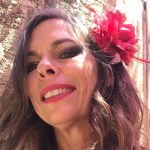
Heide Brandes
- Activities and Interests
- Africa National Parks
- Destinations
- National Parks
- South Africa
Heading down the dusty roads of Kruger National Park in far northeastern South Africa, our safari vehicle slowed to a halt as yet another herd of elephants began stomping across the road like giant wise guardians. Just minutes before, a pod of lanky giraffes caused our vehicle to stop for a while, and a wary group of water buffalo, with their meaty bodies and curling horns, watched us as we passed. Somewhere in the distance, a lion roared.
This is Kruger National Park , 7,580 miles of wild lands that are home to 500 bird species and 145 mammal species, including elephants, black and white rhinos, giraffes, zebras, antelopes, hippopotamuses, and lions. Located in the heart of the Lowveld, the entire park is a wildlife reserve and is bigger than the country of Israel. For many, Kruger National Park is a bucket-list destination, a glimpse of wild Africa.
Kruger National Park, originally known as the Sabi Game Reserve, was founded in 1898 by Paul Kruger, who wanted to protect the animals of the game reserve. On May 31, 1926, Kruger’s dream came true when the National Parks Act was passed. The Sabi Game Reserve and the neighboring Shingwedzi Game Reserve were combined to create Kruger National Park.
Today, roughly 950,000 people visit Kruger National Park every year, and the majority of the visitors — a whopping 80 percent — are South Africans. The park boasts more than 1,500 miles of all-weather roads that allow visitors to explore the park in their own vehicles, but safari guides are readily available as well.
Whether you decide to tour Kruger on your own or sign up for a safari, we have everything you need to know to get the most out of your visit to this important, awe-inspiring, and massive park.

When To Go To Kruger National Park
The dry winter months between May and September are generally the best times of year to visit Kruger National Park because the bush thins out a bit, making the animals easier to spot. September is a popular month, since the night and morning are less chilly.
The wet season between October and April has its advantages, however. The land turns green and lush, and many of the animals start having babies. Migratory birds are also plentiful around this time of year, but the days can be muggy and humid. The bugs are also out in force, so this is the time to take antimalarial medication, just in case.

How To Get To Kruger National Park
Flying into South Africa is by far the easiest way for international tourists to visit the park. There are four airports that serve the park: the Hendrik Van Eck Airport in Phalaborwa in northern Kruger, Hoedspruit Airport in the central region, the newly opened Skukuza Airport , and the Kruger Mpumalanga International Airport in the southern area.
That being said, most international visitors fly into the Johannesburg O.R. Tambo International Airport , where daily flights are offered between Johannesburg and many of the regional airstrips surrounding Kruger. The flights take about 90 minutes and can drop you off at the airstrip in the park closest to the lodge where you are staying.
Daily flights also operate to Skukuza from Cape Town . The Kruger Mpumalanga International Airport also operates daily flights from Durban and Cape Town, and another flight is available from Cape Town to Hoedspruit. Many of the lodges offer transport to and from the regional airports.
You can also rent a car and drive from Johannesburg to Kruger National Park, especially if you plan to take a self-guided tour of the park. The drive is approximately 5 to 7 hours, but it will give you the freedom to stop at other attractions along the way.

Where To Stay In Kruger National Park
Where you decide to stay depends on what kind of Kruger experience you want.
Kruger National Park has camp-run accommodations , and each camp has its own unique offerings, ranging from basic camping to the quintessential safari tents to luxury lodges. Kruger has 10 luxury safari lodges you can book, and the surrounding private game reserves offer luxury accommodations, meals, and highly trained personnel. The private lodges include Londolozi Founders Camp , Mala Mala Main Camp , Londolozi Varty Camp , and Sabi Sabi Bush Lodge . You may also consider the newly built Skukuza Safari Lodge in Kruger.
The average length of stay for a safari in Kruger is a minimum of two nights up to a week. If you plan to stay for more than four days, consider choosing two separate lodges so that you can enjoy a nice variety of experiences, animals, and foods.
Pro Tip: If you do opt for a private game reserve, know that these reserves are not fenced off from predators. Lions, leopards, elephants, giraffes, and zebras can wander through the camp, so exercise extreme caution and never walk around unaccompanied after dark.

Should I Explore The Park On My Own Or Take A Guided Safari?
When I visited Kruger National Park, the group I was traveling with opted for a self-guided tour of the game reserve. Luckily, our driver was well versed in how to spot animals in the park, but having a true safari experience is worth the cost and consideration as well.
If you opt for a game drive , you’ll have plenty of options to choose from. Morning drives, sunset drives, and even nighttime drives can be booked at the park, and an experienced and knowledgeable guide will point out wildlife and information you likely wouldn’t notice on your own. Most lodges and private lodges offer their own driving and walking safaris as well.
If you choose to explore the park on your own, maps will be your best friend. A great list of maps can be found here .
If you want the best of both worlds, Kruger offers a Park & Ride program. Just park at a select gate and hop on a safari ride through the park to see the Big Five and more.
Pro Tip: Kruger also offers safari adventures for the disabled .

How To Prepare For A Safari Bush Drive
You wake up in your safari tent or in your luxury lodge room excited for the day and the chance to see the famous wildlife of Africa. The golden hours of safari are typically the early morning, sunset, and nighttime, so try to book your drives during those hours, when the animals are more active.
To have a good Kruger experience, plan to bring items like binoculars, insect repellent, a camera, a map, plenty of bottled water and snacks, and a hat and sunscreen to protect against the African sun. You’ll also want to pack a couple of light T-shirts, a few long-sleeved shirts for the chilly nights, a rain jacket if you’re visiting during the rainy season, good walking shoes, shorts and long pants, and a hat.
Avoid wearing white, which makes you very visible to the animals. Red attracts some animals, and bright blue can attract biting flies. Stick with neutral colors like sand, brown, and muted green.
Remember, you are in the wild. Never approach wild animals, and do not get out of your vehicle unless you are in a designated “hide” area. Every year, there are fatalities because a careless tourist got out of their vehicle to take a closer look at an elephant or lion. Also, keep your windows up when possible. Baboons can be pretty aggressive about snatching food out of vehicles.
Don’t swim in the rivers and lakes in Kruger. Hippos are the most dangerous of all the big animals, are very territorial, and run faster than humans do. Crocodiles can also ruin your day if you get too close.
Always listen to your guide, if you have one. If they say not to run, then don’t run. If they say to move away, then move away. Your guide’s job is to keep you safe in one of the world’s last true wildernesses, so trust that they know what is best for you.
Pro Tip: Your guides and spotters work hard, so expect to tip each of them anywhere from 50 to 150 rands per day. If you have the same guide each day, err on the side of tipping well. If you don’t know how much to tip the guides or staff, ask the tour operator or the concierge at your lodge. While most tips are in the South African rand, American dollars are appreciated as well.


Medical Tips And Advice
No one wants to get sick or injured while on an epic safari, but if something does happen, South Africa has plenty of clinics, hospitals, and medical personnel. That being said, you should have medical insurance or travel medical insurance. If you do an internet search for “travel medical insurance,” you’ll find plenty of affordable options.
While South Africa is mostly malaria free, Kruger National Park does have some areas where the malarial mosquito is found. Antimalarial drugs are available at pharmacies in South Africa and by prescription from your doctor.
The water is safe to drink in South Africa and at Kruger National Park, and many of the lodges and hotels provide bottled water as well.
Be aware that HIV is still a concern in Africa, so avoid contact with bodily fluids and do not have unprotected sex.

Other Activities In Kruger National Park
Kruger National Park isn’t just about game drives and safari walks.
Golfing enthusiasts will be thrilled with the Skukuza Golf Course , which was built in 1972. The course is designed for golfers of all levels, but again, you may have a few run-ins with the local wildlife, since the golf course isn’t fenced in.
Mountain biking , group backpacking with a trail leader , and birding are also popular activities at Kruger National Park. The 4×4 Adventure Trails , which get you off the beaten track to areas of park that are rarely seen, are also worth checking out.
Many of the luxury lodges offer spa experiences as well as swimming pools, chef-inspired meals, full bars, and all the bells and whistles. You will not get bored — trust me!
And speaking of meals, a bush braai is a not-to-be-missed experience. A braai (barbecue) around the boma (outdoor enclosure with a fireplace) is available at most of the camps in Kruger, and it usually includes a choice of three grilled meats, salads, breads, drinks, and desserts. If you book a night game drive, you can also book a braai in the middle of the Kruger bush under the night sky. Available at all rest camps, this 3-hour experience requires booking in advance.
Pro Tip: Bring a good book or two. During the high heat of the day, when the animals are hunkered down and being lazy, you’ll want to take advantage of the down time to relax, read under some shade, and just appreciate the experience of being in Africa.

Heide Brandes is an award-winning journalist and travel writer based in Oklahoma. She loves outdoor adventures, exploring different cultures, and finding off-the-wall, bizarre, and wondrous experiences to enjoy. Heide writes for numerous national and international publications and is an award-winning member of the Society for Professional Journalists, North American Travel Journalists Association, and Society of American Travel Writers. Besides traveling and writing, Heide is also a professional Bellydancer, a medieval re-enactor, and a quirky chick who lives in Oklahoma City.
My Kruger Safari
A Kruger Park safari from the comfort of Swagat at Kruger Park Lodge
Site Navigation [Skip]
- 4 Night Kruger Park Safari
- Contact Us & Book
- Kruger Safari Gallery
- Self-drive Kruger
Kruger Park Safari Tours
Our Kruger Park tours are designed so you can experience an African safari in a fun, affordable and adventurous way. Based on years of experience, we have put together a safari package to help you explore the world-famous Kruger National Park and the private Sabi Sands Reserve through private, guided and self-drive safaris.
Our customizable Kruger Park safari packages take the guess work out of planning and save you time. We offer spacious and modern accommodations at our Kruger Park Lodge 6-sleeper chalet mixed with private, guided safaris into Kruger and the Sabi Sands. For under $120/person/night a family of four can experience 4 nights at our comfortable chalet located on a four-star resort and close to many amenities and restaurants. The rate also includes a full-day safari into the world-famous Kruger National Park and a half-day safari with a boma dinner in the world-renowned private Sabi Sands Reserve.
Click on the tabs above for details or email us at info[AT]mykrugerlodge.com for details and to discuss packages. We are also on skype: heetenkalan. If you are based in the United States, please note that we are Boston-based so can easily set-up a call for that personal touch.
Which Kruger Safari?
You've been there: searched for safari companies and lodges and become inundated with pages of information. Where do you stay? Do you self-drive or use a guide? Do you buy a travel package? Travel with others? Private reserve or a public park? We take the best of all worlds and offer a Kruger safari that combines self-driving with a guided safaris into Kruger Park and the private Sabi Sands.
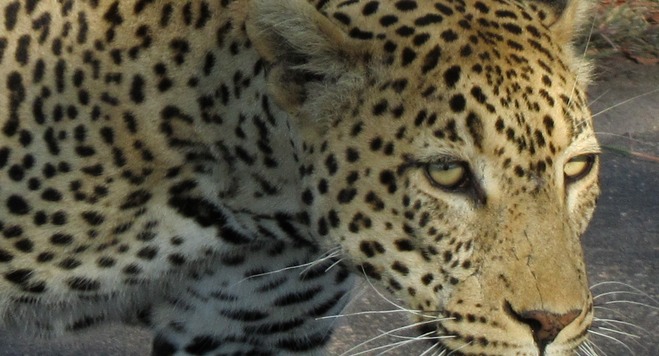
A Safari Just for You!
While there are plenty of luxury tour companies as well as pre-planned budget and modestly priced tour outfits offering African safaris, we are here to help you discover Kruger Park in a fun, easy and affordable way.
You know the images: dining al fresco at linen tableclothed tables in the African wild; pampered tourists sipping “sundowners” in the sunset; wildlife photographers with 2-foot long camera lenses zooming in on a male lion. Very “Out of Africa”. Great stuff, but it’ll cost you thousands upon thousands of dollars. The truth is, you don’t have to be a wildlife expert or well-resourced in order to experience a real safari. You might even be surprised to learn that in South Africa, anyone can just rent a car and drive around the game park while appreciating breath-taking sights. A favorite for traveling families, a self-drive safari lets you determine your own schedule and spend time with animal sightings on your terms, your schedule, your budget and your timing. For a well-rounded experience, our safaris combine the self-driving with a guided safaris into Kruger Park and the private Sabi Sands.
Why a Kruger National Park Safari?
South Africa's flagship game park, the Kruger National Park , is enormous (nearly 2 million hectares), about the size of northern Ireland or the state of Connecticut, and is teeming with lions, elephants, rhino, giraffe, leopards, honey badgers, kudus, impalas, zebras, buffaloes and numerous bird, insect and plants species.
Established in 1898, Kruger is called home by 147 mammals, 114 reptiles, 507 birds, 34 amphibians, 49 fish and 336 trees. In addition to the fauna and flora, Kruger offers visitors the chance to view rock paintings and visit the ancient archaeological sites of Masorini and Thulamela.
Kruger has an extensive network of tarred and dirt roads and each gate and camps sells a detailed map with dams, picnic spots, hides, distances, and an animal and bird indentification guide. Withing fiften minutes of entering the park, this map will be your new best friend.
All you need is a rental car, binoculars and a good camera. You're one simple email away from starting your safari adventure.
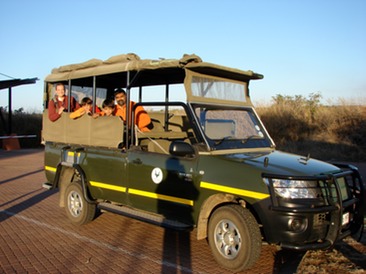
Over the years, we have convinced many to visit the Kruger Park and fielded hundreds of questions about planning holidays to South Africa, eventually realizing that they we enjoyed sharing our love for safaris so much it could become a safari tour venture.
We work with clients to figure out a trip itinerary that fits their travel budget and also includes a combination of self-drive and guided safaris. A typical itinerary includes a several-day safari, a visit to the nearby elephant sanctuary and a day trip to Blyde River Canyon with its marvelous waterfalls, rock formations and miles-long views. We enjoy taking the mystery out of traveling to Africa, and we are proud to note that South Africa offers an excellent, world-class infrastructure as well as all the sights and experiences a visitor might expect. Talking over the trip with clients, we often pull out our copy of the Kruger Park map guide, and suggest customized drives within the park, peppered with anecdotes from our own safari drives there. Our personal connection to the politics and history of the country allows us to offer multiple suggestions for those looking to add to their South African safari experience.
Swagat at Kruger Park Lodge

Why Do It?
Being in Kruger Park is at once peaceful and exhilarating: it is wonderful to be disconnected from the buzz of the internet and telephones, and to just take in the unique sounds, sights, smells, the air. And nothing beats the excitement of being the ones to spot a leopard or hear a herd of 200 buffalo thundering past the car. There is truly a satisfaction and excitement in spotting animals on your own, feeling like you are really in a wildlife documentary.
Wanderlust Travel & Photos
Seeing the world one trip at a time.
- Work With Me
- Travel Journal
- Privacy Policy
- Browse by Continent
- South Africa Travel
- Tanzania Travel
- Cambodia Travel
- Thailand Travel
- Dominican Republic Travel
- Italy Travel
- Spain Travel
- Canada Travel
- Australia Travel
- New Zealand Travel
- Ecuador Travel
- Peru Travel
- Browse by Region
- East North Central
- East South Central
- Mid-Atlantic
- New England
- South Atlantic
- West North Central
- West South Central
- Central America
- North America
- South America
- Travel Vlog
- Instagram Photos
The Ultimate Kruger National Park Safari Planning Guide
Kruger National Park in South Africa is one of the world’s premier wildlife destinations. The Greater Kruger area is an expansive region that is comprised of beautiful landscapes and a wealth of wildlife. A Kruger National Park safari is an experience that you will treasure forever. At the same time, it can also be an overwhelming endeavor to plan.
Deciding where to plan your safari and where to stay while you are there can be daunting. Not to mention, figuring out how to get around while you are there and what to bring for your safari. These are just some of the many things you will need to factor in when planning your trip.
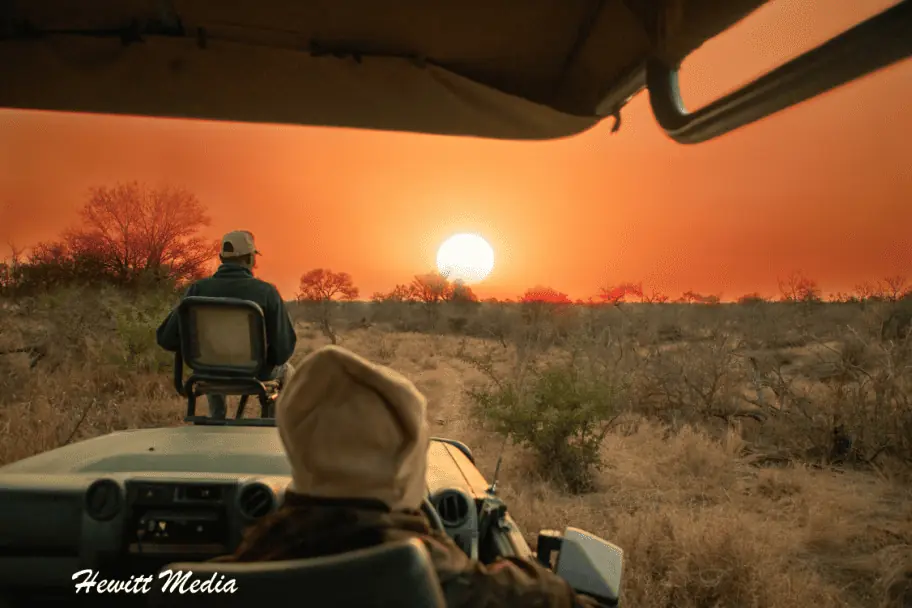
If you are planning your first Kruger safari and are feeling overwhelmed, you have come to the right place. In this comprehensive safari planning guide, I give you all the information you will need. I discuss the differences between safaris inside the park and within the private reserves.
I outline the nuances between the different regions of the park to make it easier for you to plan where to go. On top of that, I provide you with some recommendations on lodges, campsite, picnic areas, and scenic spots to help you plan. Finally, I have provided you with detailed packing guides, safari and safety tips, as well as other valuable information you will need to plan your safari.
Kruger National Park Safari Guide Navigation Links
To make it easier to use this guide, I have provided some easy to use navigation links below. Feel free to use these links to skip to different parts of this guide as you start your planning. If you have any specific questions that you need answered, always feel free to shoot me and email. If I can’t address your questions, chances are I will be able to direct you to someone who can.
South Africa Entrance Requirements
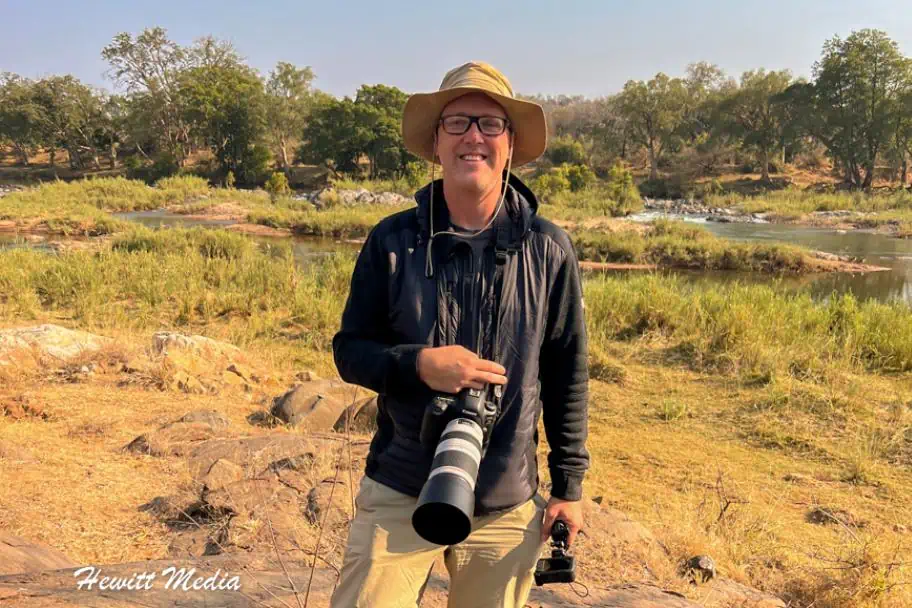
Before you depart for your Kruger National Park safari in South Africa, you will need to make sure that you meet all of the requirements for entry into the country. In order to assist you in this preparation, I have created a short article that outlines all of the South Africa entry requirements for visitors. This includes the necessary passport, VISA, and customs requirements that you will need to consider before you depart for your trip.
South Africa Travel Immunizations

Important Note: I am not a medical doctor and do not have any medical experience. The information provided in this section is a summary of information that I got from the recommendations of the Centers for Disease Control and Prevention in the United States for travel to South Africa . I am providing you this information to help bring awareness of the necessary vaccinations to you, but consultation of my guide should not replace a discussion about your travels with your doctor or a travel medical clinic.
One of the most important, and yet most often overlooked, aspects of travel is the necessary vaccinations that are required or recommended to keep you safe and healthy when you travel. Before you depart for South Africa, you are going to want to make sure that you have all of the proper vaccinations.
Some of these vaccinations, like the Yellow Fever vaccination, are included in the South Africa entrance requirements if you are traveling to South Africa from certain high-risk locations. Other vaccinations, such as a flu shot and the Typhoid vaccine, are recommended, but not required.
For your convenience, I have summarized the CDC’s recommendations on vaccines and healthcare for travelers visiting South Africa for you to review in my “South Africa Passport, VISA, Customs, and Immunization Requirements” guide linked below.
What to Bring on Your Kruger National Park Safari
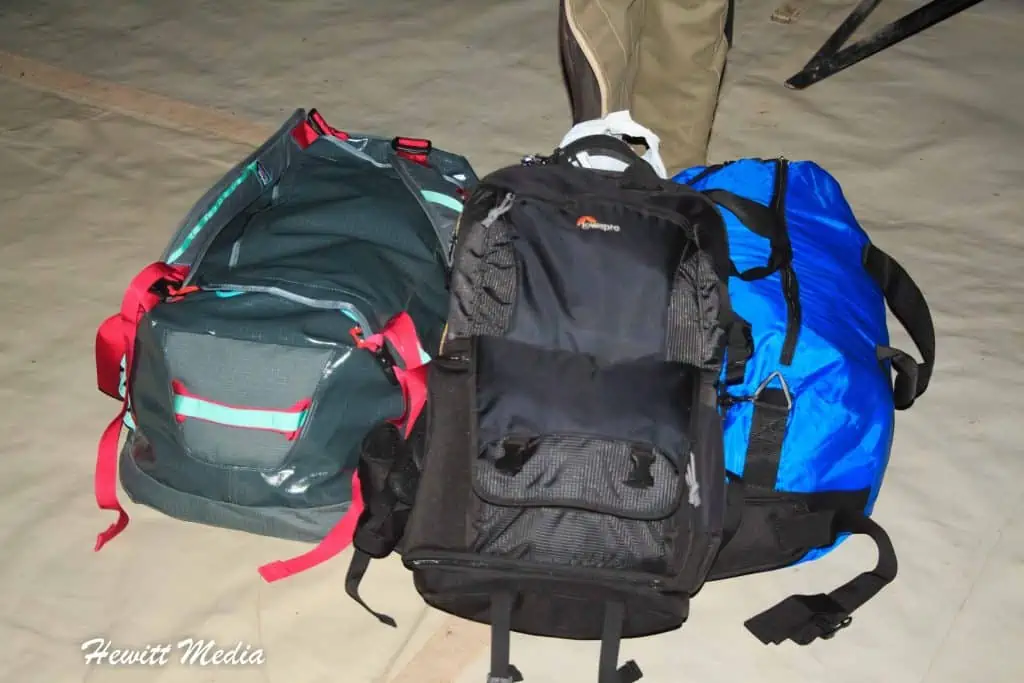
If you are visiting Africa to go on safari for the first time, you might not be sure of what to bring with you. To help you with these questions as you prepare for your Kruger National Park safari, I have developed several guides that you should review.
First, my article the “20 Tips for Those Visiting Africa for the First Time” will help you get prepared for what to expect when you arrive in Africa for the first time. It outlines what you should do, what you shouldn’t do, and gives you some tips that will help you know what to expect on your first visit to the continent of Africa.
Then, as you start to prepare for your trip, you will want to review my “Essential Safari Packing List” to make sure that you have all of the gear that you need and don’t pack what you won’t need with you. Finally, if you plan to take pictures on your safari, you will definitely want to review my “Tips for Photography on African Safaris” guide to make sure you get the best photographs possible to remember your adventure!
How to Get to Kruger National Park
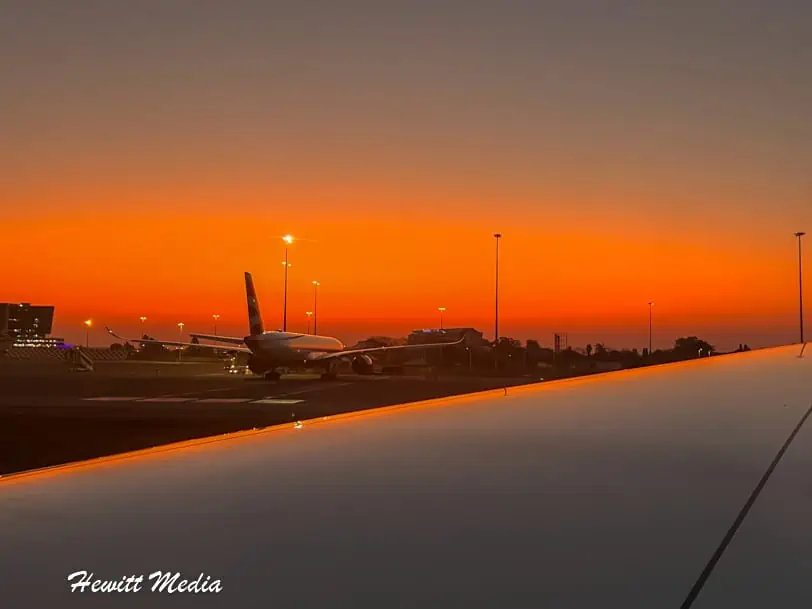
If you are visiting South Africa for the first time, I strongly recommend spending some additional time in the country to explore both the Cape Town area as well as the infamous Garden Route on the Southeastern Coastline. While it is tough to compete with the incredible experience of a Kruger National Park safari, both of these areas are incredible and worth visiting. If you are interested in learning more, I have included some guides for these areas below for you to review.
Getting to Kruger National Park
If you are planning to visit Kruger National Park from outside of South Africa, the closest international airport is the O.R. Tambo International Airport in Johannesburg. Once in Johannesburg, there are a variety of different options you can choose to get to the park.
Renting a Car
If you are planning a self-drive safari within Kruger, you can rent a vehicle and drive to Kruger. The roads leading to the park are paved and are in generally good condition. So, getting there isn’t too much of a hassle. The entrance gates in the south section of the park, like Numbi and Phabeni, will only take you 4-5 hours to get to. If you plan on visiting the far north of the park, it will take you considerably longer to drive there. For instance, I would plan on at least 7-8 hours of driving to reach the Pafuri Gate.
- Directions to the Numbi Gate from Johannesburg
- Directions to the Phabeni Gate from Johannesburg
- Directions to the Orpen Gate from Johannesburg
- Directions to the Pafuri Gate from Johannesburg
Flying to Kruger National Park
For those looking for a quicker option to get to Kruger, you can book a connecting flight from Johannesburg. You can connect to either Nelspruit , Hoedspruit , Phalaborwa , or Skukuza . Only Skukuza is located inside Kruger National Park. However, the other three airports are located just outside the park where lodges and camps can make arrangements to pick you up.
Book a Full Service Tour
Another great way to get to the Greater Kruger National Park area to go on safari is to book a tour with a tour operator that provides transportation from Johannesburg. When we booked our Kruger Safari, we booked a tour with Viva Safaris . They were one of the first tour operators in the Kruger Area to provide transportation to-and-from the Kruger area.
These tour operators will pick you up at either the airport or your hotel near the airport. Then, they will drive you to the Kruger area for your safari stay. When your stay is complete, they will drop you back off in Johannesburg. We were thoroughly impressed with the level of service and safari experience we got from Viva Safaris. If you are looking for a full-service tour, I strongly recommend them.
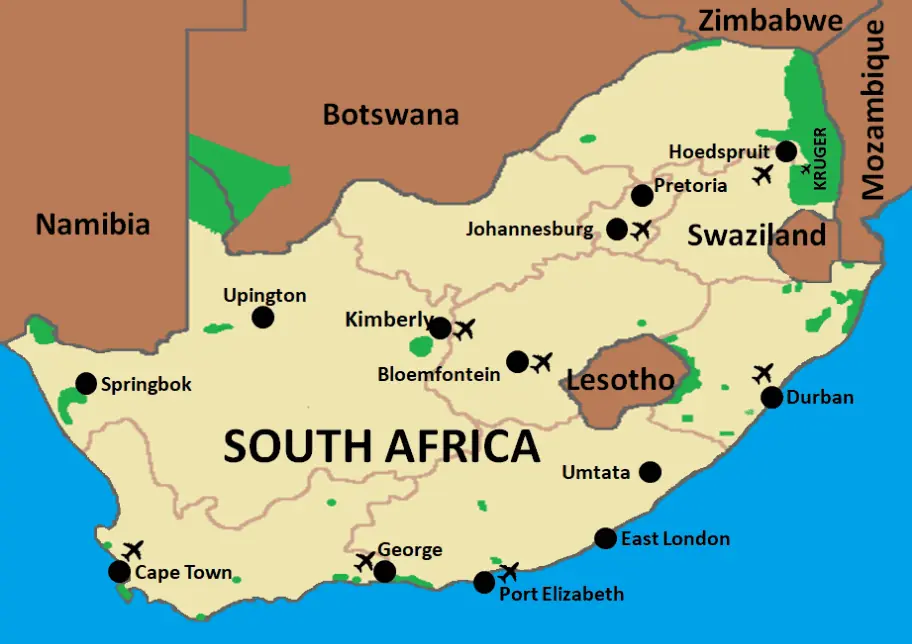
The Greater Kruger National Park Area
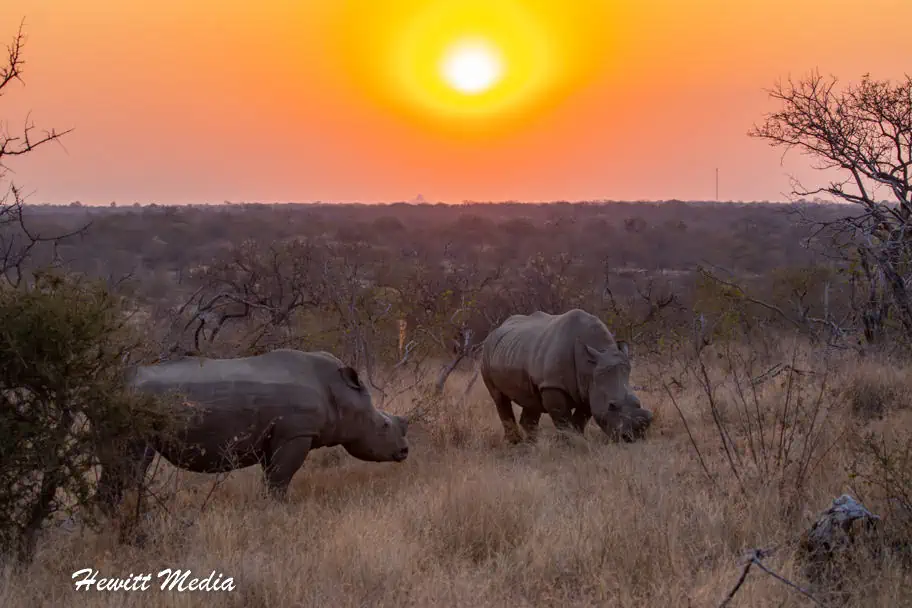
If you have already started to plan your Kruger National Park safari, you have probably come across the term “Greater Kruger” in your research. If you aren’t aware, the term refers to the roughly 344,000 hectares (or roughly 860,000 acres) of protected land to the West of Kruger National Park. Combined with the Kruger National Park proper, this collection of protected land creates one of the largest unfenced wildlife areas in all of Africa.
Because there are no fences between these areas and the national park, wildlife is able to roam freely throughout the area. This has returned much of the natural wildlife migrations to the Kruger area, as most grazing animals tend to migrate from East to West with the seasonal rains.
Included in this Greater Kruger National Park area are a number of private game reserves and nature reserves. Operated by private enterprises, these reserves are only open for safari to visitors staying at local lodges or camps located within the reserves. Many of the high-end luxury lodges that you will find in the Greater Kruger National Park area are located within these reserves.
Because they are privately owned, they aren’t governed by the same safari rules that safaris within Kruger National Park are. This creates a unique distinction between Kruger safaris and private reserve safaris that I will cover later in this guide.
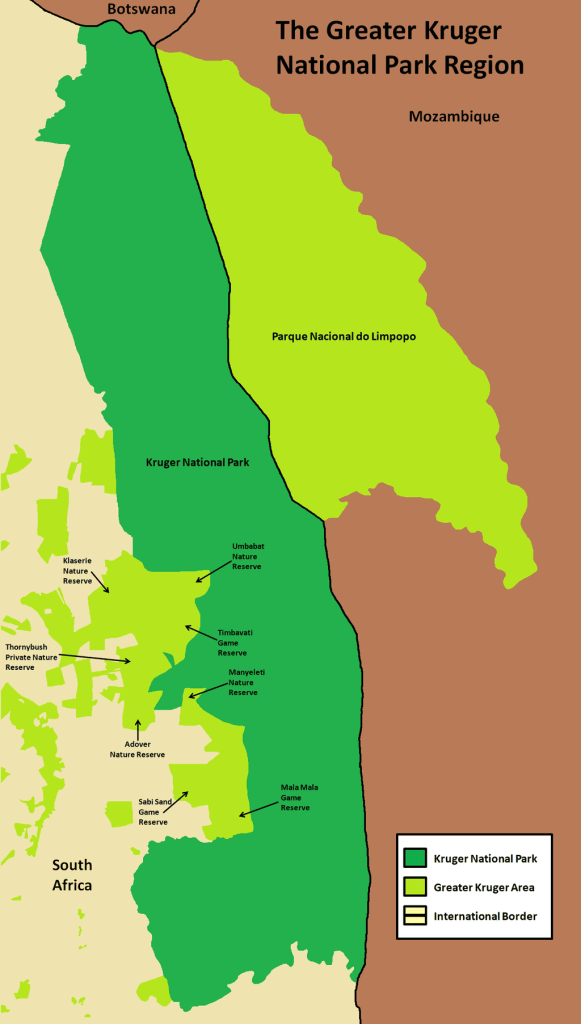
View Larger Map
Private Game Reserves vs Kruger National Park
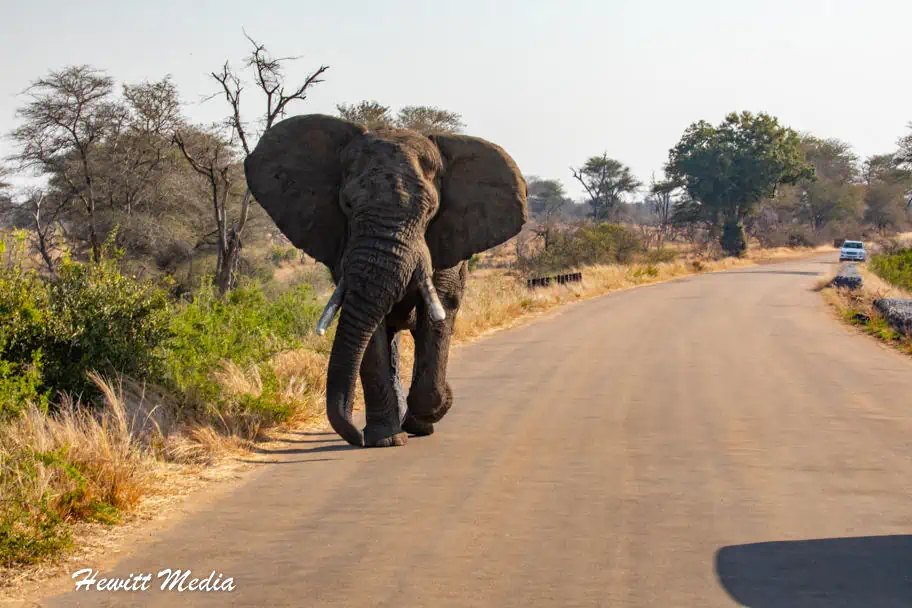
As you start to plan your Greater Kruger National Park safari, one of the first things that you will need to decide is where you will be going on safari. Unlike smaller parks in Africa, the Kruger National Park is absolutely massive. The choices to choose from become even greater when you factor in the wealth of private game reserves that make up the Greater Kruger area.
Deciding whether you will be going on safari in Kruger National Park, an adjacent private game reserve, or a combination of both will be one of the most important decisions you make. To make it easier for you to decide, I have laid out the pros and cons for going on safari in both the park and the reserves below for you to review.
Going on Safari in Kruger National Park
Choosing to go on safari in Kruger National Park is never a bad option. It is no mistake that it is one of the most renowned wildlife parks in the world. However, before you start to plan your trip to the Greater Kruger area, you should understand the differences between going on safari inside the park and in one of the private reserves. I have highlighted the pros and cons to Kruger National Park safaris for you to review below.
Kruger Safari Positives
- Kruger National Park has one of the highest concentrations of wildlife in the world.
- Accommodation options tend to be cheaper inside the park.
- There is a larger area to explore, so you can cover more ground in search of animals.
- You can drive yourself on a self-safari inside Kruger National Park.
- Many of the park’s roads are paved, which makes the safari experience far more comfortable.
- The park does not interfere with the course of nature inside the park, so animals like the Southern White Rhino inside the park will have their full horns.
Kruger Safari Negatives
- The park can get rather crowded, especially in the peak season and in the popular southern section of the park.
- Safaris must stick to the roads inside Kruger National Park, so you can’t go off road in search of animals.
- Your safari experience will be far less intimate if you take a paid group safari.
- The guides for guided safaris are typically far less experienced than the guides typically found in the private reserves.
- The vehicles used inside the park are publicly funded, so they are typically not as well maintained as the ones in the private reserves.
- There are far less luxurious accommodations inside Kruger National Park compared to the private game reserves.
Going on Safari in the Private Game Reserves
In addition to Kruger National Park, the Greater Kruger National Park area is also home to many bordering private game reserves that offer incredible safari experiences. These game reserves are unfenced areas that are adjacent to the park but are privately owned and operated. Going on safari in the reserves offers both advantages and tradeoffs versus safaris inside Kruger National Park.
If you would like to better understand the differences, I have listed some of the top pros and cons for the private game reserve safaris for you to review below. Not only that, but I have also provided a list of some of the top game reserves in the area for you to review as you start to plan as well.
Private Game Reserve Positives
- Many of the luxury lodges and accommodations that you will find in the Greater Kruger National Park area are located in the private reserves.
- Most of the guides in the private game reserves tend to be more experienced and better trained in locating wildlife.
- Because the game reserves are privately owned and funded, many of the reserves have better equipped and maintained safari vehicles.
- Most of the private game reserves allow their guides to drive off of the roads and into the bush in search of animals. This, along with the added experience and expertise of the guides, allows for more animal sightings. I have talked to many people who have seen all of the “Big Five” of Africa in a single day within one of the private reserves.
- Your safari experience will likely be much more intimate than it will be inside Kruger National Park. In the park, you are only allowed to stop at rest areas and picnic sites. However, the reserves are able to cater to their clients a bit more. It is common to have bush braiis (barbeques) and scenic picnics in the bush within the private reserves.
Private Game Reserve Negatives
- The private reserves are much smaller than Kruger National Park. With unfenced borders to the park, the animals are free to move in-and-out of the reserves. The smaller area provides less ground to cover to find animals.
- There is a range of lodging options in the private reserves, but many of the top reserves have lodges that are much more expensive than the rest camps inside Kruger National Park. In my opinion, the budget lodging options outside the park are more limited.
- Many of the roads you find in the private game reserves are rough, which means you will have a far bumpier safari experience. This isn’t an issue for most people, but it is a big deal to some.
- You aren’t allowed to drive your own vehicle in the private game reserves. While some may look at this as a negative, getting the experience and expertise of a guide is more of a positive. Most safari experiences will be small group, with the top-end packages including private game drives. However, if you are with a group, you may not have as much control over when and for how long you stop.
- Many of the private game reserves in the Greater Kruger area cut the horns off of the rhinos to discourage poaching. While I commend these efforts from a conservation viewpoint, you are less likely to see a rhino with full horns outside of Kruger National Park. So, this is really a positive (for conservation) and negative (that it even has to be done in the first place) at the same time.
Top Private Game Reserves in the Greater Kruger Area
- Sabi Sand Game Reserve
- MalaMala Game Reserve
- Manyeleti Game Reserve
- Klaserie Nature Reserve
- Balule Nature Reserve
- Timbavati Private Nature Reserve
Why a Combination is the Best Option
In my opinion, spending time both inside Kruger National Park and in one of the adjacent private game reserves is the best way to get the complete Kruger National Park safari experience. I would suggest looking for Kruger safari packages at the private reserves that also include days of safari inside the park.
When we visited the Greater Kruger area, we booked a tour at the Balule Game Reserve. We had such an amazing experience in the private reserve, but our tour also included days of guided safari inside Kruger National Park as well.
Choosing Where in Kruger National Park to Visit
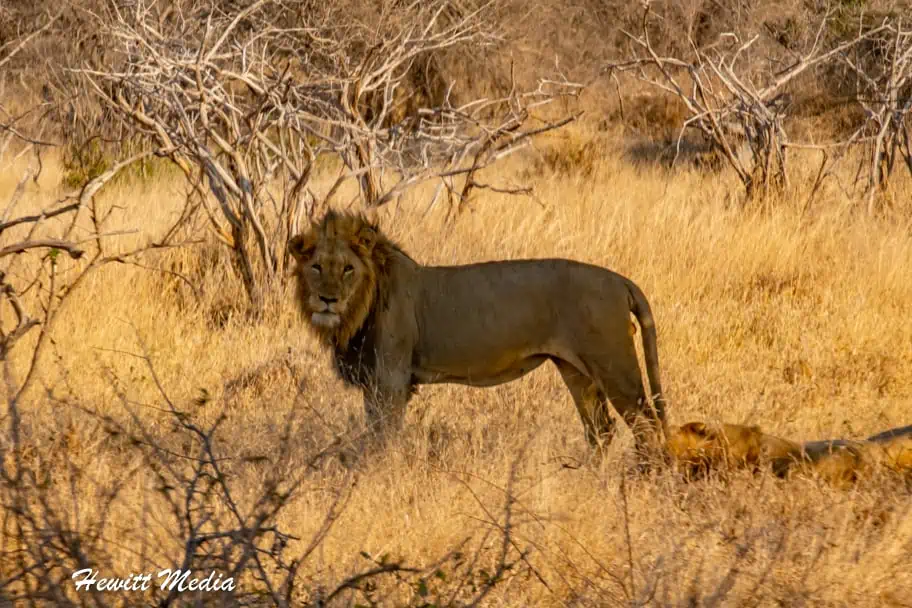
One of the most important decisions you will have to make when planning your Kruger National Park Safari is deciding which part of the park to visit. Kruger is one of Africa’s largest wildlife parks, so seeing the entire park in even one long trip is very difficult. Deciding what part of the park to plan your visit will be an important decision you will make.
Kruger National Park is logically broken up into three different sections. This includes Northern Kruger, Central Kruger, and Southern Kruger. Each section of the park has its own distinct advantages and disadvantages that you will need to consider and weigh. To assist you with this, I have included my thoughts on each section of the park for you to review below.
Southern Kruger
The southern section of Kruger National Park is by far the most popular section of the park. For starters, it is the easiest part of the park to get to from Johannesburg and Swaziland because of its close proximity. Not to mention, it is also where you will find the most popular rest camps within the park. The southern section of Kruger National Park has the most amenities, which means that there is a shorter driving distance between rest camps and picnic sites.
In addition, this section of Kruger National Park is renowned for having some of the very best game viewing. If you want to see Africa’s “Big Five” animals, your best bet is to visit the southern section of Kruger. As an added bonus, the southern section of Kruger is also the closest to luxury private game reserves in the Greater Kruger National Park area. So, if you plan on spending time on safari inside and outside of the park, I recommend Southern Kruger for your visit.
Southern Kruger Gates
- Paul Kruger Gate
- Phabeni Gate
- Malelane Gate
- Crocodile Bridge Gate
Central Kruger
Like the southern section of Kruger National Park, the central section is renowned for its incredible wildlife sightings. While it doesn’t have as many amenities as the southern section, Central Kruger has some of the most popular rest camps in the park. Both the Satara and the Olifants rest camps are iconic areas to visit for your first Kruger National Park safari. In fact, the area around Satara may be one of the best spots in the park to spot lions.
The lush grasslands in this area of the park are the perfect habitat for lions to hunt, which makes it a great spot to see this apex predator in the wild. The grasslands also attract many of the park’s grazing species, such as antelope, buffalo, and zebra. So, if you want to get away from the crowds in the south section of Kruger, but still want to be near the bulk of the park’s amenities, Central Kruger is a great option.
Central Kruger Gates
- Giriyondo Border Post
- Phalaborwa Gate
Northern Kruger
For travelers that want to completely escape the crowds and experience the majesty of a wild Kruger National Park, the northern section of the park may be just what you are looking for. There are far fewer people in this area of the park because there are far fewer amenities in the northern section of Kruger. Less amenities means that there is a longer driving distance between rest camps and picnic sites.
There is also less wildlife in this part of the park, but less humans means that you may be able to spot some of the park’s more elusive species. For instance, Northern Kruger is one of the best places in the park to see the critically endangered African Wild Dog. In addition, it is also an incredible place to go bird watching. So, if you would like to experience a more rustic Kruger National Park safari without the crowds, Northern Kruger is a great place to do just that.
Northern Kruger Gates
- Pafuri Border Post
- Punda Maria Gate
Best Times to Visit Kruger National Park
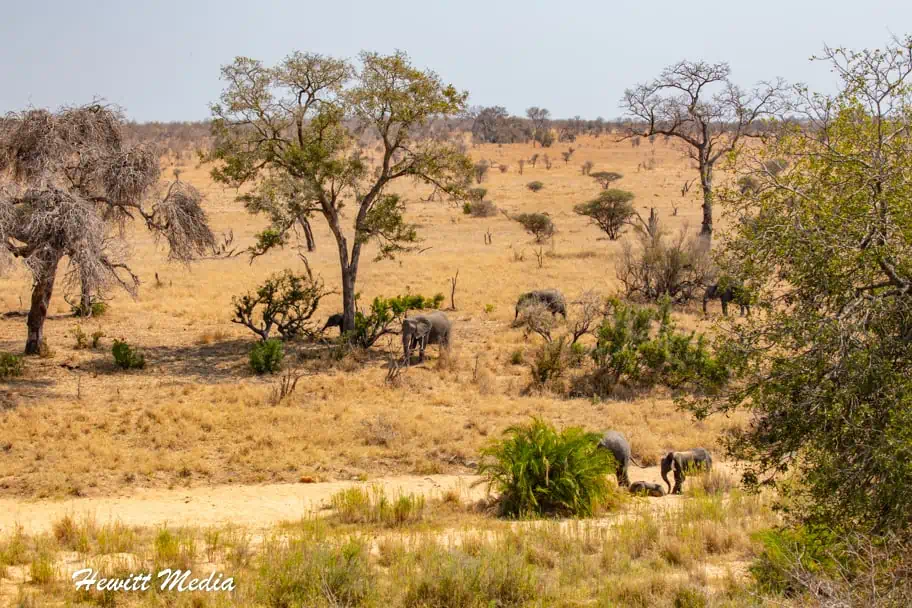
Like most safari destinations, some months of the year are better than others to go on a Kruger National Park safari. Before you start to plan your safari adventure, take some time to review the information I have included in this section of my guide. It has important information that will help you pick the right time to plan your trip.
Average Temperature (°F)
As you can see by the monthly temperature chart below, the daytime temperatures in Kruger during the summer months can be incredibly hot. If you aren’t good with high heat and humidity, I would avoid the months of December thru February.
At the same time, morning temperatures during the dry winter months can be very cold. In South Africa, they use open safari vehicles, so early morning game drives are very chilly. If you want to avoid the cold, steer clear of the months of June thru August.
Average Precipitation (Inches)
One of the most important factors that can influence a safari experience is rain. And this isn’t just because it impacts the comfort of us as visitors. Rain can play a huge factor in how easy it is to find and spot animals within the park and reserves.
When it is dry out, water is scarce and animals tend to congregate near permanent water supplies like rivers. This makes it much easier to find animals while on safari. Not only that, but vegetation isn’t as thick during the dry months, which makes it easier to see animals in the bush.
During the wet months when water is plentiful throughout the park and vegetation is thick, finding animals becomes a much tougher task. Before planning your Kruger National Park safari, review the average monthly rainfall chart I have included below to assist you in picking the right time for your safari.
Dry Season (May to September)
- Daytime temperatures aren’t as hot, and the humidity is low.
- Water is scarce in the bush, so animals are attracted to the permanent water sources. This makes spotting animals much easier.
- The dry, sparse vegetation makes it much easier to spot animals in the bush.
- Morning temperatures can be chilly, so warm clothes are needed for morning safaris in the open-air safari vehicles. This is especially true in June, July, and August.
Wet Season (October to April)
- Daytime temperatures can be scorching hot and very humid. Daytime high temperatures can exceed 104-degrees Fahrenheit.
- Beginning in October, rain becomes more frequent in the park. This makes finding animals more difficult as water sources are more prevalent, and the vegetation gets thicker.
- The months of December thru February are typically very wet with downpours in the afternoons. It seldomly rains all day, but frequent afternoon rainstorms should be expected this time of year.
- Morning temperatures are more moderate, so warm clothing isn’t as needed for early morning game drives.
Best Months to Visit Kruger National Park
As you can see, there are a lot of factors to consider when deciding when to plan your Kruger National Park safari. In addition to the information, I provided above, I have also included an easy-to-understand chart below. This chart combines all of the factors I outlined to visually show you which months are best for visiting Kruger National Park.
Where to Stay in Kruger National Park
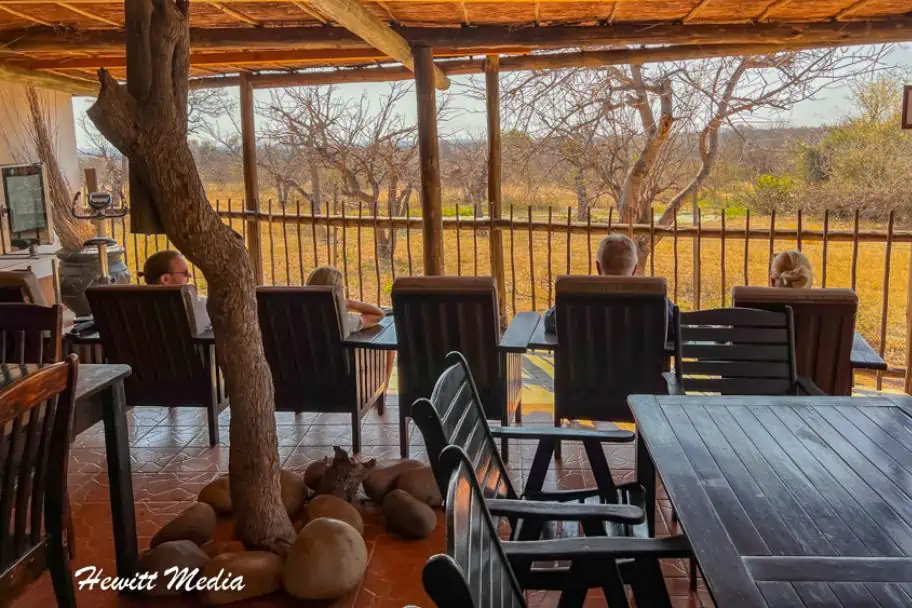
One thing that you will quickly realize as you start to plan your Kruger National Park safari is that there is a wide range of options for where to stay. You will find everything from high-end luxury resorts to bare amenity campgrounds, both inside the park and in the surrounding game reserves. As you start to put together your plans, you will need to decide where you want to stay during your visit.
If you are planning on staying inside Kruger National Park, I have provided a number of rest camp, lodge, bushveld camp, and campground recommendations for each section of the park later in this guide. For those who are unsure of where to begin, I have provided some highlights you can expect from each accommodation option for you to review below.
Park Rest Camps
For those who plan to stay inside Kruger National Park, one of the most popular options is to stay at one of the SANParks operated rest camps. While these rest camps aren’t as luxurious as some of the private lodges that you will find inside and outside of the park, they are more than comfortable and are generally very well maintained.
Private Lodges
If you are planning on staying within Kruger National Park but are looking for something a bit more upscale than what is provided at the rest camps, there are a number of private lodges within the park as well.
These private lodges offer a wide range of budget options, so you can find anything from high-end luxury to budget friendly lodging. As an added bonus, many of the privately run lodges within the park offer private access to roads within Kruger National Park that are off limits to other visitors.
Park Campsites and Bushveld Camps
As you start to explore the accommodations in Kruger outside of the lodges, you will hear a lot of different terms thrown around. The terms “tented camp”, “bushveld camp”, and “bush camp” can mean different things to different people. Apart from your traditional lodges, which tend to offer the most amenities to visitors, there are a wide range of camp options in Kruger as well.
Tented Camps
The tented camps are typically smaller and more rustic than the traditional lodges, but they still offer many of the amenities you will find in the park’s lodges. Most often, this includes a bed, a bathroom, and sometimes even a shower within your tent. These accommodations are meant to give your stay a bush feel without skimping on too many of the luxuries of modern accommodations.
Bushveld or Bush Camps
Unlike tented camps, the “bushveld camps” or “bush camps” are typically even smaller and more rustic than your luxury tented camp. These sites tend to be even more remote, giving visitors an even more authentic bush experience. Generally speaking, these sites forgo many of the modern luxuries that you will find in the lodges and tented camps in favor of a more authentic safari experience.
Campgrounds
Lastly, the campsites in Kruger National Park are designed for visitors who either have their own tents or pop-up vehicle roof or trailer tents to stay in. These campgrounds are still protected by the same type of perimeter fencing that you will find at the lodges and camps, but the only amenities you will typically find are shared bathrooms and showers.
Depending on the site, some will also include a common kitchen area that you can use to prepare and cook meals. These sites are designed for the visitor who wants to forgo most modern luxuries and have as authentic a safari experience as possible.
Private Game Reserve Lodges and Camps
You will find the same variety of accommodations in the private game reserves in the Greater Kruger National Park area. These reserves have everything from the most luxurious lodges you can imagine to some of the most basic bush camps for those looking for a more authentic and budget-friendly experience.
One thing I would caution that you research before booking is whether or not the lodge, bushveld site, or campground you book has a protective perimeter fence. Most sites in the Greater Kruger area do, but not all of them offer this. If you are concerned about dangerous wildlife coming into your camp at night, this is something you will want to confirm before booking.
Southern Kruger National Park
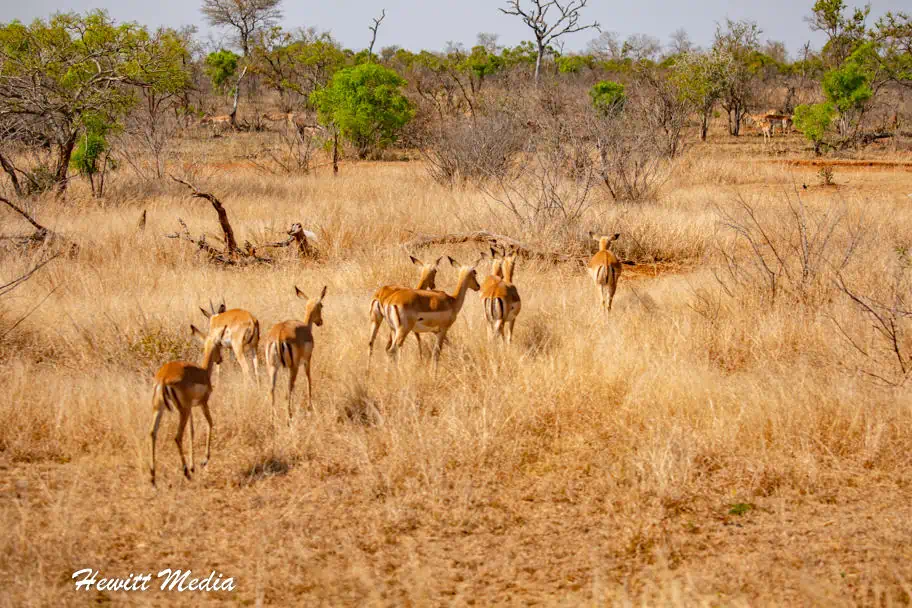
The southern section of Kruger National Park is undoubtedly the most popular part of the park. In addition to having the most amenities to enjoy, it is also where you will find half of the park’s entrance gates. If you are starting to plan your Kruger National Park safari and would like to know where to stay and where to stop, you are in luck.
I have included details on recommended rest camps, lodges, and campsites for you to review below. I also outline where the popular picnic, scenic spots, and animal hides are located to assist you in your safari planning.
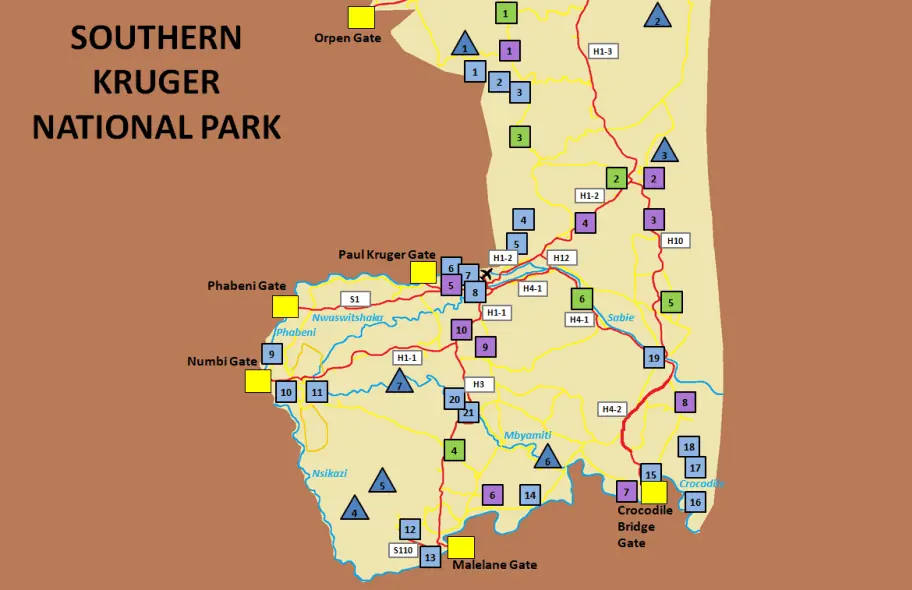
View Large Printable Detail Map
Southern Kruger Lodges and Rest Camps
Southern kruger campsites and bushveld camps, southern kruger picnic areas, southern kruger lookouts and hides, central kruger national park.
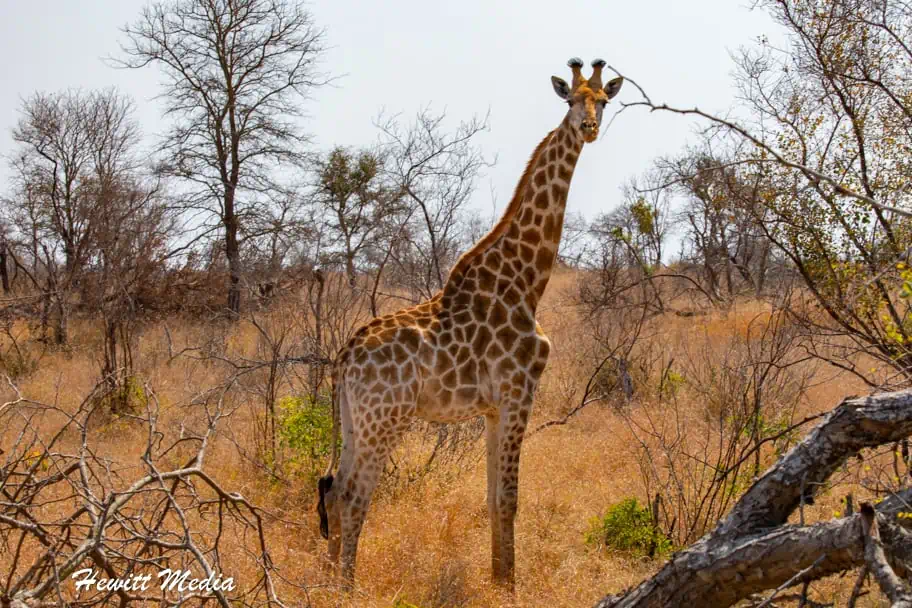
While the central section of Kruger doesn’t have the quantity of amenities as the south has, it certainly doesn’t lack in quality. In my opinion, some of the park’s top rest camps are located in the center of the park. Not only that, but Central Kruger is one of the best places to spot the park’s top predators. If you are starting to plan your Kruger National Park safari, you will want to review this section of my guide.
I have included details on recommended rest camps, lodges, and campsites in Central Kruger below. I also outline where the popular picnic, scenic spots, and animal hides are located to assist you in your safari planning.
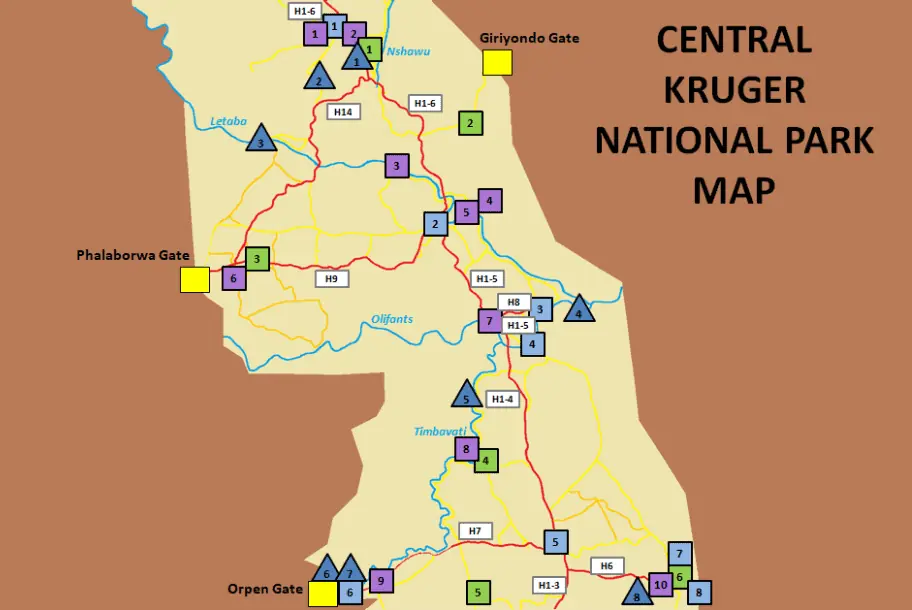
Central Kruger Lodges and Rest Camps
Central kruger campsites and bushveld camps, central kruger picnic areas, central kruger lookouts and hides, northern kruger national park.
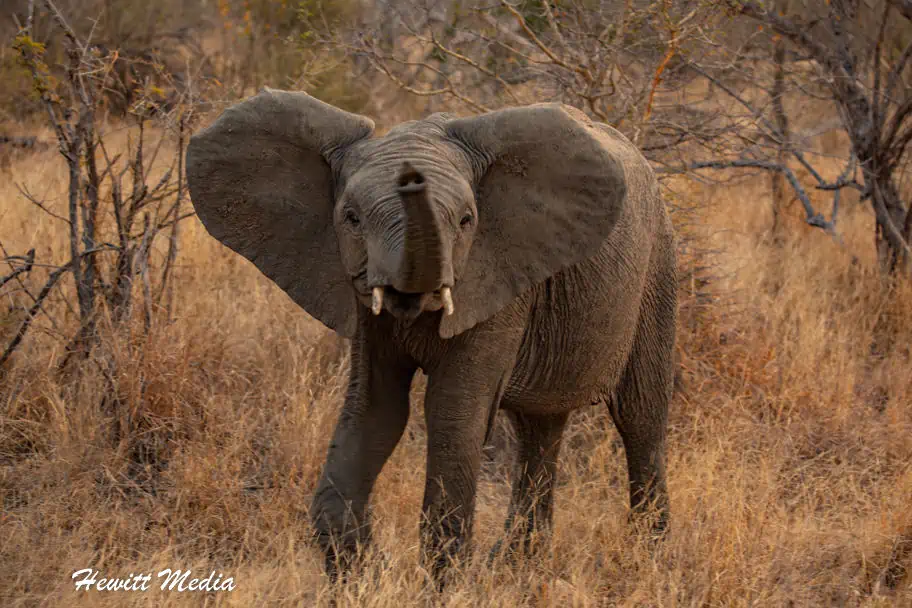
If there is one criticism I hear about Kruger National Park, it is that it can sometimes get a bit crowded. It isn’t uncommon in some areas to see crowds of vehicles around animal sightings. If you are looking to avoid that, the northern section of Kruger National Park is just what you are looking for. Although the amenities are fewer and farther between, there are still great options to choose from. This section of the park is far more secluded and will make you feel like you have the park more to yourself.
If you would like to visit Northern Kruger, you will want to read this section of my guide. Not only do I provide recommendations on rest camps, lodges, and campsites, but I provide some other great info as well. For instance, I list the picnic spots, scenic stops, and animal hides that I would recommend checking out. Hopefully this information assists you in your safari planning.
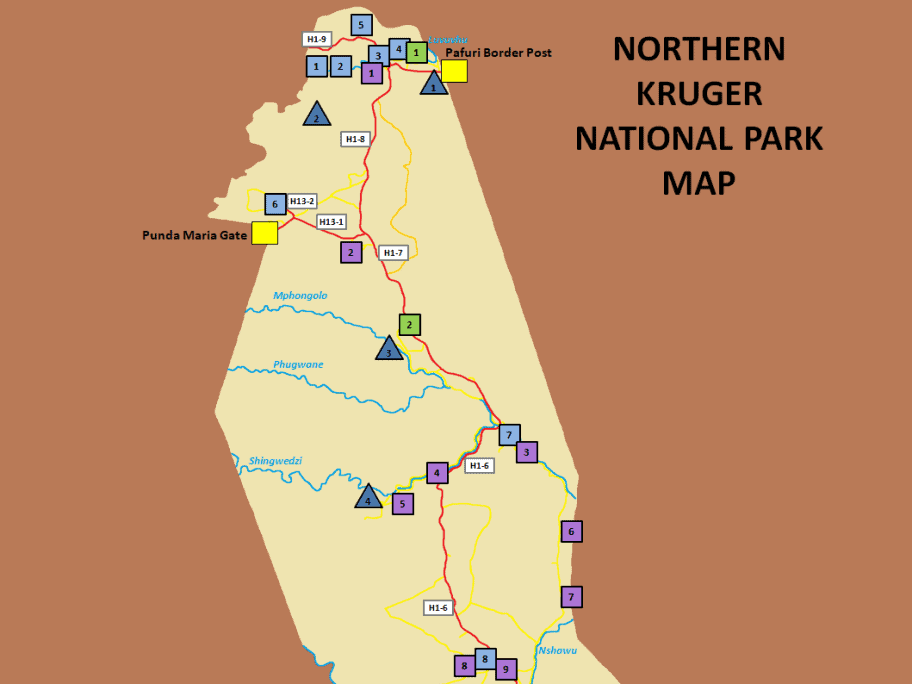
Northern Kruger Lodges and Rest Camps
Northern kruger campsites and bushveld camps, northern kruger picnic areas, northern kruger lookouts and hides, wildlife in kruger national park.
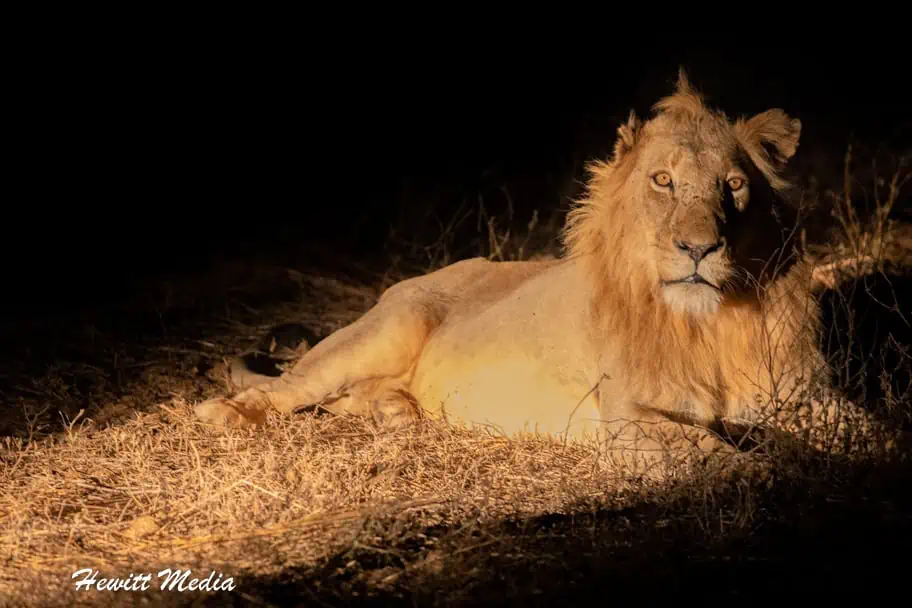
It isn’t a coincidence that Kruger National Park is one of the most renowned and popular wildlife parks in all of Africa, if not the world. Few other parks in Africa are as big and as rich and wildlife as this iconic park. To start, it is one of the very best places in Africa to see the “Big Five” animals. It is one of the few places in Africa where rhinoceros sightings are still common, thanks to a firm dedication to conservation and protection efforts.
While it may not have as many lions as you will find in Tanzania or Kenya, Kruger National Park still has a very healthy lion population for visitors to enjoy. In fact, Kruger is a great place to witness lion predation as the cats will often use the park’s paved roads to hunt giraffe and other large prey.
Finally, the park is also one of the few remaining places in Africa where you have a reasonable chance of spotting the critically endangered African Wild Dog. Sightings of these incredible animals is still rare, but not out of the question if you are lucky. For an idea of which of Africa’s most iconic animals you might expect to see on your Kruger National Park safari, please refer to the chart I included below.
Kruger National Park Safari Tips
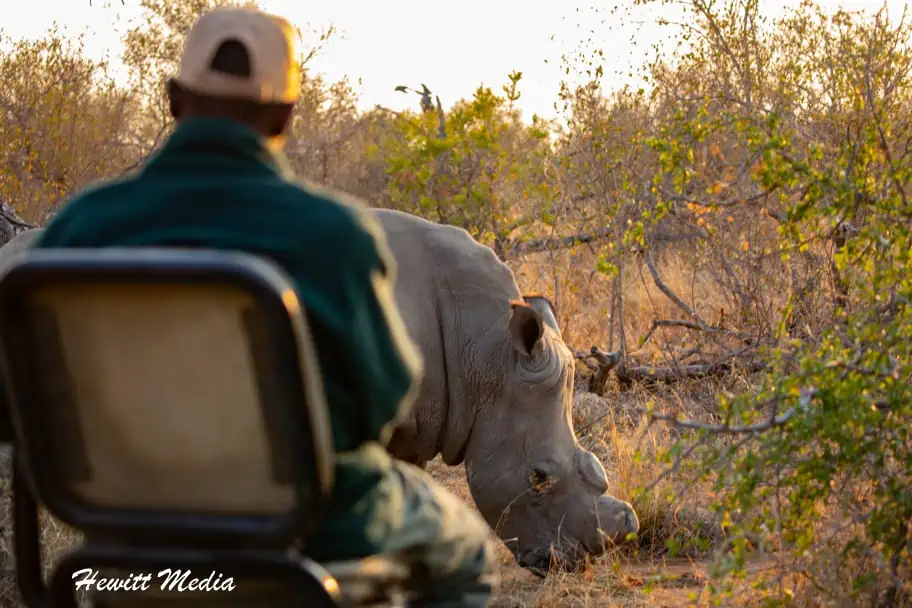
When you are on safari, especially in an iconic wildlife destination like Kruger National Park, it is easy to get lost in the experience. Being on safari in Africa is an amazing adventure that you should remember for a lifetime. However, if you aren’t careful, you might not get everything out of the experience that you could have.
In order to make sure your Kruger National Park safari is as incredible as it can be, I have provided some general safari tips for you to review below.
General Kruger National Park Safari Tips
Be patient and open-minded.
When you are on safari, everything isn’t going to go according to plan. The weather, the animal’s behavior, and other factors are going to impact where you go and what you see. Kruger National Park provides some of the best wildlife viewing opportunities in Africa, but even in Kruger, you have to be ready to adjust your plans if necessary.
Put Safety First
It is really easy to get caught up in the safari experience and want to get the best pictures you possibly can. However, safety should always be the primary concern. To give you some help on how to remain safe while on safari in Kruger National Park, I have outlined some general safety tips for you to review later in this guide.
Don’t Get Stuck Behind Your Camera
Everyone wants to get great pictures while on safari, and you should absolutely bring your camera and take a lot of pictures. However, if you spend your entire time in Kruger National Park looking thru your camera, you are going to miss out on some of the experience. I would recommend setting your camera down every-once-in-a-while and just enjoy being in such an amazing place.
Ask a Lot of Questions
Make sure you ask your guides a lot of questions while you are on safari in Kruger National Park. It is easy to get caught up in the moment and forget to ask which type of animal you are looking at or why they are doing what they are doing, but your safari guide is there to answer these questions for you. And believe me, they enjoy answering these questions. Don’t get home and regret not asking those questions.
Give Yourself Plenty of Time
Kruger National Park is a very large park, with very distinct and unique environments. There is no way that you are going to be able to explore the entire park in one trip, so if you want to see more of the park, you should plan to spend multiple days on safari in Kruger.
Kruger National Park Self-Drive Tips
Stay on the roads at all times.
Park rules require that you stay on the marked roads at all times. You cannot drive off-road in Kruger National Park.
Stay In Your Vehicle
Only get out of your vehicle in areas that are CLEARLY marked as safe to do so. Never, under any circumstance, should you get out of your vehicle otherwise. Even though you don’t see any animals, that doesn’t mean they aren’t there and that they don’t see you.
Know Your Vehicle’s Limits
Only attempt to drive on the roads marked as 4×4 only if you have a 4-wheel drive vehicle with high clearance. The last thing that you want is to be stuck in the bush because you have gotten your vehicle stuck.
Carry a Satellite Phone or Emergency GPS if You Have One
If you have a satellite phone or an emergency GPS device, such as a Garmin InReach, make sure you have it with you while you are on safari in Kruger National Park. Do not rely on having cell phone service inside the park in case of emergencies.
Be Prepared to Pay Park Fees
Not only should you have cash with you to pay your park fees, but you will also need to have enough currency converted and with you for food, drinks, and other purchases you will need to make while in the park.
Download the Tracks4Africa App
The Tracks4Africa app is the recommended app for safari navigation in South Africa. Makes sure you have this app downloaded before your visit.
Leave Yourself Time to Get Back by Dark
It can be very easy to get caught up in the safari experience and lose track of time. However, you need to make sure you get back to your rest camp, lodge, or campsite before dark. This means leaving yourself extra time in case you need it.
Kruger National Park Safari Safety Tips
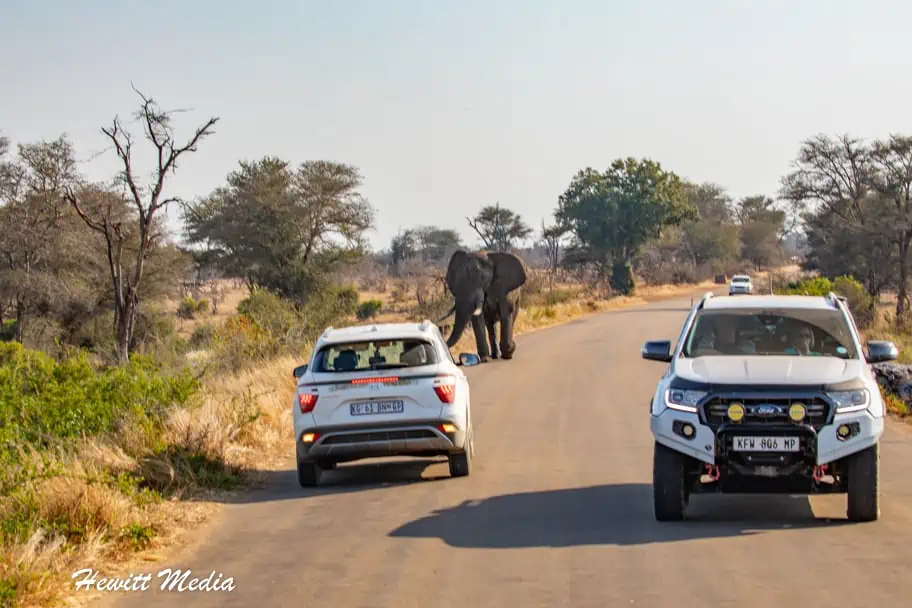
Going on a Kruger National Park safari can be an amazing and exciting experience, but it can also be incredible dangerous if you aren’t careful. While you are in the park, it is essential that you follow the rules in order to keep yourself and your loved ones safe. In addition to the posted park rules, here are some additional general safari safety rules I would remember.
Obey Your Safari Guide at All Times
The most important safari safety tip of all is to listen to your safari guide and obey them at all times. They are there to keep you safe, so let them.
Don’t Stick Anything Out of the Safari Vehicle
It is never a good idea to stick anything outside of a safari vehicle. Whether this be your arms, your feet, or your camera as you try to get a great picture, keep them inside the vehicle at all times.
Don’t Make Sudden or Frantic Movements
When you are in the safari vehicle, the animals tend to think of the vehicle, and everything associated with it as one homogeneous entity. However, if you make sudden and frantic movements, or do something else to make you stick out as a part of the vehicle, you may become an object of interest to them.
Only Exit the Vehicle in Approved Areas
This point cannot be stressed strongly enough. Never, and I mean never, get out of your safari vehicle unless your safari guide explicitly instructs that it is safe, or signs explicitly say that you can.
Avoid Leaving Your Tent or Lodge Room at Night
This rule is more applicable in private reserve accommodations that don’t have fences, but it is generally a good rule to follow regardless. Kruger National Park rest areas and lodges typically have protective border fences, which make them generally safer at night than parks in other areas of Africa. However, if you don’t need to leave your room at night, I would avoid venturing out. The African bush can be a dangerous place, especially at night.
Walk, Never Run
If you do find yourself outside of your vehicle and confronted by an animal (hopefully this never happens), then make sure that you stay as calm as possible, walk away slowly (never turning your back on the animal), and NEVER, EVER run away.
Be Careful Near Lakes, Rivers, and Water Holes
Unless you are explicitly told by your safari guide that the waters are free of hippos and crocodiles, you should never attempt to swim in a lake, river, or pond. Even then, I would think twice about doing it. In addition, you should avoid getting too close to these bodies of water. Hippos kill more people in Africa than any other animal, and crocodiles are not far behind on the list, so you always have to be safe when even approaching bodies of water.
Kruger National Park Photo Gallery
The country of South Africa has such an incredible wealth of wildlife and some of the most breathtaking landscapes in all of Africa. I absolutely cherished my Kruger National Park safari time, and I want to share some of my top photographs from that visit with you. I hope you enjoy these images and that they inspire you to book your own adventure in Kruger National Park!
If you would like to view some more of my top Kruger National Park safari photos, as well as photos from some of my many other travel adventures, make sure you are following me on Instagram as well!
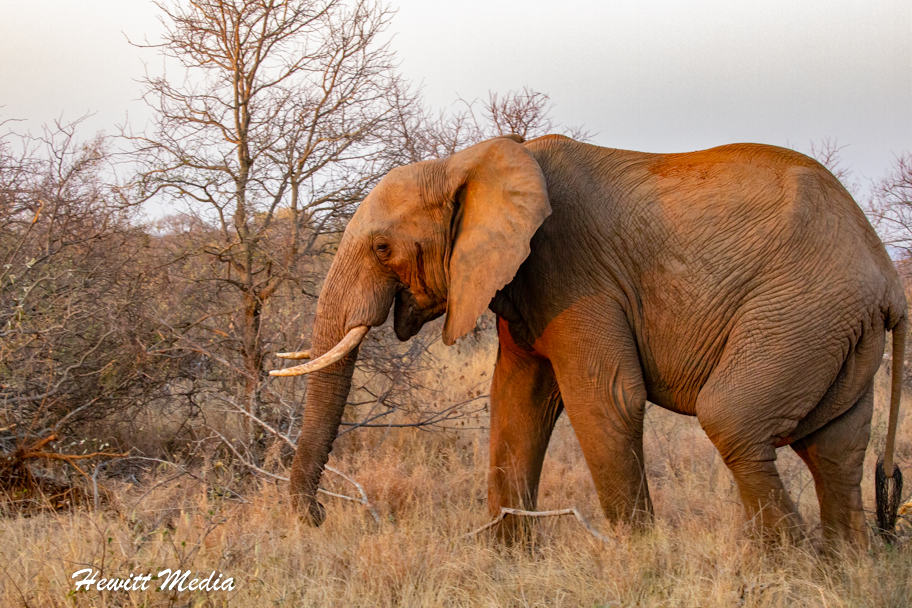
Don’t Forget to Subscribe to My Adventures!
Type your email…

Let Me Help You Save On Your Next Adventure!
‘start exploring today’ merchandise available now.
Published by Josh Hewitt
Avid traveler and photographer who loves to see new places, meet new people, and experience new things. There is so much this world can teach us, we just need to explore! View all posts by Josh Hewitt
Related Articles

Top 15 Things to See in Cambodia: Guide to Must-Visit Attractions

Navigating Peru Entrance Requirements: A Comprehensive Guide

Ecuador Entrance Requirements: Everything You Need to Know
3 comments ›.
- The 25 Top Wildlife Destinations in the World July 5, 2023 • 5:47 pm
This is an amazing and thorough guide, Josh. I haven’t looked into a safari (yet) but it’s clear that the choices are overwhelming and there are so many factors to consider, which makes this post so valuable. I hadn’t known they cut off the rhino’s horn to discourage poaching. As you say, so sad they are forced to do that.
Thanks so much!!! Yeah, there are so many different factors to consider. Indeed it is sad that it has come to having to cut the horns off animals in order to save them.
Leave a Reply Cancel reply
Thank you so much for reading and for the kind words!!
Thanks for sharing this inspiring list of mountain travel destinations! Each place, from the majestic Mount Everest to the vibrant…
[…] The 20 Best Travel Accessories for 2024: An Essential Guide – https://wanderlustphotosblog.com/2024/01/24/the-20-best-travel-accessories-for-2024-an-essential-gui… […]
[…] Choosing how to travel depends on what you like and your budget. To plan better, check out this guide.…
Discover more from Wanderlust Travel & Photos
Subscribe now to keep reading and get access to the full archive.
Continue reading
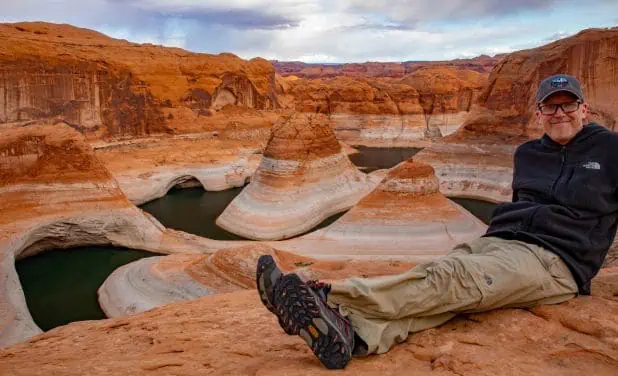
Subscribe To My Adventures!
- 5 Day Fly-In Safaris
- Family Safari Packages
- Manyeleti Game Reserve
- Boulders Private Camp
- Request a Video Call
- Request a Quote
Compare 95+ Kruger National Park Safaris
25+ Years Experience | Local Experts | Best Safaris Guaranteed
Request a Video Call
Why not meet with me to discuss your travel plans, and let me personally advise you on the booking process?
Our Best and Top Rated Kruger National Park Safaris
Our top discounted offers, giving you the best possible price on your Kruger Safari Adventure.
4 Day Kapama Southern Camp
Book and travel within 21 days and get 25% discount per person. Valid untill 19th December 2024
From ZAR 23940
Email us for more: [email protected]
5 Day Kapama River Lodge
From ZAR 31020
3 Day Kapama Buffalo Camp
From ZAR 18300
4 Day Kapama River Lodge
Client Reviews
Fly-in safari packages now available, budget kruger safaris, mid-range kruger safaris, luxury kruger safaris.
Executive Safaris
Message from our Manager
A place that encapsulates the essence of African beauty and diverse wildlife, The Kruger National Park is an area for the adventurer. Kruger Park Safaris offers a unique range of safaris, activities and tours to make your wildlife experience nothing short of incredible. View all our Kruger National Park Packages and Prices.
Specialised Kruger Park Tours Available
Choose from specialized tours including couple, family safaris, and fly-in safaris.
Tailor your experience to your preferences, whether you desire a romantic escape, an adventure with loved ones, or a luxurious fly-in safari.
- Couples Safari Packages
Tailor made for couples and honeymoon safaris.
Find out more
Unforgettable family safari adventure awaits.
Private Safari Packages
We offer private safaris to one of the finest safari destinations in Africa.
Safari Destinations
Kruger National Park
- View All Safaris
- Sabi Sands Game Reserve
Kapama Reserve
- Thornybush Game Reserve
- Timbavati Game Reserve
- Klaserie Game Reserve
Balule Game Reserve
Plan my Safari
With over 25 years in the industry, we have the edge to advise you the best options based on your expectations and budget. Let us help you.
Request a Call
Not sure of the best time to come on safari? Like to speak to us face-to-face? Let's set up a meeting and discuss your next adventure.
@the.kruger.safari.co
Self Catering
Skukuza Rest Camp Lower Sabie Rest Camp Berg en Dal Rest Camp Pretoriuskop Rest Camp Crocodile Bridge Rest Camp Biyamiti Bushveld Camp
Olifants Rest Camp Letaba Rest Camp Talamati Bushveld Camp Malelane Satelite Camp Satara Rest Camp Orpen Rest Camp
Roodewaal Private Camp Balule Satelite Camp Tamboti Satelite Camp Maroela Satelite Camp Mopani Rest Camp Shingwedzi Rest Camp
Punda Maria Rest Camp Shimuwini Bushveld Camp Sirheni Bushveld Camp Bateleur Bushveld Camp Tzendze Rustic Camp Boulders Private Camp
Luxury Game Reserves
Kapama Game Reserve Thornybush Game Reserve
Timbavati Game Reserve Klaserie Game Reserve
Balule Game Reserve Manyeleti Game Reserve
Diverse National Park
The Kruger National Park is one of the biggest National Parks in Africa. It is situated at the North-Eastern tip of South Africa and spans over the Mpumalanga and Limpopo province. The parks surface area spans 19633 km² as many of the surrounding private reserves have removed their fences, allowing wildlife to roam freely between reserves. This has created a wildlife area like no other, as its beauty soaks itself into anyone who visits this diverse place. The area plays home to a number of species including:
- 147 Mammals
- 114 Reptiles
- 507 Bird Species
- 34 Amphibians
- 336 Tree Species
Brief History of the park
The Sabie Game Reserve (as it was then known) was proclaimed in 1892 by the president of the Transvaal Republic, Paul Kruger. The area between the Sabie and Crocodile Rivers were initially set aside for restricted hunting and in 1902 James Stevenson-Hamilton was appointed the first warden.
In May 1926 the Sabie and Shingwedzi Game Reserves were combined to create the Kruger National Park. There are nearly 254 cultural heritage sites in the Kruger including rock art sites.
Homo erectus (early humans) roamed the area between 500 000 and 100 000 years ago and cultural artefacts have been found from 100 000 to 30 000 years ago.
There is lots of evidence of the San and Iron Age people who lived on these lands 1500 years ago and there are historical tales of the Nguni and European explorers and settlers in the Kruger area.
Introduction to Kruger National Park
Kruger National Park is the flagship of wildlife tourism in South Africa and one of the world’s favourite safari destinations. Located in the heart of the safari hub in the north-eastern corner of the country, the iconic national park offers visitors 2-million hectares of unrivaled beauty and outstanding fauna and flora diversity.
There’s something for everyone in the vast protected wilderness region, whether you’re a wildlife enthusiasts, avid birder, nature lover or just yearning to swop busy city life for the peace and tranquility in beautiful bushveld surrounds.
Kruger Park and its exclusive neighbour, Greater Kruger, spans the boundaries of the Mpumalanga and Limpopo provinces and shares a border with Zimbabwe and Mozambique. It’s one of the largest protected wilderness areas on the continent and certainly one of the most diverse.
What’s not to love about Kruger Park?
We share some interesting facts and recommendations for places to stay and things to do in Kruger Park for the safari holiday of your dreams.
10 Fascinating facts about Kruger National Park
- Kruger Park is the largest and oldest national park in South Africa. There are 21 state-supported national parks in the country which are managed by the South African National Parks (SANParks). Kruger Park is South Africa’s flagship national park and an iconic safari destination.
- Kruger Park is massive. It covers an area of 20 000 square kilometres (2 million hectares) which makes it the same size as Israel and slightly smaller than Belgium. The Park is 360 kilometres long and 65 kilometres wide.
- South Africa, Zimbabwe and Mozambique meet at the most-northerly point of Kruger Park where the Luvuvhu and Limpopo rivers converge at Crookes Corner in the Pafuri triangle. If you stand at Crookes Corner looking north; Mozambique is on your right, Zimbabwe is straight ahead and South Africa is behind you.
- Kruger Park is almost 100 years old. It was proclaimed a ‘no hunting zone’ in 1898 and eventually proclaimed a national park in 1926. It came about through the merge of Sabie and Shingwedzi game reserves. The first tourist who entered Kruger Park in 1927 was charged an entry fee of £
- There is evidence that humans occupied the wilderness region over one-and-a-half million years ago. Archaeologists have unearthed tools and artefacts that date back to the Stone Age, including significant rock painting sites. Thulamela in the far north is a stone-walled site built over 500 years ago and dates back to the Iron Age.
- The national park was named in honour of Paul Kruger, the president of the former Transvaal Republic. Kruger fought hard to have the wilderness area proclaimed a national park and for its precious natural resources to be protected from unchecked hunting and rampant poaching. It took 12 years from when Paul Kruger first tabled the notion in parliament to the region finally being proclaimed.
- Colonel James Stevenson-Hamilton was the first game warden appointed to oversee the running of what would become Kruger Park. At the time it was Sabie Game Reserve. The former Scottish cavalry officer fought in the Anglo Boer Ware before taking up his role of warden in 1902. Stevenson-Hamilton worked tirelessly for 44 years on establishing Kruger Park as a world-class tourism and conservation entity. His journals are housed in the Stevenson-Hamilton memorial museum at Skukuza Rest Camp.
- Each year, almost 1 million people visit Kruger Park and at least 80% are South African holidaymakers. Visitors are spoilt for choice for places to stay in Kruger Park. There are 21 SANParks-run establishments and 15 luxury safari lodges that form part of a collection of private concessions in Kruger Park.
- Kruger Park is home to the famous Big 5 which includes elephant, buffalo, rhino, lion and leopard. But that’s not all! The national park is world-renowned for its outstanding biodiversity, prolific birdlife and vast array of wildlife. Combined, Kruger National Park and Greater Kruger represent one of the finest and most diverse biospheres in Africa. The vast protected wilderness region is the core of the Kruger2Canyons (K2C) and Vhembe UNESCO Man and Biospheres, and the heart of the Great Limpopo Transfrontier Conservation Area (GLTP Treaty, 2002).
- Kruger Park is the only national park in Africa that has its own international airport and golf course. Skukuza Airport serves scheduled and charter flights from African safari destinations like Botswana, Zimbabwe and Mozambique. Skukuza Golf Club has a 9-hole golf course that lies on the banks of the Sabie River. It’s unfenced so it’s not uncommon for golfers to tee off with buck, giraffe and zebra on the fairways.
- The Scientific Services Department at SANParks holds its most important yearly event, the Savanna Science Network Meeting, in the Kruger National Park in autumn. Together with external experts, Scientific Services’ formidable staff of scientists covers a wide range of subjects in their research. Among these are methods for conducting demographic surveys, keeping tabs on vegetation, studying fire behaviour, and conducting airborne game censuses, among others.
- The wettest season in Kruger occurs during the summer. The downpours that come from this kind of precipitation are often convectional. Typically, mild and hot weather characterises the season (October–April). Warm and mild winters are the norm.
- The first official research unit in SANParks was established in the 1950s, which led to the founding of the Skukuza Biological Reference Collection. Presently, the collection maintains more than 31,000 specimens of preserved flora and fauna. The reference collection’s primary objective is to provide as an identification service for private nature reserves, staff, and visiting researchers. Taxonomic and anatomical studies, reference book compilation, and tracking of species distribution changes across time and space are some of the other uses for the available material.
- The Majestic Seven elephants of Kruger National Park, known for their enormous tusks, have captivated and motivated people all around the globe since they were named in the 1970s. Even though ivory hunting and poaching have decimated elephant herds in many African countries, Kruger’s legacy endures.
- It is said that the largest female tusker in Kruger is MaMerle, a stunning elephant cow. The high-water bridge over the Sabie River was the first place she was spotted (August 14, 2004). During the 2004 elephant census, she was also photographed from a helicopter. She seemed to be carrying twins, who would be around three or four years old. She was named after Merle Whyte, whose husband, Dr. Ian Whyte, worked on large mammal research.
- While the majority of Kruger’s rock art is located in the park’s southwestern foothills, new evidence reveals that shelter paintings are commonplace across the whole park. In 2007, Conraad de Rosner conducted a rock art study that added 57 sites to the 120 previously known sites, the majority of which were identified by Mike English, the forefather of rock art studies in Kruger. It seems that the San hunter-gatherers of the Late Stone Age created nearly all of Kruger’s rock art.
- Kruger has been inhabited by humans for a very long time, beginning in the Stone Age. Near Pafuri in the extreme north lies the stone-walled Thulamela Iron Age Site, which dates back about 450 to 500 years. Several artifacts found at the site show that the town was an important node in a vibrant commercial network dominated by Arab merchants off the east coast of Africa at the time.
- An incredible variety of plant life can be found in Kruger National Park. Roughly 1,982 plant species are known.
- A common sight in the northern KNP environment is the Adansonia digitata, also known as the Baobab tree. The tree was given its name in recognition of Michel Adanson, a naturalist who observed it for the first time in Senegal, Africa, about 1750. You can see why the baobab tree is called the upside-down tree. The tree’s above-ground root system resembles its branches. Between Satara Rest Camp and Tshokwane Picnic Spot is where you will find the park’s southernmost baobab tree.
- The Kruger National Parkcovers six different ecosystems, including the famous Baobab sandveld and the dense Mopani scrub. Beautiful knobthorn-marula bushveld greets sightseers as they make their way down the Lebombo hills, and a diverse array of animals call the mixed acacia thicket home. The Combretum-silver clusterleaf woods adorns granite outcrops, providing shade and shelter. Riverine woods, which grow abundantly along the park’s rivers, are home to many species and provide essential resources.
- Among the 114 reptile species found in KNP are over 3,000 Nile crocodiles and a variety of snakes, the most menacing of which are the black mamba and puff adder.
- The Kruger National Park is home to around 60 species of lizards. A big and well-known chameleon, the Kruger’s Flapped-Necked Chameleon has a continuous crest of tiny, white triangular tubercles on its belly and throat. Coloration ranges from a light shade of yellow to a variety of greens and browns. There is typically a pale bar on the side and a white belly crest.
- Sabie, Olifants, Crocodile, Letaba, Luvuvhu, and Limpopo Rivers are among many that flow through the park.
- There are 517 bird species in Kruger National Park, with 253 permanent inhabitants, 117 seasonal migrants, and 147 nomadic birds.
- The Park’s protection zones are home to the six big bird species, affectionately referred to as the Big 6. The following are some of these species: the ground hornbill, martial eagle, saddle-billed stork, kori bustard, and the rare and elusive Pel’s fishing owl.
- The Park is home to 25 to 30 pairs of saddle-billed storks. There were 78 known nests of ground hornbills in 2012, with 50% of those nests being actively used. There were 178 ground hornbill family groups in total at the time.
- There are nine wilderness routes to choose from in Kruger National Park, some of which go deep into the bush and are almost completely uninhabited. Wilderness areas cover over half of the park’s 2 million hectares, and several route operators provide hikes through these zones. With the goal of providing guests with a true wilderness experience, groups stay in rustic, very rudimentary accommodations; game watching is a secondary attraction.
- A hut at Malelane Restcamp is named after Harold Trollope, who was an early developer of the Kruger and Addo Elephant Parks, as well as an avid big game hunter and one of the original owners of the Camelthorn Reserve.
- A very ancient leadwood tree with a traditional Portuguese Cross cut into it stands a few kilometers away from Letaba on the S95. Neither its identity nor its significance have been revealed. The artist Diocleciano Fernandes das Neves, who arrived in Lourenço Marques on October 5, 1855, when he was 25 years old, and went back to Portugal some thirteen years later, is one possible candidate for the carving. He hunted elephants and traded in the interior for those thirteen years. Kruger National Park is located where his trade route once was.
Did you know?
Kruger National Park is the core of the Kruger2Canyons and Vhembe UNESCO Man and Biospheres, and the core of the Great Limpopo Transfrontier Conservation Area (GLTP Treaty, 2002).
The Kruger2Canyons (K2C) Biosphere Reserve was registered in September 2001 in Paris by UNESCO. It became the 411th Biosphere Reserve site to be registered in 94 countries worldwide and acknowledged for its global significance.
Vhembe Biosphere Reserve is located in the north-east of South Africa near the border with Botswana, Mozambique and Zimbabwe.
The reserve includes the northern part of Kruger National Park, Mapungubwe National Park and World Heritage site, several Provincial Nature Reserves, two recognised centres of biodiversity and endemism (Soutpansberg and Blouberg), and the Makgabeng Plateau, which contains more than 1 000 rock art sites.
Where to go in Kruger Park
Kruger park is massive and where you stay depends on what interests you and what you want to see. basically, you can use this guideline:.
- If birds are more important than big herds of animals and you’ve got time to travel, stay in the far north in one of the most spectacular corners in Kruger around Punda Maria and Pafuri.
- If you want elephants, no crowds and can tolerate very hot, humid and arid conditions; stay in the northern section around Olifants and Letaba.
- If you want to see great sightings of lion and the other Big Cats and enjoy great game viewing without the safari crowds, stay in the central section around Orpen and Satara.
- If you want to see the Big 5 and as many animals as possible in the shortest space of time and without travelling long distances, stay in the southern section between Pretoriuskop, Lower Sabie and Skukuza.
Southern Kruger Park
Southern Kruger is bound by the Crocodile River in the south and Sabie River in the north. The bushveld is lush and there are many permanent water sources, which means the southern area has one of the highest concentrations of animals in the Park.
You’ll see excellent sightings of the Big 5 in the southern zone with guaranteed sightings of lion, rhino and large herds of elephant and buffalo in the triangle of Pretoriuskop, Lower Sabie and Pretoriuskop. There are fewer lions in the southern region as they tend to follow the large herds of antelope that favour the central region.
Southern Kruger is also rich in history as it served as the gateway to the port of Lourenço Marques (now Mozambique) for ancient traders. It’s also the birthplace of Kruger’s famous dog, Jock of the Bushveld, who travelled with the intrepid Percy Fitzpatrick.
Pros of staying in southern Kruger
- most accessible section; easy to get to from Johannesburg and Nelspruit
- highest concentration of game
- incredible scenery and lush vegetation
- rich in history
- wide choice of accommodation
- home to the largest rest camp and administration centre in Kruger
Cons of staying in southern Kruger
- busiest part of the park
- ‘queue to view’ at animal sightings
Central Kruger Park
Central Kruger Park is the largest area of the national park and makes up 30 percent of the surface area. It lies between Sabie River and Olifants River. This stretch of bushveld gets higher rainfall which means sweeter grass for grazing and a plenty of browsing trees. This in turn attracts an abundance of antelope as well as giraffe, zebra and wildebeest.
With a plenty to eat, central Kruger is also known as the ‘Big Cat Capital of Kruger’. This eco-zone supports nearly half of the Park’s lion population as well as strong numbers of leopard, hyena and cheetah. It’s estimated that there are at least 60 individual prides of lion in central Kruger.
The vegetation is not as lush as southern Kruger but it’s still a beautiful stretch of wilderness area. Central Kruger is characterised by mixed thornveld and woodlands with sweet-grazing savanna grasslands. Perfect for easy and plentiful game viewing.
Pros of staying in central Kruger
- good general game with strong populations of antelope
- highest concentration of lions and strong numbers of leopard, hyena and cheetah
- thinned out safari crowds
Cons of staying in central Kruger
- further to drive from Johannesburg and Nelspruit
- longer drives between rest camps
- hotter and more humid than southern Kruger
Northern Kruger Park
Northern Kruger is vastly different from southern and central Kruger Park and attracts a different set of wildlife and nature lovers. It’s receives very little annual rainfall and is semi-arid and stark. It has its own appeal though, with vast barren landscapes dotted with shrub mopane.
A redeeming feature of northern Kruger is five major rivers forge a path across the valley, the two notable rivers being Olifants and Letaba. These permanent water sources create a tapestry of lush riverine forests and attract animals to their fertile river banks. Game viewing along the river banks is fantastic and you’ll likely to see leopard in the massive sycamore fig, tamboti and apple leaf trees that line the banks.
Northern Kruger is also home to the ‘big fellows’. It’s home to almost 60 percent of the total hippo population of Kruger and at last count, there are over 9 000 elephants in the northern belt. You’re also edging into birder’s paradise in the Far North so if you’re an avid birder, you won’t be disappointed as bird life is prolific in northern Kruger.
The area around Olifants Rest Camp is famously known for its Big Tuskers, the incredible elephants who are part of the Magnificent 7 for their record-breaking, astoundingly-long tusks.
Northern Kruger stretches more or less from Olifants Rest Camp to Shingwedzi Rest Camp. Accommodation options are somewhat limited but because this eco-zone is far off the beaten track, tourist numbers are low anyway.
Pros of staying in northern Kruger
- low tourist numbers and ‘almost private’ animal sightings
- great game viewing on the banks of the five major rivers
- excellent birding
- strong populations of elephant and hippo
- unobstructed game viewing in stunted mopane veld
Cons of staying in northern Kruger
- fewer rest camps
- hot, humid temperatures in summer
- stark, semi-arid terrain
Far North Kruger Park
Far North Kruger is remote and far to reach so it’s one of the quietest sections of the Park and popular among avid nature lovers for its pristine, untouched wilderness. It’s also the “Birding Capital of South Africa”, if not the whole of southern Africa.
This outstanding eco-zone centres around Punda Maria Rest Camp and Pafuri Camp, and extends to the far reaches of Kruger Park to its neighbours Zimbabwe and Mozambique. The concentration of animals is lower than anywhere else in Kruger Park but it’s reputation for outstanding birding makes up for it in spades.
Far North Kruger is home to many rare and endangered bird species, many of which are endemic to the area. You’ll also find extraordinary species such as the rare knocking sand frog, a collection of endemic bats, samango monkeys, the nocturnal bushpig and the rare Sharpe’s grysbok.
Walking safaris are very popular in Far North Kruger because it’s the best way to discover this hidden gem. Flanked by the lush Luvuvhu and Limpopo rivers, Far North Kruger boasts an incredible variety of tropical, riverine forests. This includes the huge wild fig, spectral fever tree, ebony, mahogany, ironwood, wild syringa and baobab.
Pros of staying in Far North Kruger
- one of the most incredibly diverse and scenic parts of Kruger
- remote, isolated and almost devoid of safari tourists
- outstanding birding
- beautiful walking trails
Cons of staying at Far North Kruger
- far off the beaten track
- limited choice of accommodation
Kruger Park is made up of 6 different eco-systems. In total, these eco-systems have over 2 000 plant species.
Places to stay in Kruger National Park
The choice of places to stay in kruger park is endless and if you’ve got dollars and pounds in your pocket, on the south african exchange rate, they’re incredibly affordable. the bulk of accommodation in kruger park is budget-friendly, self-catering camps that are managed by sanparks..
For an exclusive safari experience comparable with what you’d get in Greater Kruger and world-renowned safari destinations in the rest of Africa, you have the option of booking a luxury suite at a 5-star safari lodge on one of the private concessions in Kruger Park.
SANParks accommodation
There are 21 camps in Kruger Park which are managed by South African National Parks (SANParks), the governing body that maintains and runs Kruger Park’s primary accommodation. SANParks offers basic, affordable accommodation which includes the main rest camps, satellite camps, bushveld camps and bush lodges as well as a rustic tented camp and overnight hides.
Kruger Rest Camps:
- Pretoriuskop Rest Camp
- Skukuza Rest Camp
- Berg-en-Dal Rest Camp
- Letaba Rest Camp
- Mopani Rest Camp
- Lower Sabie Rest Camp
- Satara Rest Camp
- Punda Maria Rest Camp
- Shingwedzi Rest Camp
- Olifants Rest Camp
- Orpen Rest Camp
Kruger Park Satellite and Bushveld Camps:
- Bateleur Bushveld Camp
- Balule Satellite Camp
- Biyamiti Bushveld Camp
- Boulders Bush Lodge
- Crocodile Bridge Bush Camp
- Maroela Private Camp
- Malelane Satellite Camp
- Roodewal Bush Lodge
- Talamati Bushveld Camp
- Tamboti Satellite Camp
- Shimuwini Bushveld Camp
- Sirheni Bushveld Camp
Tented camp
- Tsendze Camp
Overnight Hides
- Shipandani Hide
Satara Rest Camp • Central Kruger
Satara Rest Camp is located in the central section in the heart of the “Big Cat Capital of Kruger”. The bushveld has sweet grazing and plenty of browsing trees which attracts large numbers of antelope and plains game. In their wake, follow lions and cheetah as well as hyenas and wild dogs.
Satara is the second biggest camp in Kruger and the most popular in central Kruger. It’s often booked for up to a year in advance. It has a rustic charm and retains much of its Kruger heritage. The bulk of the accommodation is set out in a series of circles and comprises self-catering bungalows and traditional Kruger rondavels.
The camping section has 100 sites and is electrified. Satara also has a popular section for day visitors where they can stretch their legs and have a picnic or mid-day barbeque. Facilities at Satara include a large swimming pool, decent restaurant, well-stocked shop and fuel station.
Skukuza Rest Camp • Southern Kruger
Skukuza Rest Camp is the largest and busiest rest camp in Kruger which does put some people off but it’s the central hub of the Park and located in an area teeming with animals and birds. Daily sightings of the Big 5 and an abundance of antelope and plains game are common.
Skukuza is easily accessible for day tours and short 3-day Kruger safaris. It’s also the best Kruger rest camp for families with children because there’s so much to do in the camp in between game drives. Skukuza accommodates up to 1 000 visitors in self-catering bungalows, family cottages and guest houses and has two excellent eateries for those who don’t want to cook and clean up.
Facilities at Skukuza Rest Camp include a huge fully-stocked shop, a library, photographic studio, outdoor cinema, kid’s playground, swimming pools and a lovely river walkway. Close by is a wonderful 9-hole golf course situated in the Skukuza staff village, which also has a massive Olympic-size pool for paying guests. Skukuza Airport is a short 10-minute drive from the rest camp.
Olifants Rest Camp • Northern Kruger
Olifants Rest Camp is located in the ‘Big Tuskers Capital of Kruger’ and is as popular for its incredible location and panoramic views as it is for its great game viewing. It sits perched on an escarpment overlooking the Olifants River and Lebombo Mountain in the distance. On a clear day, you can look out across the savanna plains to the hills of Mozambique.
When the river is full, the sound of the crashing water carries up to the rest camp and you can spend hours on the terrace gazing out and looking for animals with your binoculars. The game drives from Olifants are spectacular as you have the choice of a number of rivers to explore. It’s paradise for photographers and birders.
Olifants is a big camp and even so, it’s still booked out well in advance. The accommodation is geared for family-friendly, self-catering holidays in Kruger with a choice of bungalows, family cottages and semi-luxury guesthouses. There is no camping site in Olifants but there is a popular day visitor spot for picnics and barbeques.
The large camp offers everything you need for a safari holiday in a more remote section of Kruger, including a lovely restaurant, large shop, fuel station and medical clinic. To learn more about the Big Tuskers (elephants) in the Olifants area, visit the Elephant Hall at Letaba Rest Camp which is a scenic 15-minute drive away.
Shingwedzi Rest Camp • Northern Kruger
Located in northern Kruger, Shingwedzi Rest Camp is a quieter camp but still hugely popular. The rustic rest camp retains much of its original charm and is relatively unspoilt by modern technology. Staying at Shingwedzi is all about immersing yourself in the peace and tranquility of beautiful bushveld surrounds.
Lying nestled on the banks of the lush Shingwedzi River, the accommodation is laid out in two adjacent rings. Visitors have a choice of bungalows, traditional Kruger rondavels, family cottages and a semi-luxury guesthouse.
The rest camp caters for families and friends on budget-friendly, self-catering holidays but it does have a good restaurant for those who don’t want to cook and clean up. Northern Kruger gets very hot and humid so most visitors congregate at the camp’s massive pool to cool down in between daily game drives.
The game in the dry, semi-arid plains is a bit sparse but you should see large herds of elephant and buffalo congregating closer to the river. Walking safaris are very popular in northern Kruger as well as guided night drives with SANParks rangers. Shingwedzi is positioned on the border of Far North Kruger so birdlife is prolific.
Luxury accommodation in the Park
For an exclusive safari experience similar to what you’d get in greater kruger, there are 15 luxury safari lodges on a collection of 5 private concessions in kruger park. the private concessions are operated by private entities on land on loan from the government. they are unashameably marketed to the high-end wildlife traveller and offer luxurious accommodation and world-class facilities..
The private concessions offer guests a more authentic with low tourist numbers. The safari lodges have exclusive access to their private land as well as access to Kruger’s public roads. Daily game drives are in an open safari vehicle with a dedicated guide and tracker. The private concessions were authorised by government to generate much-needed income for the Park from international tourism.
The 5 Private concessions in the Kruger are:
- Singita Private Concession
15 000 hectares located in the remote and mountainous eastern region close to the Mozambique boundary and at the confluence of two mighty rivers; home to the ultra-luxury Singita Lebombo and Singita Sweni safari lodges.
- Imbali Private Concession
10 000 hectares located in the heart of central Kruger Park and home to 3 outstanding luxury lodges which includes Hamilton’s Tented Camp.
- Jock of the Bushveld Private Concession
6 000 hectare concession located in the southern Kruger’s Big 5 country where the Mitomeni and Biyamiti rivers meet and home to 2 luxurious safari lodges.
- Lukimbi Private Concession
15 000 hectares located in southern Kruger and bordered by three rivers; it’s the largest private concession in the Kruger Park although there is only one luxury safari lodge in the area, Lukimbi Safari Lodge.
- Tinga Private Concession
5 000 hectare located in southern Kruger with the Sand and Sabie rivers passing through the concession; renowned for its high population density of Big Cats which include leopard, lion and cheetah as well as large numbers of spotted hyena and wild dog.
The 15 Luxury Safari Lodge in the Kruger Park
With authentic buffalo dung walls and rustic finishes, Camp Shawu promises guests a real ‘Out of Africa’ experience. Private decks overlook the Mpanamana Dam and beautiful bushveld surrounds. Camp Shawu is the sister camp of Camp Shonga on a 15 000-hectare private concession.
- Camp Shonga
Camp Shonga is a small intimate bush retreat built in the foothills of the Lebombo Mountains, offering views over the African bushveld as far as the eye can see. Camp Shonga shares the same ethos as Camp Shawu but with the added emphasis of guests’ participation in select environmental awareness programmes.
- Hamiltons Tented Camp
Hamiltons Tented Camp offers an authentic safari experience coupled with pure luxury and indulgence. There are 6 superb canvas tents at Hamiltons Tented Camp which lie nested in a grove of ancient Jackalberry trees on the banks of a seasonal river.
- Hoyo Hoyo Safari Lodge
Hoyo Hoyo Safari Lodge is an exclusive safari lodge that lies nestled in a lush riverine forest on the banks of the Mluwati River. It offers guests the choice of 6 beautifully decorated air-conditioned suites with luxurious features. The tented units at Hoyo Hoyo Safari Lodge look onto a waterhole and beautiful bushveld surrounds.
- Imbali Safari Lodge
Imbali Safari Lodge has 12 spacious private suites. Each suite has a private wooden deck and plunge pool and overlooks the N’waswitsontso riverbed. Activities include daily morning and evening game drives, guided bush walks and spa treatments in the comfort of your private suite.
- Jock Safari Lodge
Jock Safari Lodge offers luxury safari accommodation on what was the first private concession in the Kruger Park. The luxurious safari lodge exudes old-world charm combined with the distinctive character of the Zulu and Shangaan cultures.
- Lukimbi Safari Lodge
Lukimbi Safari Lodge is a 5-star luxury safari lodge located in southern Kruger on the largest concession in the national park. With only one deluxe safari lodge operating in a private area that spans 15 000 hectares, guests staying at Lukimbi Safari Lodge are guaranteed the ultimate exclusive safari experience.
- The Outpost
The Outpost is located in the extreme north of the Kruger Park in the Makuleke region which is bordered to the north by the Limpopo River and Zimbabwe and Mozambique to the east. It offers luxurious accommodation in a spectacular setting which is renowned for its incredible biodiversity and prolific birdlife.
- Shishangeni Private Lodge
Shishangeni Private Lodge is built on what was the last private concession allocated to private operators in the Kruger National Park. It’s located in the south-eastern region with the Crocodile River on its southern boundary and Mozambique boundary to the east.
Birdwatching
There are over 517 recorded bird species in the Kruger Park, of which 250 are year-round residents. Many bird species are endemic which means they are not found anywhere else.
Kruger Park is home to many globally-threatened species. In the Pafuri area, quite a few birds listed on the red data species are found in healthy numbers. This includes the bateleur eagle and southern ground-hornbill as well as the lappet-faced vulture, martial eagle, kori bustard and grey-headed parrot.
Birdlife is prolific throughout the Park but the best place to go for birding is Far North Kruger. Stay at Pafuri Camp and enjoy incredible bird sightings.
Skukuza Golf Club
Who says you have to miss out on golf while on holiday in Kruger Park? The Skukuza Golf Course in southern Kruger is legendary. It was established in 1972 as a recreational facility for Skukuza staff members and later opened to the public. It’s situated close to Skukuza Rest Camp.
The 9-hole golf course isn’t fenced so don’t be surprised if you find yourself sharing the fairway with antelope, giraffe and zebra. Watch out for hippo and crocodiles in the water holes. It’s not the most pristine golf course in South Africa but everyone loves playing it. The 19th holes is the best hole.
The Big 6 in the bird world are the ground hornbill, martial eagle, saddle-billed stork, lappet-faced vulture, Pel’s fishing owl and the kori bustard.
Stevenson-Hamilton Knowledge Resource Centre & Museum
This fascinating facility is located at the entrance into Skukuza Rest Camp. It’s an opportunity to learn about the history of Kruger Park and the game wardens who pioneered its development and conservation.
The Stevenson-Hamilton Museum holds many fascinating artefacts, books and valuable documents depicting much of the life of the first game warden in Kruger Park. One of the most renowned items on display is the knife which belonged to another famous ranger, Harry Wolhuter. He used the small knife to kill the lion that had him in the grip of his jaws.
Kruger Park as over 300 archaeological sites and is rich in cultural history. There’s evidence that the region was inhabited over two-and-a-half million years ago and artefacts found in the Park date back to the Stone Age and Iron Age.
The three most significant archaeological sites in Kruger Park that are open to the public are:
Albasini Ruins
Albasini Ruins are the remains of the 19 th century trading post that was established by a legendary Portuguese trader, Joao Albasini. Located close to Phabeni Gate, Albasini’s settlement at Magashula’s Kraal is believed to be the first European settlement in the disease-ridden Lowveld.
This late Iron Age site is located on a prominent hillside about 12 kilometres from the Phalaborwa Gate on the tar road to Letaba Rest Camp. The site was inhabited by a Sotho-speaking Ba-Phalaborwa tribe during the 1800’s who developed an advanced and sophisticated industry of mining, smelting iron ore and trading in these iron products.
Thulamela is a stone-walled site located in the far north region of the Kruger Park. It dates back some 450 to 500 years to the late Iron Age. When the Great Zimbabwe region was abandoned due to political turmoil, several groups of Shona-speaking inhabitants moved south across the Limpopo River into the north-eastern region of South Africa and northern Kruger Park. They established new smaller chiefdoms such as Thulamela.
The important archaeological site has uncovered the skeleton of a female that dates back to AD 1600. A second skeleton of a man found at Thulamela dates back to AD 1450.
FAQs about Kruger National Park
Is it safe to visit kruger park.
Kruger Park receives over a million visitors every year and you can rest assured, safety is a priority for SANParks, the tour operators and guides.
The national park is home to many fierce creatures with big teeth and claws but as long as you follow the Kruger Park rules and regulations and your guide’s instructions on game drives and guided walks, you should be safe.
Here are the Top 10 tips to stay safe in Kruger Park when wild animals are close by:
- Stay in the vehicle at all times while driving around Kruger Park
- Keep arms and legs inside the car; don’t allow kids to stick their bodies out the sun roof
- Keep to the designated public roads; don’t drive off the road into the bush
- Stay alert when close to a herd of elephants or buffalo; keep a safe distance and move out of harm’s way if any display aggressive behaviour
- Give animals right of way; never come between a mother and her baby
- Do not speed on the roads; even if late for gate closing time
- On an open safari vehicle, keep quiet and listen to your guide’s instructions when dangerous animals are close by
- On a guided game drive or bush walk, stay with the group; don’t wander off into the bush for a toilet break or to look at something
- Watch your children in the rest camps; don’t allow them to feed or pet animals no matter how cute
- Keep your mobile phone with you on a self-drive game drive and fully charged; if you break down, you can call for help
Is there malaria in Kruger Park?
Yes, Kruger Park is located in a malaria region of South Africa.
You may read that Kruger Park is a low-to-medium risk malaria area but don’t let that dissuade you from taking the necessary precautions to prevent being bitten and falling ill with the disease. If not diagnosed and treated early, malaria can be fatal.
It’s highly recommended you take anti-malaria tablets for a safari holiday to Kruger Park. Speak to your doctor or a travel clinic before arriving in the Park because if you are going to take anti-malaria tablets, you need to take them a few days or a week before arriving (depending on the prescription).
If you experience flu-like symptoms within 10 to 12 days of arriving in Kruger Park, seek immediate medical attention. The symptoms of malaria include fever, chills, sweating, headaches, body aches and extreme fatigue.
Mosquitoes are most active between sunset and sunrise and in the summer rainfall months when the weather is hot and there is more stagnant water lying on the ground.
Precautions you can take to prevent being bitten by a possible malaria-carrying mosquito include:
- use an insect repellent throughout the day but especially after the sun goes down
- change into a long-sleeved shirt and long pants and wear closed shoes to cover up bare skin
- sleep under a mosquito net
What is the best time of year to visit Kruger National Park?
Kruger Park enjoys a sub-tropical climate with warm, sunny weather for most of the year. It’s a year-round destination but the best time to visit Kruger Park really depends on what interests you.
- Is it safe to take children on a Kruger safari tour?
A safari holiday in Kruger Park is one of the best holidays you can take with your children. Devoted Kruger Park fans start taking their children to the Park from a fairly young age and the love of the bushveld and wildlife is passed on from generation to generation.
On the whole, Kruger Park is safe for children if they’re watched carefully and the whole family follows Kruger Park’s rules and regulations to keep safe and out of harm’s way.
That being said, Kruger Park is a malaria area and it’s highly recommended visitors take anti-malaria tablets. The minimum recommended age for malaria tablets is 5 years. Children younger than this do go to Kruger Park with their parents but it’s risky. What makes it more risky is a young child will battle with the toxicity of the treatment for malaria.
Likewise, we don’t recommend you visit Kruger Park if you’re pregnant. It’s a risk to you and your baby if you contract the disease because you won’t be able to tolerate the malaria treatment.
If you have a child under 5 years of age or are pregnant, you should rather book a safari tour of Pilanesberg Game Reserve or one of the Cape safari destinations which are located in malaria-free areas in South Africa.
- Best time for game viewing in Kruger Park
The best time to see animals in Kruger is in the dry winter months from May to September. The grass is sparse and thinned out which makes it easier to spot game and the animals tend to congregate closer to permanent water sources.
Kruger Park experiences summer rainfall, from end October to end March. The bushveld is lush and thick in summer which makes game viewing harder and, because there is so many water pools scattered around the grass plains, the animals tend to drift deeper into the bush.
Towards the end of November and early December, Kruger Park is filled with newborn animals. It’s the hottest time to visit the Kruger Park but also a wonderful time because the bushveld is brimming with new life.
- Best time for birdwatching in Kruger Park
The summer months are also the best time for birdwatching in Kruger Park because this is when the Eurasian and intra-African migrant birds have arrived in southern Africa. Between November and April is when you’ll see the greatest variety of birds in Kruger.
What is the weather like in Kruger Park?
Kruger Park gets hot… very hot!
The region has a sub-tropical climate and for most of the year, the weather in Kruger is warm and pleasant. Temperatures peak to a high in the upper 30s and early 40s in mid-summer between November and January. It can also get very humid.
If you find very hot and humid summer temperatures uncomfortable, the best time to visit Kruger is between end-March to early-September when the temperatures are more bearable.
The northern region of South Africa experiences summer rainfall, with the rainy season starting towards the end of September and drying up towards the end of March. The good thing about the rainy season in Kruger Park is its usually a refreshing downpour and then the sun comes out. Only on rare occasions does a cold front come through and the whole Park is cool and overcast for a couple of days.
Winter in Kruger Park is mild and pleasant. Apart from being the best time for game viewing in Kruger, most international tourists find it the most pleasant time with temperate weather conditions.
Winter in Kruger starts towards end of April, peaks in June/July and starts warming up by mid-August. The days are usually mild and pleasant but the evenings get chilly once the sun goes down. Remember to pack warm winter jackets, gloves and beanies for the early morning and late-afternoon game drives.
Why book with us?
Budget to luxury.
We offer over 95 different safari packages to suit all budgets, from budget camping safaris to luxurious 5-star executive fly-in packages.
Local Expert Guides
All of our knowledgeable, qualified, and expert guides are local to the area around your chosen lodge, providing you with in-depth information about the fauna and flora of Kruger National Park.
Sustainable eco-Tourism
We promote conservation efforts and support local communities. Visitors can experience the National Parks diverse ecosystems, while contributing to the preservation of its natural heritage and cultural richness.
Join our monthly newsletter
Be the first to access our specials and stay up to date with the mesmerizing world of Kruger
Package Safaris:
Payment gateways, accommodation:, extra information:, contact us:.
© 2024 Krugerpark.travel | All Rights Reserved | Privacy Policy | Terms & Conditions The Kruger Safari Co. is a destination management company (DMC) and is not an entity of the South African National Parks Board (SANparks).
- 3 Day Fly-In Safaris
- 4 Day Fly-In Safaris
- 3 Day Executive Safaris
- 4 Day Executive Safaris
- 5 Day Executive Safaris
- 3 Day Budget Kruger Park Safaris
- 4 Day Budget Kruger Park Safaris
- 5 Day Budget Kruger Park Safaris
- 6 Day Budget Kruger Park Safaris
- 7 Day Budget Kruger Park Safaris
- 8 Day Budget Kruger Park Safaris
- 9 Day Budget Kruger Park Safaris
- 3 Day Midrange Kruger Park Safaris
- 4 Day Midrange Kruger Park safaris
- 5 Day Midrange Kruger Park Safaris
- 6 Day Midrange Kruger Safaris
- 2 Day Luxury Kruger Park Safaris
- 3 Day Luxury Kruger Park Safaris
- 4 Day Luxury Kruger Park Safaris
- 5 Day Luxury Kruger Park Safaris
- 6 Day Luxury Kruger Park Safaris
- 7 Day Luxury Kruger Park Safaris
- 8 Day Luxury Kruger Park Safaris
- 9 Day Luxury Kruger Park Safaris
- 3 Day Seasonal Safaris
- 4 Day Seasonal Safaris
- 5 Day Seasonal Safaris
- 7 Day Seasonal Safaris
- 3 Day Self-Drive Safari
- 4 Day Self-Drive Safari
- 5 Day Self-Drive Safari
- 6 Day Self-Drive Safari
- 7 Day Self Drive Safari
- Private Safaris
- Combo Safaris
- Kruger Park Luxury Lodges
- Kapama Game Reserve
- Balule Game Reserve Lodge
- Berg en Dal Rest Camp
- Crocodile Bridge Rest Camp
- Malelane Satelite Camp
- Letaba Rest Camp
- Roodewaal Private Camp
- Balule Satelite Camp
- Tamboti Satelite Camp
- Maroela Satelite Camp
- Tzendze Rustic Camp
Specials Enquiry
Over 25 years’ experience in assisting guests with their safari reservations.
New Home Enquiry
I would like to receive monthly newsletter
Matador Original Series
6 things to know before planning your kruger national park safari.
K ruger National Park is probably the most popular tourist destination in South Africa. The sprawling national park is certainly the most popular safari destinations in South Africa, and potentially the world, thanks to its resident “Big Five” species. It’s a bucket-list destination for many wildlife photographers, but even a novice shutterbug is likely to get fantastic photos of herds of animals like giraffes, elephants, and other iconic species roaming the grassy landscape.
Established in 1898, Kruger National Park holds the distinction of being one of the oldest national parks or protected areas in Africa. Over the years, the park has weathered numerous challenges, from encroachment by humans to the devastating impacts of poaching to overtourism and a COVID-spurred lack of tourism — but it’s continued to thrive, as have the tens of thousands of animals in its care.
For travelers from the US, the park is extremely popular. That’s probably because how easy it is to reach. It’s not far from Johannesburg, which has many direct flights from cities in the US. It also has multiple entrances, hundreds of options for hotels and Kruger National Park safari packages, and a well-developed park and road infrastructure. Because of that, it can be surprisingly affordable, with local hotel starting at under $100 a night year-round.
Scroll down for the basics of planning a Kruger National Park safari, including when to go, the best affordable and luxury Kruger National Park lodges, how much to budget, and how to get there.
We hope you love the hotels and activities we recommend! Just so you know, Matador may collect a small commission from the links on this page if you decide to book a stay or book a tour through one of our affiliate partners. Listed prices are accurate as of the time of publication.
Where is Kruger National Park?
- Kruger National Park map
- Kruger weather and when to go
- Booking a Kruger National Park safari
- Wildlife in Kruger
- The best Kruger National Park lodges, starting at $55
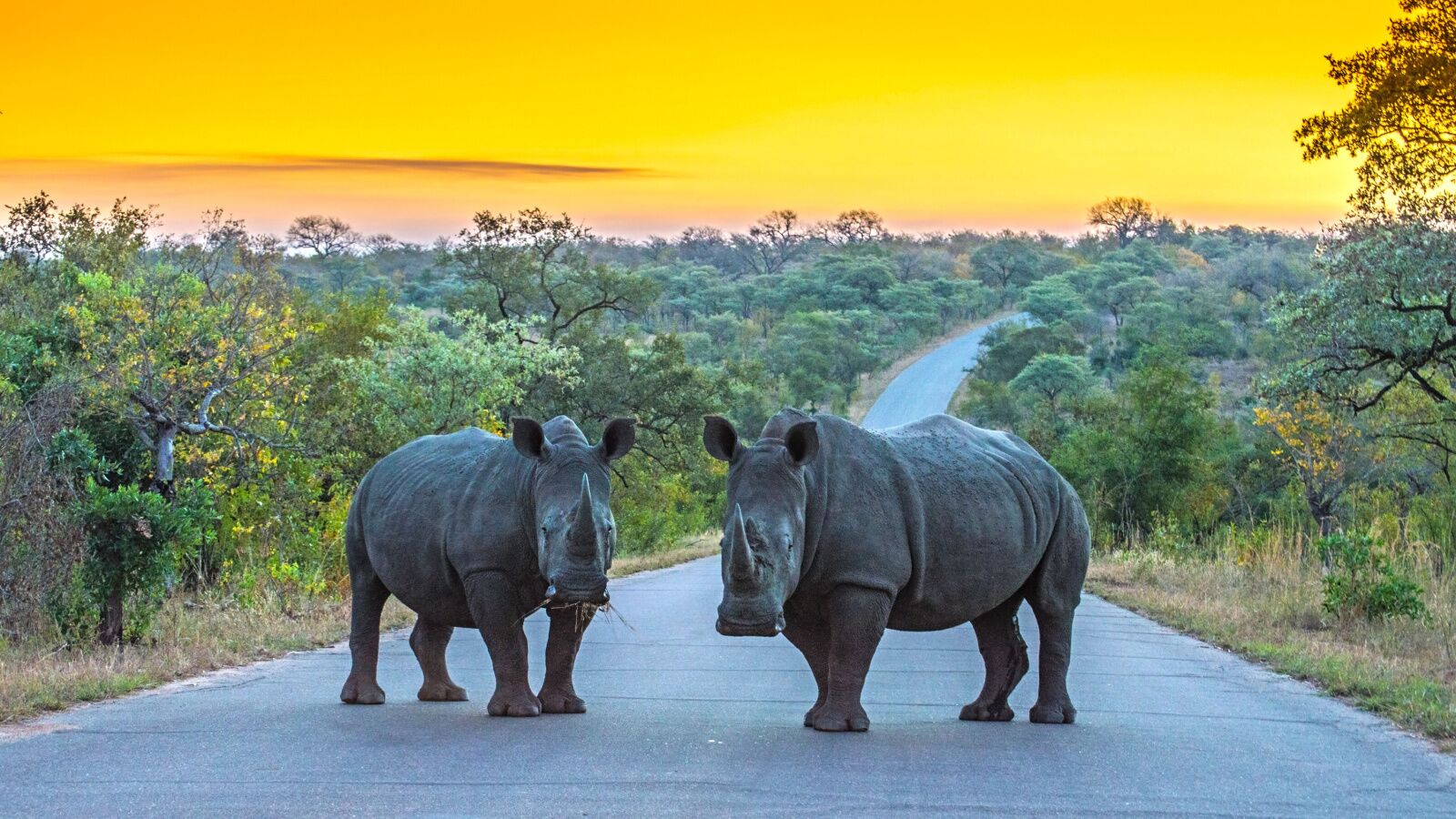
Photo: Robert Wedderburn /Shutterstock
Kruger National Park is in northeastern South Africa, bordering Mozambique and Zimbabwe. It covers more than 7,523 square miles, making it larger than many US states — and many countries.
The park’s landscapes vary from dense forests and rugged mountains in the south to open savannas and arid grasslands further north. It’s the largest national park in South Africa, unless you count the combined lands of Kgalagadi Transfrontier Park, which straddles both South Africa and Botswana. Only a few other national parks on the continent are larger, such as Namibia’s otherworldly Namib-Naukluft National Park and Tanzania’s Selous Game Reserve, both of which are about 19,000 square miles.
Kruger National Park map and getting there
That’s why most people visiting the park fly to Kruger Mpumalanga International Airport, about 50 minutes from the park’s Numbi Gate. You can fly there from Zambia, Mozambique, and Zambia, as of July 2023. From either airport, you have several options for getting to the park: you can rent a car and drive yourself, ask your hotel to arrange an airport pickup, or book a travel package that includes your transportation from either airport. Or you can book a shuttle company like Kruger Transfers to take you from any area airport to your lodge or hotel of choice.
That’s right — any area airport. There are actually two other Kruger National Park airports: Hoedspruit, for the central park of the park, and Skukuza, if you’re heading to some of the private reserves that border the park. Both fly only to Cape Town and Johannesburg. Phalaborwa airport used to serve the northern park of the park, but it closed in 2020.
Kruger National Park weather
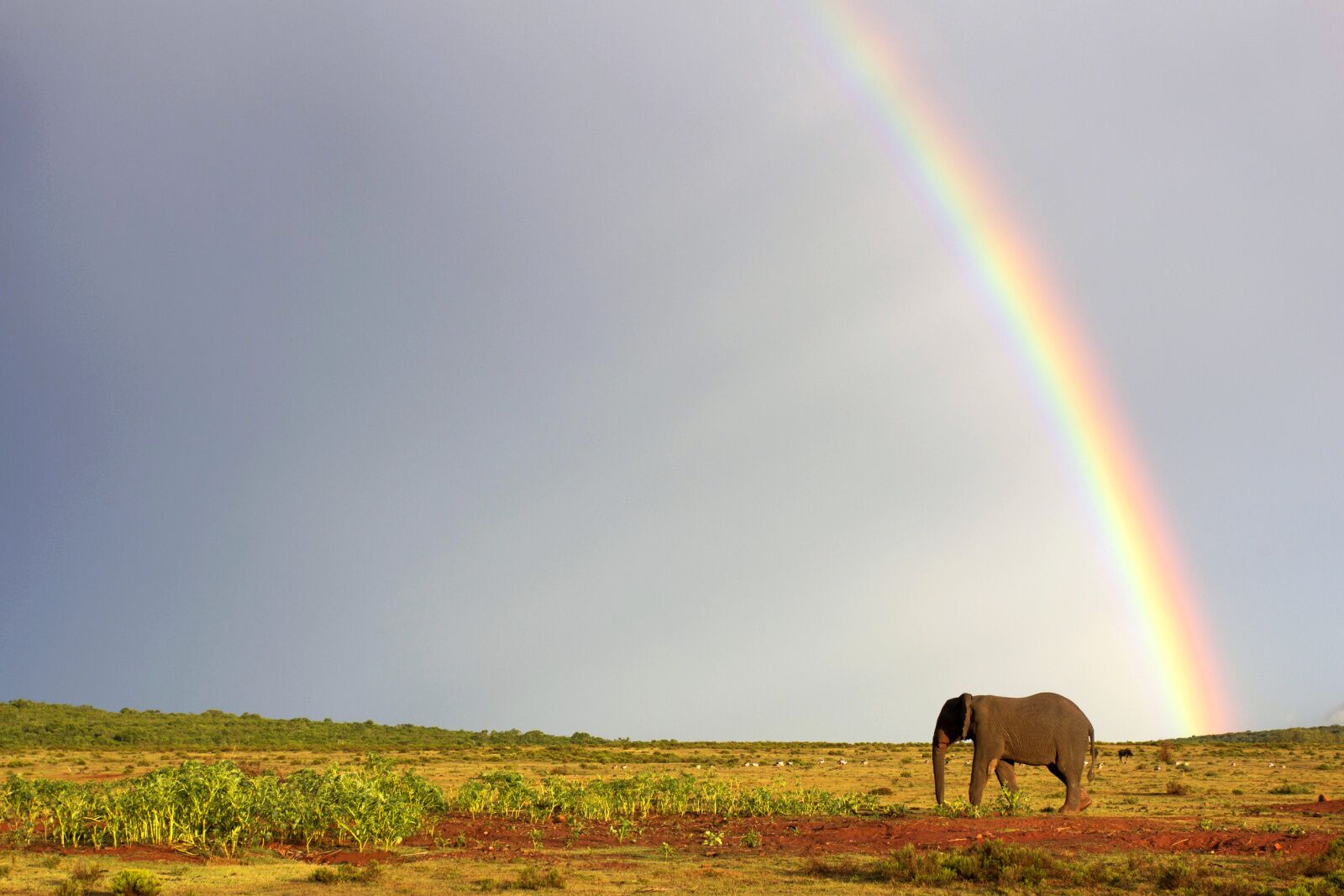
The rainy season can have its perks, too. Photo: JONATHAN PLEDGER /Shutterstock
Kruger National Park’s weather is pretty simple, with a dry season and a wet season.
Most people consider the dry season (May to September) as the best time to go to Kruger National Park. While there can be a bit of rain in May or September, most of this season is dry and mild, with daytime temps between the mid-60s and mid-70s Fahrenheit. Evenings can be in the 50s F, so wear an extra layer for early morning or night safaris. Another perk of the dry season is that guides usually have a good idea of where animals will be, since they tend to congregate around water sources. It can also be a bit easier to spot animals from afar as there’s less foliage for them to hide behind.
During the wet season, from October to April, it’s warmer and wetter, especially in January and February. It can be anywhere from the high 70s to the high 90 degrees Fahrenheit, and heavy rain is common. The bonus is that the park is extremely lush, spring brings a better chance for seeing baby animals, and it’s less crowded and usually cheaper to visit. And having fewer people nearby to scare off wildlife is always a plus. Do an online search for photos of busy roads in Kruger, and you may decide that the wet season is actually the best season.
Kruger National Park safaris
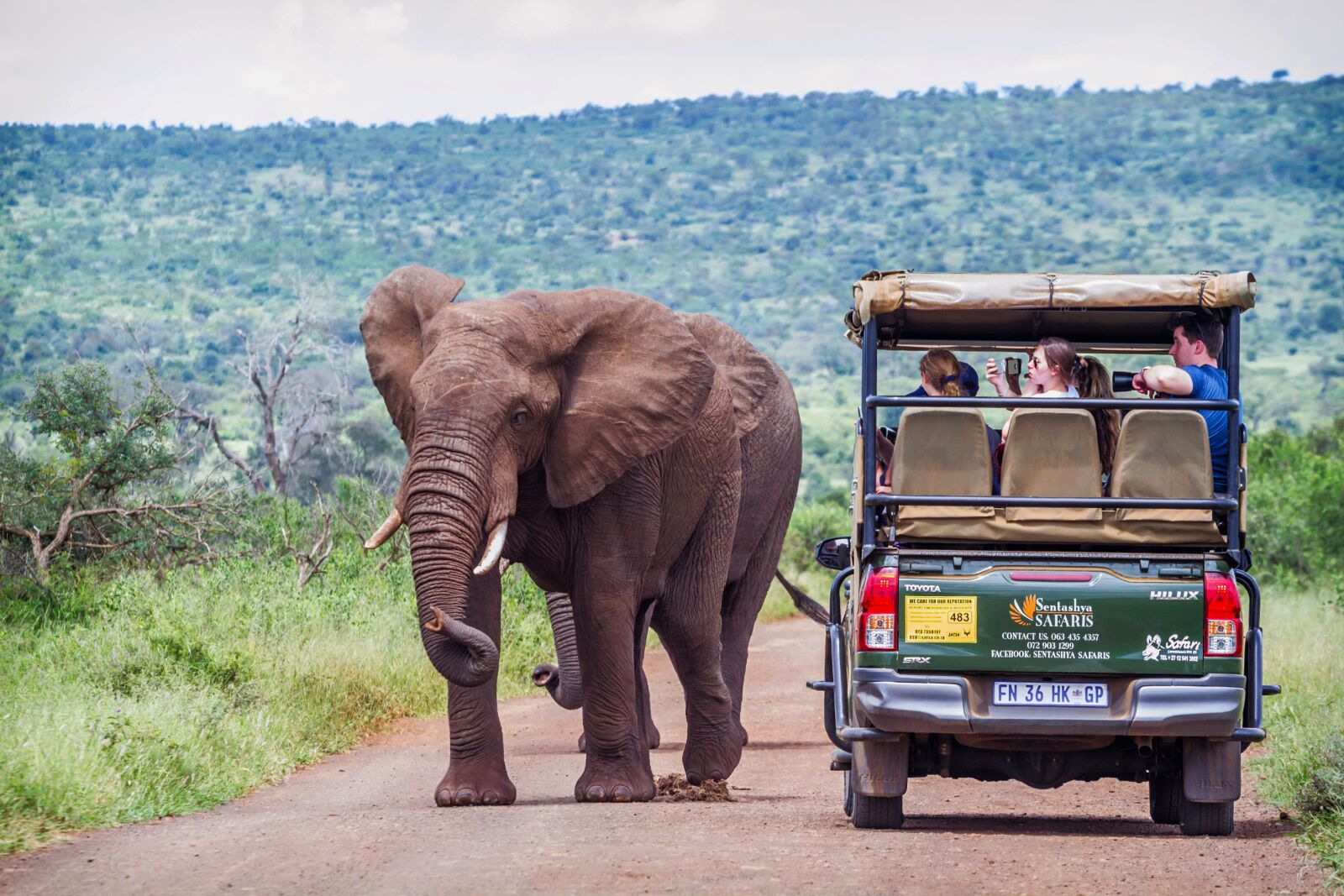
Photo: PACO COMO /Shutterstock
Nearly all visitors head to the park for the same reason: going on a Kruger National Park safari, the park’s most famous activity. Visitors have lots, and lots, and lots of options for booking a Kruger safari. In addition to game drives and walking safaris, you can book everything from hot-air balloon safaris to a guided Kruger National Park safari via mountain bike .
Option 1: Book directly with the park
The park offers several different types of safaris, called game drives, which you can book online directly through the park website . Your options include a 3-hour sunrise or sunset drive (r490, or about $25 USD), 2-hour night and late night drives (around $20), or a morning or river walking safari (r760, or about $40). The park doesn’t offer a bookable all-day drive, but you can contact the park in advance to ask about availability of safari cars if you’d like to arrange a private one. Hotels and lodges can also help arrange this.
You can also rent a car and drive yourself through the park as long as you pay the r460 ($24) per person entrance fee. Here’s a link to more than a dozen excellent self-drive routes in Kruger. Just remember that someone is going to have to drive, which is the least fun role when the rest of your party gets to search for wildlife.
Option 2: Book a safari through a tour operator
Because private vehicles are allowed into the park, you can also book a Kruger National Park safari through a private company. There are hundreds of options. Siyabona Africa offers private all-day game drives starting at r4.,653, or about $250 per vehicle (not per person). You can also opt for a shared full-day drive at r2,200 ($116) per person. And if you don’t mind an early start, Elephant Herd Tours offers a 5:30 AM start with hotel pickups before that for around $97 per person — which could be worth it to be among the first in the park that day.Alternatively, you could ask your lodge or hotel to arrange a private driver for you, if safaris aren’t already including in your lodging.
Option 3: Book a Kruger safari package
View this post on Instagram A post shared by andBeyond (@andbeyondtravel)
The most budget way to find a package will be to book one with a local operator when you arrive in either Jo-burg or one of the park’s gateway towns. You’ll find plenty of on-the-ground, local guiding companies willing to sell budget safari packages around $400-$500 for a two-night trip. For a mid-range trip you can book in advance online, expect to spend anywhere between $700 for a 4-day trip in homestays with a shared vehicle ( Elephant Herd Safaris ) to $1,200-ish for a five-day private tour with daily safaris through Amatungulu Tours. Luxury tours can range from a few thousand for a private multi-day tour to $10,000 or more with companies like Niarra Travel or andBeyond , where you’ll spend two or more weeks in the lap of luxury.
Your last option is to book a package through your hotel. Kruger National Park lodges like Jock Safari Lodge and Lion Sands Tinga Lodge include twice-daily game drives in the accommodation cost. More budget hotels, like Crocodile Kruger , are room-only, but the staff can assist with add-ons like daily safari drives.
Kruger National Park animals
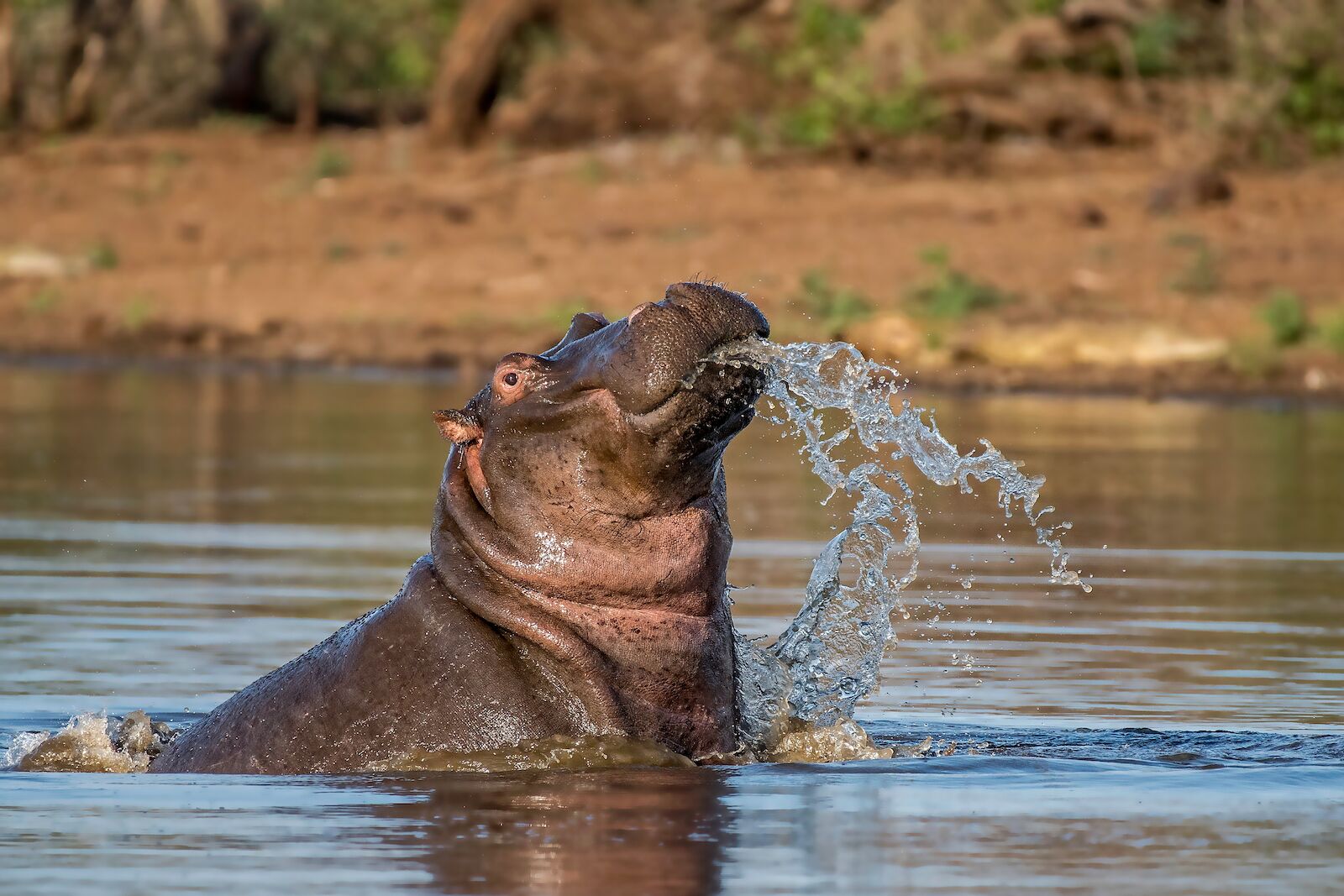
Kruger National Park offers the chance to see both giant herds of animals in sprawling grasslands, and tight interactions with single animals hidden in trees or hiding behind rocks. The park is so big that it offers pretty much every type of African wildlife sighting you can imagine, which is likely why it’s so popular with tourists.
The park is home to the famous “African Big Five”: lions, leopards, elephants, buffalos, and rhinos.
Lions are usually in the central part of the park in open savannas and on rocky ridgelines. Look around areas of the park like the Satara, Orpen, and Lower Sabie. For leopards, look on tree branches and in densely vegetated areas. Like lions, you’ll want to look for them around the Satara, Orpen, and Lower Sabie areas, plus around the Sand River.
The park has anywhere between 1,500 and 7,000 elephants; in fact, they’re starting to throw the food web out of balance. While that’s not a good thing, the large population size does mean you’re almost guaranteed to see them. It doesn’t matter so much where in the park you are, but they’re usually found around water sources or along roads in areas where they’re too big to move through the brush comfortably. Water buffalo are also more or less everywhere, often in the same area as elephants.

Photo: Ondrej Prosicky /Shutterstock // Photo: JMX Images /Shutterstock
The hardest of the Big Five to spot are rhinos. The park has both black and white rhinos, but not in large numbers; poaching has made both species extremely endangered. The southern region (between Skukuza and Lower Sabie) is a good place to start, but it requires a blend of luck and patience. Schedule a few extra days in the park if spotting rhinos is essential to you.
Aside from the Big Five, the park has species like cheetahs (also quite hard to spot), African wild dogs, giraffes (not so hard to spot), baboons, zebras, hippos, and hundreds of bird species. Kruger has one of the largest concentrations of large animal species in the world, so while you may not see the exact species you want to see on every drive, you’re bound to see something amazing.
Kruger National Park lodges
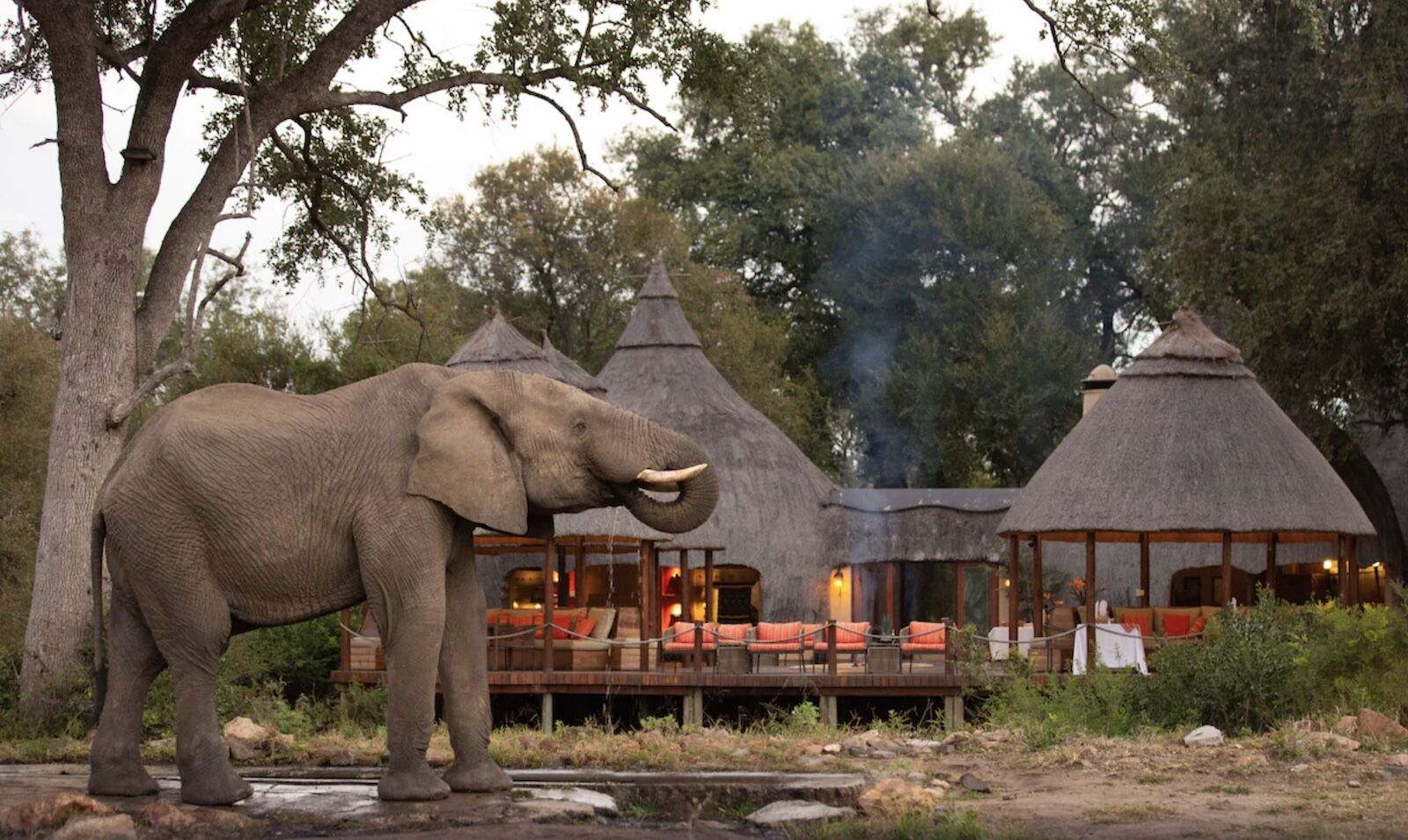
Photo: Expedia
Perhaps no safari destination in the world has more options for places to stay than Kruger National Park. The park is huge, and each entrance has dozens of hotels both inside and outside the park gates. Kruger is also one of the most popular safari destinations in the world, and hospitality companies have realized this. So there are hundreds of options, from five-star luxury hotels beloved by celebrities to budget stays owned by locals where you can sleep near the park for less than $80 a night.
However, most hotels falls somewhere in the middle — affordable stays with a touch of what’s best describes as open-air, safari chic: rooms with balconies or decks, outdoor communal spaces with firepits and couches, and amenities like infinity pools and stargazing showers.
When booking, be sure to check what’s included in your selected room or package. Some hotels include all food and drink, but not safaris; some include safaris, but nothing else; some include all your activities and your room; and some include only the room — but you can add on activities à la carte. And some offer all of the above. The details are usually front and center on the booking platforms, and if you book via Expedia, Booking.com, or similar, it will list what is included on the booking page.
Note that there’s only one downside to staying outside the park (aside from a short drive to get in every day): occasionally, the park will reach capacity just from guests staying in the park, and no outside guests will be allowed for that day. However, that’s very rare, and usually only happens once in a while on public holidays in the busy season. It’s possible, but not likely.
Crocodile Kruger Safari Lodge
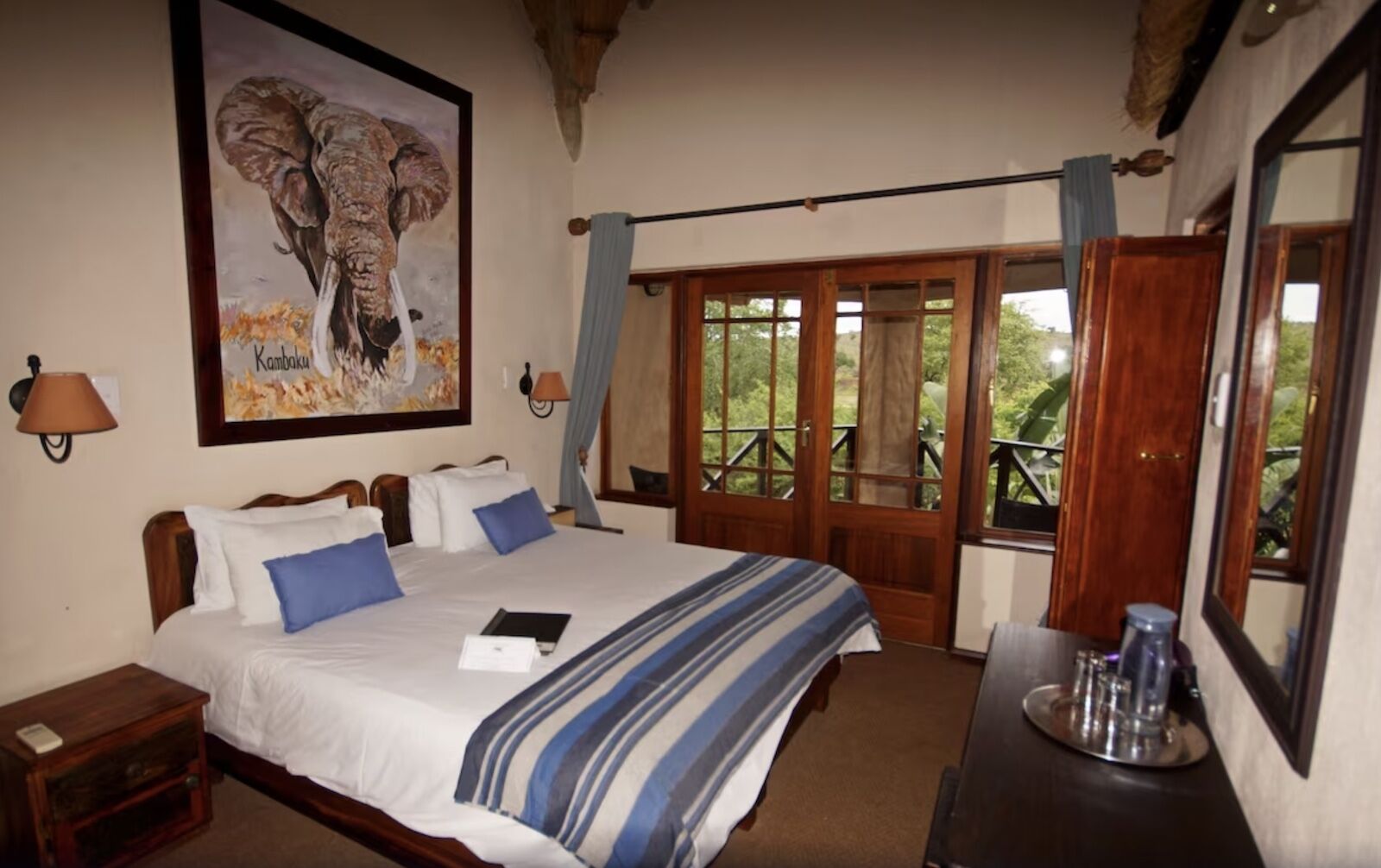
See more photos
Crocodile Kruger Safari Lodge is probably the best of affordable Kruger National Park lodges. It sits just outside the park on the aptly named Crocodile River, and rooms range from standard hotel rooms with patios overlooking the gardens and river to a full three-bedroom cottage with a private pool and kitchen. Rates start around $50 per person per night with breakfast, or $53 per person per night for full board — it’s a steal. Amenities include Wi-Fi, a pool, and an on-site bar. Activities are not included in the price, but the hotel can assist with booking anything you’d like to do in the area.
Lion Tree Top Lodge
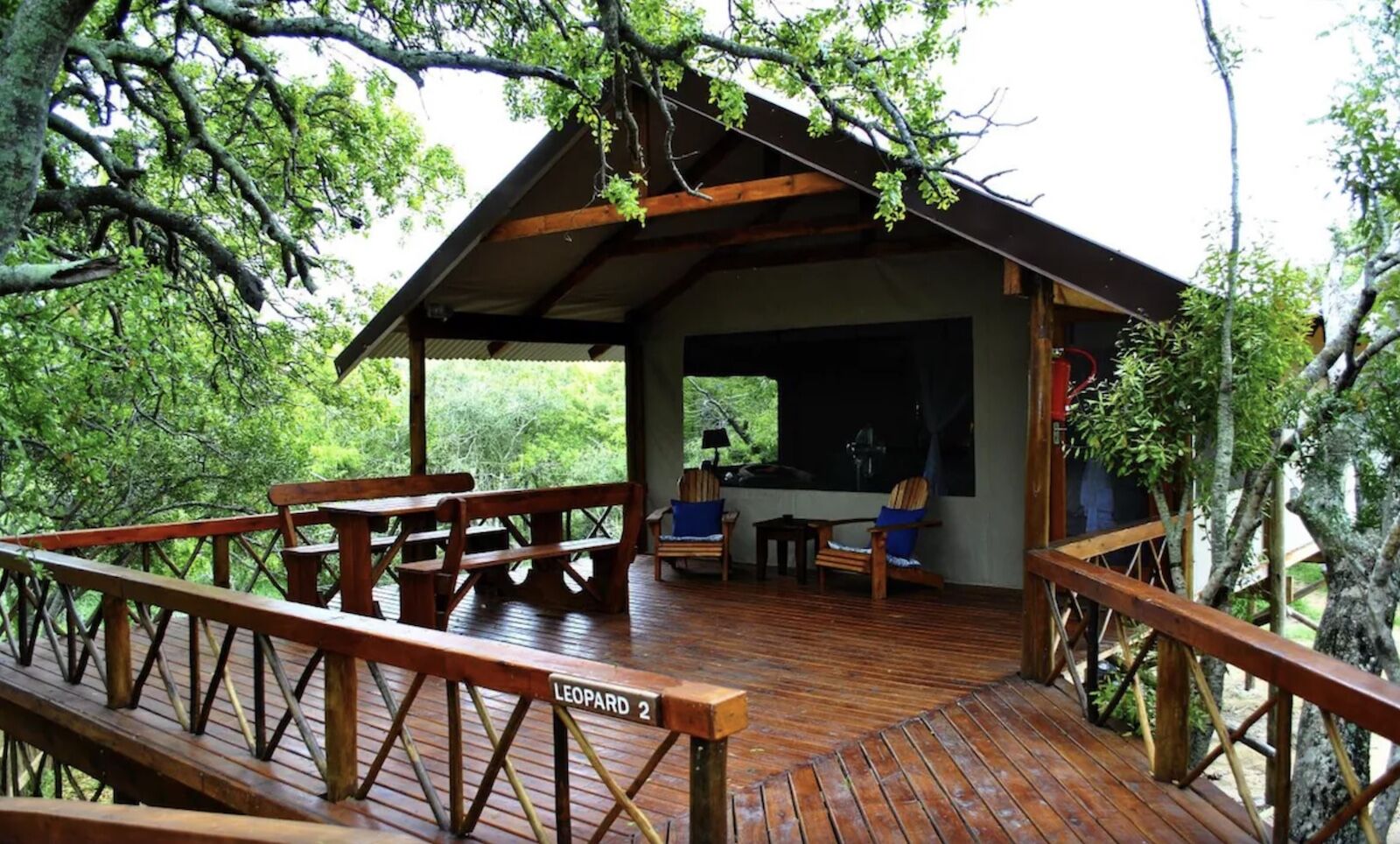
Lion Tree Top Lodge hits the sweet spot between posh boutique hotel and affordable Kruger National Park lodge. All “rooms” are actually fully furnished safari tents on raised platforms in the bush. Rooms have outdoor showers and relaxation decks, which means you may be able to spot wildlife from your room.
Safaris and other activities are not included in the fee, which gives you the freedom to book whatever local operator you’d like based in nearby Hoedspruit. You can also add on safaris when you book your room if you’d rather not deal with extra planning. Rooms start at a reasonable $106 per person, per night.
Jock Safari Lodge
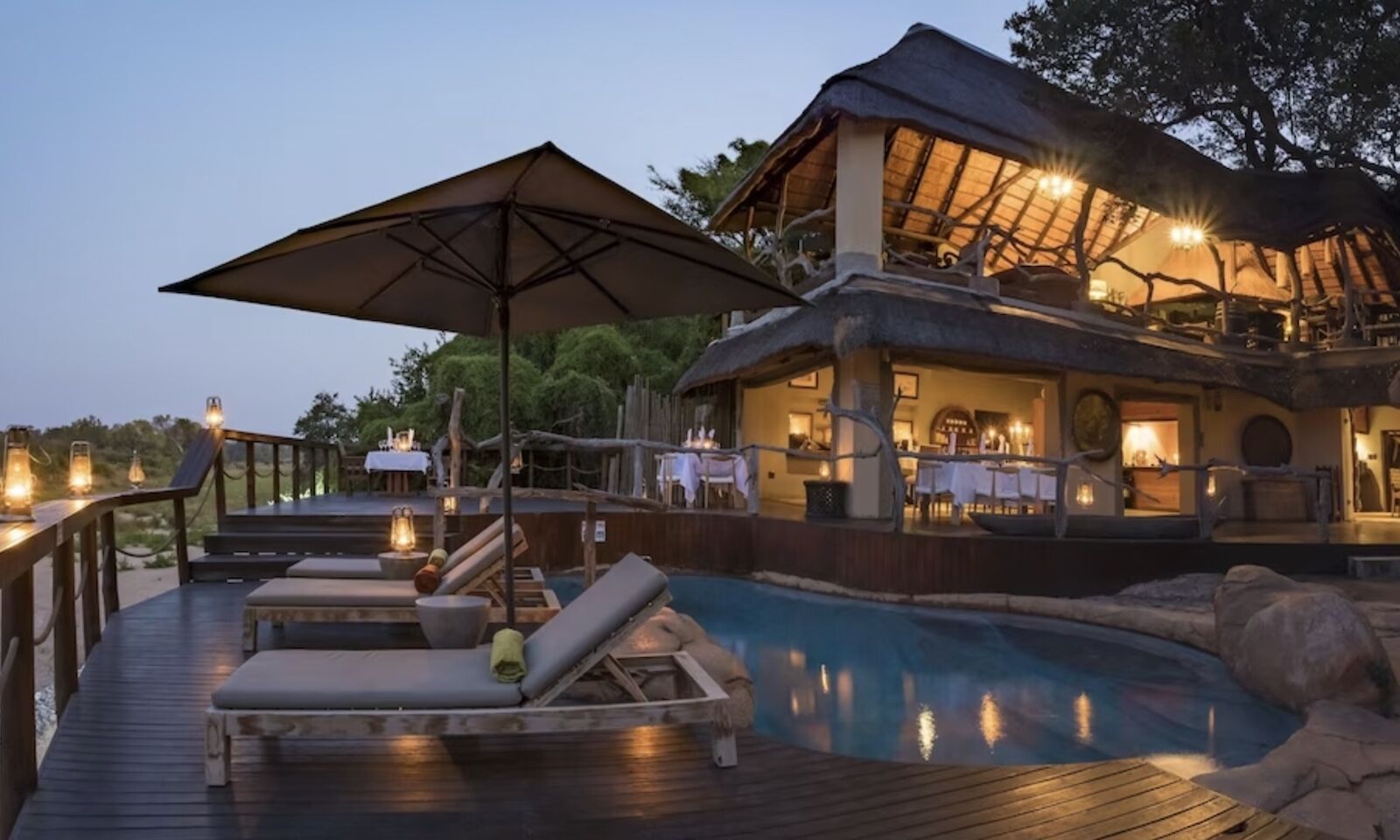
Jock Safari Lodge is inside Kruger National Park but owned and operated by a private company. It offers two places to stay: the Main Jock Lodge, or a private villa called Fitzpatrick’s at Jocks. The hotel sits on 600,000 acres just for hotel guests, which essentially amounts to private safari access within that space. Each safari-themed cabin has an outdoor daybed and private pool, and twice-a-day game drives are included in the cost of a stay. Rooms start around $887 a night — which seems pricey, but remember: it includes full days of game drives every day.
Hoyo Hoyo Safari Lodge
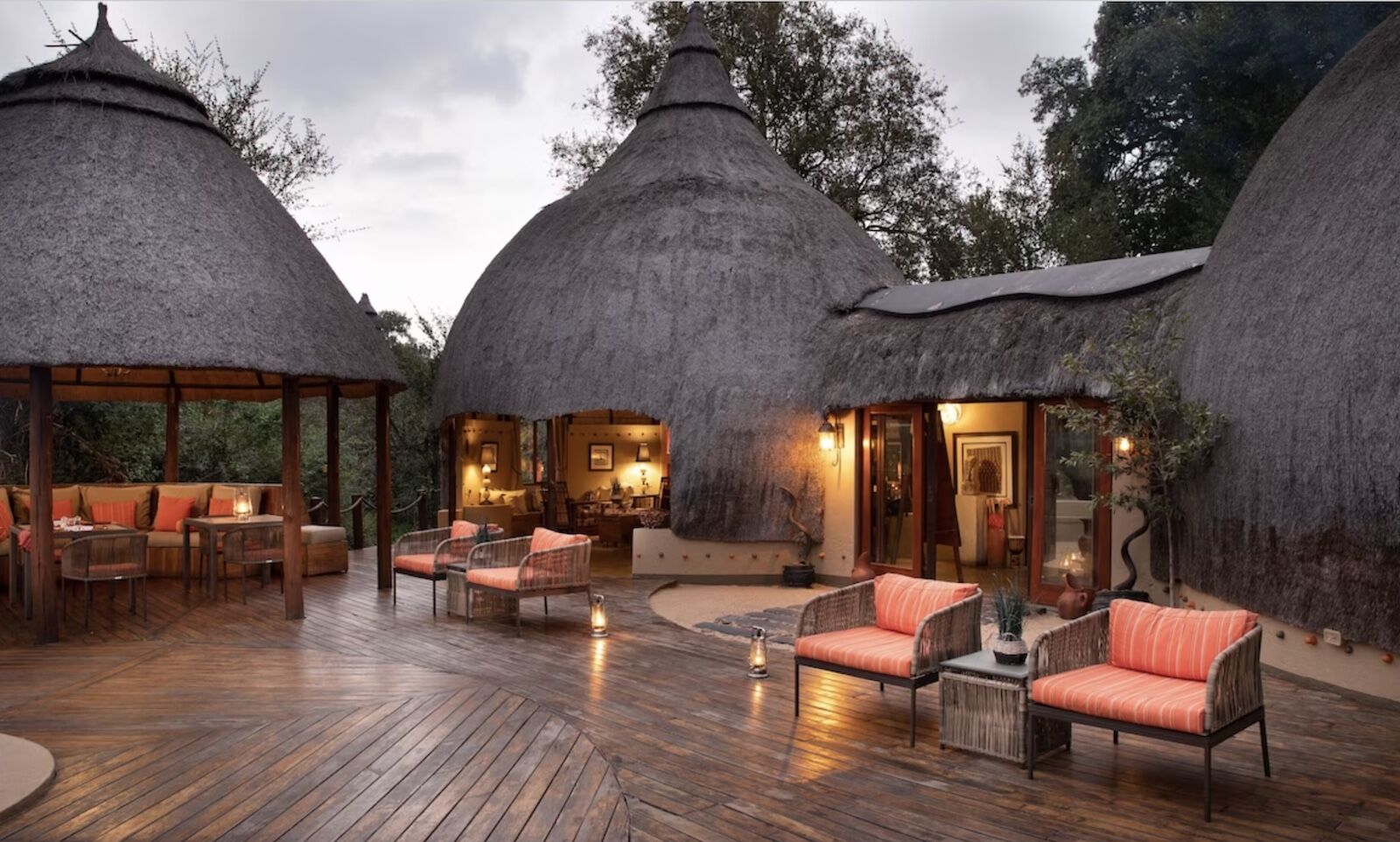
Hoyo Hoyo is another high-end Kruger National Park safari lodge, but it’s not quite as expensive as Jock Safari Lodge — rooms at Hoyo Hoyo start around $700 per night . It’s an all-inclusive Kruger resort (including twice-daily safaris and all food and drink) with a traditional style. Rooms have earthy decor with thatched roofs and natural materials, and the buildings sit naturally in a break in the tree-covered landscape.
More like this
Trending now, this msc cruise is going to islands you've never heard of, and all the profits are going to wildlife conservation, discover matador, adventure travel, train travel, national parks, beaches and islands, ski and snow.
We use cookies for analytics tracking and advertising from our partners.
For more information read our privacy policy .
Matador's Newsletter
Subscribe for exclusive city guides, travel videos, trip giveaways and more!
You've been signed up!
Follow us on social media.
- All Tailor Made Safaris
- Kruger National Park
- Okavango Delta
- Gorilla Trekking
- Safaris with Frank
- Republic of the Congo
- South Africa
- All Set Departures
- All Set Departures by Date
- Horse Safaris
- Photographic Safaris
- Unique Safaris
- Year-round Safaris
- Botswana Mobile Safaris
- Volunteering
- View all Destinations: Interactive Map
- Mobile Safaris
- Gorillas & Chimps
- Walking Safaris
- Horse Back Safaris
- All Training Courses
- All Training Courses by Date
- Professional Courses
- Short Courses
- Special Courses
- Online Courses
- Training Camps
- Field Guide Training FAQ’s
- Accommodation
- When to Travel
- Frank’s Top 5
- Who is Travelling
- First Time to Africa
- Specials & Promotions
- Cost of a Safari
- Travel Info
- Why Book with Us
- Sustainability
- Our Partners
- Guest Loyalty Programme
- Guest Reviews
- Price Guarantee

Tailor Made Safaris
Popular safaris, east & central africa, southern africa, set departures, top destinations, indian ocean islands, set departure safari, 5-day walking safari in northern kruger national park, "step into the wild - your safari adventure begins here.", safari rating.
Embark on an unforgettable Walking Safari through the captivating wonders of Pafuri, located in the very north of Kruger National Park. This pristine wilderness beckons with its diverse and stunning landscapes and magical wildlife encounters, making it one of our favorite places.

Discover the unforgettable beauty of Africa on our 5-day hiking safari in the Northern Kruger National Park. Step into the footsteps of African wildlife and explore the fascinating wonders of Pafuri, a jewel in the northernmost part of the park. This untouched wilderness entices with its variety of breathtaking landscapes and magical wildlife encounters, making it one of our preferred destinations.
Experience a safari that goes far beyond the typical tourist adventure. In a small group of up to 8 people, accompanied by our experienced hosts Sabrina and Jan Hendrik, you’ll explore the expansive and diverse landscapes of Pafuri. From majestic views to lush, wild terrains, this place provides a backdrop for unforgettable adventures.
Venture out with private vehicles and activities off the beaten path and enjoy 4 nights in an unfenced tented camp in the heart of the Northern Kruger National Park. Experience the thrill of encountering magnificent wildlife, as Pafuri serves as home to a variety of life forms and offers ample opportunities for wildlife enthusiasts. Embark on this transformative journey and experience the true beauty and fascination of Africa.

- 4 nights’ accommodation in an unfenced tented camp in Northern Kruger National Park
- Explore a safari experience that goes beyond the typical tourist adventure.
- Private vehicles and activities for our small group
- Small group of max. 8 – along with Sabrina and Jan Hendrik as your expert hosts and guides
- Pafuri boasts a vast and varied landscape, from breathtaking vistas to lush, wild terrains.
- Experience the thrill of encountering magnificent wildlife. Pafuri is home to an abundance of life, providing ample opportunities for wildlife enthusiasts.
map and overview
Sabrina krattinger.
Visiting southern Africa for the very first time Sabrina fell in love with the wild African bush and all the wildlife. Since then she regularly traveled to South Africa, Botswana, Namibia and Kenya. The enthusiasm for the bush led her to her Field and Trails Guide Qualification. Originally from Switzerland Sabrina offers guiding in English as well as in German.
She is also a qualified Yoga Instructor which gives her a unique experience when guiding people through the bush in a very personal and spiritual way.
Jan Hendrik Hanekom
Jan Hendrik is a passionate Professional Field Guide with over 14 years of experience in the African bush which took him to many countries across Africa. Born and raised in South Africa Jan Hendrik offers guiding in English and Afrikaans.
By walking more than 2’000 hours in over 15 different Reserves and National Parks with Big Five qualified Jan Hendrik as a Professional Trails Guide and Tracker. As a FGASA-registered mentor he offer Mentorship Trails for future trails guides. He has a special passion for birds and flowers. Walking with Jan Hendrik is always a great adventure and his enthusiasm for the African bush is contagious.
start dates
Further dates available upon request (Minimum number of participants: 4 people).
detailed itinerary
We would like to offer you a glimpse into a typical day on our Walking Safari and provide an overview of what you can expect during your days in the bush. While we prefer to maintain flexibility to accommodate the movement of animals, their behavior in various seasons, the interests of our guests, and external factors like weather, we still believe in providing a structured outline to give you an idea of your experience with us.
Your adventure begins early in the morning when we pick you up from your accommodation in Hoedspruit, where you spend the night before your safari. We embark on a scenic private game drive through Kruger National Park, traveling north into the Makuleke Concession, also known as Pafuri.
Even this drive through Kruger National Park offers glimpses of its diverse wildlife.
During our journey, we stop for a light breakfast in one of the Kruger Restcamps, providing a beautiful view. After reaching our camp, you’ll have time to settle into your tent, where you’ll spend the next few days. At 15:00 h, High Tea awaits you before we set out on our first safari activity to introduce you to this stunning area.
Here’s an overview of what a typical day might look like:
- 5:00 | Wake-up
- 5:30 | Enjoy Coffee, Tea, Rusks, Muesli, Muffins, and fruits
- 6:00 | Morning Walk: We set out early on foot from camp or drive to a different area for a walk.
- 11:00 | Return to camp, with the specific time depending on the day. Shortly after our return, breakfast will be ready for you. Afterward, you have personal time to relax, enjoy the camp, read a book, or take a nap.
- 15:00 | High Tea
- 15:30 | In the afternoon, we might embark on a walk from camp or take a game drive to explore the area.
- 18:00 | Enjoy the sunset with refreshments around the fire.
- 19:00 | Dinner
During our walks, we always keep an eye out for the Big Five, but we also focus on the smaller wonders of nature, including insects, birds, trees, flowers, tracks, signs, and more. We aim to teach you how nature is interconnected, with every element having its purpose and unique strengths.
As John Lennon wisely said, ‘Life is what happens to you while you are busy making other plans.’ This philosophy is true for the bush as well, which is why we adapt our schedule to the ever-changing natural world around us.
accommodation

Safari Tent with Ensuite Bathroom: ZAR 46.500,00 per person
Single Supplement: ZAR 10.000,00 per person
(Minimum 4 participants – Maximum 8 participants)
Safari Tent with Ensuite Bathroom: ZAR 51.150,00 per person
Single Supplement: ZAR 11.000,00 per person
Preis includes:
- Accommodation as stated above.
- Drinks (Select wines, local beers, soft drinks, water, select spirits, coffee and tea).
- Morning and evening safari activity.
- Community & Conservation Levy.
- Kruger National Park Entry Fee.
- Transfer from/to Hoedspruit with Game Drive through Kruger National Park.
Price excludes:
- Flights and airport taxes.
- Pre and post safari accommodation.
- Other transfer.
- Other meals (Meals in Kruger National Park on transfer).
- Other drinks at the camp.
- Gratuities.
- Items of personal nature (telephone expenses, curios, medicines, etc.).
- Entry Visa Fees.
- Bank Charges.
additional information
Expectations.
- The camp is unfenced and situated within wildlife areas with all sorts of creatures venturing through.
- Expect warm to hot temperatures during the day with cold to very cold nights
- Charging facilities available throughout
- As with any tour, unfortunately we cannot control the weather or indeed the wildlife. The itinerary will be flexible to make the most of the weather and any target species.
- Travel insurance is a must.
Additional Information
- Services subject to availability at the time of booking.
- Times of activities, meals, transfers is subject to change.
- Given the nature of this safari, the age restriction is a minimum of 18 years paying full fare.
- Maximum age is 65. Anyone older than this is required to produce a medical certificate providing that they are physically able to participate in the activities and terrain in which the safari tour will be conducted in.
- PLEASE NOTE that whilst we endeavor to accommodate guests at the above stipulated camp, we reserve the right to replace such with one of a similar standard and location.
- Terms and conditions apply.
- Rates are quoted as per person.
Helpful tips
- Visas/Passport: Please ensure: 1) that you have pre-arranged your entry visa if required; 2) that your passport is valid for at least six months after your scheduled departure date from South Africa; 3) that you have a minimum of 2 consecutive clear pages. If this is not the case, there is a danger of being turned away by the Immigration Service on arrival at the airport – assuming your airline has agreed to bring you and risk a fine in the first place.
- Health: No vaccinations are mandatory but please consult your doctor for medical advice. Parts of South Africa are considered to be malarial so we recommend consulting your doctor about the use of anti-malarial prophylactics (normally Malarone), especially if visiting during the summer (December to April) – subject to advice from your own doctor.

The Accommodation

Pafuri Trails Camp
Ready for an adventure lets talk.
Contact SAFARI FRANK to get started on your safari of a lifetime!
Related Safaris

5-Day Yoga & Walking Safari in Northern Kruger National Park

Ultimate 21-Night Journey through Southern Africa

13-Night Southern Africa Safari Extravaganza

12 Nights Garden Route and Wines
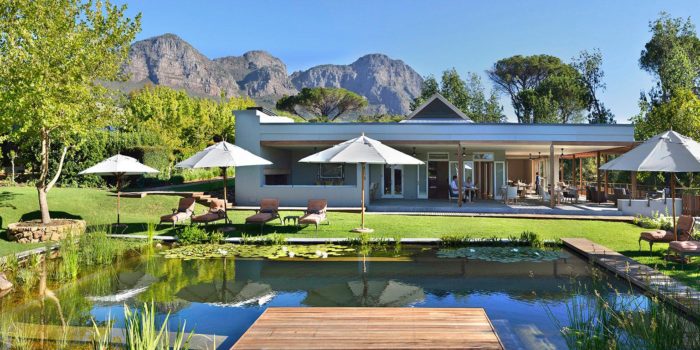
11-Night Affordable Southern Africa Adventure
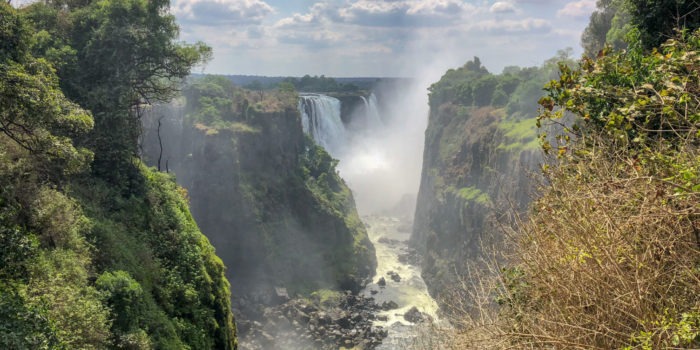
12-Night Grand South African Experience
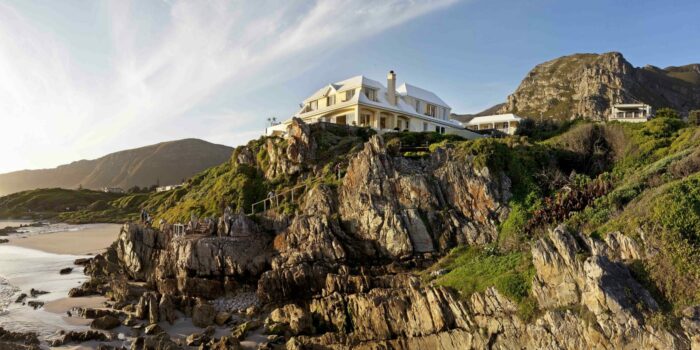
11 Night Coastline & Safari Getaway South Africa

7-Night Cape Town & Kruger 5-Star Safari

6-Night South African Luxury Retreat
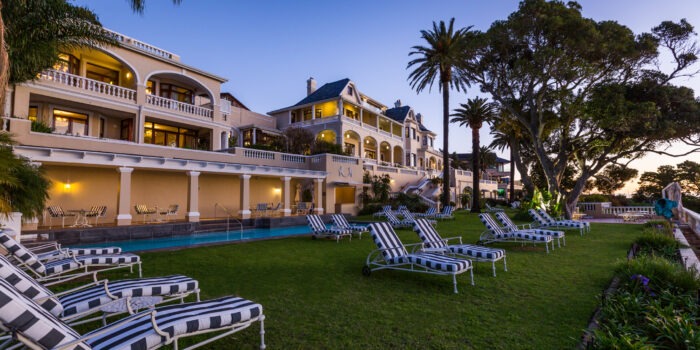
5 Nights Spirit of Cape Town

4-Night Best of Klaserie Safari Experience

3-Night Timbavati Wilderness Immersion

12-Night Garden Route & Safari Dreams

Cape Town Coastal Bliss: 3 Nights at Tintswalo Atlantic

Africa on Foot Wilderness Trails

Leopard Lovers Safari

South Africa Honeymoon Safari
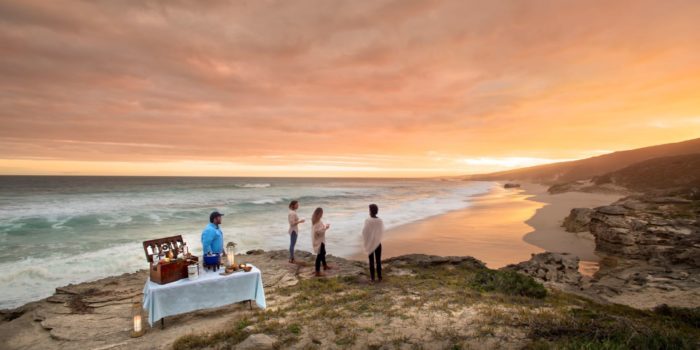
Our partners in Africa will make your dream trip, a trip to never forget
[email protected] +1 (646) 5025364

Developed by Viewport / WordPress Guys
Travel Information
- Safari Frank UK
- Safari Frank AU
- The Wildebeest Migration
- How much does a safari cost?
- Why book with us?
Who is Travelling?
- Couples and Honeymooners
- Family Safari
- Group of Friends
- Solo Travellers
- All Safaris
- Sample Safaris
- Safaris with Frank Steenhuisen
- Set Departure Safaris
Newsletter Signup
Enquire now.
" * " indicates required fields
Privacy Overview

AfricaIncoming Blog
Africa Travel Blog
15 Best Safari Lodges In Kruger National Park
When it comes to exceptional game viewing, there is nothing that can compare to the Kruger National Park. It is not uncommon to witness the majestic Big 5, including the elusive leopard, powerful lion, formidable buffalo, magnificent rhino, and majestic elephant, all in one day. Additionally, you may also have the privilege of spotting rare species like the cheetah and wild dog. This park is not only one of Africa’s oldest conservation areas, but it also boasts the widest range of wildlife in South Africa. However, you may be wondering which part of the park is the best and where you should choose to stay.
To avoid the crowds and experience a truly remarkable safari, we recommend heading straight for Kruger’s private game reserves. These reserves, driven by conservation efforts, are among the finest safari locations in the park and are home to some of the most exceptional safari lodges on the entire continent. Whether you are a couple, honeymooners, or a family, these 5-star lodges offer a luxury safari experience that is unparalleled. From exquisite cuisine and impeccable service to serene health spas, fully-equipped gyms, and even your very own private butler, these lodges have it all. Moreover, with Africa’s top trackers and guides, you can expect outstanding off-road game viewing, thrilling night game drives (which are not accessible in the public park), and a luxury safari vacation that will leave a lasting impression. In our comprehensive guide, we have compiled the top 15 lodges in Greater Kruger, which encompasses the vast Kruger National Park and a collection of neighboring private reserves. It is widely regarded as one of the best destinations for wildlife viewing in Africa.
While the national park offers accommodation in well-equipped government rest camps that are perfect for self-drive safaris and budget package tours, the private reserves provide a more lavish experience. Within Kruger, there are several private concessions that function as private game reserves. These reserves are home to small, exclusive safari lodges that offer all-inclusive packages. The Big Five viewing opportunities in Greater Kruger are exceptional, and the private reserves and concessions are unmatched when it comes to regular, up-close encounters with these magnificent creatures.
If you are seeking an exclusive luxury safari experience, you may be wondering where to stay.
Sabi Sand Game Reserve

Nestled within the prestigious Sabi Sand Reserve l ies the renowned Sabi Sabi group of opulent safari lodges. Boasting a century of safari expertise and distinctive camps, these lodges exude a warm hospitality, tradition, and style that caters to the diverse preferences of wildlife enthusiasts. Sabi Sabi Earth Lodge, a recipient of numerous accolades, offers an unparalleled safari accommodation experience for couples seeking to commemorate a special occasion. Combining rustic charm with contemporary elegance, this extraordinary lodge stands as one of Kruger’s most exceptional safari retreats. Its generously proportioned suites, nestled within a private concession in the Sabi Sands Game Reserve, feature secluded plunge pools and bespoke furnishings that seamlessly blend with the natural surroundings. Prepare to embark on a luxury safari adventure unlike any other, as this lodge harmoniously incorporates its environment and elements for an unforgettable experience.
If you’re searching for the ultimate private game reserve in South Africa, look no further than the Sabi Sand Game Reserve . Renowned as the finest in the country, Sabi Sand boasts an expansive 65,000 hectares of untouched wilderness in the Mpumalanga region. What sets it apart is its unfenced border with the famous Kruger National Park, spanning an impressive 50 km (30 miles). Within this remarkable reserve, you’ll have the opportunity to witness the complete African Big 5, including lions, rhinoceroses, buffalos, leopards, and elephants. However, it is the majestic leopards that truly steal the show in Sabi Sands.
For those seeking a luxurious and romantic getaway, the game reserve is an ideal choice. The exclusive Lion Sands Ivory Lodge offers eight elegantly luxurious villas, each with its own deck and plunge pool. Here, you can indulge in spa services and relish in private dining experiences. To enhance the romance, consider booking a night in the remote Chalkley Treehouse, where you can sleep under the twinkling stars. Sabi Sands caters to a range of budgets and preferences when it comes to accommodation. From the more affordable Umkumbe Safari Lodge to the opulent Sabi Sabi camps and the two Singita lodges, there is something for everyone. To truly immerse yourself in the wildlife experience, take advantage of the guided wildlife drives and exhilarating walking safaris available. If you’re wondering when the best time to visit is, October is highly recommended. During this period, the weather is pleasant, and the wildlife sightings are abundant. So, pack your bags and get ready for an unforgettable adventure in the Sabi Sand Game Reserve.
Best Suited For – Couples
Buy Now – SABI SANDS
Mala Mala Safari Lodge

Situated strategically between the Sabi Sand Game Reserve and Kruger National Park, MalaMala Game Reserve offers an extraordinary opportunity to witness the majestic Big Five in a vast and exclusive wilderness area. Among the top-notch lodges in the Greater Kruger National Park, MalaMala Sable Camp stands out, providing luxurious accommodation for a maximum of 20 guests in seven opulent suites. The safari deck made of wood offers a breathtaking view of the Sand River, a natural corridor for wildlife. The photographic opportunities are truly out of this world, with leopards stealing the spotlight as the star attraction.
Rattray’s at MalaMala transports you back to the golden era of safaris, capturing the essence of a bygone time. As the largest private conservation area in the region, MalaMala Game Reserve is not shared with any other Kruger safari lodges, ensuring that you have exclusive access to uncrowded animal sightings and abundant game. Another advantage is that MalaMala encompasses a significant portion of the life-giving Sand River. The highlights of Rattray’s on MalaMala include personalized butler service, extraordinary leopard sightings, spacious suites with private heated plunge pools, a maximum of four guests per vehicle, and a stunning location on the banks of the Sand River.
Some of the popular activities at Rattray’s on MalaMala include guided walks, night drives, stargazing, and game drives. Drawing inspiration from the glorious era of safari, Rattray’s at MalaMala transports you to a time long gone. As the largest private conservation area in the region, the MalaMala Game Reserve stands alone, without any other Kruger safari lodges to share its vast expanse. This exclusive setting ensures that your Kruger National Park safari experience will be unparalleled – with uncrowded animal sightings and an abundance of game, all to be enjoyed in solitude. The reserve’s vastness is enhanced by the presence of the life-giving Sand River, which further enriches the wildlife encounters.
Nestled on the banks of the Sabi Sand River, amidst towering trees and sprawling lawns, MalaMala Camp is a true sanctuary of safari bliss. The camp boasts ten luxurious suites, eight opulent rooms, and a single room, each equipped with air conditioning and an outdoor deck that offers uninterrupted and breathtaking views of the surrounding wilderness.
The camp’s amenities include an indoor dining room, a cozy lounge, a library complete with satellite television, a historic bar, complimentary internet access, and a spacious wooden safari deck that provides an exceptional vantage point for observing the wildlife that frequents the river for a drink. Additional features include a grand infinity pool overlooking the river, a safari boutique, a well-equipped gym, and a rejuvenating massage service. Expert rangers, brimming with an astonishing knowledge of the wilderness, lead twice-daily game drives that promise unforgettable adventures. For those seeking a more immersive experience, embark on a walking safari, guided by a professional expert, to fully immerse yourself in the wonders of the bush.
Perfectly Suited To:
BUY NOW – MALA MALA GAME RESERVE
Imbali Safari Lodge

Located in central Kruger, the Imbali Safari Lodge is situated on a private concession spanning 100km2/40mi2. This exclusive lodge offers 12 spacious suites, providing a luxurious experience amidst the tranquil African bush. While mornings and afternoons are dedicated to wildlife exploration, the lodge invites you to unwind and relax during the heat of the day. Take a refreshing dip in your private plunge pool while savoring a cocktail, or indulge in a soothing massage on your deck, surrounded by the harmonious melody of birdsong.
The rooms feature large French doors that stretch the length of the space, allowing you to immerse yourself in the breathtaking wilderness at your leisure. An expansive deck overlooks either the N’waswitsontso River or the savannah grasslands, complemented by an outdoor pool to enhance your leisurely bush experience. Lounge on a sunbed with a captivating book, or let the bubbles of the pool soothe your tired muscles, while the enchanting chorus of weavers, thrushes, and kingfishers provides a magical soundtrack for your relaxation. Each suite includes a complimentary mini-bar stocked with selected beverages, as well as a tea/coffee facility for your convenience.
The spacious stone and marble bathroom boasts a Victorian-style bathtub and a walk-in shower, complete with signature bath amenities, a hairdryer, and plush bathrobes. Immerse yourself in the peace of the Kruger bush as you soak away the stresses of modern life with natural bath salts. When it’s time to rest your soul, sink into the comfortable king-size bed for a rejuvenating siesta or a peaceful night’s sleep after your safari adventure. A mosquito net envelops the entire bed in the evening, ensuring you are cocooned in utmost comfort. Expect a bedtime story on your pillow or a delightful treat to savor before retiring for the night. Mluwati Concession, a private area within Kruger National Park, is comprised of three lodges – I mbali Safari Lodge , Hoyo Hoyo Safari Lodge, and Hamiltons Tented Camp. Its establishment was driven by the desire to ensure the long-term sustainability of this renowned National Park. Being one of the pioneering private concessions in Kruger, Mluwati has dedicated immense efforts to preserve the integrity of this pristine wilderness, which has served as a haven for a diverse range of wildlife for over a century. With over 114 reptile species, 34 amphibians, and 147 mammals, including the iconic Big Five of Africa, this sanctuary has captivated nature enthusiasts from around the world.
Bird enthusiasts will be enthralled by the plethora of avian species that inhabit Kruger. With over 500 species, many of which can be found in Mluwati Concession, birdwatchers can spot magnificent creatures like the Southern Yellow-billed Hornbill, Crested Barbet, and Burchell’s Glossy Starling. Within the Mluwati Concession, guests will be treated to breathtaking landscapes, a remarkable array of wildlife, vibrant birdlife, and flourishing plant life. Each safari experience is guaranteed to be unique and unforgettable. During your stay at Imbali Safari Lodge, indulge in morning and evening safaris. Witness the exhilaration brought by the first rains, observe terrapins frolicking in river pools, listen to the melodious calls of the Pied Kingfisher, and delight in the harmonious chirping of sociable tree frogs. Immerse yourself in the aromatic scents of the bush, be serenaded by the shrill cries of the Magpie Shrike, and behold the graceful dance of the wind through the feather grass that adorns the savannah plains. An expedition at Imbali will introduce you to new fragrances, intriguing sounds, and the captivating beauty of an extraordinary African landscape that will awaken and enchant your senses.
Best Suited – Couples
BUY NOW – IMBALI GAME RESERVE
READ MORE: Top 11 Safari Destinations in Kenya
Londolozi Game Reserve

Experience the epitome of luxury and royalty at the renowned Londolozi Pioneer Camp, the oldest and arguably the most prestigious safari lodge in Kruger. Located in the privately-owned Sabi Sand Game Reserve, this African pilgrimage offers a serene and contemplative wilderness encounter. The camp, nestled in seclusion, comprises three interconnected opulent suites and a charming bush homestead, accommodating groups of up to 12 individuals. Indulge in the lavish amenities, including an “explorer lounge,” interactive kitchen, lookout deck, breakfast balcony, and a refreshing lap pool. The decor seamlessly blends Ralph Lauren sophistication with the rustic charm of a safari homestead, adorned with exquisite memorabilia, leather accents, and sparkling crystal, exuding timeless elegance.
Highly skilled rangers will curate personalized game drives and bush walks tailored to your preferences, whether you seek a family-oriented safari or a focus on botany, tracking, or birding. Immerse yourself in the untamed wilderness, relishing champagne sunsets or savoring delectable bush dinners under the enchanting glow of the full moon. Discover the essence of self-discovery, social development, and conservation through the transformative Londolozi experience. Embark on a luxurious wellness safari and retreat, guided by renowned wellness experts, life coaches, wisdom keepers, and shamans. Alternatively, embark on a photographic big cat safari, supported by a professional photographic studio, or engage in community development projects within a visionary African village.
Designed to enhance spaciousness, luminosity, and privacy, Londolozi Private Granite Suites offers unparalleled relaxation. Delight in invigorating massages, rejuvenating yoga classes, or take a refreshing dip in your private plunge pool. Simply unwind with a drink in hand and marvel at the breathtaking vistas of colossal granite boulders and the captivatingly wild scenery, creating an indelible memory of your extraordinary Kruger National Park safari vacation. At Londolozi Private Granite Suites, prepare to immerse yourself in the epitome of relaxation. Whether it’s through invigorating yoga sessions, rejuvenating massages, or simply unwinding in your own secluded plunge pool, this sanctuary offers an unparalleled level of tranquility. Embrace the untamed beauty of the surroundings as you admire the majestic granite boulders, savoring a refreshing drink in hand. Every element of this opulent retreat has been meticulously crafted to enhance the essence of light, space, and seclusion, ensuring an unrivaled luxury experience.
Key Features:
- Exceptional private concession within Sabi
- Captivating vistas of unique and untamed landscapes
- Intimate camp, catering to a maximum of six guests
- Unparalleled bespoke service
- Extraordinary Big 5 game viewing opportunities
Best Suited For:
- Honeymooners
BUY NOW : LONDOLOZI GAME RESERVE
Malayenti Game Reserve

If you have a penchant for venturing off the well-trodden path, the Manyeleti Game Reserve is an exceptional choice for an exclusive and private safari experience. Nestled deep within the safari heartland of Mpumalanga, this reserve shares unfenced borders with the renowned Timbavati and Sabi Sands private reserves, as well as the iconic Kruger National Park. Despite its remarkable location, Manyeleti remains relatively unknown compared to its famous neighbors, resulting in fewer visitors. As a result, you’ll practically have the entire park to yourself, with only three lodges scattered across a vast expanse of 56,800 acres of breathtaking wilderness.
One of the most captivating aspects of Manyeleti is its serene and untouched ambiance. With no crowds, noise, or light pollution, you can truly immerse yourself in the tranquil beauty of nature. In fact, the name Manyeleti, which means “Place of the Stars” in Shangaan, perfectly encapsulates the pristine night skies that adorn this remarkable reserve.
For an authentic Hemingway-style safari experience, consider staying at one of the Honeyguide Tented Camps. Alternatively, if you seek five-star luxury reminiscent of colonial times, Tintswalo Safari Lodge is an excellent choice. Both options offer guided walking tours and wildlife drives, allowing you to fully explore and appreciate the incredible biodiversity that Manyeleti has to offer.
The best time to visit Manyeleti i s from May to September. Situated along the banks of a shimmering seasonal river and surrounded by vast plains, Tintswalo Safari Lodge offers unparalleled luxury bush accommodation. This remarkable destination is located within the Manyeleti Game Reserve, which serves as a gateway to the Big Five and an array of other captivating wildlife. From wild dogs and hyenas to cheetahs, leopards, and various antelope species, Manyeleti is a haven for nature enthusiasts. Additionally, zebras, giraffes, wildebeest, white rhinos, warthogs, and large herds of buffalo can also be spotted within the reserve.
At Tintswalo Safari Lodge, guests can embark on exhilarating game drives led by expert trackers and professional rangers. These thrilling excursions take place in open-topped 4×4 safari vehicles, allowing for an immersive and unforgettable wilderness experience.
Whether you’re a couple seeking a romantic getaway, a family in search of adventure, or a solo explorer yearning for a luxurious Big Five safari, Tintswalo Safari Lodge is the ultimate destination to fulfill your desires.
Best Suited for – Families
BUY NOW : MALAYENTI GAME RESERVE
Kapama Game Reserve

Kapama Game Reserve, situated in South Africa, stands as one of the most extraordinary and picturesque reserves across the African continent. With its awe-inspiring wildlife, breathtaking landscapes, and expansive savannas, this reserve is truly a haven for adventurers. Spanning 15,000 hectares of untouched African bush, Kapama provides the perfect sanctuary for a diverse range of species. Housing an impressive 350 bird species and over 40 different types of mammals, including the renowned Big 5, which includes elephants, lions, leopards, African buffalos, and rhinoceroses, this reserve allows these magnificent creatures to thrive in their natural habitats. Guests are granted the rare opportunity to witness these incredible animals in their wild surroundings through guided game drives and bush walks, offered twice a day after breakfast. Immerse yourself fully in the African bush experience.
For the ultimate safari experience, the best time to visit Kapama Game Reserve is from May to September. Visitors can choose from four luxurious lodges, each offering an exceptional stay. The accommodation options include Buffalo Camp, Southern Camp, River Resort, and Kapama Karula.
Nestled between the verdant Blyde River Canyon and the vast Kruger National Park lies the expansive Kapama Private Game Reserve. This remarkable reserve boasts an abundance of wildlife, including the renowned “Big Five” – elephants, buffalos, lions, leopards, and rhinoceroses – thriving in its unspoiled bushland. The undulating hills, valleys, and streams that grace the reserve create a distinctive natural scenery. The vegetation predominantly consists of grasslands, thickets, and woods, providing a rich habitat for both small and large species. The reserve also offers various cottages and resorts, providing accommodation and a range of activities, such as walking safaris and game drives. Overall, Kapama Private Game Reserve is a beloved destination for nature enthusiasts, offering a remarkable opportunity to witness the splendor and diversity of African flora and fauna. The reserve features four premium lodges and luxurious sleep-out tent accommodations, some of which are located along the banks of the Klaserie and Kapama rivers. The best time to visit this remarkable reserve is from May to September.
Best Suited For – Families
Buy Now – KAPAMA GAME RESERVE
Timbavati Nature Reserve

The Timbavati National Reserve, a renowned private reserve connected to Kruger National Park, stands as the closest competitor to Sabi Sand Game Reserve. While these two reserves may appear similar, the safari experience in Timbavati feels more authentic and in tune with nature. Within the Timbavati Nature Reserve, a vast array of animals and birds thrive in abundance. Known as the “Magnificent 7,” the lion, leopard, elephant, rhino, African wild dog, buffalo, and cheetah all call this place home. One of the reserve’s most exceptional and rare features is the presence of white lions, which have been observed here since 1938 and have become a symbol of Timbavati’s wildlife legacy.
For those planning a visit, the best time to explore Timbavati is from May to September. Within the private nature reserve, Kings Camp offers a glimpse into the charm and romance of a bygone era. The nine suites, inspired by colonial aesthetics, overlook the vast savannah dotted with acacia trees and a waterhole frequented by a diverse range of animals throughout the day and night. Each suite is equipped with air conditioning and boasts a Victorian-style ball-and-claw bath, as well as both indoor and outdoor showers.
Best Suited For – Couples and Families
SUGGESTED READ: 15 Reasons to Visit South Africa in the Winter
Lukimbi Safari Lodge

Lukimbi, spanning an impressive 150km2/60mi2, stands as one of the largest private concessions in Kruger. The lodge itself boasts 16 cozy suites, nestled alongside the enchanting Lwakahle River. Elevated on stilts, the buildings are interconnected by wooden walkways, meandering through ancient trees. And of course, one mustn’t forget the glistening pool that grants a breathtaking view of the river. Who knows what captivating sights await as you cool off amidst the scorching heat of the day?
At Lukimbi Safari Lodge, prepare to indulge in exclusive game-viewing and a level of luxury that surpasses all expectations. This intimate lodge, tucked away within Kruger National Park, ensures uninterrupted private safaris and an abundance of personalized attention. Crafted from natural materials and harmoniously nestled beneath the shelter of ancient trees, this vibrant and eccentric lodge seamlessly blends with the surrounding African landscape. Each space within the lodge offers awe-inspiring vistas that will leave you in awe. Immerse yourself in the captivating artisanal décor and artwork, luxuriate in a stone bathtub overlooking the river, find solace on your private deck, or take a refreshing dip in your very own plunge pool.
Prepare yourself for an unforgettable encounter with wildlife. Accompanied by professional guides, embark on off-road adventures to spot the illustrious Big Five. Keep your eyes peeled for rare wild dogs and peculiar creatures like wildebeest (gnu) and hyenas. Allow yourself to be enchanted by the presence of over 300 bird species, lizards, snakes, and the iconic dung beetle during a guided bush walk. Witness buffalo herds from the comfort of your deck, take a dip in the pool while observing hippos leisurely basking in the river. Indulge in rejuvenating spa treatments and make use of the gym facilities, or simply revel in the art of doing nothing. For parents seeking respite, the lodge offers a diverse Kids’ Programme, Safari Playroom, and reliable babysitters.
Delight in the exquisite cuisine presented in the dining room, where imaginative dishes are meticulously crafted from fresh, local, and seasonal ingredients. Immerse yourself in the traditional African experience by savoring a braai (barbecue) within the boma. Complement your meal with award-winning South African wines, while the guides regale you with captivating tales of the bush.
Suited for – Everyone
READ MORE: 15 Best Islands Of Africa To Visit in 2023
Royal Malewane

Once the holiday home of the Biden family, The Lodge at Royal Malewane is a traditional and elegant bush-style lodge. Exuding an air of old-world charm, it was designed and adorned to provide a serene sanctuary amidst the African wilderness. Royal Malewane lives up to its name effortlessly, ensuring that you feel like royalty during your stay at this luxurious lodge. Nestled in Thornybush Private Game Reserve, adjacent to the renowned Kruger National Park, the lodge offers breathtaking vistas of untouched nature. Take a refreshing dip in the pool, indulge in a rejuvenating spa treatment, or get your heart pumping at the exclusive gym in one of the most sought-after safari destinations in the park
With a remarkable staff-to-guest ratio of four to one, you will undoubtedly feel like royalty at Malewane. If you seek an exceptionally exclusive safari experience in Kruger National Park, this is the perfect choice. Take a revitalizing plunge in the swimming pool, work up a sweat at the gym, or pamper yourself with a treatment from an internationally qualified therapist at the spa. Royal Malewane, situated in Thornybush Private Game Reserve alongside Kruger National Park, offers awe-inspiring panoramic views of unspoiled natural beauty.
Highlights:
- Opulent suites designed with meticulous attention to privacy
- Personal butler service and a dedicated chef
- Unforgettable culinary experiences
- The finest safari spa in South Africa
- Game drives in a private reserve
- Expansive private decks with pristine pools provide the ideal setting to unwind and let go as elephants gracefully pass by.
Boasting uninterrupted views of the surrounding bushveld, the six luxury suites epitomize opulence, while the Africa House and Royal Suites offer exclusive services where your every need is attended to with utmost discretion. Immerse yourself in Africa’s abundant wildlife during twice-daily game drives led by the most qualified guiding team on the continent, or embark on an immersive bush walk that will awaken all your senses. Visiting the local community is an inspiring, humbling, and educational experience.
Consider the Royal Malewane Lodge in the Thornybush Private Game Reserve, located on the boundary of Kruger National Park, if you desire a luxurious and exclusive experience. This enchanting lodge captures the allure of a bygone era, drawing inspiration from Mombasa, Persia, and ancient civilizations to create an atmosphere of opulence and exoticism. The lodge offers a selection of accommodation options, including six lavish suites, two regal suites, and the magnificent Africa House with its six bedrooms. Each unit boasts its own private deck, pool, and personalized services, providing an intimate and secluded retreat amidst the untamed wilderness, offering breathtaking views.
Embark on an unforgettable journey to witness the Big Five, guided by the most knowledgeable experts in Africa. Engage in a thrilling game drive or a guided bushwalk, immersing yourself in the intricate ecosystem, from the tiniest insects to the magnificent birds. For bird enthusiasts, a specialized bird safari awaits, while photography enthusiasts can partake in a dedicated photographic safari. After basking in the warm African sun, pamper your senses with a rejuvenating treatment utilizing indigenous ingredients, or unwind by the serene courtyard pool. Alternatively, take advantage of the state-of-the-art gym, heated pool, and steam room for a complete wellness experience.
Indulge in exquisite dining experiences that epitomize quality and create lasting memories. Savor a delectable meal under the vast African sky, overlooking the majestic Malewane River, accompanied by the harmonious melodies of the bushveld and the enchanting voices of a local choir. Whether you desire a tailored menu for an intimate dining experience or a sumptuous six-course feast for your esteemed guests, the lodge’s culinary team will cater to your every need. Moreover, for those with specific dietary requirements, the lodge offers meals prepared in a kosher-compliant kitchen, ensuring everyone’s preferences are met.
- Gourmets / Foodies
EXTENDED READ: DEVIL’S POOL, VICTORIA FALLS 2023: The Complete Guide
Lion Sands Game Reserve

Experience an unforgettable safari at Lion Sands, where you can witness the majestic big 5 in their natural and untouched habitat in the Sabi Sands. Lion Sands stands out as the only private sanctuary that extends across both the Sabi Sand Game Reserve and Kruger National Park, connected by the Sabie River. This unique feature allows wildlife to roam freely between the two sides, offering an unparalleled opportunity to witness a remarkable variety of species. All rates at Lion Sands include two daily game drives or bush walks, and upon request, private vehicles and bush walks can be arranged.
In addition to the thrilling safari experiences, Lion Sands offers a range of other activities to indulge in. Immerse yourself in the enchanting night sky with stargazing sessions, or pamper yourself with a selection of spa treatments. For those seeking an adrenaline rush, helicopter flights and hot air balloon rides can also be organized. Nature seamlessly blends with luxury at Lion Sands, where you can enjoy a breathtaking view of the river. This private game reserve boasts four luxurious safari lodges situated in the Sabi Sand Game Reserve and Kruger National Park. Located on the edge of the perennial Sabie River, Lion Sands provides exclusive access to a rich and diverse array of wildlife. Among the lodges, River Lodge stands as the heart and soul of the Lion Sands area.
The design of Lion Sands River Lodge is characterized by its open and spacious layout, providing guests with the perfect opportunity to unwind in one of Africa’s most renowned game areas. Embark on thrilling safari adventures during morning and afternoon game drives, expertly guided by experienced professionals. Take a refreshing dip in the pool, gather around the open firepit to share captivating stories, and marvel at the wildlife from the comfort of your private wooden viewing deck. At Lion Sands, your safari dreams will come true, creating memories that will last a lifetime.
KNOW MORE: 23 Best Kenya Safari Lodges and Camps
Dulini Lodge

Dulini provides a captivating and intimate safari experience in Kruger. Nestled in the heart of the Sabi Sands Private Game Reserve, one of the most exceptional locations in Kruger National Park, Dulini is a haven for honeymooners. The lodge boasts six exquisitely adorned suites, offering ample living space for guests. Find solace beneath the ancient jackalberry tree, a perfect vantage point for bird enthusiasts. Noteworthy features include private game-viewing decks with heated plunge pools, a fully equipped gym, delectable cuisine, a temperature-controlled wine cellar, and a secluded location within a private concession.
Situated at the core of the magnificent Sabi Sands Private Game Reserve, Dulini epitomizes an intimate and enchanting safari experience in Kruger. A paradise for honeymooners, this intimate lodge comprises six lavishly decorated suites, providing generous living areas. Unwind beneath the shade of the lodge’s ancient jackalberry tree, indulging in the pleasure of bird watching. Dulini Moya offers guests a serene and unpretentious retreat in the heart of the African wilderness. The Dulini Game Reserve is renowned for its thriving leopard population, majestic prides of lions, wild dogs, cheetahs, rhinos, elephants, and herds of buffalo. Embark on exhilarating dawn and dusk game drives in specially equipped 4×4 safari vehicles to explore the surrounding untamed landscapes, and be prepared to be captivated by the remarkable photographic opportunities. Additionally, guided bush walks are available for those seeking a closer encounter with the flora, fauna, and hidden wonders of the bush that may be missed during game drives.
While children aged eight and above are welcome at Dulini Moya, younger children are also permitted if the lodge is booked exclusively. The destination boasts six suites, each featuring an en-suite bathroom, indoor and outdoor showers, a lounge area with a cozy fireplace, a viewing deck, and a refreshing plunge pool.
READ MORE: 23 Best Deserts in Africa: Facts, Activities, What To Wear & More
Ulusaba Cliff Lodge

Perched atop a rugged cliff, this exquisite Kruger safari lodge offers unparalleled vistas of the Sabi Sand Private Game Reserve. It is an idyllic haven for families or a close-knit group of friends seeking an exclusive and secluded safari experience. The suites, spread across different levels and interconnected by stairs, ensure that the breathtaking views are accessible at all times. Indulge in ultimate relaxation with rejuvenating spa treatments at the renowned Aroma Boma.
Key features include:
- A personal chef and a private safari vehicle
- Guided walking safaris
- Unrivaled views of Sabi
- Twice-daily game drives
- An exclusive Kruger safari retreat with only two suites
This magnificent Kruger safari lodge perches atop a rocky outcrop, providing an intimate getaway for two families or a group of friends seeking a private safari vacation in Kruger National Park. The suites are strategically positioned on different levels, connected by stairs, offering awe-inspiring views of the Sabi Sand Private Game Reserve. Pamper yourself with a range of revitalizing spa treatments at the renowned Aroma Boma. Ulusaba Private Game Reserve, owned by Sir Richard Branson, is home to a collection of exquisite lodges. Nestled beneath ancient trees on the edge of a dry riverbed in the Sabi Sand Game Reserve, you’ll find the prestigious Ulusaba Safari Lodge. Equipped with state-of-the-art facilities, the lodge exudes a warm ambiance, capturing the essence of the bush and providing elegant accommodations.
The lodge facilities include a lounge area, dining area, swimming pool, two tennis courts, a bush observatory, gym, outdoor boma, spa treatment room, gift shop, and wine cellar. With internationally renowned chefs creating an Africa-inspired menu, guests can anticipate exceptional dining experiences in the boma, on the deck, in the dining area, or even under the African sky. Immerse yourself in the wonders of the African wilderness with twice-daily open-vehicle guided game drives, unforgettable bush walks, scenic helicopter flights, and visits to local villages.
- Families with children over 12 years
SUGGESTED READ: Ten Best Places To See Gorillas in Africa
Singita Sweni Lodge

Nestled amidst the lush canopy of the Sweni River lies Singita Sweni Lodge, the enchanting sibling of Singita Lebombo. While Singita Lebombo boasts expansive vistas, Singita Sweni exudes an intimate charm. Its seven open-plan suites, perched on stilts, seamlessly blend into the surrounding trees. The lavish decor, adorned with vibrant hues that beautifully complement natural elements, creates an opulent ambiance.
Drawing inspiration from the dwellings of local wildlife, the architecture of Sweni Lodge effortlessly melds with the banks of the Sweni river. The riverside suites, elevated on stilts, feature floor-to-ceiling glass windows that blur the boundaries between your accommodation and the captivating Kruger landscape. Indulge in the exquisite flavors of rare South African wines, refine your archery skills, pamper yourself with rejuvenating spa treatments, or embark on a culinary adventure at the renowned Singita Community Culinary School.
Notable highlights of this extraordinary sanctuary include private terraces adorned with day beds, elevated suites boasting floor-to-ceiling glass panels, exquisite dining experiences paired with boutique wine tastings, and a breathtaking riverside location within a private concession. As one of the most intimate Kruger safari lodges, Singita Sweni Lodge accommodates a mere 12 guests, ensuring an exclusive and personalized experience.
With its architecture inspired by the abodes of local animals, Sweni Lodge harmoniously blends into the verdant banks of the Sweni River. The awe-inspiring riverside suites, elevated on stilts, feature floor-to-ceiling glass that accentuates a seamless fusion between the interiors and the captivating Kruger landscape. Immerse yourself in the art of archery, indulge in luxurious spa treatments, savor the rarest South African wines, or embark on a gourmet safari experience at the renowned Singita Community Culinary School. Situated in a remote wilderness area renowned for its majestic lion prides, Singita Sweni Lodge nestles along the meandering Sweni River. The lodge’s dark wood structures and shades of green effortlessly blend with the natural surroundings.
Six luxurious suites, adorned with full-length glass walls, offer breathtaking views of the riverine forest. Each suite boasts an en-suite bathroom with an outdoor shower, a comfortable living area, and an elevated viewing deck complete with a daybed.
The lodge’s facilities include a dining area, bar, swimming pool, wine cellar, laundry service, and an open-sided lounge with a cozy fireplace. Guests can expect the ultimate safari experience, with a plethora of wildlife, including the renowned Big Five, and over 500 species of birds. Activities offered include twice-daily open-vehicle game drives led by expert trackers, guided walking safaris, and stargazing.
- Foodies /Gourmets
- Discerning travellers
READ MORE: 20 Best Beaches in Cape Town in 2023
Singita Boulders

Nestled within a private concession spanning 130km2/50mi2, Singita Lebombo Lodge perches high on a cliff, providing a breathtaking view of Kruger. While exuding a contemporary elegance, the suites with their glass walls seamlessly blend into the natural surroundings. Wine enthusiasts will be delighted by Singita’s extensive cellar, which boasts a premium selection of wines that can be enjoyed during personalized wine tastings and meals.
Situated in the serene Sabi Sands Private Game Reserve, Singita Boulders Lodge has been meticulously designed to maximize its tranquil setting. It stands as one of the most exceptional 5-star lodges in the Kruger, offering impeccable service, extraordinary culinary experiences, and consistently remarkable Big 5 game viewing. For an exclusive and luxurious safari adventure in Kruger National Park, Singita Boulders is an unparalleled choice.
Notable highlights of this lodge include the opportunity for up-close encounters with the Big 5, indulgent spa treatments, an unmatched reputation for leopard sightings, an exceptional wine cellar, and the breathtaking views provided by the front-facing glass walls.
With a sensitive design that enhances its peaceful ambiance within the pristine Sabi Sands Private Game Reserve, Boulders Lodge stands as one of the premier 5-star lodges in Kruger. It promises a safari experience in Kruger National Park that is unparalleled in luxury and exclusivity. The service is attentive and discreet, the culinary experiences are beyond compare, and the sightings of the Big 5 are among the most dependable in all of Africa.
EXTENDED READ: 20 Best Private Game Reserves In South Africa
Balule Nature Reserve

Balule Nature Reserve, situated in South Africa’s North West Province, is a vast protected area that shares open borders with Kruger National Park. In an effort to provide ample space for animals and prevent overgrazing, numerous farmers in the 1990s dismantled their fences, transforming Balule into the premier private game reserve in the country. Nestled in the captivating Waterberg region, this conservation area is renowned for its abundant and diverse wildlife, encompassing a myriad of animals, birds, reptiles, and insects. Within its borders, one can encounter the highly endangered African wild dog, African leopard, rhinoceros, South African cheetah, lion, and of course, the majestic African elephant, which serves as a popular attraction for tourists. Moreover, Balule Nature Reserve boasts awe-inspiring natural landscapes, characterized by towering cliffs, cascading waterfalls, meandering rivers, and a vibrant array of fauna. However, the most captivating feature of this enchanting sanctuary is the picturesque Olifants Elephant River, where during the dry season, large herds of elephants and buffalo gather, creating a truly mesmerizing spectacle.
Best Suited For – Everyone
Q1: What are some of the best safari lodges in Kruger National Park?
Some of the best safari lodges in Kruger National Park include Singita Lebombo Lodge, Lion Sands Ivory Lodge, and Sabi Sabi Earth Lodge.
Q2: What makes these safari lodges stand out among others in Kruger National Park?
These safari lodges stand out due to their exceptional luxury accommodations, stunning locations within the park, exclusive wildlife viewing opportunities, and top-notch service and amenities. They offer a unique and unforgettable safari experience for visitors.
Q3.Which safari lodge in Kruger National Park is renowned for its eco-friendly practices?
Singita Sweni Lodge is recognized for its commitment to sustainability and eco-friendly practices, making it a top choice for environmentally conscious travelers.
Q4. What distinguishes Lion Sands Ivory Lodge from other lodges in terms of accommodation?
Lion Sands Ivory Lodge is known for its ultra-luxurious treehouse-style villas, offering guests a unique and intimate experience with the African wilderness.
Q5. Which Kruger National Park lodge is celebrated for its wildlife photography opportunities?
Londolozi Private Game Reserve, with lodges like Londolozi Founders Camp, is renowned for its exceptional wildlife photography opportunities, attracting enthusiasts from around the world.
Q6. What types of activities can guests enjoy at Ulusaba Private Game Reserve?
Guests at Ulusaba Private Game Reserve can enjoy a range of activities, including game drives, guided walks, and even hot air balloon safaris, providing diverse ways to experience the wildlife.
Q7. How does Sabi Sabi Earth Lodge contribute to a sustainable safari experience?
Sabi Sabi Earth Lodge is committed to sustainability, implementing eco-friendly practices and supporting local communities, making it a choice for travelers seeking responsible tourism.
Q8. Are there budget-friendly safari lodges in Kruger National Park, and if so, which ones are recommended?
Yes, there are budget-friendly options in Kruger National Park such as Satara Rest Camp and Lower Sabie Rest Camp, providing more affordable accommodations while still offering an authentic safari experience.
It’s time for you to take the decision!! Kruger National Park with its rich wildlife is waiting for you!!
Related Articles
Destinations - Solo Travel 11 Best Safari Parks and Game Reserves Near Mombasa
Destinations - Guides Is It Safe To Travel To Tanzania in 2024?
Guides - Destinations 11 Best Safari Parks and National Parks in Mauritius
Destinations 15 Must-See Historical Landmarks in South Africa
Recent Posts
- 10 Best Safari Parks in Namibia in 2024
- 10 Top Places to See Lions in Africa
- Must 15 Things to Do in South Africa 2024
- 10 Best Safari Parks Near Victoria Falls
- Top 15 Reasons why you should visit Tanzania
Browse Categories
- Destinations 21
- Solo Travel 6
- Test Category 1
- Tips & Tricks 2

- Read Today's Paper
I checked in to Dulini Moya in Sabi Sands, and saw the Big Five immediately
If you want to see the Big Five in style, this luxurious safari lodge is the place to do it.
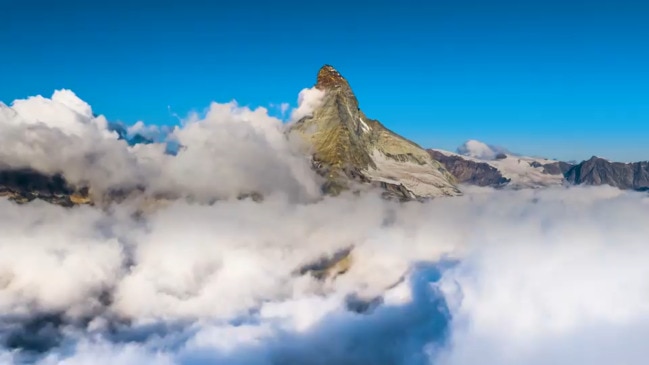
Don't miss out on the headlines from Lifestyle. Followed categories will be added to My News.
I grew up in South Africa and still remember the thrill of my first safari, nestled in an open-top Land Rover, enthusiastically seeking out the animals I had only seen on TV or glimpsed in books, each turn we made along a bumpy dirt road potentially revealing another exotic animal.
Back then my dreams of getting extremely close to the animals were usually short-lived or shrouded by a dust storm as our noisy vehicle scared the creatures away. So, when I returned as an adult, I expected much of the same. However, at Dulini in the Sabi Sands Game Reserve , there is a little magic at play, which allows you to get so close to the animals that you feel you can almost touch them (but please don’t do that).
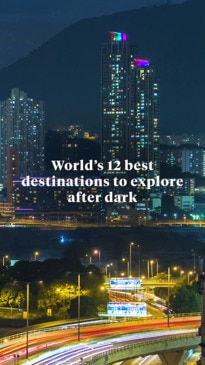
Spotting the “big five” – elephant, buffalo, rhino, lion and leopard – is at the top of most people’s lists when visiting South Africa, but I didn’t want to set myself improbable goals. Fast-forward six hours into my stay and I had seen them all – with my binoculars remaining secure in their case. The culture of respect and conservation at Dulini means that you can get close – and I mean count-the-eyelashes-on-an-elephant close.
Dulini Moya is one of three luxury lodges within Sabi Sands, considered to be one of the best private game reserves in South Africa. It shares an unfenced border with the two-million-hectare Kruger National Park, but the shared border is not the thing that makes game spotting so special here. For generations, animals have grown up to not see vehicles as a threat, so they continue on with their day as you excitedly idle by with your camera in hand. Here, the nation’s exotic animals are protected by experts and are also accessible to guests in safe proximity.
It’s just over a one-hour flight from bustling Johannesburg to the Ulusaba airstrip which, fun fact, is the one Sir Richard Branson uses to fly to his nearby residence. When I stumble down the stairs of the light plane I’m immediately greeted by my affable game ranger, Mac, who has spent his life among Africa’s exotics. Mac’s right-hand man is safari tracker Prince, who can seemingly sniff out any creature with the smallest of clues. Mac and Prince work in beautiful symmetry on each safari drive to seek out all the animals they know I’d love to see. As the crisp Kruger air rushes past my face in the open car, we pass herds of zebra and giraffe grazing in glory – and in just a moment all life’s worries seem to be left behind in Johannesburg.
We stop at Dulini Moya to settle in. The lodge offers one of the most exclusive experiences you can have in this part of South Africa, and hosts a maximum of 12 guests. Set on lush lawns and guarded by established trees along the banks of the Mabrak River, it feels every bit the luxury safari camp you dream of.
I’m greeted with the signature iced coffee (with hints of cinnamon and orange peel) so, from the start, I know the place is going to have pretty special flavours. Whether you’re on a game drive being plied with snacks or enjoying a drink by your private plunge pool, you’re never far from great food and drink at Dulini. Each night, dinner has a different theme and location, with a backing track of roaring lions or laughing hyenas as you dine.
Animals are best spotted at either end of the day, when the heat isn’t as fierce. As a result, game drives each day involve a 5.30am wake-up call, bookended by an afternoon drive to bring you into evening drinks.
The early start is made a bit easier with hot coffee as we drive, and I gladly agree to have it spiked with Amarula – the famous South African cream liqueur made from the marula tree. It’s just the way to inject some pep into your morning.
As we drive I notice Mac and Prince quietly communicating in code and I know we’re on the trail of something special. We turn a corner and Mac immediately shuts down the engine. There in the morning sun are nine lions – one dominant male, two mature females and six cubs – lying metres from the vehicle. Overnight, they were feasting on a zebra and now is their time to rest with full bellies and digest. They are undisturbed, giving us an occasional glance, then returning to their naps.
We return to the lodge for a hearty breakfast spread with a mezze-like platter of breakfast favourites brought to the table. It’s a chance to refuel and decompress after seeing such overwhelmingly beautiful sights. The rest of the day is all about relaxing by my private pool, which I choose to do with a glass of chardonnay in hand at all times. Later, it’s time for the afternoon drive, which is studded with viewings of cheetahs, grazing elephants and wandering rhinos, but most impressive of all was the leopard encounter. Mac and Prince managed to track down a leopard mother devouring an impala antelope as her few-week-old cub playfully rolled around nearby. It’s as though, somehow, I’ve become a character in one of Sir David Attenborough’s documentaries, as we sit in silence and gaze at this incredible sight.
If the dreamlike safari is not enough to tempt you itself, then the accommodation will be. My suite is bigger than my apartment in Sydney. The villas blend a traditional South African safari vibe with absolute luxury, and the draped bed is one of the most comfortable I have ever slept in. The open minibar is unlike any other, but don’t bother searching for a TV – there isn’t one. And with good reason. Sitting on your private deck and watching wild animals graze is the best cinema you could dream of.
I don’t like to think of a safari as just a bucket-list adventure. Experiences like this should be repeated in our lives. And seeing it through Mac and Prince’s eyes made it clear that even if you did this every day, it could never become boring. And so, as I begrudgingly shut the door to my suite and bid farewell to the incredible staff, I said “see you later” instead of “goodbye”.
The writer was a guest of Dulini.
What is the best way to get to Dulini from Australia?
Qantas flies daily from Sydney to Johannesburg direct. Transfer to a daily domestic flight on Airlink to the closest lodge airport, Skukuza.
How much does it cost to stay at Dulini?
Dulini Moya is 26,800 rand a night twin share (about $2260). All drinks and meals are included, as well as two game drives a day. It will increase in 2025 to 28,990 rand (about $2400).
More Coverage

Originally published as I checked in to Dulini Moya in Sabi Sands, and saw the Big Five immediately
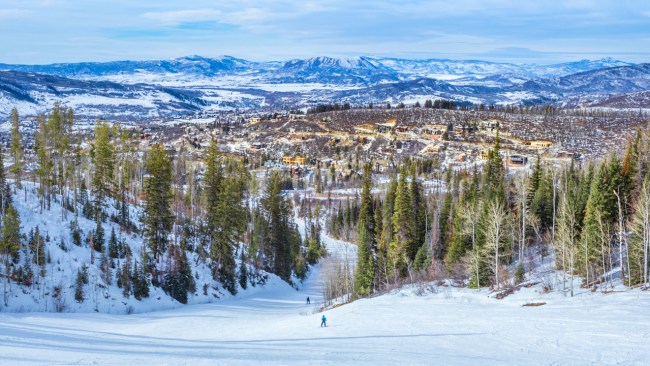
After 40 years, I found the ultimate spot to learn to ski
If you’re going to learn to ski, it may as well be in one of America’s most legendary snow locations.

‘I cannot wait’: Laurel’s first move after radio team ends decades-long run
Brisbane radio hosts Laurel Edwards, Gary Clare, and Mark Hine have signed off from 4BC Breakfast, marking the end of a working relationship that spanned decades.

- Kruger Park Hotel at Skukuza
Things to Do at Kruger Park Hotel at Skukuza
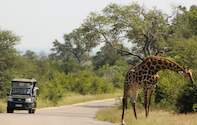
Kruger Park Hotel at Skukuza is in the perfect location in the heart of Kruger National Park for seeking the Big 5 Wildlife while on self-drive or guided game drives.
Seek Out the Big Five

Experience safaris that are conducted by knowledgeable Kruger Park rangers and learn about the secrets of the bush while seeing lions, rhinos, and elephants in their native environment. Savour the excitement of exploration on bush walks and day and night game drives, capturing priceless moments beneath the enormous African sky.
Golf in the Wild
Situated on the periphery of Skukuza Rest Camp lies the Skukuza Golf Course. The Big 5, plus a huge array of birds and other wildlife, may be found in the vast wildlife sanctuary that encircles this unique 9-hole (18-tee) golf course. Visitors can enjoy a peaceful golfing experience with some special wild visitors who venture onto the course to get a closer look.
Pamper Yourself at the AM Spa

AM Spa is a top-notch spa located right in the middle of the Kruger National Park. The sound of rustling leaves and the singing of birds is captured by the spa, in the quiet of the bush. Four opulent treatment rooms offer a haven of pampering. In addition, the spa has a pool, a bar for manicures and pedicures, and 2 outdoor treatment rooms.
Nearby Skukuza Attractions
- The Park Shop at Skukuza Rest Camp
- Skukuza Indigenous Nursery
- Skukuza Golf Club
- AM Spa Kruger
Booking Kruger Park Hotel at Skukuza
- Customer Support
- Tel: +27 21 424 1037
- Fax: +27 21 424 1036
- Contact by Mail
- Business Hours
- Mon - Fri. 08:00 - 17:00
- Saturday. 08:00 - 12:00
- Reservations and Booking
- Booking Conditions
- Visa and Passport
- About Siyabona Africa (Pty) Ltd
- Game Reserves
- Balule Game Reserve
- Manyeleti Game Reserve
- Sabi Sand Game Reserve
- Thornybush Game Reserve
- Timbavati Game Reserve
- Near Kruger National Park
- Birding in Kruger Park
- Kruger National Park
- Most Popular Pages
- Kruger Park Maps
- Best Time to Visit Kruger
- Getting to Kruger
- Accommodation at a Glance
- Camp Gates Map
- Kruger Park Gate Times
- Kruger Travel Help
- Conservation Fees
- Kruger Park News
- Reference Guide
- Africa Mammal Guide
- Africa Bird Guide
- African Flowers Guide
- Africa Grass Guide
- African Tree Guide
- African Reptiles Guide
- Kruger Park Culture
- Kruger Park History

IMAGES
VIDEO
COMMENTS
South Africa's premier safari destination, Kruger National Park throws up some staggering statistics. Established in 1898, it extends over some 19,000km²/7,335mi² and supports a total of 147 mammal species (the most of any African national park).
9. Kruger National Park Full Day Private safari. 642. 4WD Tours. 6+ hours. The Kruger national park is a leading African wilderness, not only does it offer the Big 5 but cheetah and Wild Dogs, and…. Free cancellation. Recommended by 99% of travelers. from.
Guided by trained and passionate guides, guests can enjoy up to 9 hours of safari time in the Kruger National Park on our Full Day Safaris, a longer duration compared to most other companies. We use comfortable open-air safari vehicles, providing guests with a remarkable bird's-eye view of the wildlife encounters.
Luxury Lodge Safari in Kruger National Park. This selection of the finest luxury accommodation and lodging in Kruger Park is where you will discover a way to appreciate the African wild and do it in comfort - with exceptional cuisine, magnificent wildlife experiences and great hospitality. Our South African safari and game lodges range from artistically elegant to super luxurious with en-suite ...
Classic Kruger Safari. 2 to 7 Day safaris from R10 900 per person. As the name states, this is the classic way of going on safari in the Kruger National Park. On a Classic safaris, you will stay in en-suite chalets in the heart of the National Park with open vehicle safari drives. View Our Classic Safaris.
Kurt Safari Pty Ltd is a highly ranked and recommended Kruger Park safari operator.We are rated #1 on TripAdvisor and we partner with some of the world's leading travel companies, to provide clients from all over the world with the best Kruger Park safari experience. Over the last 20 years, we have designed and perfected 3, 4 and 5-day all-inclusive Kruger safari packages and tours that ...
3 Day Kruger Park Lukimbi Fly-in Safari. 2 Nights at Lukimbi Safari Lodge in the Kruger Park, three full meals per day, all teas and coffees, two game drives daily in open land rovers and a safari walk. BIG 5 off-road game viewing. Big Five sightings in their natural habitat. Private views of the river or bush from your suite.
Safaria's Privately Guided Kruger Park Safari Tours have been created to offer our guests a wide variety of traditional Kruger National Park Safari packages for individuals, couples, families and small groups. From standard packages to luxury safari packages we offer the best deals and tips on the perfect Kruger National Park experience. All of our Custom, Wildlife, Birding and Photographic ...
11-12 hours. A visit to the Kruger National Park is the best option if you enjoy wildlife and want to see all the big fives. unlike other…. Free cancellation. Recommended by 100% of travellers. from. £193. per adult. 14. Full-Day Kruger Park Safari from Nelspruit, Whiteriver or Hazyview.
3-Day Kruger Safari and Panorama from Cape Town. $3,125 to $3,506 pp (USD) South Africa: Shared tour (max 20 people per vehicle) Mid-range Lodge. You Visit: Cape Town (Start), Panorama Route (Highlight), Kruger NP, Cape Town (End) Africa Moja Tours & Safaris. 4.7 /5 - 11 Reviews.
Enjoy a Wild Kruger Park safari with shuttles, open-sided game drives, meals and accommodation included. Therefore our wildlife safaris are definitely the top in Africa! Our Kruger National Park safari and Sabi Sands luxury Lodge safaris are fantastic! Safaris include guided bush walks and game drives after dark.
The Kruger Park in South Africa is a top destination for safari-goers and one of the largest game reserves in Africa. It is located in northeastern South Africa across the Limpopo and Mpumalanga provinces. The Kruger was established in 1926. The combination of Sabi Game Reserve, Shingwedzi Game Reserve, and local farms created the first ...
The cost of a guided safari in the Kruger National Park ranges from a very well-priced ZAR 5400.00 per person (US$ 385) for a 3 day camping safari, to hundreds of US$ per person per night, if staying in some of the luxury lodges that are situated inside the Kruger National Park.
Kruger National Park has camp-run accommodations, and each camp has its own unique offerings, ranging from basic camping to the quintessential safari tents to luxury lodges. Kruger has 10 luxury safari lodges you can book, and the surrounding private game reserves offer luxury accommodations, meals, and highly trained personnel.
Kruger National Park is well-known for its boundless opportunities to spot the famous African Big Five - Elephant, Leopard, Buffalo, Rhino and of course Lion. Day safaris are conducted in open 4 x 4 safari vehicles. The day trip is an ideal tour as it provides a good overall experience at a relaxed pace. You will experience South Africa's ...
Our customizable Kruger Park safari packages take the guess work out of planning and save you time. We offer spacious and modern accommodations at our Kruger Park Lodge 6-sleeper chalet mixed with private, guided safaris into Kruger and the Sabi Sands. For under $120/person/night a family of four can experience 4 nights at our comfortable ...
It is the largest South African National Park and has one of the highest densities of wildlife of all the national parks. Kruger is home to approximately 517 birds, 147 mammals, and 118 reptiles. Visitors to the park are offered a wide range of services. The park offers guided drives, bush walks, backpacking trails, and golf.
The Kruger offers top-notch classic safaris where expert guides and trackers go in search of the Big 5 in customised 4×4 vehicles. For the truly adventurous, lodges like Rhino Post in the national park, Africa on Foot in Klaserie and Ngala Safari Lodge in Timbavati offer walking safaris, where your game drives can be replaced by venturing out on your own steam with a guide to discover Kruger ...
The Ultimate Kruger National Park Safari Planning Guide. By Josh Hewitt July 5, 2023 ( 3 ) Kruger National Park in South Africa is one of the world's premier wildlife destinations. The Greater Kruger area is an expansive region that is comprised of beautiful landscapes and a wealth of wildlife. A Kruger National Park safari is an experience ...
Kruger Park is South Africa's flagship national park and an iconic safari destination. Kruger Park is massive. It covers an area of 20 000 square kilometres (2 million hectares) which makes it the same size as Israel and slightly smaller than Belgium. The Park is 360 kilometres long and 65 kilometres wide.
Crocodile Kruger Safari Lodge is probably the best of affordable Kruger National Park lodges. It sits just outside the park on the aptly named Crocodile River, and rooms range from standard hotel rooms with patios overlooking the gardens and river to a full three-bedroom cottage with a private pool and kitchen.
Discover the unforgettable beauty of Africa on our 5-day hiking safari in the Northern Kruger National Park. Step into the footsteps of African wildlife and explore the fascinating wonders of Pafuri, a jewel in the northernmost part of the park. This untouched wilderness entices with its variety of breathtaking landscapes and magical wildlife encounters, making it one of our preferred ...
Imbali Safari Lodge. Image by Timbuktutravel.com. Located in central Kruger, the Imbali Safari Lodge is situated on a private concession spanning 100km2/40mi2. This exclusive lodge offers 12 spacious suites, providing a luxurious experience amidst the tranquil African bush.
Day 2: Wildlife Safari in Kruger Park. After a delicious breakfast outside on the terrace surrounded by fresh air and nature, you will be collected in a custom-built open safari vehicle and taken on a private guided tour of the Kruger National Park.
With luxurious accommodation at a Krugerpark safari hotel inside Skukuza Rest Camp, you'll enjoy the perfect blend of comfort and wilderness. Get ready for an adventure of a lifetime! Safari Highlights. Expertly guided safari game drives and bush walks; Self-guided drives through Kruger Park at your leisure
As the crisp Kruger air rushes past my face in the open car, we pass herds of zebra and giraffe grazing in glory - and in just a moment all life's worries seem to be left behind in Johannesburg.
Kruger Park Hotel at Skukuza is in the perfect location in the heart of Kruger National Park for seeking the Big 5 Wildlife while on self-drive or guided game drives. ... Kruger National Park - South African Safari. Customer Support; Tel: +27 21 424 1037; Fax: +27 21 424 1036; Contact by Mail; Business Hours; Mon - Fri. 08:00 - 17:00; Saturday ...